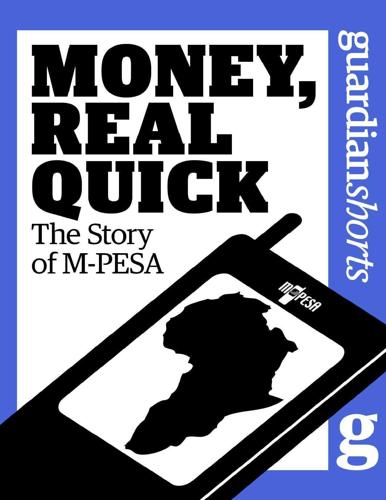
Money, Real Quick: The Story of M-PESA
by
Tonny K. Omwansa
,
Nicholas P. Sullivan
and
The Guardian
Published 28 Feb 2012
And since True Money is primarily a payments system, it does not face the issue of cashing out, as M-PESA does. Thus, the landscape pre-M-PESA has three major players: Smart Money in The Philippines, MTN Banking in South Africa and True Money in Thailand. All were gradations on the theme of a connection between a mobile operator and a bank, greased by the airtime reseller as an intermediary. None were “pure mobile plays” like M-PESA. The landscape post-M-PESA is not unlike the pre-M-PESA landscape, in terms of hybrid mobile money applications, except that it is extremely crowded. That includes several M-PESA clones sparked by Vodafone. M-PESA CLONES After the launch of M-PESA and its meteoric uptake, Nick Hughes’s role at Vodafone changed from Director of Social Enterprise to Head of International Mobile Payments.
…
A study of community-level effects of M-PESA by the Iris Center at the University of Maryland found it was possible to see gains even for non-users. In Murang’a, a district in the Central province, 75 kilometers from Nairobi, the Managing Director of an M-PESA outlet said he has seen an expansion of businesses due to M-PESA, namely fish buyers and a woman who buys cakes and sweets using M-PESA and sells them to area hotels. A tomato vendor from Katulani sees people go to the M-PESA vendor first and then come to buy food. He says business has doubled since an M-PESA shop moved into ******ebook converter DEMO Watermarks******* the shopping center.
…
******ebook converter DEMO Watermarks******* Even the Kibera slum on the outskirts of Nairobi, where over 250,000 people live cheek to jowl in highly unsanitary conditions and makeshift housing, is a beehive of M-PESA activity. There are hardly any bank branches, but M-PESA agents line the dirt streets; people queue up to fill their phones with e-money and/or collect cash. Savings groups, once a hightouch face-to-face phenomenon, much like micro-lending, have in many cases adopted M-PESA as a means of mobilizing lump sums to lend amongst themselves. One reason for this seeming incongruity is that M-PESA has unleashed entrepreneurship, and entrepreneurs see demand waiting to be filled. Running an M-PESA agency is one of the better entrepreneurial opportunities in the developing world.
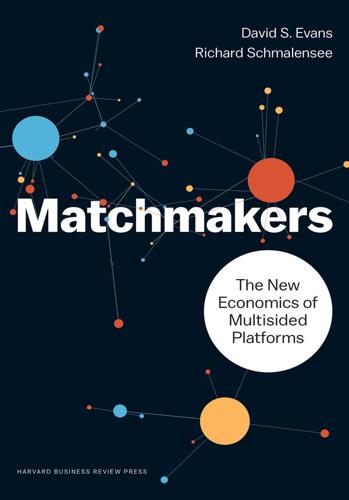
Matchmakers: The New Economics of Multisided Platforms
by
David S. Evans
and
Richard Schmalensee
Published 23 May 2016
For example, it cost 30 Kenyan shillings (KShs) to send KShs 35,000 to a registered user and it cost KShs 400 to send that same amount to an unregistered person.12 That price structure provided strong incentives for senders to persuade those to whom they wanted to send money to register for M-PESA. Table 11-1 summarizes M-PESA’s fees as of 2009.13 TABLE 11-1 M-PESA’s fee structure, 2009 (in KShs) Transaction type Transaction range Customer charge Minimum Maximum Deposit cash 100 35,000 0 Send money to registered 100 35,000 30 M-PESA user Send money to 100 2,500 75 nonregistered M-PESA user 2,501 5,000 100 5,001 10,000 175 10,001 20,000 350 20,001 35,000 400 Withdraw cash by registered 100 2,500 25 M-PESA user at M-PESA 2,501 5,000 45 agent outlet 5,001 10,000 75 10,001 20,000 145 20,001 35,000 170 Withdraw cash by registered 200 2,500 30 M-PESA user at PesaPoint 2,501 5,000 60 ATM 5,001 10,000 100 10,001 20,000 175 Withdraw cash by 100 35,000 0 nonregistered M-PESA user Buy airtime (for self or other) 20 10,000 0 Platform Ignition When M-PESA opened its doors in March 2007, it had some members of all sides on board.
…
The amazing thing about pioneering multisided platforms like M-PESA is that they figured out how to solve this difficult coordination problem. M-PESA’s Balancing Act Because so many stores in Kenya were already working with Safaricom to sell airtime along with other products, M-PESA was able to leverage those stores for its new service. That required deciding on a compensation system, selecting and recruiting stores, training their personnel, and supervising them. It also required convincing potential agents that when M-PESA launched, they would have enough customers to make investing in the business worthwhile. At its launch in 2007, M-PESA had signed up 307 shops and other agents.
…
Other data shows that the number of registered users in March 2015 reached 25.7 million, which amounted 99 percent of the adult population (those over fifteen), and annual transaction volume reached 45 percent of GDP in 2014.18 FIGURE 11-4 Number of registered M-PESA users and transaction volume between March 2007 and March 2015 FIGURE 11-5 Number of M-PESA/CICO agents and transaction volume between March 2007 and March 2015 FIGURE 11-6 Annual M-PESA transaction volume as a percentage of GDP M-PESA got through the treacherous early months and went on to enjoy overwhelming success. Other mobile network operators in Kenya followed Safaricom’s lead and established mobile money systems. Mainly because of M-PESA’s great success, the people of this poor African country of only 44.9 million are more likely to use mobile money, and to conduct more transactions monthly, than the people of any other country in the world.19 But M-PESA’s success was far from inevitable.
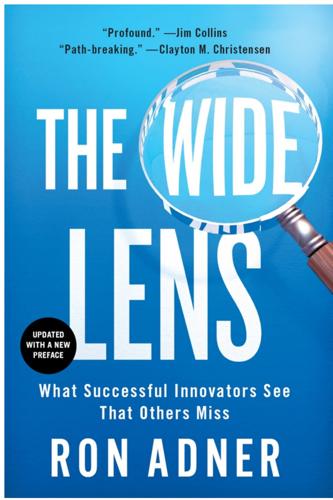
The Wide Lens: What Successful Innovators See That Others Miss
by
Ron Adner
Published 1 Mar 2012
See also http: //mobilemonday.co.ke/ page/2/. 196 “too many challenges to mention”: Jaco Maritz, “Exclusive Interview: The Woman Behind M-PESA,” How We Made It in Africa, November 11, 2010, http://www.howwemadeitinafrica.com/exclusive-interview-the-woman-behind-m-pesa/5496/. 197 considerable complexity was added: Sarah Rotman, “M-PESA: A Very Simple and Secure Customer Proposition,” CGAP.org, November 5, 2008, http://technology.cgap.org/2008/11/05/m-pesa-a-very-simple-and-secure-customer-proposition/. 197 “bottleneck in transferring the money”: Nick Hughes and Susie Lonie, “M-PESA: Mobile Money for the ‘Unbanked’—Turning Cellphones into 24-Hour Tellers in Kenya,” Innovations, Winter/Spring 2007, p. 77. 198 “we would need to find a way to simplify things”: Ibid., p. 74. 200 expanded its customer base to 7.3 million: Michael Ouma, “M-Pesa Now Ventures Abroad to Tap into Diaspora Cash,” East African, October 19, 2009, http://www.theeastafrican.co.ke/business/-/2560/673512/-/5gaimnz/-/index.xhtml. 201 (Kenya’s GDP in 2009 was $63 billion): CIA World Factbook, https://www.cia.gov/library/publications/the-world-factbook/geos/ke.xhtml.
…
The involvement of Faulu Kenya meant that considerable complexity was added to the consumer transactions to accommodate its particular lending models, treasurer accounts, and accounting practices. Faulu Kenya, wary about the novelty of the M-PESA proposition, chose to retain its paper-based back-office procedures instead of adopting M-PESA’s real-time data entry system. This resulted in a complex reconciliation process between the two organizations, which were moving at different speeds. According to Lonie: “The bottleneck in transferring the money M-PESA had collected in loan repayments to Faulu’s bank account was getting its books to a point where it could request the funds. To make M-PESA more suitable for [microfinance institutions], we need to create data export files that can be easily uploaded in whatever format their existing software requires.”
…
Instead it constructed the simplest ecosystem it could assemble and still create some new value. It identified its Minimum Viable Ecosystem (MVE). For M-PESA, the minimum viable ecosystem would be the money transfer service, which is the heart of the M-PESA promise. By sending a simple, secure text message to the network, M-PESA customers could transfer money to other mobile phone users anywhere in the country. Kenya was already blanketed with kiosks where Safaricom agents sold airtime to mobile customers, and these same agents would facilitate the M-PESA money transfers, doling out the appropriate amount of cash to transfer recipients. And because no bank accounts were involved, the regulatory hurdles were much lower.
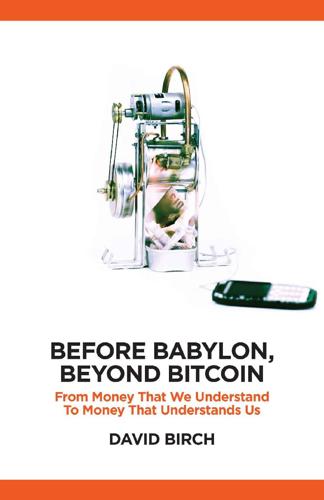
Before Babylon, Beyond Bitcoin: From Money That We Understand to Money That Understands Us (Perspectives)
by
David Birch
Published 14 Jun 2017
Lessons from M-Pesa What general lessons can we draw from M-Pesa’s rise? One lesson is about the regulatory environment that allowed M-Pesa to flourish and about how, despite banks’ reservations about the scheme, once it was successful banks were able to use it to offer financial services to a new customer base. Omwansa and Sullivan indeed note that ‘commercial banks have finally decided to expand their borders beyond branches by hiring agents [but] only after they tried, and failed, to shut down M-Pesa’. This is why, for me, the most interesting part of the story came after M-Pesa reached five million subscribers (more than all forty-three of Kenya’s commercial banks combined) back in 2008.
…
As the CEO of Kenya Commercial Bank is quoted as saying in the book, in response to being asked if M-Pesa is a threat to banks: ‘if you don’t respond it’s a threat, but if you embrace it, then it’s an opportunity’. I see this as a template for payment system evolution in Europe and hopefully in the United States as well. As a final lesson I cannot help but point to the relationship between identity and money. One of the most unexpected impacts of M-Pesa was the use of M-Pesa transaction histories as substitutes for conventional credit ratings. Remember that many M-Pesa agents are merchants, so it is natural for them to extend credit in this way. In other words, M-Pesa became a means for previously excluded people to demonstrate identity and reputation.
…
Governments therefore have two choices: they can reduce expenditure and become more efficient and effective users of tax revenues, or they can find alternative sources of tax income. Since the former is a fantasy, the latter is inevitable. As is often the case, M-Pesa helps us to make these issues concrete. M-Pesa is widely used, but it clearly isn’t part of Kenyan M0 since the ultimate liability for the M-Pesa balances rests with the commercial banks where the float is deposited (M-Pesa has a 100 per cent reserve). The fact that it isn’t part of M0 is a potential problem, however, from the government’s point of view. If M-Pesa keeps growing and M0 keeps shrinking, this deprives the state of seigniorage revenue. This has indeed happened, and the Kenyan government decided to compensate with a special tax on mobile money operators (a 10 per cent duty on transaction fees for all mobile money transfer services provided by cellular phone providers, banks, money transfer agencies and other financial service providers was introduced in a 2012 Finance Act there).
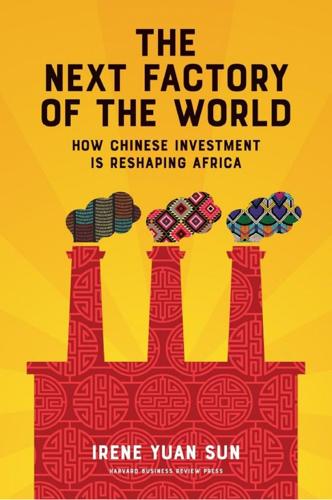
The Next Factory of the World: How Chinese Investment Is Reshaping Africa
by
Irene Yuan Sun
Published 16 Oct 2017
To illustrate the point, let’s look at the clearest case of African success in innovation—mobile payments. M-Pesa is the Kenyan mobile payments platform, and it is unquestionably the most successful system of its kind in the world. Using M-Pesa on their cell phones, Kenyans can send one another money, pay for a wide range of goods and services, and conduct a variety of banking transactions. Because of M-Pesa, mobile payments are much more commonplace in Kenya than in America—in Kenya, even the smallest street vendors are likely to accept M-Pesa. In total, Kenya has 19 million M-Pesa users, who represent about 70 percent of its adult population.14 More than 40 percent of Kenya’s GDP is transacted through M-Pesa, and the number of M-Pesa transactions in Kenya alone outnumbers the number of Western Union transactions in the whole world.15 Despite the number of powerhouse companies like Google and Apple that have touted their own online payment systems, one out of every two people who send money over a mobile phone is a Kenyan using M-Pesa—an astonishing proportion when one considers that Kenya represents 0.0006 percent of the world’s population.16 How did Kenyans figure out something that has eluded the rest of the world?
…
In total, Kenya has 19 million M-Pesa users, who represent about 70 percent of its adult population.14 More than 40 percent of Kenya’s GDP is transacted through M-Pesa, and the number of M-Pesa transactions in Kenya alone outnumbers the number of Western Union transactions in the whole world.15 Despite the number of powerhouse companies like Google and Apple that have touted their own online payment systems, one out of every two people who send money over a mobile phone is a Kenyan using M-Pesa—an astonishing proportion when one considers that Kenya represents 0.0006 percent of the world’s population.16 How did Kenyans figure out something that has eluded the rest of the world? There are two prevailing narratives typically told about M-Pesa’s origins.
…
John Xue, interview by author by phone, February 21, 2016. 13. Ibid. 14. M-Pesa has 19 million users in Kenya. Lilian Ochieng, “M-Pesa Reports 27 pc Jump in Global Users to 25 Million,” Daily Nation, April 27, 2016, http://www.nation.co.ke/business/M-Pesa-reports-27-pc-jump-in-global-users-to-25-million/996-3178018-5ykpjpz/index.html. Kenya’s population in 2015 was 45.9 million, of which 41.6% were children aged 0–14. The World Factbook Kenya, Central Intelligence Agency, https://www.cia.gov/library/publications/the-world-factbook/geos/ke.html. 15. Claudia McKay and Rafe Mazer, “10 Myths About M-PESA: 2014 Update,” CGAP, October 1, 2014, http://www.cgap.org/blog/10-myths-about-m-pesa-2014-update; and Tonny K.
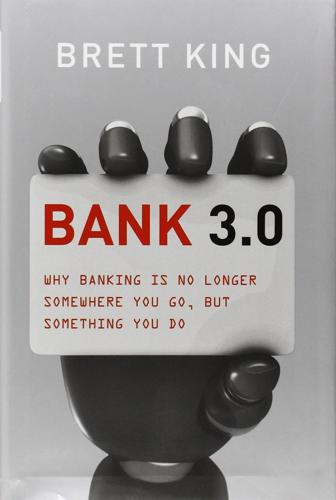
Bank 3.0: Why Banking Is No Longer Somewhere You Go but Something You Do
by
Brett King
Published 26 Dec 2012
Almost half of the Kenyan population of 35 million have embraced M-Pesa in its short five-year history. Also impressive has been the increase in the number of monthly transactions, which increased by 4627 per cent over the period from July 2007 to July 2009. M-Pesa averages 11 to 14.6 person-to-person transfers each month, with over 56 billion Kenyan shillings a month (US$675m/month) moved through the M-Pesa network. Mobile money transfers in total crossed the 1-trillion shilling mark in 2011. With over 37,000 outlets and reseller agencies around Kenya, M-Pesa outstrips the top four banks’ reach by more than 50 to 1. This is why M-Pesa has become ubiquitous so quickly.
…
While there are some AML restrictions on the usage of M-Pesa for transfers by a single individual, the system still allows a Kenyan working in the UK to deposit pounds or euros in the UK with a remittance agent, and have his family or associates collect that money in Kenyan shillings back in the home country with the use of their mobile phone. With 37,000 outlets, 15 million users and close to $700m per month, the M-Pesa mobile payments network is a huge success. M-Pesa has extended its reach further across Africa with its relaunch of M-Pesa in Tanzania. While the take-up in Tanzania has been slightly slower than in Kenya, there are still more than nine million users in that country. Vodafone has also partnered Roshan to provide M-Paisa, a local variant of M-Pesa, in Afghanistan. Early in 2010, Nedbank and mobile operator Vodacom teamed up to launch M-Pesa in South Africa. Scenario 4: Apple Rules! If Apple continues on its current growth path, with the launch of the iPhone 5 and its mobile wallet capability, it’s likely to blow their current estimates out of the water.
…
A similar scheme operates in Kenya called M-Pesa. It also provides for person-to-person fund transfers using mobile phones. Interestingly, with the M-Pesa scheme, it is the cash conversion which is one of its biggest issues. The shopkeeper who signs up as an agent for M-Pesa is required to keep a cash float which can cause problems in isolated areas, and results in the merchant having to travel to the nearest town to replenish the cash. M-Pesa has attempted to solve this problem through ATM cash withdrawal through PesaPoint, Equity Bank Code and Diamond Trust. More on the M-Pesa case study can be found in Chapter 6 on Mobile Banking.
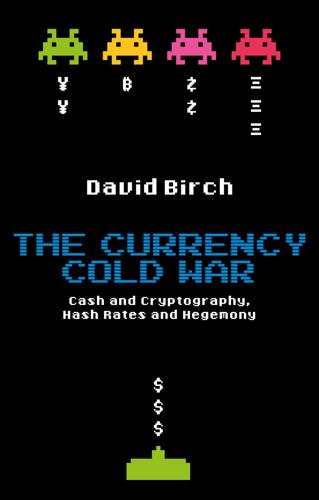
The Currency Cold War: Cash and Cryptography, Hash Rates and Hegemony
by
David G. W. Birch
Published 14 Apr 2020
The failure of genuine alternatives such as DigiCash and the continued growth and development of international card schemes and domestic payment networks meant that, in the mid-2000s, some observers were questioning whether an alternative to bank-led payment infrastructures would ever get off the ground. This perspective changed with the arrival of M-Pesa. M-Pesa M-Pesa is so important that its origins and trajectory need to be recorded and reported from many perspectives. Back in 2003, Safaricom was the market-leading mobile operator in Kenya, with just over half the market. The company had the idea of using mobile phones to make the distribution of loans in Africa more efficient, so it submitted a proposal to the UK Department for International Development (DFID) for matching funding. This was granted, and M-Pesa was born. The pilot launched in 2005, and within a year the scheme had two million subscribers and was handling $1.5 million per day.
…
A much better idea would be to go straight to the modern age and create MacPesa: this would be a digital money system rather like Kenya’s M-Pesa (as discussed in the earlier case study), with a few crucial enhancements to take advantage of new technology. M-Pesa is an amazing success, but it is not perfect. In recent times, it has gone down, leaving millions of customers unable to receive or send money. These failures cost the economy a significant amount (billions of shillings), which is not surprising when you remember that M-Pesa moves billions of Kenyan shillings every day. So, when M-Pesa drops out, it leaves customers hanging, it leaves agents losing revenue and it leaves the banks unable to transact.
…
A decade after Mondex, M-Pesa opted to use neither cards nor terminals; instead, it used mobile phones to vault a non-bank through a regulatory gap to create something that transformed the lives of millions. Note that both Mondex and M-Pesa used cryptography with hardware at its core to protect the integrity of the system. In the case of Mondex, this was the now-familiar smart card that chip-and-PIN has propelled into every pocket. In the case of M-Pesa, this was the SIM card (which is actually the same thing) that GSMA has propelled into every phone in every pocket. Mondex was decentralized, M-Pesa was centralized; both were managed by a central authority, and in both cases the electronic value in the chips was issued against a 100% reserve in fiat currency held by the banking system.13 Swedish models The country where the transition from physical to digital fiat currency is likely to take hold first is Sweden.
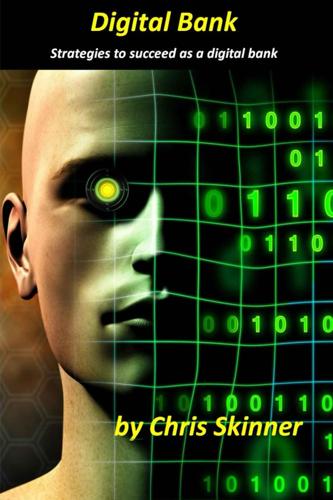
Digital Bank: Strategies for Launching or Becoming a Digital Bank
by
Chris Skinner
Published 27 Aug 2013
So, the bank’s plan for 2020 is to have 200 branches, 5000 team members, 1 million customers and £20 billion of assets. M-PESA, KENYA An interview with John Maynard, Senior Business Development Manager for M-PESA at Vodafone Group Mobile payments have taken off massively over the past few years, with the most notable success being M-PESA in Kenya. Launched in March 2007, with an expected one million customers after year one, the system far exceeded expectations and now has over 17 million registered accounts. That represents nearly one account for every adult in Kenya, but the system has not been as successful overseas. What is it that constituted M-PESA’s success in Kenya and where does it go next?
…
This is because electronic payment processing is both traceable and immediate, with no challenge of distance, and the best example of such change is seen in M-PESA in Kenya, although this is not a typical implementation of mobile payments. M-PESA – ‘M’ is for mobile and ‘PESA’ means money in Swahili – was launched in September 2007 when the Kenyan government asked Safaricom, a Division of Vodafone, to help improve the way money was moved between citizens. At that time, most payments from towns to villages were made through physical transport of notes and bills using bus and taxi drivers. Under the M-PESA system, agents manage the transfers with mobile text messaging, allowing simple and immediate real-time transfer.
…
Being able to pay my window cleaner or school lunch fees without scrabbling around the house for change is a future I can’t wait for. About John Maynard John Maynard is part of the commercial and strategy team working on M-Pesa - Vodafone’s mobile money transfer product. M-Pesa is has over 32 million customers, who can deposit or withdraw money from an account linked to their mobile phone at any of 60,000 Agents. The service is live in 7 markets, including India, Afghanistan and Fiji. Prior to joining the M-Pesa team, Mr Maynard was product manager for a number of Vodafone products, including premium rate SMS, adult content bar, and consumer email solutions. SWIFT, GLOBAL An interview with Kosta Peric, Leader of the SWIFT Innotribe innovation program SWIFT is the Society for Worldwide Interbank Financial Telecommunication, a member-owned cooperative through which the financial world conducts its business operations with speed, certainty and confidence.
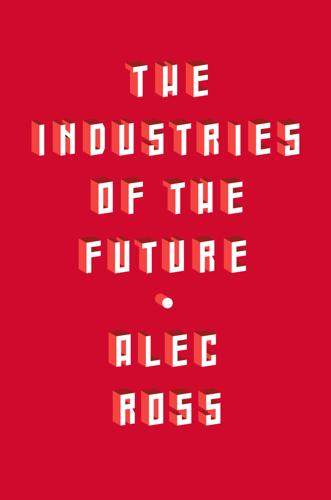
The Industries of the Future
by
Alec Ross
Published 2 Feb 2016
How far this potential will ultimately bring Africa depends both on what new technologies and new creations will be produced and on how the financial and governance systems adapt. Kenya’s M-Pesa program is a prime example of these new technologies that show the growing power of coded money and markets. Pesa is Swahili for “money,” and “M” stands for mobile. In communities where bank accounts are rare, M-Pesa allows customers to send and receive payments through their cell phones. In Kenya, M-Pesa has become wildly successful. By 2012, 19 million M-Pesa accounts had been created in a country of 43 million people, and approximately 25 percent of Kenya’s GNP flows through the network. While estimates vary, the adoption of M-Pesa has increased rural households’ incomes anywhere from 5 to 30 percent.
…
OurMobileWorld.org, January 1, 2012, http://ourmobileworld.org/post/35349373601/what-is-mpesa-how-does-it-work-how-did-it-start. The process is safe, since M-Pesa: “Dial M for Money,” Economist, June 28, 2007, http://www.economist.com/node/9414419. M-Shwari also facilitates the disbursement: Ignacio Mas and Tonny Omwansa, “NexThought Monday: A Close Look at Safaricom’s M-Shwari,” next billion, December 10, 2012, http://www.nextbillion.net/blogpost.aspx?blogid=3050. In another program, M-Pesa works: “Deacons Kenya Customers to Pay Via M-Pesa,” Safaricom, March 15, 2011, http://www.safaricom.co.ke/personal/m-pesa/m-pesa-resource-centre?layout=edit&id=437. Approximately $40 billion is sent: Sanket Mohaprata and Dilip Ratha, Remittance Markets in Africa (Washington, DC: The World Bank, 2011), http://siteresources.worldbank.org/EXTDECPROSPECTS/Resources/476882-1157133580628/RMA_FullReport.pdf; “Remittances Gaining Increasing Importance in Africa: New Report from the African Development Bank,” SilverStreet Capital, July 22, 2013, http://www.silverstreetcapital.com/Publisher/File.aspx?
…
For such a huge impact, the way that M-Pesa works is incredibly simple. Anyone with a valid identification card or passport can register with one of the tens of thousands of M-Pesa agents in the region, located conveniently at gas stations, markets, and stores. Just hand over some cash to the agent, who then loads it onto the new account. If you want to send money, go to the M-Pesa menu on your phone and send a text to the intended recipient with the amount of money in the body of the text. Within seconds, the money is delivered. Withdrawing money is just as easy and can be done by visiting an M-Pesa agent or going to an ATM—no cards or bank offices needed.
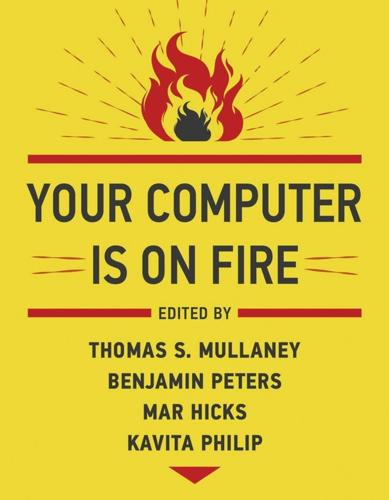
Your Computer Is on Fire
by
Thomas S. Mullaney
,
Benjamin Peters
,
Mar Hicks
and
Kavita Philip
Published 9 Mar 2021
This “poor man’s internet” served them, however briefly, as infrastructure. M-Pesa M-Pesa is a cellphone-based mobile money system, first rolled out in Kenya in 2007 by mobile phone operator Safaricom. (“Pesa” means “money” in Swahili.) When clients sign up for M-Pesa, they receive a new SIM card containing the M-Pesa software. Clients “load” money onto their phones by handing over cash to one of the 160,000+ authorized M-Pesa agents. Friends, relatives, or employers can also load money to the client’s phone. Clients can use the money to buy airtime or to pay bills at hundreds of enterprises. To date, however, clients have used M-Pesa principally for “remittances,” the common practice of wage-earning workers sending money to family or friends elsewhere.
…
Every change to Safaricom’s software caused breakdowns in this process and required businesses to rework their own methods, causing them to clamor for a genuine API. A 2012 assessment of M-Pesa noted that the eventual API performed poorly, but also that a mini-industry of software developers and integrators has started to specialize in M-Pesa platform integration. . . . These bridge builders fall into two broad categories: 1) those that are strengthening M-Pesa’s connections with financial institutions for the delivery of financial products, and 2) those that are strengthening M-Pesa’s ability to interoperate with other mobile and online payment systems. The lack of a functional M-Pesa API is hindering bridge-building, but several companies have devised tools for new financial functions and online payments nonetheless.37 This trajectory reflects the typical platform pattern of development.
…
Once established, the core component, namely the M-Pesa software, acquired a number of developers building complementary components. Other developers built better interfaces between the core and the complementary components, leading to M-Pesa-based financial services such as pension schemes, medical savings plans, and insurance offerings. This “mobile money ecosystem” is a kind of parallel universe to traditional banking.38 Indeed, today a Google search on M-Pesa categorizes it simply as a “bank.” Is the short-cycle temporality of platforms and second-order systems the future of infrastructure? M-Pesa went from drawing board to multibillion-dollar business in less than ten years.
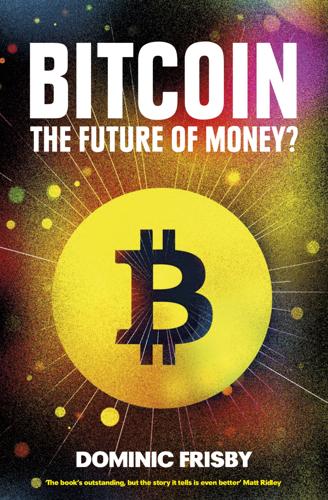
Bitcoin: The Future of Money?
by
Dominic Frisby
Published 1 Nov 2014
More and more people own one and a mobile is enough to transact via M-Pesa. Second is M-Pesa’s ease of use. Older, technologically naïve, rural folk will find it easier to get to grips with SMS payments than they will with downloading Bitcoin wallets and all the rest of it. The M-Pesa is a centralized money issued by mobile phone networks, unlike the decentralized open source creation that is Bitcoin. The M-Pesa has more limited use and less potential functionality than Bitcoin. It is not a money without borders. But given the stage of development that much of rural Asia and Africa is at, I’m inclined to agree that the M-Pesa has greater potential in these parts of the world over the next few years.
…
As early as 2009, such was the pace at which the M-Pesa was expanding, Kenyan banks actually lobbied the government to audit M-Pesa in an attempt to slow its growth. But it made little difference. Now something like two-thirds of Kenyans now use the M-Pesa and as much as 43% of national GDP flows through it.190 Only 40% of Kenyans have a bank account.191 According to the World Bank, in 2012 over 70% had a mobile phone.192 With the M-Pesa, the ‘unbanked’ now have access to basic financial services. People can deposit and withdraw money, transfer money (even to non-users), pay bills, buy airtime and, in some cases, actually transfer money to a bank account.
…
Venture capitalists tell me you can add another 10% by the time you factor in the collection costs (travel and accommodation) and the working hours lost while the money is being sent. With the M-Pesa, and, eventually, Bitcoin, they don’t need to leave home. India, and much of rural Asia, Africa and South America, badly need a simple, cheap way to transfer money. One day Bitcoin or some development of it will meet that need. SMS payment systems are already being developed for Bitcoin, but for now it looks as though the simplicity and investment capital behind the M-Pesa will win that particular battle. But it is still a battle that is being won by a non-government currency, beyond traditional banking. And, through the M-Pesa and other currencies like it, the third world can bypass traditional banking, just as China bypassed cables and went straight to wireless.
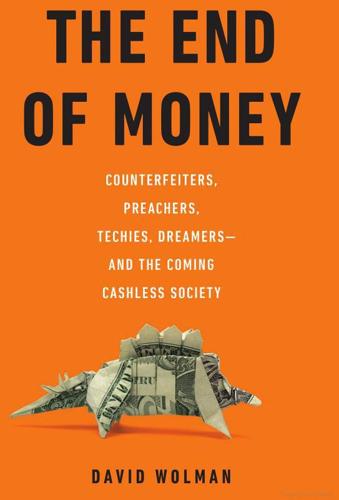
The End of Money: Counterfeiters, Preachers, Techies, Dreamers--And the Coming Cashless Society
by
David Wolman
Published 14 Feb 2012
The shopkeeper’s account is credited the corresponding amount for the groceries.10 After less than four years of operation, M-Pesa counted thirteen million users—more than half the adults in the country. In contrast, it took a century for the conventional banking industry in Kenya to reach five million customers. Stores offering M-Pesa are in virtually every community, with the logo advertised in windows, on flags, or hand-painted on cinderblock walls. More money already passes through the M-Pesa system in Kenya than all the Western Union transactions worldwide.11 Kenya’s central bank has reported a drop in cash usage, and M-Pesa payments are now being accepted by a few of the country’s major retailers and the national airline.12 Other Kenyans, such as taxi drivers, load up their accounts whenever possible, so that they don’t have to hold on to cash.
…
The early success story that has development experts doing backflips is a service in Kenya called M-Pesa (the M is for “mobile” and pesa is Kiswahili for “money”). It’s run by a subsidiary of the huge telecom company Vodafone, and the first thing you need to know is that M-Pesa isn’t a bank. It’s a transfer service akin to PayPal, but you don’t need an Internet hookup. To the people of Kenya, the benefits of this service have been staggering. Instead of spending two days on buses to deliver money to grandma back in the village, you can go to a local shop—any one of the 23,000 tied into the network of M-Pesa agents—plunk down the cash you want to convert and send, and then type in the necessary codes on your cell phone.
…
But those rules are anachronistic now that mobile technology is enabling “branchless banking” accounts, allowing people to convert cash into electronic money almost anywhere and send it to a savings account. “That pharmacy you visited in Delhi—that is not a bank branch,” says Mas. “The stores are essentially selling electronic money (for cash), just like they would sell rice. They don’t hold anything.” Nor do the conduit companies. For M-Pesa users, Vodafone’s subsidiary in Kenya doesn’t hold the money. M-Pesa customer funds are pooled and held in trust in a regular old bank, depositor insurance and all. Should Vodafone go bankrupt tomorrow, or if executives suddenly decide they want to ditch the mobile money business and buy the Chicago Cubs, peoples’ money would, or should, be safe at the bank.
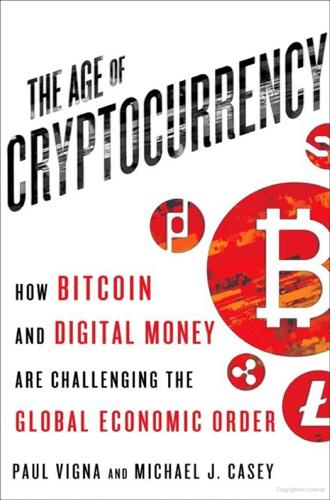
The Age of Cryptocurrency: How Bitcoin and Digital Money Are Challenging the Global Economic Order
by
Paul Vigna
and
Michael J. Casey
Published 27 Jan 2015
Not only that, Concern Worldwide brought these remote villages technology that would prove useful beyond the crisis, and the crisis itself showed M-Pesa’s true worth to its customers, who’ve been steadfastly loyal ever since. An M-Pesa stand (© Tom Spender) M-Pesa has proven to be a lifesaver in other unusual ways, too. On its Web site, Vodafone notes that in Tanzania, where some citizens don’t live near a hospital and can’t afford to travel to one, an organization called Comprehensive Community Based Rehabilitation sent patients money via M-Pesa to cover their travel expenses. But here’s the rub: M-Pesa is not a frictionless system, and in some ways its drawbacks mirror those we’ve outlined in chapter 4: what appears automatic to the user has a massive, unwieldy, and expensive infrastructure behind it.
…
And Vodafone, which owns 40 percent of Safaricom, has rolled out the product in Tanzania, South Africa, Mozambique, Egypt, Fiji, India, and even Romania. To use M-Pesa, people sign up for an account and get an e-wallet on their phone. To add money to it, they go to their local Safaricom agent—more than fifteen thousand are spread across Kenya—and give the agent cash for an equivalent amount of “e-float.” This money isn’t actually held in the form of Kenyan shillings but as a separate claim on the overall M-Pesa e-float, all of which is backed by deposits in the banks with which Safaricom has accounts. Users can then send money to other M-Pesa account holders, buy airtime, or pay bills. To withdraw money, users go to the agent and put in for a withdrawal.
…
(The name is a reference to a comment from Satoshi Nakamoto, who opined once on a message board that bitcoin mining was “like trying to flip 37 coins at once and have them all come up heads.”) The service allows anybody with a plain-vanilla feature phone, including the low-end phones used by people in developing countries, to send money via SMS, i.e., text messages. All one needs to do is open a wallet with 37Coins. It’s similar to a popular service called M-Pesa in Kenya, but where M-Pesa is run by a telecommunications company, Safaricom, and is built on top of the traditional banking infrastructure, 37Coins works off the decentralized bitcoin network. It uses people in the region lucky enough to afford Android smartphones as “gateways” to transmit the messages. In return, these gateways receive a small fee, which provides the corollary benefit of giving locals the opportunity to create a little business for themselves moving traffic.
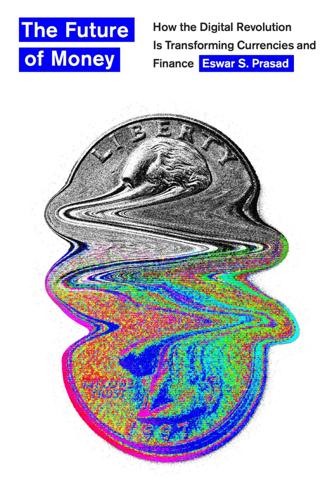
The Future of Money: How the Digital Revolution Is Transforming Currencies and Finance
by
Eswar S. Prasad
Published 27 Sep 2021
Unlike traditional bank accounts, M-PESA accounts can be opened without the minimum deposits that are sometimes beyond the financial capacity of poor households that lead a hand-to-mouth existence. Users of a Safaricom SIM card who want to register for M-PESA have to do so with a valid government ID such as the Kenyan national identification card or a passport. This helps to combat fraud and also ensures that each transaction is marked with the identification of the transacting parties. Users with no bank accounts can access the numerous M-PESA outlets distributed across the country. Cash collected from M-PESA is deposited in accounts held by Safaricom, which serve as checking accounts and are insured for up to one hundred thousand Kenyan shillings (about $925 in May 2021) by the government’s Deposit Protection Fund.
…
Mobile Money For an analysis of the rising penetration rate of mobile phones in low-income countries, see World Bank Group, World Development Report 2016: Digital Dividends, 2016, http://documents1.worldbank.org/curated/en/961621467994698644/pdf/102724-WDR-WDR2016Overview-ENGLISH-WebResBox-394840B-OUO-9.pdf. For annual per-capita incomes in low-income economies, including India and Kenya, see https://datahelpdesk.worldbank.org/knowledgebase/articles/906519-world-bank-country-and-lending-groups. M-PESA For more information on M-PESA, see https://www.safaricom.co.ke/personal/m-pesa and https://www.vodafone.com/what-we-do/services/m-pesa. The World Bank estimates that 17.8 percent of Kenya’s population had internet access in 2017; in the same year, there were 85.3 mobile cellular subscriptions per one hundred people. See https://data.worldbank.org/indicator/IT.NET.USER.ZS?
…
At a practical level, though, this relatively simple innovation has already had a far greater impact on the lives of a large number of people because it connects them to the financial system and gives them access to the services that such a system can provide. It also provides a gateway through which more innovative financial products can reach large populations in relatively poor countries. M-PESA In 2007, Kenya’s largest mobile phone operator, Safaricom, introduced a simple but revolutionary concept. M-PESA is a mobile banking service that enables users to store and transfer money through their mobile phones. M stands for “mobile,” and pesa means “money” or “payment” in the Swahili language. The concept was revolutionary because it used SMS (text) messages to conduct basic banking and payment transactions, rather than relying on physical banks or internet access.
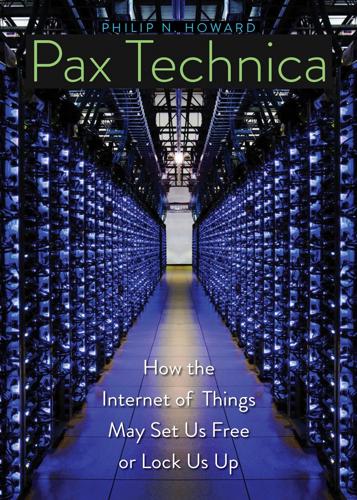
Pax Technica: How the Internet of Things May Set Us Free or Lock Us Up
by
Philip N. Howard
Published 27 Apr 2015
If the state is strong but the society weak, information technologies can do a lot to facilitate new forms of governance.36 Today, wherever financial institutions have failed whole communities, mobile phones support complex networks of private lending and community-banking initiatives. M-Pesa is a money-transfer system that relies on mobile phones, not on traditional banks or the government.37 Airtime provides an alternative currency to government-backed paper. Since several countries in Africa lack a banking sector with regulatory oversight, people have taken to using their phones to collect and transfer value. In the first half of 2012, M-Pesa moved some $8.6 billion, far from chump change.38 Moreover, people make personal sacrifices to gain access to the technology needed to participate in this new institutional arrangement. iHUB research found that people would forgo meat if it would save enough funds to allow them to make a call or to send a text message that might eventually result in some economic return.39 A typical day laborer in Kenya might earn a dollar a day, but the value of personal sacrifice for cell phone access amounts to eighty-four cents a week.40 Two-thirds of Kenyans now send money over the phone.
…
These days, in response, whenever or wherever financial institutions have failed whole communities, mobile phones support complex networks of private lending and community-banking initiatives. Plenty of other large projects involve institutional innovation through technology, so let’s evaluate a few. M-Pesa is a money-transfer system that relies on mobile phones, not banks or the government.8 Airtime itself has become a kind of transferable asset alternative to government-backed paper currency.9 M-Pesa is popular in Kenya, but almost every country in Africa has an equivalent service because the banking sectors are either corrupt, too small, or just not interested in serving the poor. Since the “governance good” that can come from having a banking sector that gets some regulatory oversight is missing, people have taken to using their phones to collect and transfer value.
…
Such projects, for example, use device networks to bear witness, publicize events, produce policy-relevant research, and attract new members.46 These may seem like isolated examples, but the reason such initiatives are important is that they are contagious. In the past ten years, we’ve gone from imagining that the internet might one day change the nature of governance to finding a plethora of examples of how this is done. Cell phone companies across Africa, Latin America, and Asia now offer asset-transfer systems, many of which are structured like M-Pesa. International aid can help to prop up a failing state and fund rebuilding operations in a state that has failed. Of course, people do the hard work of rebuilding. In the new world order, as people see their state falling apart, they pull out their mobile phones and make their own arrangements. Aging dictators may hold together dirty networks, but in many countries there are inspiring blooms of digital activism.
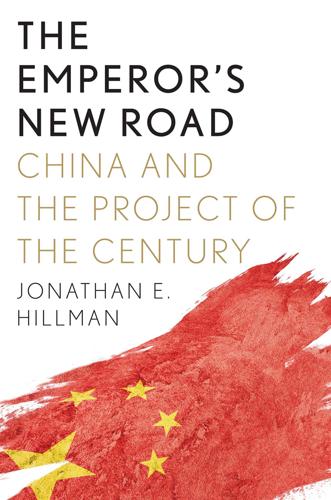
The Emperor's New Road: How China's New Silk Road Is Remaking the World
by
Jonathan Hillman
Published 28 Sep 2020
Quoted in Miller, Lunatic Express, Kindle loc. 4761–4790. 103. Quoted in Miller, Kindle loc. 5668. 104. Njuguna Ndung’u, “M-Pesa—A Success Story of Digital Financial Inclusion” (Practitioner’s Insight, University of Oxford Blavatnik School of Government, Oxford, UK, July 2017), https://www.bsg.ox.ac.uk/sites/default/files/2018-06/2017-07-M-Pesa-Practitioners-Insight.pdf. 105. Duncan Miriri, “Kenya’s Safaricom FY Earnings Jump on Upbeat M-Pesa Growth,” Business Report, May 4, 2019, https://www.iol.co.za/business-report/international/kenyas-safaricom-fy-earnings-jump-on-upbeat-m-pesa-growth-22440491. 106. Cynthia Ilako, “Mobile Cash Transactions Averaged Sh15 Million per Minute in 2018,” Star, April 2, 2018, https://www.the-star.co.ke/business/2019-04-02-mobile-cash-transactions-averaged-sh15-million-per-minute-in-2018/. 107.
…
On a Saturday morning in Nairobi, a large electronic board signaled that there were about thirty first-class tickets and four hundred second-class tickets still available half an hour before departure. Passengers can book their tickets in advance online and pay from their phones with M-Pesa, Kenya’s mobile payment system that has become an inspirational example of how local innovation can catapult African economies ahead of developed economies. When M-Pesa was launched in 2007, nearly three out of four Kenyans lacked access to formal financial services. A decade later, the ratio was reversed, with three out of four having access.104 M-Pesa also reflects Kenya’s shift toward China. A U.S. company, IBM, ran the system’s original servers, which were based in Germany.
…
A U.S. company, IBM, ran the system’s original servers, which were based in Germany. As demand increased, Safaricom decided to move the servers to Kenya, expanded them, and made Huawei its technical partner. Huawei not only provided the servers but also helped to design the M-Pesa platform, an app that was installed on twenty-one million phones as of 2019.105 In 2018, the equivalent of over 90 percent of Kenya’s GDP went through M-Pesa and, by design, through Huawei’s servers.106 The SGR’s embrace of new tools should have resulted in productivity gains, but whether out of cautious planning or pressure to create jobs, the Nairobi station did not appear to have reaped those rewards.
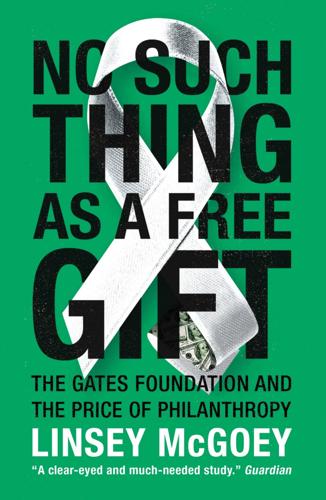
No Such Thing as a Free Gift: The Gates Foundation and the Price of Philanthropy
by
Linsey McGoey
Published 14 Apr 2015
In 2003, for example, the UK’s Department for International Development (DFID) provided just under £1 million in a donation to Vodafone to establish M-PESA, a system allowing villagers in Kenya to pay bills via text messages on their mobile phones. By 2007, Vodafone and Saraficom, a Kenyan company partly owned by Vodafone, had M-PESA up and running. Within two years, more than 20 per cent of Kenya’s population was registered for the service, and the M-PESA scheme accounted for a significant portion of Safaricom’s £150 million annual profits. By 2008 Safaricom wasn’t simply Kenya’s largest company – it had grown to be the largest and most profitable company in all of East Africa.31 In 2007, Vodafone partnered with Citibank to extend the M-PESA scheme worldwide.
…
By 2008 Safaricom wasn’t simply Kenya’s largest company – it had grown to be the largest and most profitable company in all of East Africa.31 In 2007, Vodafone partnered with Citibank to extend the M-PESA scheme worldwide. In 2010, the Gates Foundation offered a nonrepayable grant of $4.8 million to Vodacom, a Vodafone subsidiary, to enable the company to roll out M-PESA in Tanzania. The following year, it offered Vodacom an additional $2.9 million grant.32 By December 2011, Vodafone, the second-largest mobile operator in the world, had a market capitalization of £89.4 billion. In 2010, the London-based company came under criticism for tax avoidance schemes that enabled it to save approximately £6 billion in revenue by routing the acquisition of a German corporation through a Luxembourg subsidiary.
…
Which was lucky for Vodafone, because a company rep has gone on record stating that without the £1 million from DFID, he could never have persuaded Vodafone executives to invest in the venture.33 Most popular press articles on M-PESA celebrate the entrepreneurial acumen of Vodafone and Safaricom. They don’t mention DFID. A recent article in Wired, for example, hails M-PESA as a ‘non-governmental, cashless system’, calling it a ‘rare example of Africa successfully leapfrogging the developed world’s legacy infrastructure and moving straight into a mobile system’.34 Despite the fact that private companies are often remarkably risk-averse, begging governments for a leg-up on innovation ladders, there’s a widespread belief among the public and economists that private actors are inherently more innovative and entrepreneurial than governments.
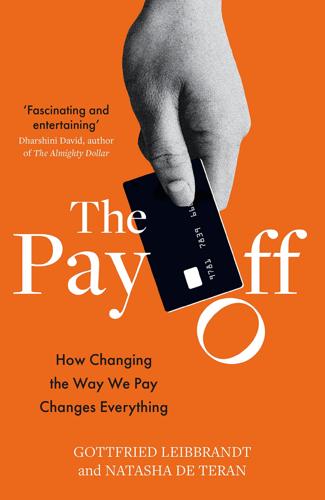
The Pay Off: How Changing the Way We Pay Changes Everything
by
Gottfried Leibbrandt
and
Natasha de Teran
Published 14 Jul 2021
Share of non-cash transactions by country, 2019. M-Pesa was established in 2007 by Vodafone’s Kenyan associate, Safaricom, using simple text messages to transfer money from pre-paid balances – a currency of phone-minutes. The system worked on every phone, even simple models with no smartphone features. To allow customers to convert their phone-minutes back into cash, M-Pesa used a network of vendors who sold pre-paid phone cards. These vendors were already taking in cash from people who bought the pre-paid cards; now they were also acting as human ATMs, dispensing cash to customers while debiting their M-Pesa accounts. The take-up of this system has been phenomenal.
…
Compare this to Western countries, where it typically takes over twenty years for new payment technologies to achieve full adoption. Within its first decade, M-Pesa reached thirty-five transactions per inhabitant per year. Alipay was launched three years before M-Pesa. It started as an online PC-based solution but only really took off in about 2013, thanks to almost ubiquitous smartphone ownership in a country of 1.4 billion inhabitants (compared with Kenya’s 51 million). M-Pesa and the two Chinese mobile wallets are closed systems within which users can easily transfer money to other users. Customers have to maintain account balances in the system(s) they use through being paid by other people, by transferring money in from their bank accounts or – as in Kenya – by depositing cash at appointed providers.
…
Kenya and China faced both an opportunity and a challenge: with no established systems in place they had no legacy to contend with, but neither did they have existing ‘rails’ on which to process payments. Instead, they both made use of near-ubiquitous mobile phone ownership – and yet the two country’s systems are very different. Why? Well, partly because neither country’s systems started completely from scratch: both used some form of existing base, which shaped how they then developed. Kenya’s M-Pesa was designed for basic mobile phones that could only send text messages. It also made smart use of the fact that most Kenyans had pre-paid phone accounts and capitalised on the reseller network that sold pre-paid cards. China’s systems came a little later, when everybody had smart(er) phones and they were therefore able to take advantage of the functionalities these offered.
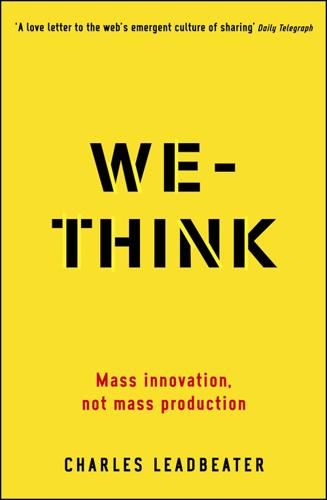
We-Think: Mass Innovation, Not Mass Production
by
Charles Leadbeater
Published 9 Dec 2010
In 2004 Vodafone’s Kenyan affiliate, Safaricom, and the UK government’s Department for International Development (DFID) each invested about £900,000 in M-PESA (pesa means money in Swahili) which allows someone to use their mobile phone like a credit card or bank account. An M-PESA member can go to a mobile-phone airtime provider, usually a local shop, and upload some credit from their telephone service providers. They can use the credit themselves or transfer it to another user directly, without going through the bank. Kenya has few banks but lots of airtime dealers. Overnight M-PESA created a low-cost banking infrastructure that can be used from dawn till midnight, ideal for a highly distributed and poor population who transfer small sums: in the pilot phase of the project the average transfer between users was $4.50.
…
Professionals create a distribution bottleneck, which is why the most imaginative social innovations in the developing world, such as Grameen, employ barefoot models of organisation. What will happen when these bottom-up, self-help models are combined with low-cost communications technologies that allow mass collaboration? One glimpse of the future is M-PESA, a micro-finance pilot in Kenya, which uses mobile phones to connect borrowers and lenders. Only 1.3 per cent of Kenyans have Internet access and there are only 300,000 land-line telephones in the country, mainly in government offices. Only 10 per cent of people, mainly in towns, have bank accounts.
…
Overnight M-PESA created a low-cost banking infrastructure that can be used from dawn till midnight, ideal for a highly distributed and poor population who transfer small sums: in the pilot phase of the project the average transfer between users was $4.50. In February 2007 Vodafone announced a joint venture with Citibank to take the M-PESA model worldwide, targeting transfers from the world’s 190 million migrant workers back to their families, transfers worth in total about $268 billion a year. The reach of services using mobile phones could be vast. In 1996 there were 15 million telephone lines in Africa. In 2004 Africa added 15 million new mobile-phone subscribers, and a report commissioned by DFID estimates that by 2010 there could be 200 million.
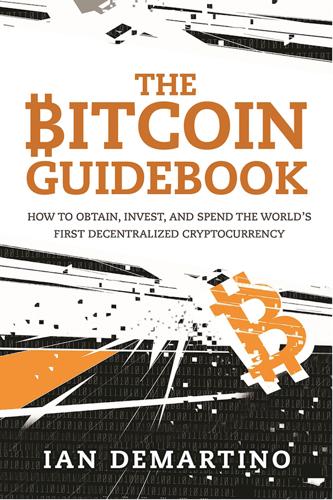
The Bitcoin Guidebook: How to Obtain, Invest, and Spend the World's First Decentralized Cryptocurrency
by
Ian Demartino
Published 2 Feb 2016
It’s a bit as if PayPal were created by AT&T and existed solely on cell phones, and there were money-exchange stores all over the nation where you could withdraw cash from your account or pay bills directly. This penetration has led to attempts by Bitcoin remittance companies to piggyback off the success of M-Pesa’s success and use it for the last mile of Bitcoin remittance in Kenya. Both igot and BitPesa integrate with M-Pesa and expand the advantages it offers for domestic remittance internationally. People can send Bitcoin to their families in these countries using their cell phones; the recipients can use their own phones to exchange that money into M-Pesa money that can then be turned into fiat as it normally is.14,15 Bitcoin needs use cases beyond speculative trading and the purchase of black-market and gray-market goods.
…
Bitcoin is limited only by cell and Internet signals, and the areas they reach are expanding all the time. Not having to travel to perform banking services has proven to be very effective in turning the unbanked into the banked. M-Pesa is a mobile banking solution that was built by Safaricom, Kenya’s largest cell phone operator. It has been essential for remittance within Kenya (from urban immigrants to their rural hometowns) and basic banking services for Kenya’s lower classes. M-Pesa is nothing like a cryptocurrency; it is centralized and keeps track of fiat balances rather than acting as its own currency. It’s a bit as if PayPal were created by AT&T and existed solely on cell phones, and there were money-exchange stores all over the nation where you could withdraw cash from your account or pay bills directly.
…
“World Bank: 75 Percent of Poor Don’t Have Bank Accounts.” CNN. April 19, 2011. Accessed June 22, 2015. http://www.cnn.com/2012/04/19/business/poor-bank-accounts/index.html. 14 Torpey, Kyle. “Bitcoin Exchange Igot Launches in Kenya via M-Pesa Integration.” Inside Bitcoins. February 25, 2015. Accessed June 22, 2015. http://insidebitcoins.com/news/bitcoin-exchange-igot-launches-in-kenya-via-m-pesa-integration/30194. 15 Vigna, Paul. “Kenya’s BitPesa Launches Beta Test of Remittance Service.” MoneyBeat RSS. May 23, 2014. Accessed June 22, 2015. http://blogs.wsj.com/moneybeat/2014/05/23/kenyas-bitpesa-launches-beta-test-of-remittance-service/.
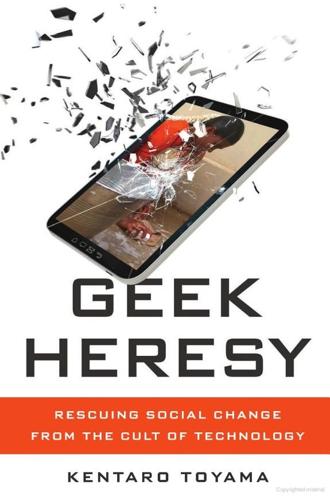
Geek Heresy: Rescuing Social Change From the Cult of Technology
by
Kentaro Toyama
Published 25 May 2015
Examining the adoption, usage and outcomes of mobile money services: The case of M-PESA in Kenya. PhD Thesis, University of Edinburgh, https://www.era.lib.ed.ac.uk/bitstream/1842/5558/2/Morawczynski2011.pdf. Morawczynski, Olga, and Mark Pickens. (2009). Poor people using mobile financial services: Observations on customer usage and impact from M-PESA. CGAP Brief, Aug. 2009, https://www.cgap.org/sites/default/files/CGAP-Brief-Poor-People-Using-Mobile-Financial-Services-Observations-on-Customer-Usage-and-Impact-from-M-PESA-Aug-2009.pdf. Morozov, Evgeny. (2011). The Net Delusion: The Dark Side of Internet Freedom.
…
For a comprehensive overview of telecenter research, see Sey and Fellows (2009). 9.Digital Green was modeled on another project we supported at Microsoft Research India called Digital StudyHall (n.d.). 10.Gandhi et al. (2009). 11.For an alternate description of Digital Green, see Bornstein (2014). 12.Jack and Suri (2011), Mbiti and Weil (2011), and Morawczynski and Pickens (2009) all report that the frequency of urban-rural remittances is greater with M-PESA. Mbiti and Weil (2011) and Morawczynski and Pickens (2009) also suggest that the total amount of remittances is greater. Morawczynski’s (2011) PhD thesis looks at M-PESA’s rise and usage patterns in depth. 13.It’s very tempting at this point to suggest that Partner X become the go-between between the Internet and Partner X’s constituents. Whatever pregnant mothers want to know, Partner X would look up online and relay to the mothers.
…
See Radio; Television The Matrix (film), 54 Mazdoor Kisan Shakti Sangathan (MKSS), 113 McFerrin, Bobby, 91 McGonigal, Jane, 115 Measles, 65, 212 Measurement, fetish of, 91–95 Medhi, Indrani, 27–28, 189 Memorabilia (Xenophon), 209 Menon, Geeta, 17 Mentorship aspirations, 199–201 building the relationship, 197–199 business, 205 corruption, 198, 202, 271–272(n12) difference from other approaches, 198, 202–203, 205 hope, 271(n9) incentives, 272(n15) intrinsic growth, 201–202 moral responsibility for outcomes, 271(n11) multilevel application, 208–209 packaged interventions and, 206–208 teaching as, 202–203 time commitment, 203–204 youth development, 272(n16) See also Education and training Merchants of Culture: The Publishing Business in the Twenty-First Century (Thompson), 75–76 Meritocracy, 79, 93, 96, 97–98, 181 Mexico: for-profit microlending, 58–60, 66–67, 236(n7) Microcredit alternatives to, 57–60 beneficiary demographics, 61 evaluation of, 59–61, 236–237(n14) financial education, 124 global spending on, 72 importance of implementation, 61, 66–72 packaged intervention, 57–61, 66–72 India’s failed institutions, 236(n7) India’s self-help groups, 196 leaders, implementers, and beneficiaries, 66–68 Microfinance Information Exchange, 72 Microsoft Corporation, xi–xiv, 4, 7, 44, 114, 159–160, 162, 164, 166, 183–184, 227(n2) Microsoft Research India, xiv, 3–7, 17–20, 27–29, 31–32, 103–109, 122–125, 141–142, 183–184, 188–189, 227(n6), 247(n9) Miguel, Ted, 143–144 Mill, John Stuart, 88 Mischel, Walter, 173, 251–252(n15) Mitra, Sugata, 11–12, 125, 228(n24) Mobile phones Arab Spring, 33 aspirational consumption, 200–201 digital divide, 234(n24) international development, ix–xi, 25, 28, 37, 49, 69, 91, 108, 110, 209, 234(n24) interpersonal communication, 29, 40–41 micro-entrepreneurs, 28 saving the world with, ix–xi, 91, 110, 234(n24) texting, 25, 56, 69, 235(n33) unintended consequences of technology, 56 See also M-PESA transfer system Modernization, 174–188 aspirations and, 178–182 India, 3, 174–177, 182, 185 Japan, 179, 266(n11) mass values, 179–182 process of, 178, 266–267(n11) United States, 177–178 See also Economics; International development Money transfer systems, 108, 247(n12) Moral relativism, 97, 169, 263–264(n44) Moral self-licensing, 86, 243(n34) Morozov, Evgeny, 23, 35–36, 214, 236(n1) Morsi, Mohamed, 62 Motivation, 90, 126–129, 162–164, 259(n6). See also Maslow’s hierarchy of needs M–PESA transfer system, 108, 247(n12) Mubarak, Hosni, 37 MultiPoint, 4–5, 15–16, 29–30, 227(n2) Mumford, Lewis, 37 Murphy, Tim, 42 Music advantages of learning, 192–193, 208 distraction of, 119, 123, 231(n25) Law of Amplification, 38–40 marketing, 233(n1) self-actualization, 168, 186 Shanti Bhavan curriculum, 141 shrinking middle, 76 Venezuela’s El Sistema, 193–194, 207–208, 270(n2), 273(n23) See also Walkman, Sony Mycoskie, Blake, 84–87, 243(n31) The Myth of the Machine (Mumford), 37 Nakkalbande, Bangalore, India, 17–19 Narasimha (cab driver), 174–177, 188 Narcissism, 166, 262(n34), 275(n4) National development.
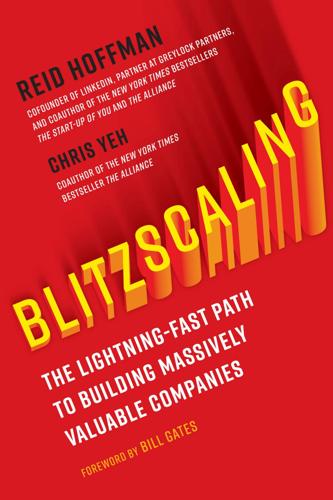
Blitzscaling: The Lightning-Fast Path to Building Massively Valuable Companies
by
Reid Hoffman
and
Chris Yeh
Published 14 Apr 2018
Founded May 1999, Buenos Aires, Argentina/Stanford, CA MICROSOFT Microsoft.com Microsoft develops, manufactures, licenses, supports, and sells computer software, consumer electronics, personal computers, and services. Based on revenue, it is the world’s largest computer software maker. Founded April 1975, Albuquerque, NM M-PESA vodafone.com/content/index/what/m-pesa.html M-Pesa is a mobile phone-based money transfer, financing, and microfinancing service that launched in Kenya but serves markets around the world. Founded March 2007, Nairobi, Kenya NETFLIX Netflix.com Netflix is an Internet entertainment service that offers its members TV shows and movies, including original series, documentaries, and feature films.
…
Indian e-commerce giant Flipkart has raised nearly $7.3 billion from investors around the world, including Accel (Silicon Valley), Tiger Global (New York), Naspers (South Africa), GIC (Singapore), and SoftBank (Japan). Its founders, Sachin Bansal and Binny Bansal—the two are not related—both worked for Amazon. Africa is pioneering mobile services like the M-Pesa mobile payment system, which was developed in the UK, managed by IBM in America, and whose technology is now managed by Huawei in China. M-Pesa accounted for $28 billion in transactions in Kenya in 2015; for comparison, Kenya’s GDP that year was $63 billion. Latin America represents a fast-growing, largely Spanish-language market. Israel, which boasts more start-ups per capita than any other nation, is a leading center for cybersecurity companies and is also home to a thriving venture capital community.
…
We believe that blitzscaling can bring that kind of economic miracle to other areas of the world, and that educated blitzscalers will be more likely to fulfill their ethical obligations to strive for positive societal impact. Consider, for example, the positive impact that the mobile banking service M-Pesa has had in Africa since its introduction in 2007. It has raised incomes, boosted economic growth, and financially empowered women. When Alexander Hamilton proposed a nationwide banking system for the United States in the 1790s, it took nearly a century for his vision to be realized. Thanks to blitzscaling, M-Pesa did this for multiple countries in just ten years. Progress occurs when new ideas emerge and spread. Sometimes these ideas take the form of technologies like the printing press or the smartphone, and other times they remain abstract, like democracy or capitalism.
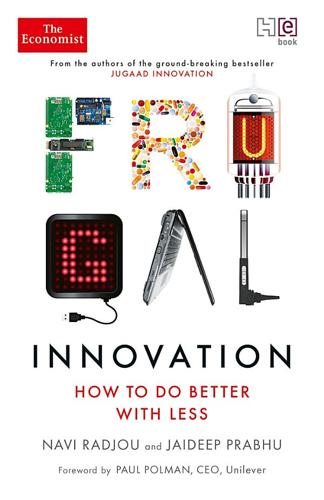
Frugal Innovation: How to Do Better With Less
by
Jaideep Prabhu Navi Radjou
Published 15 Feb 2015
In November 2013, IBM inaugurated its first African R&D lab in Nairobi, Kenya – a Silicon Savannah – a frugal innovation hotbed that draws on mobile phone technology. Nearly 20 million Kenyans now use M-Pesa, a mobile-based money transfer service whose users do not need a bank account (indeed, many Kenyans may decide that they will never need one). Over 50% of Kenya’s GDP flows through M-Pesa. Charles Graeber, a Bloomberg BusinessWeek contributor, spent ten days in Kenya with no cash or debit or credit card, relying on his phone to pay for taxis, food, accommodation and even safari tours. He concluded:24 “I feel like a caveman who’s just been handed a Bic lighter.” Increasingly, M-Pesa is becoming the source of other disruptive business models in energy, education and health care.
…
Increasingly, M-Pesa is becoming the source of other disruptive business models in energy, education and health care. M-KOPA, a solar lighting solution, allows Kenyans to lease the solar equipment and make micro-payments using M-Pesa. When all the instalments have been paid, consumers own the product and receive free, clean electricity. M-Pesa and M-KOPA embody kanju, an African “make do” attitude that makes the best use of what people already have – mobile interconnectivity and abundant sunshine.25 Researchers at IBM’s Nairobi lab use kanju to improve the city’s traffic congestion, which is among the worst in the world. They have adapted a clever solution, Megaffic, originated by their Japanese colleagues, which optimises traffic flows by predicting congestion points and offering drivers alternative routes.
…
The so-called last-mile challenge exists because it is costly for companies to deploy physical distribution (such as bank branches or retail stores) in places with few users. Innovative distribution models, which make use of trusted locals and networks, are often used in emerging markets. These include using corner shops for financial services (for example, M-Pesa in Kenya) and community personnel to sell consumer goods (for example, Unilever’s Project Shakti and Essilor’s door-to-door ophthalmic-lens salespeople in rural India). US and European companies can use such proximity networks to solve the last-mile problem in Western markets as well. Integrating manufacturing and logistics In the mass-production model, companies first make their products and then move them to customers.
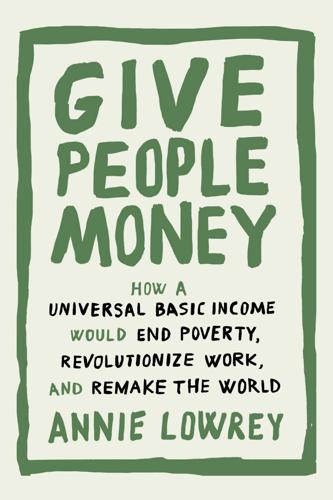
Give People Money
by
Annie Lowrey
Published 10 Jul 2018
The telecom giant Vodafone and the British Department for International Development decided to make it easier to transfer shillings from cell phone to cell phone, and helped to launch a service called M-Pesa. The country’s ubiquitous green Safaricom shacks turned into tiny banks, where Kenyans could add money to their phones and send it to one another. Over dozens of emails, dinners in student housing, and chats in their Harvard Square offices, Faye and his friends decided to set up a website that would raise money from donors in the United States and send it to very, very poor Kenyans via M-Pesa. The recipient would have the power to spend it on what he or she wanted or needed, rather than accepting whatever handouts that aid groups had on offer.
…
Wearing a shirt from the El Cortez casino in Las Vegas and a baby-pink digital watch, Ager skeptically examined his brand-new Nokia phone. Up until then, he had been taking his earnings—he helped two widows with their livestock—and sending them back to his wife in another village using someone else’s M-Pesa account, he explained. He had no idea how to use a phone himself. Orwa showed him how to scroll on the phone’s small screen and how to check his text messages. “We’re trying to avoid him giving his phone to someone else to help him find his money,” she leaned over to tell me. “Because if he does, he will be very vulnerable.”
…
“One day, a hyena came and took one of my she-goats, dragging her by the legs. She had just given birth to a kid, and it was a pity seeing the kid helpless and so frail. I had to ask my neighbor whose goat had given birth too, to let her goat adopt my new kid so she could suckle and at least have a chance at life.” At 10:43 on the morning of October 24, 2016, the first M-Pesa payments went out to the residents of the village. At the time, Caroline Akinyi Odhiambo was nursing her toddler daughter on a stool in her mud hut as thin chickens wandered in and out, looking for bugs. Her husband, Jack, called from the construction site where he was working to tell her to look at her new mobile phone.
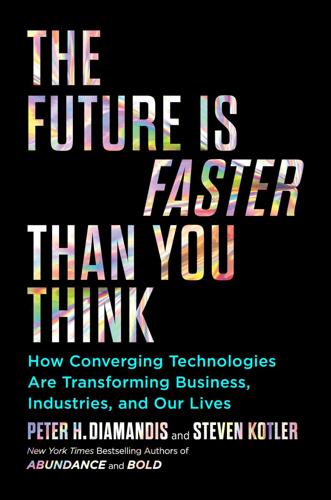
The Future Is Faster Than You Think: How Converging Technologies Are Transforming Business, Industries, and Our Lives
by
Peter H. Diamandis
and
Steven Kotler
Published 28 Jan 2020
Eight months after launch, a million Kenyans were using M-Pesa. Today, it’s nearly the entire country. According to research done at MIT, with nothing more than access to basic banking services, M-Pesa lifted 2 percent of Kenya’s population—over two hundred thousand people—out of extreme poverty. Nor is it just Kenya. M-Pesa now provides banking services to over 30 million people in ten different countries. In places rife with corruption, it’s become a way for governments to protect against graft. In Afghanistan, it’s how they now pay the army. In India, it’s pensions. And it’s no longer just M-Pesa offering such services. In Bangladesh, bKash now serves over 23 million users; in China, Alipay serves just shy of a billion.
…
A micro-loan for a cow, motorbike, or sewing machine—that is, the startup costs for a small business—is often the start of the end of the cycle of poverty. By giving people a way to withdraw and repay their loan via cell phone minutes, the Department suspected they might jump-start entrepreneurship in countries that needed it most. The result of this collaboration was M-Pesa, which was initially rolled out in Kenya in 2007. Without bank branches or ATMs, M-Pesa relies on an ancient technology: people. Individual agents sell cell-phone airtime in local markets, trading minutes for cash and vice versa. Customers load the airtime to their SIM card, then to their phone, turning the minutes into money, which can be sent to another via text message.
…
while over two billion people in the world still lack bank accounts: Niall McCarthy, “1.7 Billion Adults Worldwide Do Not Have Access to a Bank Account,” Forbes, June 8, 2018. See original data here: https://globalfindex.worldbank.org. An Unusual Proposition Vodafone’s Nick Hughes: For a comprehensive look at the MPESA story, see Tim Harford, Fifty Inventions That Shaped the Modern Economy (Penguin, 2017), p. 228. The result of this collaboration was M-Pesa: Ibid. p. 229. 12 percent: Western union fees range from 2 percent to 30 percent depending on where you are and how much you’re transferring. See their fee table here: https://www.westernunion.com/content/dam/wu/EU/EN/feeTableRetailEN-ES.PDF. Eight months after launch: Harford, Fifty Inventions, p. 229.
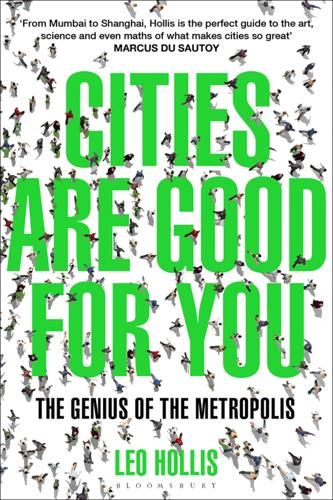
Cities Are Good for You: The Genius of the Metropolis
by
Leo Hollis
Published 31 Mar 2013
In 2010 there was a monthly gross transfer of funds of US $320 million, a factor of approximately 10 per cent of Kenya’s GDP as well as $650 million in deposits and withdrawals. That year seventy-five companies also moved their payment systems onto M-Pesa, including the largest electricity utility company, which now services 20 per cent of its 1 million customers through the network. An advertisement for M-Pesa Yet the average M-Pesa user has only $2.30 in their account; only 1 per cent of account holders have more than $13 in total. Despite the fact that the network handles a vast number of transactions, they are usually very small.
…
Once you’re signed in, the facility is also easy to use and launches from the phone’s main menu, asking the user for identification and validation before offering a selection of services; for a money transfer, the user is asked to identify the recipient’s phone number and the sum to be sent, and then to confirm the whole transaction. M-Pesa offers a new access to banking, but also has an impact on the real economy. In comparison to the sparse distribution of banks, Safaricom now offers M-Pesa from over 23,000 authorised outlets, ranging from dedicated booths painted in the distinct green of the network’s logo to supermarkets, phone shops, petrol stations and other banks. The other thing to note is the sums of money that are being distributed through the network.
…
As a result of these two problems, one of the key innovations that has occurred in Kenya is the exponential rise of M-banking: using the mobile phone to transfer money. In 2006 the London-based team within Vodafone UK, led by Nick Hughes and Susie Lonie, and sponsored by the Department for International Development, developed M-Pesa (‘M’ – ‘mobile’, ‘pesa’ – Swahili for money), a micro-banking facility employing the mobile network to transfer funds, pay bills and deposit and withdraw money. The operation, which was then adopted by Safaricom, was intended to be simple: there are no costs to signing up or making a deposit. Once you’re signed in, the facility is also easy to use and launches from the phone’s main menu, asking the user for identification and validation before offering a selection of services; for a money transfer, the user is asked to identify the recipient’s phone number and the sum to be sent, and then to confirm the whole transaction.
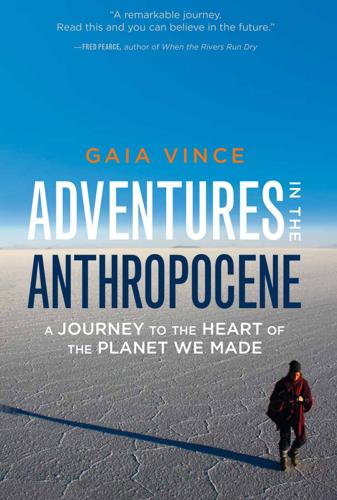
Adventures in the Anthropocene: A Journey to the Heart of the Planet We Made
by
Gaia Vince
Published 19 Oct 2014
Foundation 342 Goodall, Chris 322 Google 28, 44 Google Earth/Maps 51, 366, 367 Goreau, Thomas 167 gorillas 237, 248, 276 granite 299 graphene 317 grasses/grasslands 7, 106, 109, 129, 221, 222, 231, 238, 240, 271, 287 Great Acceleration 3, 8, 307, 320 Great Barrier Reef, Australia 169 Green Revolution 109, 114, 133, 317 greenhouse gases 8, 23, 34, 35, 51, 67, 68, 144, 146 and biofuel production 145 see also carbon dioxide; methane greenhouses 65 desalinated seawater 219–20 Greenland 73, 177, 178, 182, 215 Greenpeace 183 Gregory, John and Sue 153 Grindr app 367 groundwater 47 contamination of 310 extraction of 50, 72, 115, 203, 215, 379 Groupon (online shopping network) 367 guanacos 74 guano 108 Gujarat, India 110–14, 115–16, 212 Guyana Shield 267 Haber, Fritz 108 Hadley Cell 15–16 Hadley Centre for Climate Research 66 Hadzabe people 223–7, 320 Haiti 28, 366 Haiyan, typhoon 66 Hansen, James 177 Hartmann, Peter 80–82, 85, 86 Haywood, Jim 66 HCFCs 374 helium 298, 329 H5N1 influenza 349 HidroAysén (company) 79–80, 86–7 high-voltage direct current (HVDC) lines 213–14 Hilbertz, Wolf 167 Himalayas 19, 40, 46, 47, 51–3 Hippocrates 304 hippopotamuses 207, 229 Hiroshima, bombing of 327 HIV/Aids 135, 198, 234, 245, 283, 349 Ho Chi Minh City, Vietnam 89, 380 Ho Tong Yen 360–61, 362 Hoatzin/‘stink bird’ 271–2 Hobbs, Richard 253–4 Hofmeister, Anke 172 Holocene epoch 4, 7, 8, 9, 17, 238, 264, 299, 338 honey badgers 199–200, 226 honey birds 199–200, 226 Hong Kong 90, 346, 340, 369–70 Hooker, Joseph 285–6 Hoover Dam, USA 77 Huaneng Group: carbon capture facility 330 huemal deer 82, 83 Hulhumalé, the Maldives 162 Hunt Oil 280 hunter gatherers 7, 11, 94, 107, 124, 223–7, 233, 238, 279, 338, 345 Hurricane Katrina (2005) 380 Hurricane Sandy (2012) 379 Huvadhoo atoll, the Maldives 164 hydrocarbon fuels 214, 296 hydrodams see dams hydroelectricity/hydropower 31–2, 39–42, 52, 77–8, 213–14, 327 see also dams hydrogen 16, 214, 298, 329, 365 ‘hydropeaking’ 85 hydropower see dams; hydroelectricity Hydropower Sustainability Assessment Protocol 98 ibex 50, 260 ice ages 7, 17, 34, 264 ice melt 177–81 see also glaciers Iceland 184, 213 ICRISAT see International Crops Research Institute for the Semi-Arid Tropics IGCC see integrated gasification combined cycle power plants IMF 135 Imja glacial lake, Nepal 52 Incas, the 62, 270, 333, 334 Independent 178 India 34, 37, 116–17, 147, 320 air-conditioning units 374 air pollution/‘brown cloud’ 37, 38 aquifers 111, 112, 114 biofuel production 145, 332 coal-fired stations 325 GM crops 140, 141 groundwater extraction 115, 117 irrigation 114, 115, 211 land bought in Africa 102–3 mobile phones 28 Slum-Dwellers International network 350 tanka system 115–16, 117 tigers 244, 247 water shortages 110, 114–15 see also Ladakh India Space Research Centre 112 indium 315–16 indium tin oxide (ITO) 316 Indonesia 2, 35, 129, 256 ‘Indus Oasis’ (casino) 113 Indus River 53, 71–2 Industrial Revolution 3, 35, 263, 300, 307, 310 industrial symbiosis manufacture see ‘closed-loop’ manufacture insects 1, 17, 71, 108, 141, 142, 263, 271, 291 as food 97, 148, 388--9 and pest-control 134 see also ants; bees integrated gasification combined cycle (IGCC) power plants 330, 331, 332 Interface (carpet manufacturer) 319 International Crops Research Institute for the Semi-Arid Tropics (ICRISAT) 139–40 International Energy Agency (IEA) 213, 318, 325 International Institute for Environment and Development 98 International Thermonuclear Experimental Reactor (ITER) 328–9 Internet, the 11, 18, 24, 26, 27, 29–34, 136, 322, 367–9 Inuit, the 182 invasive species 250, 252–6 iron 298, 299, 306, 307 Irrawaddy River 53 irrigation 72, 79, 109, 114, 115, 118, 121, 132, 133, 143 with desalinated seawater 219–20 in deserts 107 drip 112, 113, 114, 120 in India 49, 50, 51, 52, 54, 56, 57, 58, 59, 61, 211 in Libya 215 solar-powered 211 Isiolo, Kenya 193, 194 Isla Incahuasi, Bolivia 334 Israel: electric cars 373 Itaipu dam, Brazil/Paraguay border 102 ITER see International Thermonuclear Experimental Reactor ITO see indium tin oxide Ito, Akinori 326 Ituri Forest, Democratic Republic of Congo 246 ivory trade 198, 246 Jadeja, Hardevsinh 110–14, 143 jaguars 240–43, 237, 247, 260, 270, 275, 278 Janjaweed, the 245 Japan 102, 147, 161, 186, 318–19, 327, 340 jatropha 145 jellyfish 185–6 JET experiment 329 jet stream, the 180–81 Jinja, Uganda 122 Jones, Steve 378 Kalinowski, Celestino 279, 280 Kalinowski, Jan 279–80 Kalundborg, Denmark 320 Kampala, Uganda 112 Kandholhudhoo, the Maldives 160, 161, 163 Karachi, Pakistan: Orangi slum 350 Kathmandu, Nepal 18, 30, 32, 36–7, 39, 42 Kenya 135 drought 193, 195–6, 200–1, 206 education 204–5 206 M-Pesa 28 missionaries/missions 193–4, 199, 202, 204–5, 206–7, 208 pastoralists 196, 201, 205–6, 210 road-building 197–8 shanty towns 350 tribal conflict 193, 194–5, 196–7, 201, 206 see also missionaries; Turkana, Lake Kenya, Mount 46, 235 Kew Gardens, London 286 kha-nyou (rodent) 94 Khone Phaphene Falls, Laos 97 Khulna, Bangladesh 343, 346, 347, 352 Kikwete, Jakaya Mrisho, President of Tanzania 230, 259 Kilimanjaro, Mount 46 Kilimo Trust 120 Kinabalu, Mount 46 kingfishers 268, 271 Kipling, Rudyard 18 Kiribati 174–7 Kissinger, Henry 109 koala bears 237, 250 Kolkata, India: 2 Nehru Colony 366–7 Konik ponies 236 Korea, South 90, 102, 124, 346, 365 POSCO iron and steel consortium 336 krill 180 Kubuqi Desert, China 192 Kyakamese village, Uganda 118–20 Laama, Ringin 40 labour, division of 339 Lackner, Klaus 294, 295–6 Ladakh, India 48–51 artificial glaciers 53, 56–61 Laetoli, Tanzania 223–4 landslides 40, 46, 52 languages 26, 55, 62, 224, 273, 277, 347, 378 Lanzhou, China 362 Laos 88, 97, 98, 99 cluster bombs 90 Communist government 90, 91, 94 opium use 89 road-building 91–2 slash-and-burn 89 see also Mekong River La Paz, Bolivia 274, 275, 310 Las Vegas, Nevada 103, 193 ‘Late Heavy Bombardment’ 298 Laurance, Bill 255 lead/lead mining 301, 310, 315, 316 Leakey, Mary 223–4, 232 legumes 38, 133, 134 Leh, Ladakh, India 50–51, 54–5 leishmaniasis 274 lemurs, Madagascan 247, 250, 256 Lenfest Center for Sustainable Energy, Columbia University 294 León, German Cardinas 348 Leonard, Annie: The Story of Stuff 319 leopards 94, 227, 229 snow leopards 33, 260 leprosy 343 Li Quan 247 Libya: Great Man-made River project 215 Licancabur volcano, Bolivia 333 Licapa, Peru 62–4 ‘light-bulb conspiracy’ 312 lighting/light bulbs 315, 371 Lima, Peru 216–17 asentamientos humanos (AAHH; slums) 62, 217, 218, 347–8, 352 fog-harvesting 217–19 lions 227, 228, 229, 239–40, 248 Liquiñe–Ofqui fault line 85 lithium 332, 335–6 Liverpool 349 livestock 147, 148, 196, 200–1, 206 see also cattle; sheep; yaks llamas 74, 221, 300, 334 logging industry 9, 267, 268, 270, 273, 274, 276, 277, 283, 288, 289--90 Loiyangalani, Kenya 199, 204–5, 206–8 London 317, 349, 350, 364, 372, 378 ‘Gherkin’ 374 ‘guerrilla gardeners’ 377 smog 3, 35 Thames Barrier 379 Lopes, Antonio Francisco Bonfim (‘Nem’) 356 Lord’s Resistance Army (LRA) 126, 245 Loshner, Gabriella 83 Lovelock, James 294 Lowoi (schoolteacher) 201, 202 Luang Prabang, Laos 89 Lugo, Ariel 254 Luis Val, Adalberto 291, 292 Lummerich, Anne 218 Luna, Javier Torres 217–18 Lyme disease 242 lysine 138 Ma’aden aluminium mine, Saudi Arabia 104 Maasai, the 224, 229–31 macaws 268, 271, 278, 281 McDougall, Gerald 188–9 McKinsey (consultants) 103, 319 Macquarie Island: rabbits 255 Madagascan lemurs 247, 250, 256 Madagascar 93, 124, 237, 264 Madidi National Park, Amazon Basin 267, 269–72, 273–4, 277–8 Madre de Dios region, Peru 278–84 Madre de Dios River, Peru 280–81, 283 Madrid: Canada Real Galiana 344 mahogany trees 270, 275, 279, 289 maize 125, 129, 130, 138, 144, 250 Makerere University, Kampala 137, 138 malaria 43, 121, 135, 199, 224, 274, 283, 293, 341, 367 Malawi 135 Malaysia 28 Petronas Towers 370 see also Singapore Maldives, the 152–3, 156--9, 175, 186 artificial islands/floating islands 157, 162–3 coral reefs 158, 159, 160, 161–2, 164, 166–8 ‘designer islands’ 160–61 heroin dependency 156 overfishing 169–70, 171–2 Soneva Fushi 172–3 tourists 153–4, 156, 158, 160, 163, 171, 172, 173 Malé, the Maldives 153, 154, 156, 161 Mamang-Kanga, Jean-Baptiste 245 Manaus, Brazil 290–91 manta rays 170, 185, 245 Manu National Park, Madre de Dios, Peru 278–80 Manu River 280–81 Manu Wildlife Centre 279, 281 marijuana 357, 369 marine reserves 186–7 Mascho-Piro tribe 279 Masdar, Abu Dhabi 366 Matterhorn, the 48 Mawlamyaing, Burma 91 meat consumption 147, 148, 290, 322 Medellín, Colombia 353–4, 357 Mekong River 53, 88–9, 90–91, 95, 99–101, 105 fish/fishing 95–6, 100, 101 hydrodams 83, 88, 89, 91, 92–4, 95–6 meltwater see glaciers Mesozoic era 221 metals 298, 299–300 rare earth 305, 315, 373 see also copper; gold; gold mining; iron; silver; silver mining methane 41, 78, 129, 134, 178, 214 methanol 296 metro/underground systems 346, 353, 354, 357, 364, 372, 373 Mexico City 379 miconia shrub 252 ‘microloan’ cooperatives 130 millets 130, 139, 143 minerals 191, 272, 298–9, 300, 305 mining 8, 9, 300, 308–9 see also coal; copper mining; gold mining; silver mining miscarriages 203 missionaries/missions see Kenya mobile phones/smartphones 27–9, 34, 118, 136, 210, 212, 231, 300, 304, 311, 312, 315–16, 335, 367 see also M-Pesa Mohammed, Fatima 161 Mojave Desert, California 209, 213, 214 monkeys 275, 291 chimpanzees 3–4, 306 howler monkeys 271, 281 spider monkeys 267, 271, 275–6, 277, 278, 281 Monsanto (company) 140–41 Montana, USA 236 Morales, Evo, President of Bolivia 274, 277, 278, 282, 335, 336 Morgan, Ned 121 mosquitoes 47, 274, 293, 341 moths, urban 377 mountains 8, 45–8, 66–7 painting white 62–4 M-Pesa mobile phone banking service 28, 208, 211, 350 mulch/mulching 133, 134, 145 Mumbai, India 344, 374 Murray River 72 Museveni, Yuweri, President of Uganda 126 mussels 187 Mutharika, Bingu wa, President of Malawi 135 Mwanawasa, Levy, President of Zambia 175 Nagasaki, bombing of 327 Nairobi 200, 207, 209, 210, 344 Nakai, Laos 92–4 Nam Theun II dam, Laos 92–4 Namibia 215, 216, 362 Nangi, Nepal 21, 24, 25–7, 30–32, 33, 36, 43 Napoleon Bonaparte 285 NASA 177, 294, 333 NaSARRI see under Uganda Nasheed, Laila 154 Nasheed, Mohamed (‘Anni’), President of the Maldives 153–8, 160, 161, 163, 172, 173–5, 190 National Geographic 273 Neanderthals 2, 238, 259, 306 Neem trees 134 Nepal 18–20, 21–3, 24–7, 43 Bengal tigers 243–5 electricity 20, 27, 41–2, see also hydropower (below) glacier melt 37, 40–41 hydropower 31–2, 39–40, 41 Internet/Wi-Fi 24, 27, 30–31, 32, 33, 34 tourism 32–3, 39 yak herders 24, 33, 37, 40 see also Kathmandu; Nangi Netherlands, the 236–7, 379 New Guinea: rainforest 264 New Orleans: and Hurricane Katrina 380 New Songdo City, South Korea 365 New York City 35, 317, 349, 350, 365, 378, 379 Bank of America Tower 371 raised railway park 377 water sources 104 New York Times 77 New Zealand 47, 175, 184, 237, 308 Ngorongoro Crater, Tanzania 224, 228–30 Niger Delta 309 Nigeria 114 Nile, River 71–2, 79, 103, 122, 204, 207 Nineveh 339, 340 nitrogen 8–9, 16, 108, 133, 146, 373 nitrogen-’fixing’ plants 133, 136, 142, 143–4 Nomura’s jellyfish 186 Norphel, Chewang 53–9, 60–61, 69 North-East Passage 181 North Pole, the 177, 182 Norway: hydroelectricity 213–14 Nottingham, University of: Frozen Ark project 259 Nubian Sandstone Aquifer 215 nuclear energy/power stations 327–8 nuclear fusion plants 328–30 nylon stockings/tights 312 obsolescence, planned 312–14 oceans 150–52 acidification 3, 9, 152, 153, 165, 168–9 conservation zones/reserves 186–7 phytoplankton 152, 180, 190 pollution 152, 187–9 see also Arctic Ocean; sea-levels, rising ocelots 240 Odentethes hatcheri (fish) 83 Ohtake, Ruy 358 oil/oil industry 23–4, 181–2, 183, 280, 284, 296, 308, 309, 318, 326 oil spills 182 Okehampton, Devon 349 Okello, David Kalule 135–9 Olmaikorit-Oumo, Florence 130 Ologara village, Uganda 125–6, 127–31 Oman: peridotite 296 Omo Valley, Ethiopia 203, 204 Omoding, Ephrem 125, 127 Omoding, Winifred 125–7, 129–33, 143 One-Laptop-One-Child organisation 31 Oostvaardersplassen, the Netherlands 236–7 opium industry 89–90 orang-utans 248, 273, 276–7 Ordos, Inner Mongolia 331, 359 organic farming 133–4 orius (pirate bugs) 219 oryx, Arabian 256 oscar (fish) 291–2 ostriches 197 otters 83, 270 oxygen 16, 142, 214, 285, 293–4 lack of 133, 185, 186, 187, 291–2 and photosynthesis 263, 264, 284, 299 oysters 168 ozone 35, 37, 38, 373 ozone layer 3, 11, 17, 66 painting mountains/roofs white 62–4, 374 palm oil 276, 290 palm trees 172, 204, 266, 270, 293, 343 Panama Canal 320–21 pandas, Chinese 257 Pangaea 45 pangolins 245 Pantanal, the 240–42 Paraguay 102, 240 Parana River 102 Parco, Salamon 62–4 Paris 347, 364, 373 Parker, Ted 280 parks, national 236 see Bardia, Madidi, Manu, Serengeti and Yellowstone National Park Pascua River dam, Patagonia 73, 75–6 passenger pigeons 259 pastoralists 205–6, 210, 214, 220, 225 see also Maasai, the Patagonia 74–5, 81, 86 hydroelectric dams 73–4, 75–7, 79–88 Peak District, England 310 peanuts 118–19, 120, 129, 132–3, 136, 143 genetically modified 138, 139–40 peas 51, 139 peat 263, 310 Pemuteran, Bali 167 peridotite 296 Peru 41, 52, 108, 278–84, 332 mountain painting 62–4 pest-control/pesticides 129, 132, 134, 136, 141, 143, 185, 219, 243, 293 petrels 186 petroleum 309, 325–6 Petronas Towers, Malaysia 370 Phakding, Himalayas 39 pharmaceuticals 272 Philippines 28, 65, 66 Phnom Penh, Cambodia 100 Phoenix, Arizona 103, 193 photography 304 photosynthesis 2, 16, 38, 143–4, 165, 180, 190, 214, 263, 264, 265, 284–5, 291, 293–4, 297, 299, 317 photovoltaic (PV) panels see solar energy Phuktse, Ladakh, India: artificial glacier 58–9 phytoplankton 152, 180, 190 piezoelectric generators 363 Pilon Lajas Biosphere Reserve, Bolivia 278 Pinatubo, Mount (Philippines): eruption of (1991) 65 pine beetles 236 Piñera, Sebastian, President of Chile 80, 87 PlanIT Valley, Portugal 365 plankton 84, 168, 185, 309, 386 see also phytoplankton plants 1–2, 47, 70–71, 262, 263, 288, 326 plastic 5, 187–8, 311 bags 4, 128, 189, 323, 341 3D-printed items 317 turning back into oil 326 plate tectonics see tectonic movements platinum 214, 298 Playas de Rosarito, Mexico: proposed desalination plants 102 Pleistocene epoch 236, 237, 238 plutonium 328 Pokhara, Nepal 18, 19–20, 30 polar bears 178, 187 polio vaccination 367 pollution 310, 312, 318, 321, 330, 360–61 and environmental services fees 322–3 radioactive 7, 11 see also air pollution; ocean; waste; polyester garments 187 population growth 3, 9, 11, 36, 146–7, 251 POSCO iron and steel consortium 336 potatoes, sweet 140, 143 Potosí, Bolivia: silver mines 300–6, 307, 310 prickly pear 251, 256 printers, electronic 313 3-D 317 public transport 345, 372–3, see also metro Puerto Maldonado, Peru 283–4, 288 Puerto Rico, Gran Canaria: International Institute of Tropical Forestry 254 pumas 73 pumps, groundwater 50, 51, 115, 121, 122 see also boreholes; wells Pun, Mahabir 18–19, 21–7, 30–33, 37 Pun tribe 24, 27, 41 Putin, Vladimir, President of Russia 181–2 PV panels see solar energy pyrolysis 326 Qatar 219 Quechua 62, 347 Racoviteanu, Adina 60–61 radio 17–18 Rahmsdorf, Stefan 177 rain/rainfall 15, 37–8, 46, 47, 150, 151 acid rain 3, 310 in Africa 118, 122, 195 artificial production of 66, 132 harvesting and storing 115–17, 121–2, 216 in India 49–50, 111 in Lima, Peru 216, 217 in Uganda 118, 119, 122, 128 rainforests 15–16, 262, 264–5, 272–3 Borneo 264, 276–7 see also Amazon rainforests Raj-Samadhiyala, Gujarat, India 110–14 Rajkot, Gujarat, India 110, 115 Rajoelina, Andry, President of Madagascar 124 rats 250, 255 Ravalomanana, Marc, President of Madagascar 124 recycling see waste; water REDD+ (Reducing Emissions from Deforestation and Forest Degradation) 287–8, 289 redwoods, Californian 218, 293 Rees, Richard 171 refrigerants 17 Reid, Brian 84 reservoir-building 53, 77–8, 104, 112 Restore and Revive 259 rhinoceroses 227, 228, 246, 248, 258 rhododendrons 250 Ribeiro da Silva, José Claudio 268 rice/rice-growing 78, 90, 97, 101, 109, 134, 136, 143–4, 147, 185, 250 genetically modified 140, 141 Rift Valley 203, 223, 232 Rimac River 216 Rio de Janeiro, Brazil: favelas 354–8, 367 Rio Grande 72 rivers 4, 8, 50, 53, 70–73, 104, 308 see also dams and specific rivers road-building Amazon rainforest 281–4 Burma–Vietnam 91–2 Serengeti 258–9 Robichaud, Bill 92, 94 Robinah, Byarindaba 118–20, 121 Rockefeller Foundation 138, 139 ‘rock glaciers’ 60 rocks 2, 46, 74, 108, 299–300 Rome/Romans 34, 307 roofs, whitewashing 64, 374 Roosevelt, Theodore, US President 227 Rotterdam, Netherlands 379 Rubbish Island, 163 Ruiz, Rosa Maria 266–72, 273–4, 275, 277, 278 ruminants 221–2, see cattle Rurrenabaque, Bolivia 265–6, 269 Rwanda: gorillas 276 Sahara Desert 195 aquifers 215 Desertec solar power plant 213 Great Green Wall 192 minerals from 191, 272 salamander, jumping 257 Sale, Peter 164, 167 salmon, farmed 185 salt production 334 Salter, Stephen 66 Samburu tribe 195, 197, 201, 204, 208 Samso island, Denmark 325 San Cristobel, Bolivia: silver/zinc mine 333 San Diego, California: Zoo 259 San people 232–5 Sánchez de Lozada, Gonzalo 273 sand dams 198, 216 sanitation 11, 20–21, 38, 115, 339 see also toilets Santa Cruz, island of, Galapagos 251–3 Charles Darwin Research Station 251–2, 253, 254 Santiago, Chile 75 São Paulo, Brazil: Heliopolis favela 358 saola antelope 94 Sarima, Kenya 201–3 SARS 349 satellites 18, 22–3 mapping by 60–61, 112, 367 Saudi Arabia 102, 104, 308 solar-powered desalination plants 216 superfarms 148 savannahs 221–3, 238, 265 Save the Children 135 scalesia (Scalesia pedunculata) 251, 252, 253 schizophrenia 377 schools see education seabirds 186 sea cucumbers 168–9 seagulls 377 sea-levels, rising 5, 9, 52, 151, 153, 159–60, 174–8, 189–90, 343, 379 Seasteading Institute 189 Semiletov, Igor 178 Seoul, South Korea 346 Serengeti National Park 223, 227–32, 256, 258 Serere bird 271–2 Serere Sanctuary, Amazon Basin 268 service manuals 313–14 sesame seeds 125, 131, 138 Shabab, the 245 Shanghai 35, 89, 211, 321, 322, 379 shanty towns see slums sharks 164, 171–2, 185, 242 whale 170–71 shearwaters 186 sheep 74, 81, 82, 221, 236 Shemenauer, Bob 219 ships 65, 317, 320–21 Shivdasani, Sonu 172–3 Shrestha, Alok 41 Siem Reap, Cambodia 99 silica 84 silicosis 301, 302, 303, 306 silver 304–5, 312 silver mining, Bolivian 300–6, 333 silver nitrate 304 Silvestre, Elizabeth 216–17 Simpson Valley, Chile 83 Singapore 90, 346, 360, 362, 369 Marina Bay Sands 376 Si Phan Don, Laos 95 Siteram (Nepali guide) 243–4 Skarra, Ladakh, India 53 Skinner, Jamie 98 skyscrapers 370–71 slash-and-burn 107, 128, 277 sleeping sickness 225 sloths 237, 250, 270 slums/shanty towns 341–4, 346, 347, 348–53, 366–7, 378 in Brazil (favelas) 354–8, 367 smartphones see mobile phones Smil, Vaclav 250–51 Smithsonian Institute, Washington DC 227 Smits, Willie 276–7 social media sites see Facebook; Twitter soil(s) 108, 127–9, 142 solar energy/power 30, 211–14 combined with wind projects 209, 213, 361 for desalination plants 193, 216, 219–20 for public and private buildings 363–4, 366 panels/photovoltaic (PV) panels 116, 211–12, 214, 315, 331, 332 and payback schemes 211, 212, 323 storage and distribution 213–14, 365 solar radiation management 63–5, 68–9, 132 Soneva Fushi, the Maldives 172–3 sorghum 120, 125, 130, 139, 143, 144 Soroti, Uganda 125–6, 132, 135 Soules, Luke 313, 314 South Africa 118, 236, 351–2 Southern Ice Field 73 soya/soybean 281, 289, 290 Spain 65, 128, 184, 213, 216, 301, 307 spotted fever 242 Stakmo, Ladakh, India 48–50, 61 Stanbic Bank Uganda 120 star coral 257 Starbucks 368 steam power 213, 219, 307, 365 Stone Age 2–3, 307 stoves see cooking stromatolites 16 sturgeon 71 sugar cane 122, 144, 145, 290 Sumatra: rainforest 264 Sumerian cities 339 Sundrop Farms, South Australia 219 sunflowers 125, 131, 138, 145 sunlight see solar energy; solar radiation management Survival International 234 sustainability 323–5, 369, 371, 375–6 Suzano (Brazilian consortium) 290 Svalbard islands, the Arctic 37 Switzerland 20, 21, 48, 60 Syncrude mine, Athabasca oil sands, Canada 4 syngas 296, 330 Syngenta 140–41 Tacana people 269, 277 Taiwan 90, 146–7 tamarin, pied 291 tanka system 115–16 Tanzania 223–4 road-building 258–9 tourism 227, 231 UAE hunting reserves 227, 230 see also Serengeti National Park tapirs 237, 240, 270, 275, 281 tar sands 309 tara trees 218 Target (supermarket) 369 tarpans 236 Tashi (Indian farmer) 48, 49, 61 Tasmanian devils 247 Tasmanian tigers 260 taxes 97, 123, 194, 324, 350, 356, 357, 368, 372 tectonic movements 45–6, 73, 85, 250, 263, 299, 334 telegraphy 27 television sets 313, 314, 315 tenebrionid desert beetle 218 Thailand 90, 91, 93, 100, 256 Thakek, Laos 91, 95 Thar Desert, Rajasthan, India 209 Thiel, Peter 189 Thiladhunmathi atoll, the Maldives 164 Thilafushi, the Maldives 163 Thompson, Lonny 64 thorium/thorium reactors 315, 328 3D printing 317 Three Gorges Dam, China 83 Thupstan (Indian farmer) 50 Tianjin, China Eco-city 360–63, 375 GreenGen energy plant 330 Tiedemann, Kai 218 tigers 94, 243–5, 246–8, 249, 260 tiger wine 245, 246 Tigris, River 71–2 tilapia 207, 208 tin/tin mining 299, 301, 310, 316 tin oxides, non-stochiometric 316 Toba, Indonesia: volcanic eruption 2 toilets 20–21, 25, 26, 113, 115, 116, 348, 363 tokamaks 329 tokay geckos 256 Tokyo: population 340 Tomasetti, Roberto 166–7 Tong, Anote, President of Kiribati 174–6, 190 Tonle Sap, Lake 99–100 Torres, Geronimo 63–4 tortoises 214, 250, 251, 252, 253, 255 Toshiba 314 tourism industry/tourists Amazon rainforest 270, 273, 276, 279 Cambodia 99 and ‘conservation fees’ 248 India 50–51, 57, 244 Maldives 153–4, 156, 158, 160, 163, 171, 172, 173 Nepal 32–3, 39 Serengeti 228, 231 in Tanzania 227, 231 TRAFFIC 245, 246 trains, maglev 372 trees 129, 263 artificial 295–6, 297 fog-trapping 218 see also deforestation; forests tryptophan 138 tsetse flies 225 Tsodilo Hills, Botswana 233 tsunamis 160, 161, 328 tuberculosis 135, 234 Tullow Oil 210 tuna 169–70, 185, 187 tundra, Arctic 178, 293 tungsten 298 tunqui (bird) 279 Turkana, Lake (Kenya) 193, 199, 203–4, 205, 208, 209 and see below ‘Turkana Boy’ 203 Turkana Corridor Low Level Jet Stream 208–9 Turkana solar power station 210–11 Turkana tribe 194–5, 197, 201–2, 204, 207–8, 242, 316 Turkana wind farm 208–9, 210 Turkmenistan 59 turtles 170, 174, 185, 187, 268, 280 Tuvalu 174 Twitter 28–9, 367, 368 Uganda 26, 118–22 agriculture 118–22, 125, 126–33, 135, 136, 137–8, 140, 144 gorillas 276 National Semi-Arid Resources Research Institute (NaSARRI) 130–31, 136, 138 roads 144 United Arab Emirates: Tanzanian hunting reserves 227, 230 United Nations Convention on Biological Diversity 247 Environment programme 37, 248 Food and Agriculture programme 145 GRIDMAP programme 203 United States of America 157 Agency for International Development 133 biofuel production 145 dams 77, 98 maglev trains 372 meat consumption 147, 148 National Ignition Facility, California 329 Natural Resources Defense Council 374 no-till agriculture 142 oil consumption 318 water use 102, 362 see also specific states and towns Ur 339 uranium 308, 315, 327, 328 Uribe, Freddie 342 Uunartoq Qeqertaq 178 Uyuni, Bolivia 332–3, 336–7 salar (salt flats) 333–6, 337 Vabbinfaru, the Maldives 166–7 Vanua Levu, Fiji 176 VCRs 313–14 vegetables 26, 61, 65, 97, 272 see also legumes Venice 168 vetifer 129 Victoria, Queen 27 Vientiane, Laos 91 Vietnam 90, 92, 100–1 floating markets 101 Villa Hermosa, Colombia 341, 342–3, 344, 346, 347, 352 villages 338–9, 378 Vio, Francisco 82 Vishwanath (‘Zen Rainman’) 116–17 vitamin A deficiency 140 VoIP phones 31 volcanoes/volcanic eruptions 2, 5, 36, 65, 66, 68, 73, 79, 85, 299, 333 Vong, Mr (restaurateur) 96–7 Wageningen, Carlo van 210 Walker, Barry 279, 280–81 warthogs 229 waste 310–11, 312–13, 361 electronic 311–12, 313 food 144, 147 plastic 5, 187–8, 326 recycling 319–20, 322, 323, 324, 351 waste-pickers 350, 351–2 water 11, 46–7, 72–3, 215 fetching 202–3 recycling 115, 323, 362–3 ‘virtual water’ trade 102–3 see also aquifers; boreholes; dams; desalination; fossil water; glaciers; groundwater; irrigation; rain; reservoirs; rivers; wells water shortages 72–3, 103–4, 215–16 Africa 118, 121, 122–3, 215 India 49–51, 57, 110, 111–13, 114–15 see also droughts wattieza (plants) 263 wells, hand-dug 121, 122, 132 Westpoint Island, Belize 188–9 wetlands 53, 71, 78, 85 artificial 104–5 whale sharks 170–71 whales 73, 164, 180 wheat 7, 23, 38, 43, 51, 88, 109, 136, 138, 193, 250, 251 Wiens, Kyle 313, 314–15 Wi-Fi 24, 30–31, 32, 356 Wikipedia 12 wildebeest 228, 229, 231, 258 wildlife see animals and specific animals Wilson, E.
…
Smartphones are getting so clever and human-responsive that they will soon be our personal dashboard, telling us how much exercise we do, monitoring our calorie and vitamin intake, our sleep pattern, heart rate, stress levels, cholesterol and so on. Further into the Anthropocene, some researchers believe, we will increasingly think of our smartphone as a partner – even in emotional terms.1 In East Africa, I saw how mobile money services, such as M-Pesa, are enabling phone users to transfer cash and pay for goods with the speed and convenience of an SMS text message.2 A customer pays cash to his local corner-shop agent, who then tops up his mobile money account using a special kind of secure SMS. He can then transfer money to another person or pay for something by sending a text to the recipient’s mobile phone account, which transfers the money straightaway.
…
Even people without mobile money accounts can receive payments in the form of a text code, which can be exchanged for cash by their local corner-shop agent. For the millions of Africans who don’t meet the criteria for a bank account, or who live too far from a branch, mobile money presents an opportunity to save securely for the first time. Kenya’s M-Pesa is now used by over two-thirds of the adult population (more than 17 million people) to pay for everything from school fees to grocery and utility bills, taxi fares to airline tickets. It allows people in remote, rural areas to trade their wares in markets thousands of kilometres away, urban migrants to send money rapidly to their families in their home village, and for the government and aid agencies to distribute timely emergency cash to starving people living in slums.
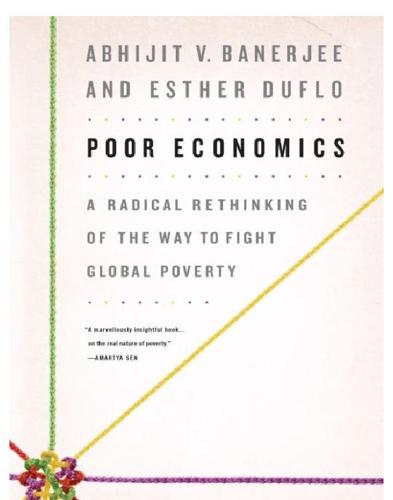
Poor Economics: A Radical Rethinking of the Way to Fight Global Poverty
by
Abhijit Banerjee
and
Esther Duflo
Published 25 Apr 2011
In Kenya, M-PESA allows users to deposit money into an account linked to their cell phones and then use the cell phone to send money to other people’s accounts and to make payments. Someone like Jennifer Auma, for example, could deposit cash at one of the many local grocery shops that happens to be an M-PESA correspondent. This would credit her M-PESA account. She could then send a text message to her cousin in Lamu, who would be able to present the text message to his local correspondent to get his money. Once he gets the cash, the money would be deducted from her M-PESA account. Once M-PESA is linked to banks, people will be able to wire money in and out of their savings accounts using a local M-PESA correspondent, without having to trek all the way to the bank.
…
Once M-PESA is linked to banks, people will be able to wire money in and out of their savings accounts using a local M-PESA correspondent, without having to trek all the way to the bank. Of course, no technology would remove the need for regulation of bank accounts. A part of the problem, however, comes from the fact that under the current regulations only highly paid bank employees are generally allowed to handle depositors’ money. This is probably unnecessary. Instead, the bank could use a local shopkeeper to take deposits. As long as the local shopkeeper issues the depositor a receipt for the money that the bank is legally obligated to honor, the depositor is protected.
…
Banerji, Rukmini Bangladesh Rehabilitation Assistance Committee (BRAC) Bank of America Banking Correspondent Act Bankruptcy Banks problems with Barker, David Basic skills, focus on Basix Becker, Gary Bed nets buying income gain and subsidized Beliefs faith and weak Ben Sedan, Allal Bhopa diseases, doctor diseases and Bloomberg, Michael Bongaarts, John Boyce, Jim Brain process Breast-feeding Bribes Burgess, Robin Business process outsourcing centers (BPOs) Businesses borrowing by investment in poor and Businesses (continued) profits for small/medium starting Calories consumption of production and Capital capitalists without human Case, Anne Castes Casual labor Centers for Disease Control Chattopadhyay, Raghabendra Chavan, Madhav Child mortality Children educated family size and as financial instruments higher-caste/lower-caste income and Chlorin Chlorine Cica Das Citibank Civil liberties Civil society Cohen, Jessica Coimbatore Collier, Paul Common Wealth (Sachs) Community Driven Development Conditional cash transfers (CCTs) Consultative Group to Assist the Poor (CGAP) Consumption Contraception access to availability of Corruption fighting Cortisol Credit Curriculum Dai Manju Das, Jishnu Data Deaton, Angus Debt freedom from Decentralization Decisionmaking family Default rates Demand wallahs Democracy in practice Depression Development economics Deworming Dhaliwal, Iqbal Diarrhea treating Dickens, Charles Diet poor and rich and Discrimination Diseases Doctor diseases, bhopa diseases and Doctors allopatic government private/public Dreze, Jean Drought Dry sand, making Duflo, Esther fertilizer and panchayat survey by Dupas, Pascaline study by Earth Institute East India Company College Easterly,William bed nets and demand wallahs and democracy and poverty traps and on RCT Economic growth Education family size and girls and income and investing in parental interest in poverty and primary quality reengineering remedial secondary value of Education for All Summit (2000) Education policy demand wallahs and supply wallahs and tools of choice in top-down “Efficient household” model Einstein, Albert Elders, caring for Emergency (1975–1977) Emptat, Ibu Entrepreneurs micro- rules of thumb and Entrepreneurship microcredit and poor and problems with rates of return for technologies and Ethnicity Experiment Faith Family extended function of Family planning encouraging Family Planning and Maternal and Child Health Program (FPMCH) Family size education and savings and Farmers insurance and suicide of Farming Fertility control over decrease in income and rates therapies Fertilizer buying using Field, Erica Financial instruments, children as Financial sector Financing Fish sauce Fogel, Robert Food aid availability of budget for consumption of income and prices Food and Drug Administration (FDA) Food prices Foreign aid Foster, Andrew Foundation for International Community Assistance (FINCA) Free markets Fruit and vegetable sellers Funerals, spending on Gandhi, Indira Gandhi, Sanjay Gates Foundation Gibbons, Donna Governments credibility for foreign aid and local problems for Gram Panchayat (GP) Gram Vikas Grameen Bank Green, Donald Green, Jennifer Green Revolution Hammer, Jeff Harlem Children’s Zone Hartman, Betsey Harvest Plus Hatch, John Health free market economists and improving investing in maternal Health care effectiveness of family size and immunizations and learning about overtreatment and problem of spending on Health insurance market for problems with providing Health shocks Health trap Helms, Brigit HIV/AIDS Hope Hospitalization Hunger Hyderabad businesses in schools in survey in Ibu Emptat Ibu Tina shock on fortunes of ICICI ICS Africa Ideology Immunization benefits of health care and incentives for information about rates Immunization camps Income agricultural children and decline in drought and education and fertility and food and growth of illness and malaria and steady/predictable Indian Council of Medical Research Indian Institute of Management Indian Institute of Technology Information collecting imperfect Infosys INPRES Institutional Revolutionary Party (PRI) Institutions bad colonial economic innovation by international manipulating political See also Microfinance institutions Insurance demand for fraud health informal poor and understanding weather Insurance companies, poor and Interest rates poor and International Child Support Intervention education government public supply-side top-down Investments Iodine Iron Iron law of oligarchy Iyer, Lakshmi Jensen, Robert Jobs buying good Johnson, Simon Jolie, Angelina Karlan, Dean KAS, bankruptcy of Kecamatan Development Project (KDP) Kennedy (farmer) Keynes, John Maynard Khanna,Tarun Khetan, Neelima Knowledge Is Power Program (KIPP) schools Kremer, Michael on chlorine dispenser fertilizers and SAFI and Kristof, Nicholas L-shape curve Law Commission of India Learning and Educational Achievement in Pakistan Schools (LEAPS) Learning to Read Lehman Brothers Lei, Miao Levy, Santiago Loans collecting on emergency government-sponsored home-equity home improvement local long-term project mandatory political priorities and poor and problems with repaying London School of Economics Lotteries, business grant M-PESA Macro programs, micro insight for Madiath, Joe Malaria eradication of Malnutrition Malthus,Thomas Maquilladoras Margin, changes at Marginal return Maternal mortality Matlab program Mbarbk, Oucha Medicare Medicine Meillassoux, Claude Microcredit effectiveness of limits of poor/future and Microfinance contracts movement Microfinance (continued) poor and poverty and repayment discipline and Microfinance institutions (MFIs) borrowing from insurance for loans from microcredit and monitoring by poor and subsidizing of successful borrowers and zero default and See also Institutions Micronutrient Initiative Micronutrients Migration Millennium Development Goals (MDGs) Miller, Nolan Miracles, underutilized Modimba, Anna Modimba, Michael Moneylenders MFIs and problems for Monitoring Mor, Nachiket Moral hazards Moyo, Dambisa Mullainathan, Sendhil Munshi, Kaivan Murthy, Narayan National Family Health Survey (NFHS 3) NGOs Nilekani, Nandan Nudges Nurses Nutrition calories and family size and income and obesity/diabetes and poverty traps and pregnancy and Olken, Benjamin Olympic Games, poor countries and Omidyar, Pierry One-child policy OPORTUNIDADES Opportunities Opportunity International Oral rehydration solution (ORS) Organization for Economic Co-operation and Development (OECD) Orwell, George Otieno, Wycliffe Pak Awan Pak Solhin poverty trap and Pak Sudarno Pande, Rohini Parmentier, Antoine Paternalism Paxson, Chris Pensions Performance Pitt, Mark Police Act (1861) Police Reform Commissions Policies anti-poverty developing education food good/bad macroeconomic one-child politics and population social Political economy Politics economics and ethnic good policies and women and Population control Population Council Population growth Population policy Population Services International (PSI) Poverty breaking cycle of decrease in education and eradicating extreme fertility and hunger and microfinance and self-control and Poverty Action Lab Poverty trap education and escaping health-based inverted L-shape and nutrition and S-shape curve and Pradhan Prahalad, C.
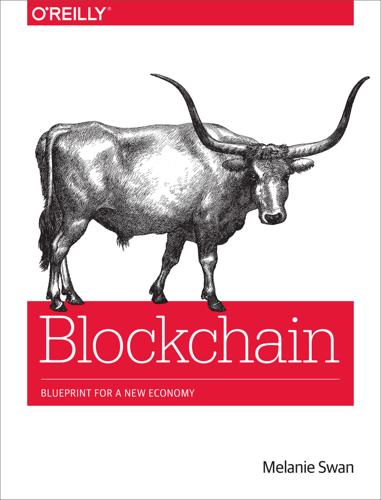
Blockchain: Blueprint for a New Economy
by
Melanie Swan
Published 22 Jan 2014
Having neutrality-oriented, easy-to-use solutions (the “Twitter of emerging market Bitcoin”) for Bitcoin could trigger extremely fast uptake in underbanked markets, continuing the trend of 31 percent of Kenya’s GDP being spent through mobile phones.95 There are different SMS Bitcoin wallets and delivery mechanisms (like 37Coins96 and Coinapult, and projects like Kipochi97 that are integrated with commonly used emerging-markets mobile finance platforms like M-Pesa. A similar project is a mobile cryptowallet app, Saldo.mx, which uses the Ripple open source protocol for clearing, and links people living in the United States and Latin America for the remote payment of bills, insurance, airtime, credit, and products. Digital Divide of Bitcoin The term digital divide has typically referred to the gap between those who have access to certain technologies and those who do not.
…
Individual peer-to-peer aid as well as institutional aid could be contributed via Bitcoin. In emerging markets (often with cellphone penetration or 70 percent or higher) there are a number of SMS Bitcoin wallets and delivery mechanisms, such as 37Coins134 and Coinapult, and projects such as Kipochi135 that are integrated with commonly used mobile finance platforms like M-Pesa (in Kenya, for example, 31 percent of the GDP is spent through mobile phones136). Apps could be built on infectious disease tracking sites like Healthmap and FluTrackers to include Bitcoin donation functionality or remunerative appcoin more generally. Charity Donations and the Blockchain—Sean’s Outpost Perhaps the world’s best-known Bitcoin-accepting charity is Sean’s Outpost, a homeless outreach nonprofit organization based in Pensacola, Florida.
…
“Half the World Is Unbanked.” McKinsey & Co, March 2009. http://mckinseyonsociety.com/half-the-world-is-unbanked/. 94 “2013 FDIC National Survey of Unbanked and Underbanked Households,” U.S. Federal Deposit Insurance Corporation, updated October 28, 2014, https://www.fdic.gov/householdsurvey/. 95 Mims, C. “M-Pesa: 31% of Kenya’s GDP Is Spent Through Mobile Phones.” Quartz, February 27, 2013. http://qz.com/57504/31-of-kenyas-gdp-is-spent-through-mobile-phones/. 96 Cawrey, D. “37Coins Plans Worldwide Bitcoin Access with SMS-Based Wallet.” CoinDesk, May 20, 2014. http://www.coindesk.com/37coins-plans-worldwide-bitcoin-access-sms-based-wallet/. 97 Rizzo, P.
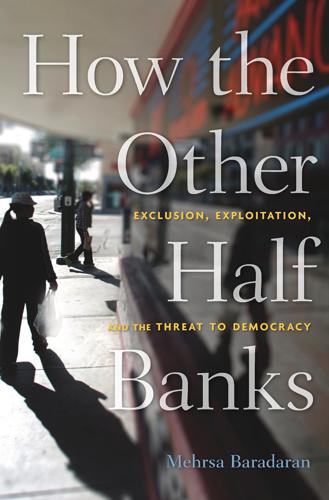
How the Other Half Banks: Exclusion, Exploitation, and the Threat to Democracy
by
Mehrsa Baradaran
Published 5 Oct 2015
The main roadblock to a Wal-Mart bank will be the nation’s large and small banks, who will certainly wage war on any proposed law that allows Wal-Mart to lend—just as they did in 2005 when Wal-Mart applied for a banking charter.76 MOBILE BANKING Mobile banking, or conducting financial transactions using your mobile phone either through a bank or through an independent provider, has not taken off in the United States but is an international phenomenon. The M-Pesa program in Kenya is the most-cited example of mobile banking successfully leading to financial inclusion. In 2007, Kenya’s leading mobile company, Safaricom, joined up with the Central Bank of Kenya to launch M-Pesa for Kenyans, who are 80 percent unbanked. As of January 2013 (in just under six years), 17 million adults (approximately 74 percent of Kenya’s adult population) used M-Pesa, and over 25 percent of Kenya’s gross domestic product was funneled through mobile money services.77 With over forty thousand agents across the country, users can make deposits, transfer funds to anyone with a mobile phone, pay bills, distribute employee salaries, and even get loans.
…
Not only do Kenyans waste less time waiting in lines at banks or paying bills, one study even found that in rural Kenya, households that used M-Pesa enjoyed increased incomes of 5 to 30 percent! In addition, the network’s ease and reliability has led to a host of new startups, which are building their business models on M-Pesa. This success has influenced many countries, including the Philippines, Uganda, South Africa, India, Afghanistan, and Romania, to attempt similar programs. None of these programs have yet to enjoy the broad success of M-Pesa. In some ways, Kenya had the perfect political and economic environment to launch this product: a strong central bank, a powerful mobile provider with a monopoly, a weak coalition of national banks, and a large majority of the public with a mobile phone but no bank account.
…
P., 40, 42 Morris, Arthur, 94, 98, 214 Morris Banks, 94–99, 153, 181 Morris Plan, 96 Mortgage lending: and GSEs, 18; race in, 47; redlining, 47, 50, 90, 154, 163; discrimination in, 49; by savings banks, 79; by savings and loans, 92–93; Adjustable Rate Mortgages, 93; standardization of, 150; subprime loans, 156, 157, 158–159, 160, 288n75. See also Fannie Mae; Freddie Mac; home financing; homeownership M-Pesa, 177–178 Nash, Ogden, 140 National Bank Acts, 37 National Credit Union Administration v. First National Bank and Trust Co., 74 National Credit Union Association (NCUA), 71, 74, 75 National Credit Union Share Insurance Fund, 71 National Currency Act, 36 National Farmer’s Alliance, 193 National Federation of Community Development Credit Unions, 76–77 National Housing Act, 46 National Housing Association (NHA), 258n126 National Monetary Commission, 40 Native American reservations, 110, 125 NCUA (National Credit Union Association), 74, 75 Nehemiah, 103, 109 New Deal: banking reforms during, 45–48; social contract of, 52; credit unions in, 70; building and loans in, 89; opposition to, 201.
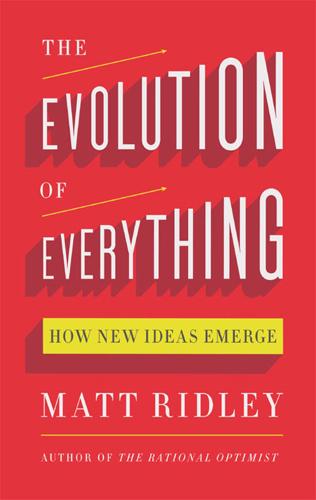
The Evolution of Everything: How New Ideas Emerge
by
Matt Ridley
Not for want of trying: the banks have lobbied politicians to subject M-Pesa to more regulation. Elsewhere in the world, heavy-handed regulation stifled mobile money at birth. During Kenya’s post-election violence in 2008, mobile-phone balances seemed a lot safer than cash, so the system gained further popularity. Soon it reached the critical mass where enough people were using M-Pesa that it made sense to join them, so as to be able to transact business with them. In Kenya people pay wages, purchase savings products and take out loans with M-Pesa cash. Money serves three main functions – a store of value, a medium of exchange and a unit of account.
…
In the early 2000s, unprompted by anybody in government or industry, Kenyans began transferring mobile-phone minutes to each other by text as a form of money. Mobile-phone operators like Safaricom and Vodafone realised what was happening and set out to ease the experience of users. M-Pesa now allows people to pay real money into their phones or take it out via agents, and to transfer credits between phones. This proved popular with people working in cities remitting cash to their families back home in rural villages. Two-thirds of Kenyans now use M-Pesa as money, and more than 40 per cent of the country’s GDP flows through the currency. Far more Kenyans have access to financial saving and payment systems through their mobile phones than through conventional bank accounts.
…
Morgan 290 Judaism 258, 259, 260, 261, 263 Justinian, Emperor 34, 262 Kagan, Jerome 161 Kahn, Bob 301 Kalikuppam (nr Pondicherry, India) 185–6 Kammerer, Paul 56 Kant, Immanuel 8 Kauffman, Stuart 125 Kay, John 92 Kealey, Terence 134, 137, 138 Kedzie, Christopher 300 Kelly, Kevin 122, 125, 129, 131; What Technology Wants 120, 126 Kennedy, Gavin 25 Kennedy, John F. 206 Kenya 170, 181, 296 Keynes, John Maynard 105 Kim Il-sung 252 Kirwan, Richard 17 Kitzmiller, Tammy 49; Kitzmiller vs Dover Area School District (2005) 49–50 Klein, Richard 83 Knight, Thomas 121 Koestler, Arthur 56 Koran 8, 260–1, 261, 262 Kosslyn, Stephen 185 Kroeber, Alfred 120 Krugman, Paul 292, 293 Kryder’s Law 124 Kublai Khan 87 Kurzweil, Ray 124 Lagos 182–3 Lamarck, Jean-Baptise de 55–7 Lamb, Marion 56, 57 Lamont, Norman 295 Lane, Nick 61, 62 Lao Tzu 31, 241 Laplace, Pierre-Simon 17–18, 41 Latin America 229, 233 Laughlin, Harry 200, 202–3 Law, John 285–6 Lawson, Nigel 273, 275 leadership: China’s reform 217–19; and economic development 228–33; evolution of management 2258; giving credit to 215–16; Great Man theory 216–17, 218,222–5, 228; Hong Kong example 233–4; mosquitoes win wars 219–22 Lee, Sir Tim Berners 301 Leeds 91 Leibniz, Gottfried 12, 14, 15, 120, 276 Lenin, V.I. 217, 250 Lessing, Doris 188 Levellers 242–3 Libet, Benjamin 146 Library of Mendel 48 life: critics of Darwin 49–52; culture-driven genetic evolution 57–8; designed 39–42; development of the eye 44–6; Lamarckian view 557; natural selection 38–9, 42–8; organised complexity 44–5 Lilburne, John 242 The Limits to Growth (Club of Rome) 211, 212 Lincoln, Abraham 4 Lindsey, Brink 248, 318 Lisbon earthquake (1755) 14 Little Ice Age 276 Live Well Collaborative 130 Lloyd George, David 116 Locke, John 12, 20, 39, 41, 53, 67, 143,243, 247 Lockheed 130 Lodygin, Alexander 119 London 91, 92, 94, 121 Looksmart (search engine) 120 Lorentz, Hendrik 121 Lorenz, Edward 18 Lost City Hydrothermal Field 61 Louis XIV 101, 142 Lovelock, James 20 Lucretia, rape of 87 Lucretian heresy 10–12 Lucretius (Titus Lucretius Carus) 7, 8–10, 12, 14, 16, 21, 52, 244, 268; De Rerum Natura (Of the Nature of Things) 8–12, 13, 15–16, 21, 37, 59, 76, 96, 118, 140, 155, 174, 193, 215, 235, 256, 277 Luther, Martin 8, 216 Lycos 120 Lyft 109 Lysenko, Trofim 157 M-Pesa 296 Macbook Air laptop 319 McCloskey, Deirdre 96–7, 104, 108, 217n, 229, 248; The Bourgeois Virtues 32 Mackintosh, James 38 McNamara, Robert 206, 208 McNeill, J.R. 220–2 Mackey, John 227 Maccoby, Eleanor 161 Machiavelli, Niccolò 15 Madras 186 Mafia 238, 239, 240 Malawi 232–3 Malthus, Robert 38, 104, 193, 194–7, 203, 204–5, 208, 213–14, 246; Essay on Population 120, 194 Manchester 91 Mandela, Nelson 217 Manhattan 91 ‘Mankind at the Turning Point’ (Club of Rome) 211 Mann, Charles, 1493 220 Mann, Horace 176, 189 Mansfield, Edwin 133 Mao Zedong 210, 217, 219, 252 Marconi, Guglielmo 124 Marcus Aurelius 9 Margarot, Maurice 244 Marinetti, Filippo 198 Marshall, Alfred 106 Martin, William 61 Martineau, Harriet 38, 244–5; Illustrations of Political Economy 244 Marx, Karl 8, 106, 165, 216n, 248, 252, 269–70 Marxism 104, 267, 302 Maude, Francis 255 Maupertuis, Pierre-Louis 14–15 Maurice, Prince of Saxe 88 Mauritius 125 Max Planck Institute, Leipzig 146–7 May, Tim 306 Mayans 259 Mead, Carver 123 Mecca 260, 261, 261402 Medawar, Sir Peter 211 Medicaid 114 Medicare 114 Men in Black (film, 1997) 141 Mencken, H.L. 189 Mendel, Gregor 121–2, 199 Menger, Carl 106 Mexico 87, 170, 238 Micklethwait, John 247 Middle Ages 88 Mill, John Stuart 104, 105, 187, 246, 247, 249 Miller, George A. 159 Miller, Kenneth 51 Milton, John 15 mind: background 140–2; and the brain 143–7; and free will 142–3, 147–54; responsibility in a world of determinism 150–4; and self 140–1 mind-body dualism 141 Minerva Academy, San Francisco 184–5 Ming Chinese 130 Mises, Ludwig von 112 Mississippi Company 286 MIT (Massachusetts Institute of Technology) 184, 301 Mitchell Energy 136 Mitchell, George 136 Mitra, Sugata 176–7, 185–7 Moglen, Eben 303 Mohamed 8, 216, 257, 260–3, 266 Molière (Jean-Baptiste Poquelin) 15 money: crypto-currencies 296, 308–9, 310–12; emergence of 277–80; fiat money 297; financial crisis 287–94; financial stability without central banks 284–6; main functions 296; mobile money 294–8; and nationalisation of system 283–4; Scottish experiment 280–2; sub-prime market 289–94 Mongols 101 Monism 197–8 Montaigne, Michel de 15 Montana 92 Montesquieu, Charles-Louis de Secondat, Baron de La Brède et de 20, 31, 142, 216; The Spirit of the Laws 16 Montessori schools 188 Montford, Andrew 188 Monty Python’s Life of Brian (film, 1979)42, 265 Moore, Gordon 123 Moore’s Law 123–5 Morality: effect of commerce on 30–3; emergence of 26–7, 28; evolution of 28–30; impartial spectator 24–5, 30; nature-via-nurture explanation 23–4; spontaneous phenomenon 21–2, 25 More, Thomas, Utopia 15 Mormonism 263 Morning Star Tomatoes 225–8 Morris, Ian, War: What is it Good For?
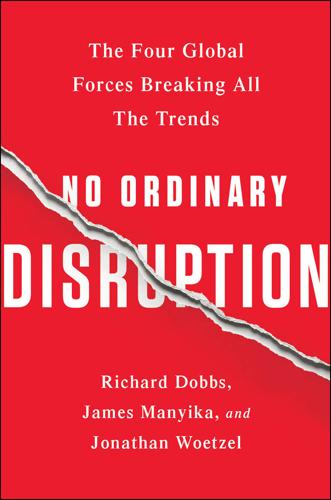
No Ordinary Disruption: The Four Global Forces Breaking All the Trends
by
Richard Dobbs
and
James Manyika
Published 12 May 2015
In Kenya, Safaricom, East Africa’s largest mobile telecommunications provider, partnered with Commercial Bank of Africa to launch m-pesa, Afric’a first SMS-based money transfer service, in 2007. (The m is for mobile, and pesa is Swahili for “money.”) In its first eigtheen months of existence, m-pesa gained four million users, many of whom don’t have bank accounts and rely on a network of agents they can visit to deposit and withdraw cash in exchange for virtual money. In 2013, m-pesa had fifteen million users, and the company is recognized as one of the most successful financial services innovators in the world.36 In Brazil, the country’s largest telecom player, Oi Telecom, partnered with UK-based data analytics firm Cignifi to generate credit scores for customers based on mobile phone behavior.
…
In fast-growing developing economies, more than 143,000 Internet-related businesses launch every year.57 Jumia, a Nigerian e-commerce company that now operates in Ivory Coast, Kenya, Egypt, and Morocco, in 2013 became the first African winner of the World Retail Award for “Best Retail Launch of the Year.”58 M-pesa, a mobile-money service started in Kenya, is now disrupting traditional banking, payments, and money-transfer service providers across Africa. Build New Global—and Digital—Ecosystems Digital platforms enable companies to expand rapidly and profitably to customers further away from their home markets than was possible in the past.
…
globalization of, 78–79 health-care industry and, 177 illiteracy and, 98 infrastructure productivity via, 197 messaging apps, 2, 42, 48, 172, 176 new consuming class use of, 97–98, 170 population, 6, 38, 42, 43 (table), 79, 97–98, 170 Mobilink, 161 Modi, Narendra, 2 MoMaths, 161 Monetary policy loosening, 134–135, 138–140 tightening, 10, 185–186 Monetization of debt, 139–140 of digital capital, 48–50 Moore’s law, 33, 34, 155 Morocco, 80, 81 (table) Moyer, Jamie, 60 M-pesa, 176 Mulally, Alan, 203 Mumbai, India, 29, 131–132 Nanomaterials, 34–36 Natural disasters, 41, 88–89, 119 Natural gas extraction, 2, 36, 116, 125, 141, 196 The Nature of Technology (Arthur), 33 Ndemo, Bitange, 41 Nestlé, 105 Netflix, 173–174 Netherlands, 113 (table), 184 (table) New competitors, 165–179 adaptation to, 174–179 alliances with, 176–177 digital platforms and, 165–166, 170–172 historical entry waves of, 167, 168, 169 (fig.), 170 instant global entry of, 80, 84–85, 170–172 monitoring and understanding, 174–175 price transparency and, 173 sector crossover from, 173–174, 176–177 speed and scale of, 11, 100, 170, 171 (table) talent relocation and, 177–178 trend break from, 10–11, 80, 84–85, 166–168 New consuming class, 93–110 adaptation to, 9, 25–26, 98–109 Africa as, 101, 102 aging population as, 66–70, 101 Brazil as, 97, 101, 102 business organization strategy for, 107–109 China as, 93–94, 96–97, 97 (fig.), 98, 99 (fig.), 101 creation of, 94 demand increase by, 114–116 economic value of, 96, 97 (fig.)
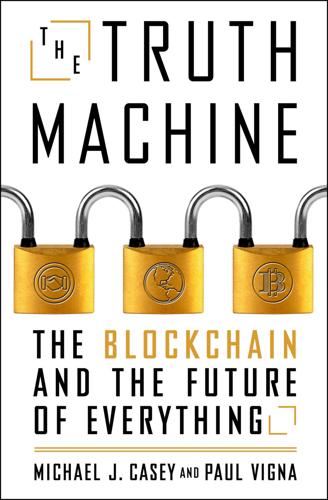
The Truth Machine: The Blockchain and the Future of Everything
by
Paul Vigna
and
Michael J. Casey
Published 27 Feb 2018
“Between 60 percent and 90 percent of [mobile] accounts…”: Carol Realini, “Unbanked Consumers Strive for Better Banking Services,” www.carolrealini.com, February 7, 2015, http://www.carolrealini.com/unbanked-consumers-better-banking-services/. reluctant to make their systems interoperable: Rob Jillo, “Airtel Presses for Share of Safaricom’s M-PESA Platform,” Capital Business, July 3, 2015, http://www.capitalfm.co.ke/business/2015/07/airtel-presses-for-share-of-safaricoms-m-pesa-platform/. A Jamaican immigrant in Miami might find: Remittance Prices Worldwide, World Bank, https://remittanceprices.worldbank.org/en/corridor/United-States/Jamaica. the recent success of BitPesa: Laura Shin, “Bitcoin Payments Firm BitPesa Secures Greycroft as Lead Investor for $10 Million Total Funding,” Forbes, August 30, 2017, https://www.forbes.com/sites/laurashin/2017/08/30/bitcoin-payments-firm-bitpesa-secures-greycroft-as-lead-investor-for-10-million-total-funding/#4dfaefb66066. 20 percent of the remittances that Filipino immigrants: Luke Parker, “Bitcoin Remittances ‘20 percent’ of South Korea-Philippines Corridor,” Brave New Coin, September 14, 2016, https://bravenewcoin.com/news/bitcoin-remittances-20-percent-of-south-korea-philippines-corridor/.
…
If we can get fair-priced financing for marginalized people to build access to that resource in renewable form, might this be a way to both save the planet and give poor communities an economic development platform from which to build dynamic local businesses? Money Everyone Can Use Much of the hope that the development community has recently invested in the prospect for financial inclusion stems from the rapid expansion of mobile phone usage in the developing world and—with that—of mobile money systems. Following the trailblazing launch of M-Pesa in Kenya in 2007, there are now ninety-three countries with some form of mobile-money services, with 271 “live” deployments, and 101 more planned. But many are still only scratching the surface of the potential market. In fact, the statistics belie a deeper problem. “Between 60 percent and 90 percent of [mobile] accounts opened by new banking customers fall dormant almost immediately without a single transaction,” writes mobile payments expert Carol Realini.
…
Banks, too often, are actually the problem—or at least the regulatory and risk-management model in which they operate is the problem. Maybe getting people into them shouldn’t be the goal at all. Mobile credit, in particular, has been hard to expand. And here too the banking paradigm is a hindrance. Once credit is involved, mobile money platforms like M-Pesa, which must be backed in aggregate by each country’s financial system, fall back on the classic loan approval models of the traditional banking world. As such, inferior proofs of identity and subjective, poorly defined measures of creditworthiness become barriers to entry, especially once the dominant telecom providers use their privileged position as gatekeepers of these new e-monetary systems to charge exorbitant fees.
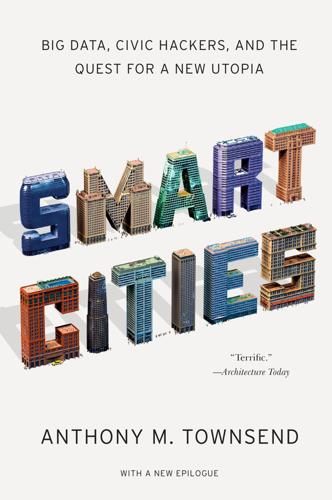
Smart Cities: Big Data, Civic Hackers, and the Quest for a New Utopia
by
Anthony M. Townsend
Published 29 Sep 2013
Its American equivalent, the Khan Academy, requires an expensive laptop and high-speed Internet connection to access its recorded video lectures and chat rooms.22 In Kenya mobiles are the backbone of a new branchless banking system that is bringing financial services to millions for the first time. M-Pesa, named after the Swahili word for money, launched in 2007 and is now used by over 15 million people. Instead of building out a costly network of branches, or even automated teller machines, M-Pesa uses small retailers as its tellers. Through a secure process that confirms the electronic transfer in seconds, customers can withdraw or deposit cash with a few clicks. But as more of the country moves to electronic transfers, many transactions never even materialize as cash, flowing through the system entirely electronically.
…
But as more of the country moves to electronic transfers, many transactions never even materialize as cash, flowing through the system entirely electronically. Safaricom, the country’s dominant wireless carrier, created M-Pesa as a public-service initiative with a million-pound grant from the British government, and never expected it to turn a profit. Instead, it broke even in just two years and now delivers nearly one-sixth of the firm’s revenues. During peak use, over two hundred transactions per second and 20 percent of Kenya’s GDP streams through the M-Pesa network.23 It is being rolled out across India, where it could eventually bring banking to hundreds of millions of poor people.
…
“What would it have looked like in data collected by a mobile operator?”30 He rattled off a list of telltale signs of distress. People might shift to smaller, more frequent purchases of airtime as their economic anxiety increased. Increased defaults on microloans would show up in payment systems like M-Pesa. Calls to livestock dealers would spike as families liquidated agricultural assets to survive. Phones purchased in villages would suddenly request connections with urban cell towers, as displaced farmers flooded the city looking for work. The financial crisis of 2008 hit the world’s poor hard. Food and fuel prices were already rising just as the contagion spreading through global financial markets released a parallel shock wave at the bottom of the pyramid.
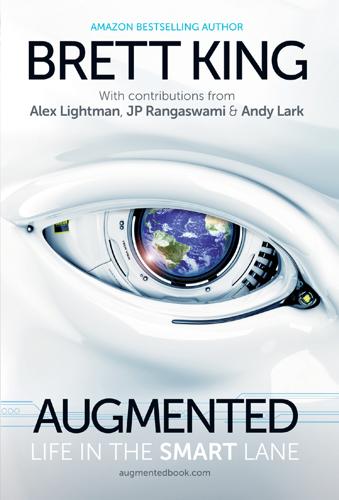
Augmented: Life in the Smart Lane
by
Brett King
Published 5 May 2016
If you look at Kenya with less than 50 branches per 1 million people and financial inclusion4 of 20 per cent through the traditional bank system, the obvious conclusion would be that this country needs more branches. That is, until you learn that since 2006 Kenya’s financial inclusion has grown to a whopping 85 per cent thanks to the M-Pesa mobile phone or mobile money account. It’s pretty simple. If you allow someone who has no banking services access to basic banking via a mobile money account on a smartphone or feature phone, this will change his or her life dramatically. In the case of M-Pesa, it means that mobile money users are likely to save 25 per cent more annually5 than their unbanked contemporaries. If you insist that someone has to have a driving licence or identity document and then needs to get to a physical branch to fill out an application form in order to open a bank account, you are actually increasing the likelihood of financial exclusion.
…
For Italy and the United States, their high branch density (two of the top five countries in the world for branch availability) has not stopped them from seeing a decline in the number of people with bank accounts over the last few years. For the first few years after M-Pesa’s creation, the big banks in Africa tried to get it shut down, but that horse had long ago bolted, with more than 75 per cent of Kenya’s adult population being users of the service. It was then that the Commercial Bank of Africa (CBA) realised that “if you can’t beat them, join them”. In 2012, CBA launched a simple savings account linked to M-Pesa called M-Shwari.6 The uptake was incredible. In the three years that followed, M-Shwari added 12 million new accounts, for 4.5 million customers (that’s one in five Kenyans).
…
How do these compare in terms of reach and number of users or accounts? If you take just iTunes, PayPal and Alipay, they currently account for 1.2 billion account holders. That is more than double what the top five banks have in terms of the number of individual customers with bank accounts. If you include M-Pesa, MTN Mobile Money, bKash, GCash and other mobile money services, you can easily add another 300 million account holders. Figure 9.2: Growth in mobile money users globally (Source: Various) That means quite simply that mobile bank accounts, mobile value stores or mobile wallets already outnumber traditional bank accounts two to one.
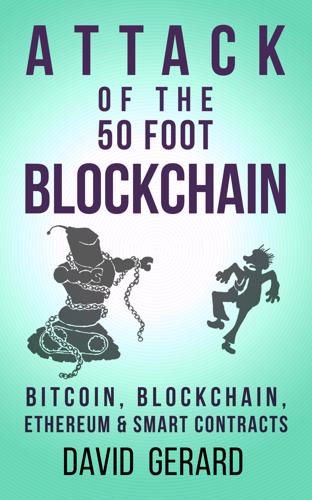
Attack of the 50 Foot Blockchain: Bitcoin, Blockchain, Ethereum & Smart Contracts
by
David Gerard
Published 23 Jul 2017
Bitcoin is way too volatile to be a reliable store of value. How do they convert it into local money they can spend? 7 transactions per second worldwide total means Bitcoin couldn’t cope with just the banked, let alone the unbanked as well. A centralised service similar to M-Pesa (a very popular Kenyan money transfer and finance service for mobile phones) might work, but M-Pesa exists, works and is trusted by its users – and goes a long way toward solving the problems with access to banking that Bitcoin claims to. Advocates will nevertheless say “but what about the unbanked?” as if Bitcoin is an obvious slam-dunk answer to the problem and nothing else needs to be said.
…
Strangelove 101 Dread Pirate Roberts 49 DRM 123, 124, 127, 135, 136 e-Gold 18, 62, 72 Early, Steve 78 economies of scale 25, 58 Economist, The 37, 66 eDonkey 45 EITC 68 Electrum wallet 66 EOS 98 ERC-20 97 ether 94 Ethereum 72, 88, 94, 106, 116, 129, 136 Ethereum Classic 110 Ethereum Foundation 109, 136 Ethereum Virtual Machine 106 F-Secure 73 Facebook 113 Fair Music: Transparency and Payment Flows in the Music Industry 128 Falkvinge, Rick 38 Far Wilds, The 45 Fast Internet Bitcoin Relay Engine 58 FBI MoneyPak 73 Featured Artists Coalition 130 fees 26, 69 FIBRE 58 Fields Medal 96 Finney, Hal 20, 31, 59 Firefox 76 Folding@Home 91 Foldingcoin 91 Force, Carl Mark IV 53 Forrest, Katherine B. 53 FPGA 56 Francis, Ryan 93 Frank, Anne 48 Free Talk Live 37, 50 FreeRoss.org 53 Freicoin 91 Frosty 51 Frou Frou 129 Funke Kupper, Elmer 121 Fusion 65 Future of Bitcoin Conference 68 Garzik, Jeff 50 gas 94 Gawker 37, 50 GDAX 82 Gentle, Ryan 93 GHash.io 58 Gibson, William 19 Gini coefficient 30 Git 112, 122 Gizmodo 64 Global Repertoire Database 128, 134 Gnosis 98 gold bug 20 gold standard 20 Golem 98 Golumbia, David 141 Goodman, Leah McGrath 64 Google 127 GovernMental 107 GPU 55 GQ 66 Great Depression 20 Greece 32 Green, Alex 93 Greenberg, Andy 64 Grigg, Ian 62 Gupta, Vinay 129 halting problem 110 hash 13 Hashcash 19 Hearn, Mike 65 high-yield investment program 38, 40 Hoppe, Hans-Herman 24 hot wallet 12 Hotwire PE 63 Huobi 82 Hyperledger 113, 121, 122 IBM 113, 115, 121, 122 IBM Blockchain 122 ICO 88, 95, 97, 139 Iconomi 98 immutability 11, 105 Imogen Heap 129 Individual Pubs 78 Industrialisation of Distributed Ledger Technology in Banking and Financial Services 115 Initial Coin Offering 88, 97 Initial Crowdfunding Offering 97 Intel 123 Intel® Software Guard Extensions™ 123 InterPlanetary File System 131, 135 IPFS 131 iTunes 129. 130, 131 Jamaican bobsled team 93 JASRAC 126 JavaScript 107 John Birch Society 17, 21 Kaminska, Izabella 141 Karpelès, Mark 45, 52, 87 Kennedy, Ryan 93 Kenya 93 key 12 King of the Ether 106 Kleiman, Dave 64 Know Your Customer 81 Kobalt 126 Kraken 44 Kurzweil, Ray 137 KYC/AML 81, 87 Larimer, Danny 98 Ledger Labs Inc 86 Lestak, Robert 76 Levine, Matt 104, 117, 141 Li, Xiaolai 99 libertarianism 17 Liberty Reserve 18, 72 Lightning Network 28, 70 Litecoin 32, 92 LocalBitcoins 32, 81, 93 log.txt 51 London Review of Books 64 Lubin, Joseph 136 LulzSec 62 M-Pesa 29 MacGregor, Robert 63 Mackay, Charles 35, 141 Madoff, Bernie 38 Magic: The Gathering Online Exchange 45 MagicalTux 45 Making Blockchain Ready for Business 113 Malmi, Martti 35, 45 margin trading 42, 83 Markus bot 82 Mason, Nick 132 Mastercard 36 Masters, Blythe 122 Matonis, Jon 66 Matthews, Stefan 63 May, Tim 19 McCaleb, Jed 45 Meharry, Mark 125 Memory Dealers 37 mempool 70 Merkle tree 13, 112 micropayment 26 Microsoft 95, 107, 122 miner 13 mining 14, 55 Mintpal 93 Mises, Ludwig von 23, 49 mixer 26, 84 MMM 82 Mochizuki, Shinichi 59 Monero 72, 74 MoneyPak 73 Moolah 93 Mozilla 76 MP3 127 Mr.
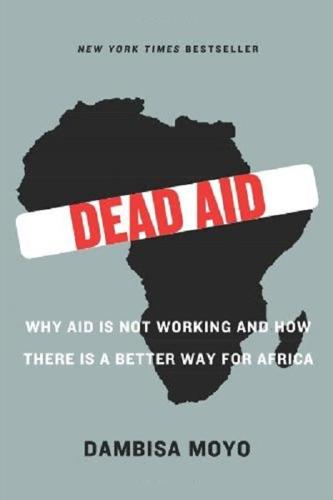
Dead Aid: Why Aid Is Not Working and How There Is a Better Way for Africa
by
Dambisa Moyo
Published 17 Mar 2009
It is encouraging to note that innovative mobile phone technology is making it both cheaper and quicker for people to send and receive money. In April 2007, a money transfer system called M-Pesa was launched in Kenya enabling subscribers to send large sums of money in an instant transaction. Within just two weeks of the launch over 10,000 account holders were registered and more than US$100,000 had been transferred. At the moment the M-Pesa programme only facilitates money transfers within the country’s borders, usually from richer urban dwellers to their poorer rural relations. However, there are plans underway to roll the scheme out on an international basis, not only tapping the billions of international remittances Kenyans regularly send home, but doing it in the most competitive way – that is, getting more cash into the recipient’s pocket.
…
D. 46 Heavily Indebted Poorest Country debt relief programme (HIPC) 53 HIV–AIDS pandemic 4–5, 7, 71–2 Hu Jintao 104, 108 Human Development Report (1994) 52 Hungary 85–6 IMF (International Monetary Fund) aid warning 47 appointment of Irwin Blumenthal 53 debt crisis 18–19 and foreign capital 63 inception 11–13 and Malawi 55–6 and ‘nit-picking’ 108–9 Structural Adjustment Facilities 21 In Search of Prosperity (Rodrik) 34 India 112, 117, 123, 132, 134, 137–8 India–Africa Forum 112, 123 Indonesia 34, 56 Industrial and Commercial Bank (China) 106 inflation 61–5 innovation 139–40 International Bank for Reconstruction and Development see World Bank International Development Association (IDA) 37–8 International Development and Food Assistance Act (US 1975) 16 International Peace Research Institute (Stockholm) 59 International Remittance Network 136 International Trade Organization 11 investment bonds 77–83, 87–96 borrowing costs 84–5 credit ratings 78, 83, 87–8 emerging markets 79–81, 85 portfolio diversification 80–82 Ireland 37, 125 Israel 134 Italy 125 Ivory Coast 109–10 Jamaica 136 Japan 99, 102–3, 112, 125 Johannesburg Stock Exchange 4 John Paul II, Pope 26 joint liability 129 Jubilee Debt Campaign 26 Kagame, President Paul 27–8, 148–9 Kanbur, Ravi 54 Kariba dam 15 Kenya and EBA 118 and exports 62 favourable view of China 109 fragile democracy 72 HIV prevalence rates 3 and long-term debt 87–8 money transfer systems 136 population 124 and rampant corruption 48 stake in the economy 152 trade-oriented commodity-driven economy 146 turbulent elections 2008 33 Keynes, John Maynard 11 Kibaki, Mwai 33 Kiva 130 Kurtzman, Joel 51 Lambsdorff, Graf 51 Landes, David 33–4, 147 least-developed countries (LDC) 123 Lensink, R. 136 Lesotho 118 life expectancy 5 Lin Yifu, Justin 153 Live Aid 26 Lumumba, Patrice 14 Lundin, Lukas 98 M-Pesa (money transfer system) 136 Mahajan, Vijay 132 McLiesh, Caralee 101 McNamara, Robert 16, 17 maize scandal (Malawi) 56 Malawi 55–6, 106, 117, 145 Mali 71–2, 94, 109–10, 116 Maren, Michael 60 Markit (data/index firm) 91 Marshall, George C. 12 Marshall Plan 12–13, 35–8 Mauritania 120 Mauritius 34, 89 Maystadt, Philippe 107 Mengistu Haile Mariam 14, 23 Mexico 18, 82, 84, 117, 132, 144, 151 micro-finance 126–32, 140 middle class 57–8 Millennium Challenge Corporation aid campaign (US) 40, 56 Millennium Development Goals (MDG) 45, 96–7 Mkapa, President Benjamin 26 Mobutu Sese Seko, President 14, 22–3, 48, 53, 108 Monterrey Consensus 2002 74 Moody’s Investors Service 83 morality 150 ‘More Aid for the Poorest’ (UK white paper) 16 mosquito net producer (example) 44–5, 114, 122, 130–31 Mozambique 117, 134 Mugabe, Grace 146 Mugabe, Robert 108, 146–7 Mwanawasa, President Levy 53 Mystery of Capital, The (de Soto) 137–8 Na’m, Moisés 107 Namibia 89, 93 ‘negative corruption’ 57; see also corruption Netherlands 63 New York City 151; see also United States New Zealand 121 Nicaragua 151 Nigeria and AGOA duty-free benefits 118 aid from World Bank 107–8 assets looted 48 banking sector 4 beneficiary of FDI 105 and the bond index 92 and corruption 23 cotton revenues 116 favourable view of China 109 humanitarian catastrophe 26 independence 71 and long-term credit ratings 88 Maiduguri money find 137 many tribes 32 natural-gas reserves development 112 rebuilding colonial-era railway 106 remittances 133 ‘No Donor Money, No Loans’ policy 128 North, Douglass 41 Norway 73 ODA (official aid) 25 Odinga, Raila 33 oil 17–18, 48–9, 82, 105–6, 108–9, 120 oil crisis 1979 17–18 Olson, Mancur 41 Olympics 2008 108 Organization of Economic Cooperation and Development (OECD) 115 Oxfam 117 Pakistan 34, 124 Pan-African Infrastructure Development Fund (PAIDF) 95 Paris Club of creditors 108 PEPFAR (AIDS Relief) 7 Peru 151 Peters Projection Map 121 Pew Report 2007 109 Philippines, the 135 PIMCO (bond investment organization) 91 Poland 8–6 Ponzi schemes 130 ‘positive’ corruption 56, 59; see also corruption Private Equity investments 4–5 programme aid 21 Protestantism 31 Przeworski, Adam 43 Raiffeisen, Friedrich 131 Rajan, Raghuram G. 142 Ramalho, Rita 101 Ramesh, Jairam 123 Reagan, Ronald 20, 22 Reichel, R. 46 remittances 133–6 Resource Flows to Africa (UN) 133 Revolutionary United Front (Sierra Leone) 59 Rodrik, Dani 34 Rosenstein-Rodan, Paul 39 Ruiz-Arranz, Marta 136 Russia 84, 87, 112 Rwanda 27, 32, 148 Sachs, Jeffrey 96–7 Sani Abacha, President 48 São Tomé and Principe 106 savings 137–40 Schulze-Delitzsch, Herman 131 Scottish Banks 139–40 Second Conference of Chinese and African Entrepreneurs 114 securitization 96 Sen, Amartya 42 Senegal 109–10 Short, Clare 56 Sierra Leone 59 Singapore 152 Singh, Manmohan 123 small/medium enterprises (SMEs) 125 social capital 58–9 Somalia 60, 118, 133 South Africa abandoning foreign aid 144 and AGOA duty-free benefits 118 and bond issues 89, 92–3 and credit league tables 82 1997 stock market fall 84 not reliant on aid 150 and PAIDF 95 remittances 133 setting an example 78 South Korea 45, 82, 87 Sovereign Wealth Funds 112 Spain 86 Spatafora, N. 133 stabilization programme 20 Standard & Poor’s rating agency 83, 87–8 Standard Bank 106 sterilization 64–5 stock market liquidity 4 Structural Adjustment Facilities 20–21 Subramanian, Arvind 142 subsidies 115–16 Sudan 105–6, 108, 120 sugar production 116–17 Svensson, J. 39, 52 Swaziland 5, 106 Sweden 73 Tanzam Railway 103–4 Tanzania 26, 56, 97, 103–4, 110, 124, 131 taxation 52, 66 Thailand 57 Thatcher, Margaret 20, 67 Togo 94, 116 Tokyo International Conference on African Development 112 Toxopeus, H. 136 trade 17, 19–21, 38–40, 62, 64, 112, 114, 117–24 Transparency International 51, 56, 71 Turkey 93, 112, 117 Uganda aid-fuelled corruption 53 and bonds 65, 97 favourable view of China 109 and HIV–AIDS 71 improved economic growth 101 plunderers and despots 108 population 124 remittances 134 trade-oriented commodity-driven economy 146 UN Conference on Trade and Development (UNCTAD) 102 United Kingdom 108, 120 United Nations Development Programme (UNDP) 25 United Nations Human Development Report 5 United States and African Growth and Opportunity Act 118 aid history 12–17, 40 bond comparisons 80 diplomatic ties with Zimbabwe 108 Energy Information Administration 103 Food For Peace budget 45 freer trade access for African countries 149 influence compared to China 109–10 and Malawi 56 public’s desire on aid 74 Soft Banks 139 and subsidies 115–16 trading partner status 119 2006 foreign aid 99–100 US Farm Security and Rural Investment Act 2005 115 USSR 14, 19, 24 Venezuela 86 venture capital (VC) 139 Wade, President Abdoulaye 149 Washington Consensus 21–2 Wealth and Poverty of Nations, The (Landes) 33–4, 147 Weber, Max 31 Weder, Beatrice 52 Wen Jibao 104, 114 West African Economic and Monetary Union 88 What makes Democracies endure?
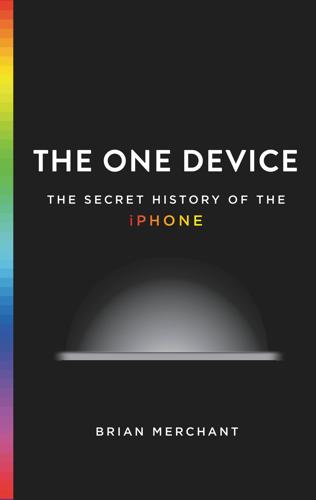
The One Device: The Secret History of the iPhone
by
Brian Merchant
Published 19 Jun 2017
In 2007, the same year that the iPhone debuted, Kenya’s national telecom, Safaricom, partnered with the multinational Vodafone to launch M-Pesa (pesa means “money” in Swahili), a mobile-payment system that allowed Kenyans to use their cell phones to easily transfer funds. Based on research that showed Kenyans had been transferring airtime among themselves as currency, not long after the system was implemented, M-Pesa took off. Since then, due to the popularity of M-Pesa, Kenya is close to becoming one of the first nations on the globe to adopt a paperless currency. Also in 2007, Kenya saw unrest spread after the incumbent president refused to step down in the wake of a disputed election, one that independent observers deemed “flawed.”
…
“Perception really influences how things get built,” she says, “even if it wasn’t an accurate perception. There was this perception of Kenya being really good at mobile. There ended up being a false equivalency,” Marchant says, and a lot of early, donor-funded start-ups didn’t pan out. There hadn’t been another Ushahidi or M-Pesa for years. “Even, for example, the M-Pesa interface itself, it’s very slow, designed to be used on an old Nokia phone, where apps don’t work or don’t really work. It was a text-based intervention. And it still exists that way.” In other words, the idea of a mobile revolution or an app-based revolution ported poorly from the U.S. or Europe, where it was a cultural phenomenon, to Kenya, where the reality was much different.
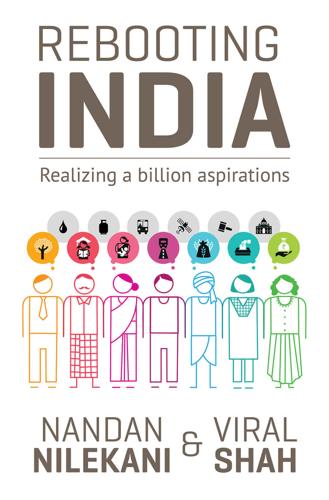
Rebooting India: Realizing a Billion Aspirations
by
Nandan Nilekani
Published 4 Feb 2016
Lest one think that all of these innovations are confined to developed nations, consider M-Pesa, a mobile payment system operational in Kenya and Tanzania that’s run by Safaricom and Vodacom, subsidiaries of the telecom giant Vodafone. M-Pesa has its roots in the airtime-swapping system that mobile phone users in some African countries spontaneously came up with; they started transferring mobile talktime minutes as a proxy for money transfers. Today, while only 7 million Kenyans have bank accounts, 18 million use M-Pesa; it processes a staggering US$ 1.6 billion in transactions every month. Data released by the Central Bank of Kenya shows a 10.6 per cent increase in formal financial inclusion for the time period 2009–13; it is not unreasonable to suppose that a significant fraction of that percentage has been driven by M-Pesa.15 Widening the financial net with Aadhaar Dilip Asbe, now chief operating officer of the National Payments Corporation of India (NPCI), is possessed of a no-nonsense, ‘get it done’ attitude leavened with the bluff, hearty humour typical of his home city, Mumbai.
…
Data released by the Central Bank of Kenya shows a 10.6 per cent increase in formal financial inclusion for the time period 2009–13; it is not unreasonable to suppose that a significant fraction of that percentage has been driven by M-Pesa.15 Widening the financial net with Aadhaar Dilip Asbe, now chief operating officer of the National Payments Corporation of India (NPCI), is possessed of a no-nonsense, ‘get it done’ attitude leavened with the bluff, hearty humour typical of his home city, Mumbai. As part of Viral’s work on financial inclusion, he was scheduled to meet with Asbe. The meeting never happened, and Viral assumed he had been given the kind of polite brush-off common in government circles.
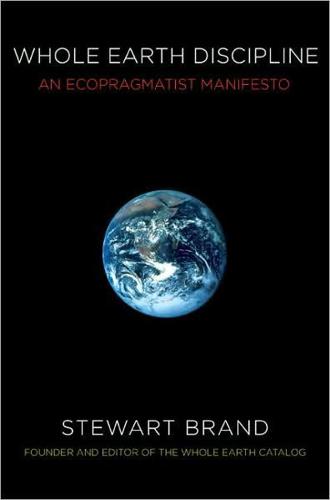
Whole Earth Discipline: An Ecopragmatist Manifesto
by
Stewart Brand
Published 15 Mar 2009
SIM cards are sold at vegetable stands and the like, along with “scratch cards” that reload the SIM with additional minutes. Some people carry just a card and borrow a phone when needed. Safaricom, in Kenya, has a service called M-Pesa that lets the cell work as an ATM; to send someone money, you text-message the appropriate code to them, and they get cash from a local M-Pesa agent. Cellphone minutes are traded by phone as a cash substitute. Credit card payments are made by cellphone. Remittances from relatives overseas come by cellphone. (Amounting to about $350 billion a year these days, remittances are expected to reach $1 trillion soon; in some developing countries, the remittance total is already higher than foreign aid and foreign investment combined.)
…
A South African company called Wizzit offers bankless banking via cellphone, with services I wish we had in California. You can open an account in two minutes anytime, anywhere. You can transfer money from your Wizzit account to virtually any other bank account, pay your bills with it, and get cash at any ATM worldwide. Its service centers are multilingual. Children can have accounts. Services similar to those of M-Pesa and Wizzit are offered by GCash in the Philippines. There are cellphones with software for Muslims: Five times a day the cellphone calls the user to prayer and then shuts itself off for twenty minutes. An NGO in the Republic of the Congo provides smart phones “to local teachers, elders and business leaders so that they can report incidents of children being drafted as soldiers.”
…
McClure, Michael McIntyre, Joan McKibben, Bill McKnight Foundation Madagascar mad cow disease maize Maker Faires malaria Malpai Borderlands Group Malthus, Thomas mammoths Man and Nature (Marsh) Manaus, Brazil Mann, Charles MapEcos March of Unreason, The (Taverne) Margulis, Lynn mariculture Mark, Jason Marsh, George Perkins Martin, John Martin, Paul Martine, George Marvier, Michelle Masai “Masque of Mercy, A” (Frost) Massachusetts Institute of Technology (MIT) Maximum City (Mehta) Meadows, Donella medicine: genetic engineering and radiation and Medina, Martin Megatons to Megawatts Mehta, Suketu Mendel in the Kitchen (Federoff) Menninger, Rosemary metagenomics methane Mexico genetic engineering and microbes human body and see also bacteria; viruses Microbial Inhabitants of Humans microfinance microreactors Mills, Stephanie milpa field system Molecular Sciences Institute monarch butterflies Monsanto Montefiore, Hugh Montreal Protocol (1989) Mooney, Pat Moore, Patrick More, Max Morton, Oliver Moyers, Bill M-Pesa Mumbai, India Mumford, Lewis Mwanawasa, Levy Mycio, Mary mycotoxin poisoning Myth of Marginality, The (Perlman) Nabhan, Gary Nabokov, Peter Naím, Moisés National Academy of Sciences National Aeronautics and Space Administration (NASA) National Biodiversity Council, Mexican National Commission on Energy Policy National Geographic National Institute of Oceanography, Indian National Institutes of Health (NIH) National Oceanography Centre, British National Research Council Native Americans milpa field system of native-plant movement Natural Capitalism (Hawken and Lovins) natural gas Naturalist (Wilson) Nature Nature (Coates) Nature Conservancy Nature by Design (Higgs) negative feedback Netherlands Neuwirth, Robert Nevada, nuclear waste issue and New Mexico New Science of Metagenomics, The New Scientist New Urbanism New Yorker New York Times New Zealand Next Four Billion, The (Hammond et al.)
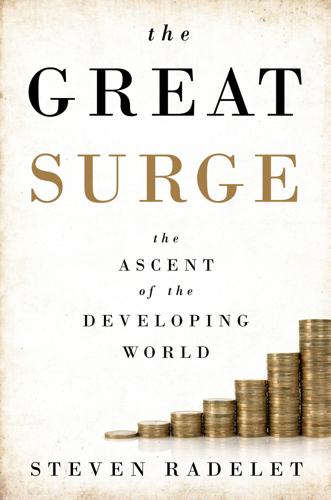
The Great Surge: The Ascent of the Developing World
by
Steven Radelet
Published 10 Nov 2015
By 2008, the company employed seven hundred field workers covering forty-seven hectares and earned $8 million in annual revenue through sales to the United States, Canada, the Netherlands, Italy, France, England, Russia, Chile, Venezuela, the Dominican Republic, and Kuwait.7 Safaricom is East Africa’s largest mobile telecommunications provider, and is widely considered one of the most innovative companies in sub-Saharan Africa. In 2007 Safaricom launched M-Pesa, Africa’s first text-message-based money transfer service, which, since then, has become one of the most sophisticated mobile payment systems in the world. M-Pesa (the M is for “mobile,” and pesa is a Swahili word for “money”) allows users with a national ID card or passport to deposit, withdraw, and transfer money with a mobile device. For a small fee, users can deposit money into an account stored on their cell phones, send balances through short message service (SMS) text messages to other users (including shops and businesses), and redeem deposits for cash.
…
For a small fee, users can deposit money into an account stored on their cell phones, send balances through short message service (SMS) text messages to other users (including shops and businesses), and redeem deposits for cash. In just five years, more than 17 million M-Pesa accounts were registered in Kenya. There are hundreds of similar examples of growing businesses in dozens of developing countries around the world—in countries that most casual observers would not think of as promising places for economic growth. One way to understand the breadth of the changes is to examine the number of countries in which economic growth has accelerated in the last two decades.
…
W., 143 Delhi, 287 democracy, 3, 5, 6–7, 9, 16, 21, 22, 23, 97, 146–50, 162, 232, 294, 296, 303, 309 in Africa, 135, 145 Asian values and, 121, 122–23 in Brazil, 186–87 capitalism and, 146, 149 development and, 125 expansion of, 248–49 failures of, 11, 263–64, 273 famines and, 128 and fundamentalist Islam, 265 globalization and, 157 improved governance and, 197–99, 199 lack of attention to increasing, 10 measurement of, 106–15, 110 and oil-exporting countries, 114–15 pessimism over, 120–25 poor countries as, 98 poverty and, 121 in retreat after World War I, 146–47 reversals in, 113–14 rise of, 103–6, 105, 110 slowing down of growth of, 233 demographics, changing, 21 dengue fever, 205 Deng Xiaoping, 43, 185, 289 reforms of, 35, 192 resignation of, ix–x, 123, 134–35 Derg, 100, 187 Desai, Raj, 260 developing countries, 9, 40 challenges to, 294 lack of growth in, 8, 11 as playing substantial role in global markets, 52 skilled leadership needed for, 234 trade between, 47, 262 see also progress in developing countries Development as Freedom (Sen), 19, 127 development assistance, 307–8 development traps, 118 Dhaka, 277 Diamandis, Peter, 300 Diamond, Jared, 13 Diamond, Larry, 110–11, 186 diamonds, 206, 207, 284, 285 Diaoyu, 288 Diarra, Adama, 265 diarrhea, 10, 73, 75, 92, 94, 173, 215 dictatorships, 6, 7, 11, 99–101, 102, 125–29, 143–45, 222–23 private investments and, 223 Dietrich, Simone, 223 Dioura, Cheick, 265 diphtheria, 94, 161 disaster relief, 38 disease, 4, 15, 19, 21, 205, 266–68, 294 attention to, 10 noncommunicable, 268 see also specific diseases Djiguiba, Ansema, 108 Djiguiba, Sulamo, 108 Doe, Samuel, 99, 145 Doha round, 258, 298 Dollar, David, 65, 225 Dominican Republic, 6, 36, 47 aid to, 223 cocoa farmers in, 163 democracy in, 7, 106 exports from, 56 fall of poverty in, 36 growth in, 6, 45, 50, 128 Douglas DC-8, 168 drought, 171, 215 Drought Tolerant Maize for Africa Project, 171 Duarte, José Napoleón, 100 Dubai, 155 Duflo, Esther, 14, 31, 88 Dunning, Thad, 223 Duvalier, François “Papa Doc,” 222 Duvalier, Jean-Claude “Baby Doc,” 127 Duvalier family, 11, 100, 114, 141 East Asia, 5, 7, 50, 167 extreme poverty in, 36 growth in, 141 Easterlin, Richard, 86 Easterly, William, 213 Eastern Europe, 36, 141, 147, 148 trade and, 159 East Germany, x, 134 Ebola, 8, 10, 20, 22, 82, 205, 255, 266 economic growth, 37–38, 47–51, 49, 51, 86, 213 aid and, 224–27 cause of, 52–53 democracy and, 128–29 and poor, 63–65 sustainability of, 61–63 economic reforms, 192–97, 193, 194, 195, 196 Ecuador, 36, 47, 106 education, 4, 5, 6, 16, 24, 31, 77, 85–89, 88, 94–96, 154, 161, 164, 190–91, 191, 232, 247–48, 251, 258, 260–61, 262, 303, 306, 307 in Afghanistan, 215 aid and, 226 in Asia, 201 in Brazil, 187 conflict and, 118–19 of girls, 85–90 health and, 89–93, 205 Egypt: coup in, 113, 124–25, 185 demonstrations in, 281 ORT in, 173 poverty in, 36–37 in Six-Day War, 285 Ehrlich, Paul, 274, 275 Eichengreen, Barry, 236 election monitoring organizations, 110 elections, 198, 262 electricity, 216, 233, 278 electronics, 56, 165 El Salvador, 36, 39, 121 child mortality in, 84 democracy in, 123 dictatorship in, 99–100 war in, 100 End of History and the Last Man, The (Fukuyama), 148–49 energy, 21, 22, 162, 233, 235, 261, 258, 275, 277, 292, 293 environmental degradation, 1, 4, 8, 63, 163 Equatorial Guinea, 114, 184, 223 eRanger “ambulance,” 175 Eritrea, 49, 50 Ershad, Hussain Muhammad, 144 Essay on the Principle of Population, An (Malthus), 270 Essebsi, Beji, 124 Estrada, Joseph, 264 Ethiopia, 141, 144, 159, 285 aid to, 224 China’s example followed by, 266 dictatorship in, 100 growth in, 7, 50, 125, 238, 261 HIV in, 174 individual leadership in, 187 textiles from, 56 Europe, 19, 25, 167, 292, 300 democracy in, 296 leadership needed by, 234 post–World War II boom in, 262 European Union, 202, 259, 297 Executive Index of Electoral Competitiveness, 108 Extractive Industries Transparency Initiative, 306 factories, 165, 235 in Indonesia, 201 Falkland Islands, 100 famine, 4, 10, 128, 232 in Bangladesh, 271 in China, 35 after global food crisis (2007), 12 Fascism, 104, 124, 146, 147, 184, 265, 309 Fate of Young Democracies, The (Kapstein and Converse), 198 fertility rates, 73–74, 80–81, 84–85, 85, 95, 306 finance, 45, 158–61, 163, 234, 241, 305 financial flows, 17, 156, 157, 160, 306 Finland, malaria in, 210 flood, 171, 215, 226 floods, 281 Florecot, 47 food, 56, 79–80, 213, 233, 277, 280, 307 Food and Agriculture Organization, 79, 280 food assistance, 38 food prices, 54, 273, 301–2 food production, 294, 301 food security, 21, 22 Ford Foundation, 170 foreign aid, 10, 12, 18–19, 209–27 bureaucracy of, 222 criticisms of, 218–24 debate over, 213–14, 227 and diversion of government funds, 221–22 growth and, 224–27 monitoring of, 222 as poorly designed, 221 priorities of, 221 foreign direct investment (FDI), 149, 154, 157, 165 foreign exchange reserves, 192 forest loss, 280 Fossati-Bellani, Gabriel, 44 fossil fuels, 301 France, 47, 68, 140 Franco, Itamar, 186 freedom, 127, 131, 161, 198–99, 232 Freedom House, 107–8, 113, 182, 198 Freedom in the World index, 107–8 free markets, 148–49 free trade, 163–64 Friedman, Milton, 213 fuel efficiency standards, 297 Fujimori, Alberto, 185 Fukuyama, Francis, 148–49, 186, 288, 296 fundamentalist Islam, 124 G-7, 298 G-20, 298 Galiani, Sebastian, 227 Gallup, John, 210 Gambia, The, 113, 124, 190 Gandhi, Mohandas K., 293, 294 Gang of Four, 185 Gap, 164 garments, 56, 59 gas, 44, 139 Gates, Bill, 83–84, 213, 217 Gates, Robert, 20 Gdańsk, 103 Gelb, Alan, 205 General Agreement on Tariffs and Trade (GATT), 156, 258 General Electric, 159 genetically modified foods (GMOs), 171–73 genocide, 142 Georgia, 50, 143 growth in, 128, 238 Germany, 250, 298 germ theory, 77 Gerring, John, 129, 248 Getting Better (Kenny), 93 Ghana, 37, 127 aid to, 223 coastal vs. isolated areas in, 201 data entry firms in, 178 democracy in, 106, 122, 188–90 growth in, 6, 7, 22, 45, 50, 128, 261 oil exported by, 53 reforms in, 192 trade encouraged by, 155 Gill, Indermit, 261 Gini coefficient, 66, 70 glasnost, 134 Global Alliance for Vaccines and Immunizations (GAVI), 95, 161 global financial crisis, 12, 52–53, 113, 191, 233, 235, 257, 264, 269, 295, 305 global food crisis, 12, 280–81 Global Fund to Fight AIDS, Tuberculosis and Malaria, 95, 212 Global Health 2035 Commission, 91, 245, 267, 284, 306 global integration, 52 globalization, 17, 19, 131, 150, 158–61, 160, 162, 163–66, 183, 200, 207, 264, 287–88 technology and, 166 Global Malaria Eradication Program, 211–12 gold, 139, 152, 206 Golden Rice, 172 Gorbachev, Mikhail, 133, 134, 143 Gordon, Robert, 257–58 governance, 4, 5, 8, 17, 184, 197–99, 199, 201, 292–93, 294, 304, 307, 309 aid and, 214 and poverty traps, 15 and resource curse, 206 see also democracy Great Britain, 47, 68 colonialism of, 140 Zimbabwe’s independence from, 180 Great Depression, 126, 146 Great Famine, 284 Great Leap Forward, 35, 81, 128, 153 Greece, 105 Green Bay, Wisc., 60 Greenland, 280 Green Revolution, 38, 79, 170–73, 204, 214, 215, 274, 302 Guatemala, 18, 36 coup in, 100 war in, 145 Guinea: demonstrations in, 281 Ebola in, 82 health system in, 266 violence in, 206 Guinea-Bissau, 49, 50 guinea worm, 214 Guns, Germs, and Steel (Diamond), 13 Guntur, 31 H1N1 flu, 20, 82, 267, 269 Hafizibad, 178–79 Haiti, 8, 10, 11, 49, 50, 185, 213 aid to, 224 child mortality in, 82 and democracy, 248 demonstrations in, 281 dictatorship in, 100, 114, 127, 141, 222 earthquake in, 224 health improvements in, 93 lack of growth in, 50 poor governance in, 106, 114 Hansen, Henrik, 226 Harris, Gardiner, 270 Hartwick’s rule, 62 Havel, Václav, 143, 149, 184 Haves and the Have-Nots, The (Milanovic), 65 health, 3, 4, 5, 6, 7–8, 16, 17, 24, 94–96, 154, 161, 164, 166, 178, 232, 233, 234, 245–46, 248, 258, 260–61, 262, 266–69, 303, 306, 307 aid and, 226 in Asia, 201 in Brazil, 187 in China, 201 conflict and, 118–19 education and, 89–93, 205 and poverty traps, 15 technology and, 173–75, 179, 293 health care, 86 health services, 248 Heath, Rachel, 59 He Fan, 298 Henry, O., 97 Hindu nationalists, 287 Hitler, Adolf, 127, 146 HIV/AIDS, 20, 75, 81–82, 83, 94, 95, 173, 174–75, 182, 205, 214, 221, 246, 266 Hobbes, Thomas, 24 Honduras: coup in, 97–98 crime in, 264 war in, 145 Hong Kong: British control of, 153 and globalization, 155 growth in, 147 hookworm, 205 housing, 24, 307 humanitarian relief, 213 human rights groups, 110 Hungary, 7, 143 illiberalism in, 255, 263 protests in, 134 trade encouraged by, 155 Huntington, Samuel, 104, 105, 112, 121, 122, 146, 197, 265, 296 Hussein I, King of Jordan, 187 illiberal democracy, 264 immunization, 94, 178 income, 3, 5, 8, 17, 25, 31, 32, 40, 77, 94, 294 in Africa, 12 in China, 201 climbing, 240–41, 240 doubling of, 4, 5–6, 44 education, health and, 89–93 falling, 11, 49 income inequality, 65–71 between countries, 69–71, 70 within countries, 65–69 incubators, 175 independence from colonialism, 140–43 India, 3, 7, 22, 32–33, 37, 127, 159, 203, 289, 292, 297 colonialism in, 140 data entry firms in, 178 demand in, 53 as democracy, 98, 122, 123, 126 economic reforms in, 192 emigration from, 284 floods in, 281 future of, 234 growth in, 6, 8–9, 17, 21, 45, 50, 71, 128, 235, 237 inequality in, 69–70 infrastructure financing in, 259–60 innovation in, 302 malaria in, 211 natural capital in, 63 Pakistan’s wars with, 141, 145 poverty reduction in, 244 slowdown in growth of, 237, 255, 257, 262 software companies in, 56 terrorism in, 287 trade encouraged by, 155 universities in, 247 water demand in, 279 Zheng He’s trip to, 152 Indian Institute of Technology, 247 Indonesia, 10, 36, 124, 127, 184, 289 agriculture in, 58–59, 204 aid for schools in, 216 aid to, 214, 223 benign dictatorship in, 126 child mortality in, 85 colonial legacy in, 136–40 demand in, 53 democracy in, 106, 112, 114, 115, 122, 123, 124, 250 demonstrations in, 281 as dictatorship, 99, 122 factories in, 201 fertility rates in, 85, 85 growth in, 6, 7, 22, 38–39, 50, 71, 125–26, 128, 147, 233, 238, 242, 262 healthcare in, 95 individual leadership in, 187 Nikes from, 56 population growth in, 85 rice yields in, 215–16 terrorism in, 286 timber, 223 Zheng He’s trip to, 152 industrial equipment, 165 industrial revolution, 24, 25, 77, 135, 166, 300 industry, 45, 56, 260 inequality, 258 infant mortality, 92, 118, 175, 306 in South Africa, 183 infectious diseases, 92 inflation, 11, 192 in Africa, 12 information, 166, 234 information revolution, 175–79, 176 infrastructure, 164, 201, 207, 262 aid projects for, 216 Inkatha Freedom Party, 182, 185 innovation, 234, 258, 292, 294 in China, 236 Institute of World Economics and Politics, 298 institutions, 200, 294, 297–98, 303–4 and resource curse, 206 insurance companies, 241 insurance markets, 305 interest rates, 233, 305 Intergovernmental Panel on Climate Change (IPCC), 282 International Maize and Wheat Improvement Center (CIMMYT), 171 International Monetary Fund (IMF), 102, 235, 237, 239, 258, 259, 260, 298, 309 International Rice Research Institute (IRRI), 171, 215–16 internet, 162, 175, 233, 300 investment, 6, 20, 22, 52, 156, 157, 166, 301, 304–5, 306 in Africa, 12 in technology, 234, 246 Iran, 114, 124 coup in, 100 Zheng He’s trip to, 152 Iraq, 8, 114, 118, 124, 285 US invasion of, 8, 118, 124, 146 Ireland, 284 iron, 25, 53, 159 Islam, 124 fundamentalist, 265 Islamabad, 287 Israel, 106, 285 Istanbul, 201, 206 Istanbul Technical University, 247 Italy, 47, 104 ivory, 152, 206 Jakarta, 137 Jamaica, 49, 50 Jamison, Dean, 246 Japan, 19, 20, 21, 146, 167, 201, 288, 290, 292, 298, 300 as democracy, 122, 123, 126, 250, 296 colonialism in Indonesia, 137 industrialization of, 25–26 leadership needed by, 234 post–World War II boom in, 262 reforms in, 295 slowing of progress in, 250, 255, 257 Jarka, Lamine Jusu, 104 Java, 152, 204 Jensen, Robert, 177 job training, 38 Johannesburg, 58 Johnson, Simon, 13 Johnson Sirleaf, Ellen, 3, 120, 184, 185, 209, 217 Jordan, 285 growth in, 45 individual leadership in, 187 life expectancy in, 78 poverty in, 36 JSI Research and Training Institute, 173 Kabila, Laurent, 185 Kagan, Robert, 253 Kampala, 177 Kaplan, Robert, 11 Kapstein, Ethan, 198 Karimov, Islam, 8, 127, 144, 185 Kathmandu, 203, 206 Kazakhstan, 36, 106, 115, 285 Kelly, James, 254 Kenny, Charles, 11, 93 Kenya, 18, 169 accounting firms in, 56 data entry firms in, 178 horticulture in, 169 Zheng He’s trip to, 152 Kerekou, Mathieu, 144 Kharas, Homi, 240–41, 261 Khatun, Jahanara, 270, 272 Khmer Rouge, 114 Khrushchev, Nikita, 250 Kim, Jim Yong, 231, 242 Kim Il Sung, 100, 144, 184 Kirkpatrick, Jeanne, 124 Kissinger, Henry, 271 Kodari, 203 Kolkata, 203 Korean War, 81, 100, 141, 145 Kosovo, and democracy, 248 Kotler, Steven, 300 Kraay, Aart, 65 Kufuor, John, 189–90 Ku Klux Klan, 124, 265 Kurlantzick, Josh, 263 Kuwait, 47 Kuznets, Simon, 66 KwaZulu-Natal, 182 Kyrgyzstan, 205, 285 labor unions, 102 Lancet, 91, 245, 267, 284, 306 Landes, David, 13 Laos, 184 Latin America, 11, 36, 146 colonialism in, 140 economic growth in, 255 growth in, 50, 141 inequality in, 67–68 megacities in, 277 reforms in, 192 Latvia, growth in, 128 Laveran, Alphonse, 211 leadership, 16, 17–18, 131, 184–87, 200, 201, 234, 303–4 Lebitsa, Masetumo, 57 Lee, Jong-Wha, 87 Lee Kuan Yew, 7, 121, 122, 123, 125, 127 Lensink, Robert, 226 Lesotho, 57, 103 Levine, Ruth, 214 Levi Strauss & Co., 165 Lewis, Arthur, 66 Liberia, 3, 11, 18, 159, 184, 185, 285 aid to, 217 democracy in, 106, 145 Ebola in, 82 growth in, 7, 50 health system in, 266 infrastructure investment in, 216 violence in, 120, 145, 146, 206, 209, 217 Libya, 115 life expectancy, 78–79, 79, 92, 93, 232, 266, 271, 294 Lipset, Seymour Martin, 121 literacy programs, 161, 162, 176, 178–79 literacy rates, 87 Liu Yingsheng, 153 London, 24, 201 Lord’s Resistance Army, 287 Lukashenko, Alexander, 85 Maathai, Wangari, 18 McAfee, Andrew, 166, 300 Macapagal-Arroyo, Gloria, 264 McLean, Malcolm, 167 Madagascar, 49, 50, 263 Mahbubani, Kishore, 241 malaria, 6, 10, 14, 73, 75, 92, 94, 205, 209–13, 221, 246, 302 Malawi, 103, 122, 175, 208 Malaysia, 136 benign dictatorship in, 126 and democracy, 248, 250 forest loss in, 280 malaria in, 211 Zheng He’s trip to, 152 Maldives, 152, 284 Mali, 206 child mortality in, 84 coup in, 114, 264–65 democracy in, 103, 108, 122, 123, 263 economic problems in, 255 as landlocked, 205 poverty in, 122 malnutrition, 73, 80 Malthus, Thomas, 270, 273–74, 275 Mandela, Nelson, 17, 149, 180, 182–83, 184, 198, 309 released from jail, 103, 143, 148 Mandelbaum, Michael, 11 manufacturing, 25, 37–39, 45, 56, 67, 156, 260, 261–62 in China, 235–36 Mao Tse-tung, ix, 35, 81, 102, 123, 127, 134, 185 Maputo, 44 Marcos, Ferdinand, 11, 100, 103, 104, 109, 127, 141, 143, 148, 222 Mariam, Mengistu Haile, 144 Marrakesh, 206 Marshall Islands, 284 Maseru Tapestries and Mats, 57 Massmart Holdings Ltd., 46 Matela Weavers, 57 maternal mortality rates, 246 Mauritania, 281 Mauritius: aid to, 216 child mortality in, 84 as democracy, 98 growth in, 5, 37, 50, 126, 128 Mbasogo, Teodoro Obiang Nguema, 184 Mearsheimer, John, 290–91 measles, 92, 94, 161 Mecca, Zheng He’s trip to, 152 medical equipment, 20, 165 medicine, 21, 31 megacities, 277 Meiji Restoration, 25–26, 146 Melaka, 136 Menchú Tum, Rigoberta, 18 Mexico, 159, 162 default by, 101–2 democracy strengthening in, 115 demonstrations in, 281 emigration from, 284 growth in, 235 Micklethwait, John, 295 middle class, 20, 240–41 Middle East, 36, 184, 256, 265 conflict in, 146 democracy and, 265 financing in, 259 growth in, 50 life expectancy in, 82–83 oil from, 201 trade and, 159 middle-income trap, 261 Milanovic, Branko, 65, 70 Millennium Challenge Corporation, 216 Millennium Development Goals (MDGs), 18, 30–31, 95, 217, 242 Millennium Summit, 217 Mills, John Atta, 189 minerals, 22, 152, 205–6 Ming China, 151–53 minimum wage, 165 mining, 278 Ministry of Finance, Gambia, The 190 Mitteri Bridge, 203 Mobarak, Mushfiq, 59 Mobile Alliance for Maternal Action (MAMA), 178 mobile devices, 47 mobile phones, 157, 175–78, 176 Mobilink-UNESCO, 179 Mobutu Sese Seko, 11, 100, 127, 141, 143, 145, 222 Moi, Daniel Arap, 103 Moldova, 6, 7, 36, 143 Mongolia, 108 aid to, 223 coal and iron ore exported by, 53 democracy in, 104, 122, 123, 144 growth in, 6, 7, 45, 128 Moran, Ted, 164–65 Moreira, Sandrina Berthault, 226 Morocco: demonstrations in, 281 growth in, 6, 50 individual leadership in, 187 inequality in, 67 poverty in, 36 Morrisson, Christian, 25, 27, 28 mosquitoes, 212 Moyo, Dambisa, 12 Mozal aluminum smelter, 44 Mozambique, 11, 18, 43–45, 159 aid to, 214, 216 aluminum exported by, 53 and democracy, 248 demonstrations in, 281 growth in, 6, 50, 261 inequality in, 67 infrastructure investment in, 216 reforms in, 192 state-owned farms in, 195 war in, 100, 145 M-Pesa, 47 Mubarak, Hosni, 113, 125, 185 Mugabe, Robert, 8, 106, 113, 127, 144, 181, 182, 185, 221 Mumbai, 287 Museveni, Yoweri, 112, 187 Musharraf, Pervez, 113 Mussolini, Benito, 104, 146 Myanmar, 9, 22, 112, 144, 184, 208, 263 child mortality in, 82 cyclones in, 281 health improvements in, 93 Namibia, ix, x, 37 democracy in, 135 growth in, 50 life expectancy in, 266 war in, 100, 145 National Academy of Sciences, US, 172 National Constituent Assembly, Tunisia, 124 National Institutes of Health, US, 302 natural capital, 62–63 Natural Resource Governance Institute, 306 Nazarbayev, Nursultan, 106 Nazism, 124, 146, 265, 309 Ndebele tribe, 180 Nepal, 37, 174, 203–4, 208 democracy in, 107, 122, 123 demonstrations in, 281 as landlocked, 202, 205 poverty in, 122 Netherlands, 47 Indonesian colonialism of, 136–37, 138, 139 New Development Bank, 259 New Orleans, La., 201 New York, N.Y., 201, 277 New York Times, 104, 176–77, 270 New Zealand, 25, 78, 167, 202, 231 Nicaragua, 11, 36 democracy in, 104 war in, 100, 145 Niger, 208 agriculture in, 204 democracy in, 124, 263 as landlocked, 202, 205 mobile phones in, 177–78 Nigeria, 115, 159, 243, 245, 287 dictatorship in, 99, 113 health technology in, 175 oil in, 285 per capita wealth in, 62 Nike, 165, 202 Nkomo, Joshua, 181 noncommunicable diseases (NCDs), 268 non-governmental organization (NGOs), 110, 221 Noriega, Manuel, 144 North Africa, 36 growth in, 50 life expectancy in, 82–83 trade and, 159 North American Free Trade Agreement (NAFTA), 156, 162 North Korea, 8, 9, 100, 144, 184, 192, 208, 243 nutrition, 232 Obama, Barack, 297 Obama administration, 297 O’Hanlon, Michael, 299 oil, 44, 53, 62, 67, 114–15, 201, 205, 285 in Equatorial Guinea, 223 in Indonesia, 138, 139 oil crises, 10 open markets, 131 Opium Wars, 153 oral rehydration therapy (ORT), 94, 173, 215 overfishing, 61 overtime regulations, 165 Paarlberg, Rob, 172 Pakistan, 37, 162, 243, 245, 285–86 conflict in, 118, 119 coup in, 113 and democracy, 263 emigration from, 284 factories in, 58 India’s wars with, 141, 145 terrorism in, 287 violence in, 146 Panama, 9 growth in, 50, 128, 238 US invasion of, 144 Panama Canal, 211 Panasonic, 202 Papua New Guineau, 50, 213 Paraguay, 50, 280 Park Chung-hee, 99, 122 patents, 157 Peace Corps, 75, 90, 202 pensions, 38, 241 People Power Revolution, 186 Perkins, Dwight, 235 pertussis, 94, 161 Peru, 159, 185, 285, 287 agriculture in, 56–57 copper exported by, 53 demonstrations in, 281 pharmaceuticals, 20, 165 Philippines, 7, 11, 17, 18, 100, 103, 121, 127, 184, 185, 201, 222, 289, 290, 297 call centers in, 178 corruption in, 264 democracy in, 104, 106, 109, 122, 123, 250, 263 growth in, 242 inequality in, 67 nickel exported by, 53 rice yields in, 215–16 transcribers in, 56 Piketty, Thomas, 68–69 Pinker, Steven, 115 Pinochet, Augusto, 107–8, 122, 141, 143–44, 187 Plano Real (“Real Plan”), 187 Plundered Planet, The (Collier), 292 pneumonia, 73 Poland, 6, 18, 36, 103, 143, 184, 186 protests in, 134 trade encouraged by, 155 universities in, 247 polio, 94, 119, 161, 215 Polity IV Project, 107, 109 pollution, 302 Population Bomb, The (Ehrlich), 274 population growth, 21, 80–81, 84, 95, 233, 234, 272, 273–77, 276 Portfolios of the Poor (Collins et al.), 32, 33–34 Port of Cotonou, 216 Portugal, 105, 123, 136 poverty, 94, 294 definitions and terminology of, 26–27 democracy and, 121 as exacerbated by conflicts, 119, 119 as man-made, 180 poverty, extreme, 5, 8, 25, 26, 27–30, 30, 31–35, 36, 41, 42, 118, 231, 232, 240, 241–45, 244, 256, 271 in China, 35, 36, 242 in Indonesia, 136 in South Africa, 183 poverty, reduction of, 3, 4, 5, 8, 17, 21, 27–31, 28, 30, 34–35 in Africa, 12 in China, 201 after global food crisis (2007), 12 ignorance of, 10 lack of attention to, 10 poverty traps, 14–16 pregnancy, 178 press, freedom of, 198–99 Preston, Samuel, 92 Preston curves, 92 Pritchett, Lant, 89, 235, 262 Programa Bolsa Família, 38, 67 progress in developing countries, x, 3–5, 45–53, 46, 49, 229, 237–39, 238 democratization and, see democracy factors for, 16–19 future of, 21–23 as good for West, 19–21 income growth in, 240–41, 240 investment in, 238 and long historical perspective, 13 and microlevel studies, 13–14 middle class emergence in, 240–41 pessimism about, 9–12 possible stalling of, 255–56 possible tripling of incomes in, 277–78 and poverty traps, 14–16 reduction of poverty in, see poverty, reduction of threats to, 291–92 transforming production in, 262–63 property rights, 142, 303 protein, 280 Protestant work ethic, 120–21 Publish What You Pay, 305 Punjab, 178–79 Putin, Vladimir, 224, 255 Radelet, John, 60 Rahman, Ziaur, 271 Rajan, Raghuram, 225, 237 Rajasthan, 33 Ramos, Fidel, 103 Ramos-Horta, José, 184 Ravallion, Martin, 27, 29, 64, 227, 243 Rawlings, Jerry, 188–89 Rebirth of Education, The (Pritchett), 89 recession (1980s), 10, 191 Reebok, 164 religion, freedom of, 198–99 religious bodies, 110 Reserve Bank, Zimbabwe, 181 resource curse, 54, 163, 206 resource demand, 21, 233, 272, 281 resource extraction, 162–63 resources, 275 in Africa, 261 resource wars, 284–86 retail trade, 37, 45 Return of History and the End of Dreams, The (Kagan), 253 Reuveny, Rafael, 272 Rhodes, Cecil, 180 Rhodesia, 43 rice, 139, 215–16 rickshaw drivers, 32–33 Ridley, Matt, 11 rights, 131, 161, 198–99 rinderpest, 215 Rio de Janeiro, 46, 58, 159, 201 river blindness, 214 roads, 169, 233, 235 aid for, 216 in South Africa, 202 Robinson, James, 13, 140, 249 robotics, 261, 301 Rockefeller Foundation, 170 Rodrik, Dani, 261, 263 Roll Back Malaria Partnership, 212 Romania, 36, 50, 134, 143 Romero, Óscar, 100 Roosevelt, Franklin, 100 Roosevelt, Theodore, 169 Ross, Ronald, 211 Royal Economic Society, 226 Russia, 47, 146, 222, 256 democracy in, 113, 263, 264 infrastructure financing in, 259–60 slowing of progress in, 250, 264 Ukraine invaded by, 192, 233 US aid banned by, 224 Rutagumirwa, Laban, 176–77 Rwanda, 144, 159 aid to, 214, 216, 224 China’s example followed by, 266 growth in, 6, 7, 45, 50, 125, 128, 261 individual leadership in, 187 as landlocked, 207 Sachs, Jeffrey, 14–15, 175, 205, 210, 213, 219 Safaricom, 47 salinity, 171, 215 Sall, Macky, 114 Samoa, 202 sanitation, 73, 77, 216, 303 Sargsyan, Vazgen, 113 Saudi Arabia, 115 savings rate, 201 schistosomiasis, 205 Schlesinger, Arthur, Jr., 121 Schumpeter, Joseph, 249 Second Machine Age, The (Brynjolfsson and McAfee), 166, 300 secular stagnation, 257 seed drill, 25 seeds, 171 semiconductors, 20 Sen, Amartya, 19, 123, 127, 128 Sendero Luminoso, 287 Senegal, 7, 37 aid to, 223, 224 corruption in, 114 democracy in, 123, 124, 263 demonstrations in, 281 growth in, 261 inequality in, 67 Senkaku islands, 288 Seoul, 201 September 11, 2001, terrorist attacks of, 269 services, 67, 260, 261–62 severe acute respiratory syndrome (SARS), 82, 267 Seychelles, 284 Shanghai, 201 Shenzhen, 91 Sherpas, 203 Shikha, 33–34 Shinawatra, Thaksin, 254–55, 264 Shinawatra, Yingluck, 255 Shining Path, 287 shipping, 202 shipping containers, 167–68 shock therapy, 219 shoes, 56, 139, 162, 262 Sierra Leone, 220, 285 democracy in, 104, 107 Ebola in, 82 growth in, 50 health system in, 266 violence in, 146, 206 Silk Road, 206 silks, 152 silver, 152 Simon, Julian, 294 Sin, Jaime, 18, 103 Singapore, 7, 16, 184 benign dictatorship in, 126 and democracy, 122, 248, 250 and globalization, 155 growth in, 125, 139, 147 universities in, 247 Singh, Manmohan, 192 Six-Day War, 285 skills and capabilities, 16, 190–92 slavery, 142, 156, 180, 206 smallpox, 214, 215 Smith, Adam, 151, 156, 200–201 Smith, David, 43 Smith, Marshall, 178–79 SMS text messages, 47, 178 Snow, John, 77 social safety net, 38, 39, 68, 164, 307 Sogolo, Nicéphore, 144 soil, 171, 215 Solow, Robert, 165 Somalia, 8, 9, 99, 119, 213, 243 aid to, 224 power vacuum in, 184 Zheng He’s trip to, 152 Somoza García, Anastasio, 100, 127 Song-Taaba Yalgré women’s cooperative, 178 South Africa, 7, 17, 18, 20, 22, 37, 43, 46, 127, 143, 145, 155, 182–83, 207 aid to, 223 apartheid in, 44, 57, 68, 100, 103, 135, 141, 180, 182 banks in, 56 corruption in, 264 economic growth in, 183, 235, 262 future of, 234 HIV in, 174 inequality in, 68 infrastructure financing in, 259–60 life expectancy in, 266 political turmoil in, 57 roads in, 202 universities in, 247 South Asia, 37, 50 Southeast Asia, 5, 12, 167 colonialism in, 140 growth in, 141 Southern Rhodesia, 180 South Jakarta, 286 South Korea, 36, 127, 159, 184, 201, 288, 290 aid to, 214, 216 benign dictatorship in, 126 democracy in, 104, 122, 126, 250 as dictatorship, 99, 122 and globalization, 155 growth in, 7, 16, 29, 71, 125, 139, 147, 236, 262 individual leadership in, 187 inequality in, 68 lack of resources in, 205 land redistribution in, 68 Soviet Union, x, 50, 126, 133–34, 145, 148, 298, 309 Afghanistan invaded by, 134, 146 collapse of, 16, 81, 103, 131, 135, 142, 156, 250, 251 countries controlled by, 141 dictatorships supported by, 100 malaria in, 210 Spain, 105, 123, 140 speech, freedom of, 198–99 Spence, Michael, 86, 165 Spratly Islands, 289 Sputnik, 147, 250 Sri Lanka, 11, 37 economic problems in, 255 engineers from, 56 malaria in, 211 Zheng He’s trip to, 152 Stalin, Joseph, 127 state-owned farms, 195 Stavins, Robert, 297 steam engine, 25, 300 Steinberg, James, 299 Stern, Nicholas, 213, 292 Stiglitz, Joseph, 213, 227 stock exchanges, 241 Strait of Malacca, 201 student associations, 110 Subic Bay Naval Station, 201 Subramanian, Arvind, 225 Sudan, 114, 115, 185, 206, 208, 285 aid to, 224 China’s example followed by, 266 violence in, 285 Suharto, 99, 112, 122, 126, 138–39, 144 Sumatra, 152 Summers, Lawrence, 88, 227, 235, 246, 257 Sustainable Development Goals, 217 Swaziland, life expectancy in, 266 sweatshops, 58 Sweden, 159 Switzerland, 27, 202 Sydney, 201 Syria, 8, 285 aid to, 224 conflict in, 118, 119, 146, 233, 255 in Six-Day War, 285 Taiwan, 29, 153, 201, 289, 290 aid to, 216 benign dictatorship in, 126 democracy in, 122, 126, 250 and globalization, 155 growth in, 125, 139, 147, 236, 262 individual leadership in, 187 lack of resources in, 205 Tajikstan, 205, 208 Tanzania: aid to, 214, 216 and democracy, 248 fruit markets in, 58 growth in, 45, 50, 238, 240, 261 purchasing power in, 27 reforms in, 192 Zheng He’s trip to, 152 tariffs, 44, 102, 155, 167, 193, 263, 305 Tarp, Finn, 226 tax revenues, 241, 247 Taylor, Charles, 99, 145 technology, x, 17, 19, 22, 94–96, 135, 150, 151–79, 183, 200, 206–7, 234, 245, 258, 294, 301 for agriculture, 170–71 for banking, 175, 179 in China, 154–55, 236 for education, 178–79 globalization and, 156, 166 for health, 173–75, 179, 293 terrorism and, 287–88 telecommunications, 158 Terai, 211 terms-of-trade ratio, 54 terrorism, 19, 20, 21, 146, 286–88 tetanus, 94, 161 textiles, 25, 56, 139, 152 Thailand, 9, 22, 36, 253–55, 265 benign dictatorship in, 126 child mortality in, 84 corruption in, 254, 264 and democracy, 248, 253–54, 255, 263 growth in, 139, 147, 262 protests in, 255, 263 Zheng He’s trip to, 152 Theroux, Paul, 12 Things Fall Apart (Achebe), 72 think tanks, 110 Third Wave, The (Huntington), 121 Thomas, Brendon, 90–91 Tiananmen Square, 148 Tibet, 203 Tigris, 285 timber, 61, 139, 206, 223, 285 Timbuktu, 206 Timor-Leste, 36, 139, 144, 184, 220 aid to, 223 democracy in, 106, 122 infrastructure investment in, 216 poverty in, 122 tin, 139 Tokyo, 201, 277 totalitarianism, 10–11, 16 tourism, 45 toys, 56, 139 trade, x, 6, 17, 20, 22, 52, 156, 157, 162–63, 193, 203, 204–5, 234, 257, 303 in agriculture, 273 Asian economic miracle and, 170, 201 growth of, 157, 158–59, 160 sea-based, 200–201 shipping containers and, 167–68 trade unions, 110 transportation, 166, 261 Truth and Reconciliation Commission, 182 T-shirts, 159, 164 Tuareg, 265 tuberculosis, 75, 94, 161, 205, 214 Tull, Jethro, 25 Tunisia: democracy in, 7, 106, 124, 255, 263 growth in, 50, 238 Turkey, 36, 127, 285 aid to, 223 authoritarian rule in, 255 demand in, 53 democracy in, 106, 123, 124, 263 future of, 234 growth in, 6, 7, 22, 235, 238 protests in, 263 trade encouraged by, 155 universities in, 247 Turkmenistan, 114, 266, 285 Tutu, Desmond, 18, 103, 185 Uganda, 106, 112, 144, 159, 287 aid to, 216 and democracy, 263, 264 growth in, 50 horticulture producers in, 169 individual leadership in, 187 inequality in, 67 infrastructure investment in, 216 mobile phones in, 176–77 Ukraine, 143, 192, 233 Ultimate Resource, The (Simon), 294 unemployment benefits, 38, 164 United Fruit Company, 223 United Nations, 79, 212, 217, 258, 275, 298, 309 United Nations’ International Labour Organization, 57 United States, 19, 47, 68, 148, 231, 292, 300 China’s relationship with, 298–99 countries controlled by, 141 coups supported by, 100 democracy criticized in, 126 democracy in, 112, 296 and dictatorships, 139, 222 Iraq invasion by, 8, 118, 124, 146 leadership needed by, 234 natural capital in, 63 Panama invaded by, 144 post–World War II boom in, 262 protection provided by, 289–90 in World War II, 137 universities, 247 urbanization, 4, 22, 233, 268, 276–77, 279 US Agency for International Development (USAID), 95, 170, 171, 216, 308 Uyuni Sal Flat, 205 Uzbekistan, 8, 145, 185, 281, 285 vaccines, 77, 94, 161, 214, 233, 302 Velvet Revolution, 103 Venezuela, 22, 47, 106, 115 and democracy, 248, 263, 264 economic problems in, 255 natural capital in, 63 Vereenigde Oostindische Compagnie (VOC), 136–37 Vietnam, 36, 106, 144, 289 aid to, 214, 224 China’s example followed by, 266 growth in, 7, 45, 50, 125, 128, 147, 262 individual leadership in, 187 inequality in, 67 life expectancy in, 78 rice yields in, 215–16 textiles from, 56 Zheng He’s trip to, 152 Vietnam War, 100, 138, 141, 145, 289 Vincent, Jeffrey, 61 violence, 6, 20, 290 decline in, 4, 115–20, 116, 117, 119, 145–46 poverty deepened by, 119, 119 and poverty traps, 15 over resources, 284–86 Vitamin A deficiency, 173–74 Viviano, Frank, 152 Wade, Abdoulaye, 114, 224 Wałesa, Lech, 18, 103, 143, 149, 184, 186 Walls, Peter, 181 Walmart, 46 Wang Huan, 90–91 war, 5 attention to, 10 and poverty traps, 15 reduction of, 3, 4, 6 watchdog groups, 110 water, 77, 80, 161, 216, 275, 277–80, 307 water conservation, 233 water pollution, 8 water shortages, 22, 73 Watt, James, 25 Wealth and Poverty of Nations, The (Landes), 13 Wealth of Nations, The (Smith), 200–201 Weber, Max, 120 West Africa, 8, 10, 22, 205 colonialism in, 140 West Bengal, 31 Western Samoa, 75, 202 What We Know (AAAS report), 281–82 “When Fast Growing Economies Slow Down” (Eichengreen et al.), 236 White, Howard, 226 white supremacy, 124 “Why Isn’t the Whole World Developed?”
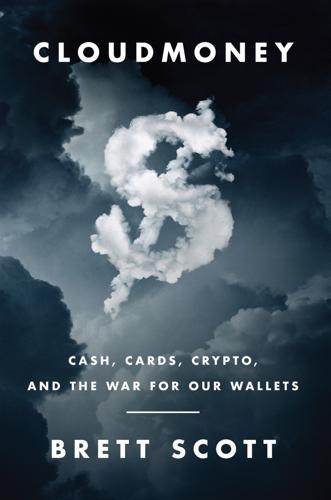
Cloudmoney: Cash, Cards, Crypto, and the War for Our Wallets
by
Brett Scott
Published 4 Jul 2022
Once kick-started into life, money solidifies its strength through network effects, the situation of millions of us being interdependent, in the context of institutions that reinforce and shape that interdependence. While states and banks are the core institutions, many ‘non-bank’ systems – such as PayPal, Venmo, WeChat, M-Pesa and Paytm – can plug themselves into the banks as add-ons. If banks take your state money and issue you digital bank chips in return, players like PayPal take your bank chips and issue PayPal chips to you in return. Numbers in your PayPal account are therefore third-tier corporate IOUs for second-tier bank IOUs for first-tier state IOUs.
…
Card networks like Visa will see billions of transaction requests from hundreds of millions of people, while SWIFT sees huge numbers of international bank transfer orders. Groups like Google and Apple are creeping in via hardware devices that we may use to send the messages, while big intermediary platforms like WeChat, M-Pesa and PayPal will see all transactions initiated via their systems. Financial institutions have historically been prevented from egregiously exposing our sensitive information to third parties. They are, however, permitted to augment their in-house data stores by forming reciprocal information clubs with other institutions.
…
Morgan, 8, 96, 150, 156, 227, 232 Jamaica, 42 Japan, 18, 35, 135, 215, 248 Johannesburg, South Africa, 129 Johnson, Alexander Boris, 38 Kazakhstan, 11, 227–9, 233, 247 Keep Cash UK, 262 Kelly, Kevin, 12 Kentridge, William, 144 Kenya, 47, 75, 129, 130–31, 169, 178, 179 Kerouac, Jack, 173, 175 Keynesianism, 80 ‘Kindness is Cashless’, 40 Kiva, 238 Kowloon Walled City, Hong Kong, 216, 219, 220, 226 Kuala Lumpur, Malaysia, 60, 74 Kurzweil, Ray, 153, 252–3 Kyoto, Japan, 135 La Guardia Airport, New York, 128 learning methodology, 163–4 left-wing politics, 7, 184, 191, 211–12, 215 Lehman Brothers, 17–18 Lenddo, 169 Level 39, Canary Wharf, 17, 20, 27, 41, 143 Leviathan (Hobbes), 177 leviathans, 177–84, 215–16 libertarianism, 7, 14, 42, 155, 156, 184 cryptocurrency and, 191, 212, 215–16, 225–6 Libra, 236–41, 245 Litecoin, 218 Lloyds, 72–3, 144, 146 loans, 70–71, 107, 159 artificial intelligence and, 167–8, 172 London, England, 128, 247, 248 Brixton Market, 177 Camberwell, 128 Canary Wharf, 17–18, 20, 41, 62, 211 City of London, 6, 135 Mayor’s Fund, 38 Somali diaspora, 116, 179 Stock Exchange, 24 Underground, 11, 37–8, 86, 87 longevity derivatives, 160 Lonsdale, Joe, 155 Lord of the Rings, The (Tolkien), 19, 155 Los Angeles, California, 101 Luther, Martin, 212 M-Pesa, 79, 109 machine-learning systems, 163–4 Macon, USS, 153 Mafia, 163 Main Incubator, 143 Malaysia, 7, 45, 60, 74 Malick, Badal, 127–8 malware, 32 manifest destiny, 212 ‘Manifesto for Cashlessness’ (Emili), 37 Maputo, Mozambique, 96 Marcus, David, 237, 241 Maréchal, Nathalie, 113 marijuana industry, 101–3 market price, 29, 171 markets, 65, 124–6, 176–80 choice and, 124–6 giant parable, 54 informal, 176–9 oligopolies and, 124–5 payments companies and, 29, 30, 31, 32–3 Marxism, 155, 262 Massachusetts, United States, 46 Massachusetts Institute of Technology (MIT), 7 Mastercard, 30, 37, 39, 77, 91 automatic payments, 149 data, 109, 111 financial inclusion and, 131–2 Wikileaks blockade, 116 Masters, Blythe, 232 Matrix, The (1999 film), 226 Mayfair, London, 6 McDonald’s, 145, 153 Medici family, 135 Melanesia, 255–6 Mercy Corps, 131, 132 Mexico, 42 Microsoft, 7 Azure cloud, 233 Word, 32, 156 middle class, 86, 128, 129 Mighty Ducks, The (1992 film), 234 Military Spouse, 153 millennials, 86, 140 Minority Report (2002 film), 10 mis-categorisations, 167 mist, 30–33 MIT Media Lab, 7 Modi, Narendra, 43, 93 Moffett airfield, California, 153 Monetarism, 80 money creation, 59–63, 67–72, 202 Money Heist (2017 series), 61 money laundering, 42, 116 money users vs. issuers, 50–52 money-passers, 30, 32–3 Monzo, 113, 142 Moon Express Inc., 153 mortgages, 26–7, 94 motor cortex, 248 Mountain View, Silicon Valley, 153 Moynihan, Brian, 38 Mr Robot, 184 Mubarak, Hosni, 116 Mugabe, Robert, 239–41 Mumbai, India, 96 Musk, Elon, 15, 212, 257 mutual credit systems, 259–60 N26, 142 Nairobi, Kenya, 129, 179 Nakamoto, Satoshi, 13, 184–5, 187, 191, 204 NASDAQ, 157, 233 National Aeronautics and Space Administration (NASA), 153 National Arts Festival, 144 National Retail Federation, 86 National Security Agency (NSA), 112, 155 Nationwide, 145–6 Natural Language Processing (NLP), 146 natural market order, 192 Nazarbayev, Nursultan, 227 Neener Analytics, 169 neo-Nazism, 226 nervous system, 20–22, 57, 80, 81, 240, 247–8, 251–2 Nestlé, 24, 28 Netflix, 61 Netherlands, 48, 49, 128–9 Nets Union Clearing Corp, 115 Network Computing, 78 New Age spiritualism, 7, 14, 193, 226 New Jersey, United States, 46 New Scientist, 137 New World Order, 261 New York City, New York, 18, 91–2, 128, 248 La Guardia Airport, 128 Wall Street, 6, 178–9 Nigeria, 43 No Cash Day, 37 no-file clients, 169 Nobel Prize, 93 nomadism, 228 non-seepage, 73 Norway, 35 nudging, 39, 93, 114 Nur-Sultan, Kazakhstan, 11, 227–9 O’Gieblyn, Meghan, 154 Oakdale, California, 101 Occupy movement (2011–12), 211, 215 Office of National Statistics, 83 oil industry, 6, 22–4 oligopolies, 2, 12, 15, 89, 124–5, 142, 151, 180–83, 191 cryptocurrencies and, 229–33, 246 On the Road (Kerouac), 173, 175 OpenBazaar, 229 OpenOil, 24 operating system, 141–2 Oracle, 109 Oxford English Dictionary, 144 Pakistan, 61 Palantir, 155, 157, 226 Panama Papers leak (2016), 81 panopticon effect, 118–19, 172 Papua New Guinea, 191 passive process, 125–6 PATRIOT Act (2001), 111, 179 payments companies, 30, 32–3, 39–41, 77–8, 79 automatic payments, 149 data, 108–9 interpellation, 86–7 plug-ins, 79, 115, 141–2 PayPal, 50, 79, 109, 155, 226, 233–7, 243 New Money campaign (2016), 86–7 Wikileaks blockade, 116 Payter, 31–2 Paytm, 44, 79, 150 Peercoin, 218 Penny for London, 37–8 pension funds, 7, 23 People’s Bank of China, 79, 242 periphery, 28, 248 Peru, 129–30, 176 Peter Diamandis, 153 Philadelphia, Pennsylvania, 41, 133 Pierce, Brock, 234 Piercy, Marge, 150 Pisac, Peru, 129 point-of-sales devices, 40, 77, 130 points of presence, 148 poker games, 91 Poland, 37, 91 police, trust in, 93 Politics of Bitcoin, The (Golumbia), 225 posture, 49 pre-capitalist societies, 55, 215, 251 Premier League, 231 primary system, 50–64 Privacy International, 168 privacy, 2, 43, 44, 46, 47, 104–19 private blockchains, 229, 231 Prohibition (1920–33), 102 promises, 50, 52, 58–9, 61, 70–72, 205–6, 259–60 casino chips, 68–9 deposits as, 69 digital money, 70–72 giant parable, 52–6, 63–4, 188 loans, 70–71, 107, 159 mutual credit systems, 259–60 Promontory Financial Group, 38 Protestantism, 212, 255 psilocybin, 226 psychometric testing, 169 pub quizzes, 91 Pucallpa, Peru, 130, 176, 249 Puerto Rico, 234 Quakers, 135 Quechuan people, 129 Quorum, 232 R3, 233 RAND Corporation, 105 re-localisation, 259 re-skinning, 16, 135–51, 171, 175 Red Crescent, 131 refugees, 131–2 Reinventing Money conference (2016), 31 remittances, 105, 116 Revolut, 140, 142 right-wing politics, 7, 14, 184, 191–3, 211–12, 215, 225–6, 261 rippling credit, 260 risk-adjusted profit, 94 Robert Koch Institute, 34 robotics, 11 Rogoff, Kenneth, 47, 92–3 rolling blackouts, 247 Roman Empire (27 BCE–395 CE), 55–6 Romeo and Juliet (Shakespeare), 29, 30, 32 Rowe, Paulette, 38 Royal Bank of Canada, 158 Royal Bank of Scotland, 62 Russia, 6, 42, 48, 140, 227 Samsung, 11 San Francisco, California, 35, 46, 119, 133, 179, 247 Sān people, 4 Santander, 38 Sardex system, 259 Satoshi’s Vision Conference, 215 Save the Children, 131 savers, 25 Scott, James, 228 seasteading, 156, 216 secondary system, 50, 63–4 self-service, 145–6 SEPA, 80 September 11 attacks (2001), 111 Serbia, 7 sex workers, 96 Shakespeare, William, 29 Shanghai, China, 18, 115, 248 Shazam, 180 Sherlock Holmes series (Doyle), 114, 162, 165, 166 Shiba Inu, 13 Shipibo-Conibo people, 130 Sikoba, 260 Silicon Valley, 7, 9, 139–41, 148, 153, 180, 221 Libra, 237 Singularity, 154–6, 252–3 Silk Road, 227, 229 Singapore, 11, 18, 168, 248 Singularity, 153–6, 226, 252, 252–3 Singularity University, 153–6, 252–3 six degrees of separation theory, 260 skyscrapers, 17–20, 27, 253 slow-boiling frogs, 104 smart cities, 11, 180 smart contracts, 220–24, 258 smart homes, 180 smartphones, 4, 28 financial inclusion and, 95 posture and, 49 Smith, Adam, 251 smoking, 181 Snow Crash (Stephenson), 10 social class, 91–9, 113, 128, 129, 155, 167 Somalia, 116, 179 South Africa, 3–4, 11, 28, 55, 62, 128, 175–6 apartheid, 95 hut tax, 55 National Arts Festival, 144 rolling blackouts, 247 syncretism in, 175–6 South Sudan, 105 Spiegel, Der, 112 Spotify, 166 spread-betting companies, 26 stablecoins, 233–41, 245–6, 255 Standard Bank, 95, 144 states, 42–5, 50–64, 176–85, 215 anti-statism, 42, 184, 215–16 base money, 69 centralisation of power, 15, 180–83 cryptocurrency and, 215 data surveillance, 110–12, 114–15, 155, 168 digital currencies, 242–5 expansion and contraction, 57–8 giant parable, 52–6, 63–4 markets and, 176–80 money issuance, 58–9 primary system, 50, 51, 63 Stockholm syndrome, 121, 131 sub-currencies, 72–3 sub-prime mortgages, 26–7, 94 subsidiary companies, 24, 26–7 Sufism, 91 suits, 124 Sunset Boulevard, Los Angeles, 101 Super Bowl, 8, 261 super-system, 3 supply, 29 surveillance, 2, 7, 8, 10, 15, 33, 39, 42, 72, 104–19, 153–72, 180, 250 artificial intelligence and, 153–72 banking sector and, 108–9 Big Brother, 113–15 CBDCs and, 244, 245 panopticon effect, 118–19, 172 payments censorship, 116–18 predictive systems, 105 states and, 110–12, 114–15, 168 Suspicious Activity Reports (SARs), 111 Sweden, 35, 43, 48, 84, 121 Sweetgreen, 91, 93 SWIFT, 32, 75–6, 80, 108, 112 Switzerland, 35, 108 Symbiosis Gathering, 101 syncing, 195–7, 200–202, 231 syncretism, 175–6 systems failures, 32, 34, 48 Szabo, Nick, 220 Taiwan, 234, 235 Tala, 169 taxation, 55, 57, 110 evasion, 42, 43, 45, 46 TechCrunch Disrupt, 130 Tencent, 2, 7, 114, 178 terrorism, 42, 48, 112, 127 Tether, 234–5, 241 Thaler, Richard, 93 Thatcher, Margaret, 193 Thiel, Peter, 155, 226 thin-file clients, 169 timelines, 197–200 Times of India, 44 tobacco, 181 Tokyo, Japan, 18, 215, 248 Tracfin, 112 transfers, 74–8 transhumanism, 180 Transport for London, 11, 37–8, 86, 87 Transylvania, 65 Trustlines, 260 Twitter, 167, 198 Uber, 2, 149, 177, 179, 237 Uganda, 168 unbanked, 35, 94, 181, 238 underdog, support for, 106 Unilever, 99, 131 United Kingdom American Revolutionary War (1775–83), 60 banking oligopoly, 230 Canary Wharf, 17–18, 20, 41, 62, 211 cash use in, 249 City of London, 6, 135 colonialism, 55, 97, 175–6, 178, 239 digital money system in, 72 GCHQ, 112 HMRC, 110 Premier League, 231 Royal Mint, 60 Somali diaspora, 116, 179 Taylor Review (2016–17), 110 Transport for London, 11, 37–8, 86, 87 United Nations, 14 blockchain research, 222 Capital Development Fund, 37 World Food Programme, 132 United States cash use in, 41, 46, 133 CBDCs and, 244–5, 254 Central Intelligence Agency (CIA), 155 China, relations with, 74–5, 245, 255 data surveillance, 111–12, 155 dollar system, 80, 182, 210, 233–6, 239, 240 Federal Bureau of Investigation (FBI), 111, 155 Federal Reserve, 32, 35, 36, 234 Financial Crimes Enforcement Network, 111 hurricanes in, 36 leviathan complex, 178 marijuana industry, 101–3 NASA, 153 National Security Agency (NSA), 112, 155 Occupy movement (2011–12), 211, 215 PATRIOT Act (2001), 111, 179 Prohibition (1920–33), 102 Revolutionary War (1775–83), 60 Senate, 105–6 September 11 attacks (2001), 111 Singularity University, 153–6 Super Bowl, 8, 261 Wall Street, 6, 178–9 Uruguay, 42 USAID, 45, 127, 178, 179, 245 vending machines, 31–2, 220 Venmo, 79, 243 Ver, Roger, 212, 214, 215 Vienna, Austria, 7 virtual reality, 10 Visa, 15, 30, 31, 37, 39, 40, 41, 44, 77, 80, 127, 174, 255 automatic payments, 149 data, 108, 109, 111, 112 plug-ins, 142 USAID and, 128, 178, 245 Wikileaks blockade, 116 VisaNet, 77 Wall Street, New York City, 6, 178–9 Occupy movement (2011–12), 211, 215 Wall Street (1987 film), 8 Wall Street Journal, 133 Warner, Malcolm, 106 WarOnCash, 37 Weber, Max, 179 WeChat, 79, 109, 114–15, 150 welfare, 43, 113, 118 Wells Fargo, 109, 234, 235 WhatsApp, 75, 198, 237–8, 244, 255 Wikileaks, 116, 183 Wilson, Cody, 216 Winton Motor Carriage Company, 87, 90 Wired, 12 World Economic Forum, 11 World Food Programme, 132 World Health Organisation (WHO), 34 World of Warcraft (2004 game), 234 Xhosa people, 175–6 YouTube, 163, 166, 167, 170 Zambia, 131 Zimbabwe, 11, 239–41, 245 Zuckerberg, Mark, 241 About the Author BRETT SCOTT is an economic anthropologist, financial activist, and former broker.
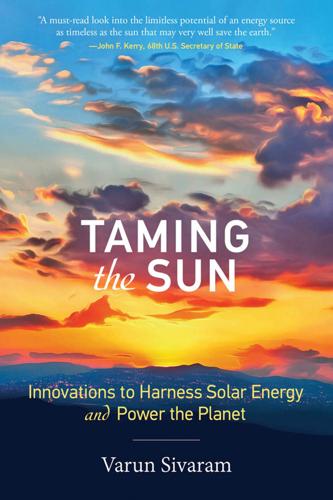
Taming the Sun: Innovations to Harness Solar Energy and Power the Planet
by
Varun Sivaram
Published 2 Mar 2018
The PAYG model for off-grid solar traces its roots to the telecommunications sector in East Africa. In 2007, Safaricom, Kenya’s largest mobile network operator, launched a revolutionary mobile payment service called M-PESA. Customers eagerly used the service, which has since become a mainstay of the economy, to transfer cash via phone for everything from salaries to taxi rides. Then two of the executives behind M-PESA realized that the platform could enable customers to pay for electricity, and they founded M-KOPA in 2011 to deploy and finance small SHSs.21 M-KOPA estimated that off-grid Kenyan households were spending nearly $300 a year on kerosene-based lighting and mobile phone charging, whereas they would save $750 over the first four years of paying 45 cents a day for an SHS.22 This value proposition has proven irresistible, and in just four years, M-KOPA managed to reach over 300,000 households in Kenya, Tanzania, and Uganda.
…
Although PAYG providers vary in their product offerings and scope of activities, they are united in their use of technology to collect payments and remotely operate solar systems (see figure 5.2 for an overview of the PAYG model). In general, customers make monthly payments via mobile money platforms like M-PESA. And providers use mobile networks to collect a wealth of data from their solar systems remotely, monitoring equipment performance and detecting maintenance needs.24 Being able to shut down the solar system remotely if payments are delinquent also spares providers the cost of operating a far-flung network of collection agents to collect payments manually.
…
See Master Limited Partnerships Mobil, 35, 36 Mobile banking, 117, 128, 135 Mobile money, 125 Mobile payments, peer-to-peer, 134 Mobisol, 125 Modi, Narendra, 13–15, 272 Mongolia, 205 Moore’s Law, xv–xvi Moran, Jerry, 93, 270 Mortgage-backed securities, 99 Mosaic Solar, 101 Moss, Todd, 119 Mouchot, Augustin, 30, 31 M-PESA, 124, 125 Multijunction solar cells, 38, 152–153 Multilateral development banks (MDBs), 111, 113, 290g Multinational institutions, financing by, 92 Multiple exciton generation, 157 Munjal, Rahul, 13 Musk, Elon, 59, 63, 163, 170, 221–224, 226, 229, 243, 247, 265 MW (megawatt), 47 Nanda, Raman, 109 Nanometer, 157 Nanosolar, 27–28, 38, 39, 52 Narayanamurti, Venky, 260 NASA (National Aeronautics and Space Administration), 265 National Academy of Engineering, 209 National Academy of Sciences, 263 National Aeronautics and Space Administration (NASA), 265 National Science Foundation, 261 Natural gas in combined cycle plants, 188, 189 and decline in nuclear power, 239, 240 hydrogen fuel from, 176 power plants running on, 75–76, 105, 234–235 Nature (journal), 145 NCA (nickel, cobalt, and aluminum) batteries, 229 Needles, Arizona, 31 Nemet, Greg, 259 Net metering, 50, 102, 107, 281g–282g NET Power, 238 Networks, of microgrids, 134 New Delhi, India, 13–16 New Orleans, Louisiana, 6 New solar projects.
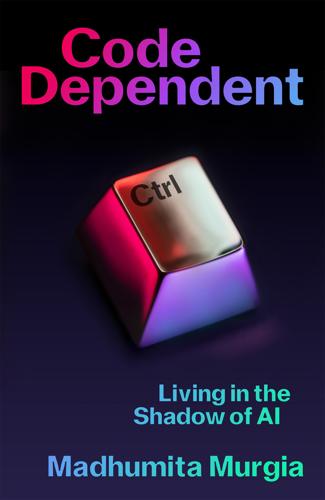
Code Dependent: Living in the Shadow of AI
by
Madhumita Murgia
Published 20 Mar 2024
We bob along like paper boats on its currents. Ruts and ditches are paths to be used, not dodged. On these narrow paths, pedestrians must defer to boda-bodas, or motorcycle taxis, imperiously honking vans, and kids kicking footballs. Butcheries and barbershops vie for space with women’s hair salons and chicken shops. They all advertise M-PESA services, the African digital wallet that is ubiquitous here. A pungent scent of slick garbage, heat and humans sits heavily in the still air. Kibera is a complex, amorphous organism with its own villages, tribes and social classes. There’s an unspoken hierarchy here. Up the hill from where we are, in Laini Saba, crime is rife and houses are made of mud or canvas sheets, six or seven people to a single dwelling.
…
In Sama’s Nairobi offices, employees wear ‘Give Work’ hoodies and T-shirts and everyone is encouraged to have a ‘side hustle’, a business idea that could, in turn, create new jobs. In a makeshift factory built in the middle of a field of rubble, a dozen women and girls sew footballs by hand – a business funded with a Sama grant. Employees have launched herbal beauty products, opened M-PESA or digital wallet shops, raised chickens for slaughter and founded girls’ football clubs in the settlements they come from. In early 2020, just before the coronavirus pandemic swept in, Leila died of epithelioid sarcoma, aged thirty-six. Her mission and the visible passion for the community of East African youth she had built up made me curious.
…
Q. ref1 Massachusetts Institute of Technology ref1 Material Bank ref1 Mbembe, Achille ref1, ref2 Meareg, Abraham ref1 Megvii ref1 Meituan ref1, ref2 Mejias, Ulises: The Costs of Connection ref1, ref2 Mercado Libre ref1 Merck ref1 Meredith, Sarah ref1 Meta ref1 advertising and ref1 communal violence and ref1 content moderators ref1, ref2 databases of faces and ref1 ethics policy ref1 metaverse and ref1 Sama and ref1, ref2, ref3, ref4, ref5 violence-inciting content ref1 see also Facebook Metiabruz ref1 Metropolitan Police ref1, ref2, ref3, ref4 Mexico ref1, ref2, ref3, ref4, ref5 Miceli, Milagros ref1, ref2, ref3, ref4 Microsoft Azure software ref1, ref2 Bing ref1 Bletchley Park summit (2023) and ref1 ethical AI charter ref1 face recognition systems and ref1, ref2 gig workers and ref1 Microsoft-Salta predictive system/public policy design and ref1, ref2 OpenAI and ref1 Rome Call and ref1, ref2, ref3 Midjourney ref1, ref2 Mighty AI ref1 migration ref1, ref2, ref3, ref4, ref5, ref6, ref7, ref8, ref9, ref10, ref11, ref12, ref13, ref14 Ministry of Early Childhood, Argentina ref1 Mort, Helen ref1, ref2, ref3, ref4, ref5, ref6, ref7, ref8, ref9 A Line Above the Sky ref1 ‘Deepfake: A Pornographic Ekphrastic’ ref1 ‘This Is Wild’ ref1, ref2 Mosul, Iraq ref1 Motaung, Daniel ref1, ref2, ref3, ref4, ref5 Mothers (short film) ref1 ‘move fast and break things’ ref1 Movement, The ref1 Mozur, Paul ref1 M-PESA ref1, ref2 MRIs ref1 Mukasa, Dorothy ref1 multi-problem families ref1 Mumbai, India ref1, ref2, ref3, ref4 Murati, Mira ref1 Museveni, Yoweri ref1 Musk, Elon ref1, ref2 Muslims ref1, ref2, ref3, ref4, ref5, ref6, ref7, ref8, ref9, ref10, ref11, ref12, ref13 Mutsaers, Paul ref1 Mutemi, Mercy ref1, ref2 My Image My Choice ref1 Nairobi, Kenya ref1, ref2 facial recognition in ref1 gig workers in ref1, ref2, ref3, ref4 Sama in ref1, ref2, ref3, ref4, ref5 Nandurbar, Western India ref1, ref2, ref3 National Health Service ref1, ref2 National Union of Professional App-Based Transport Workers ref1 National University of Defense Technology, China ref1 Navajo Nation ref1, ref2 NEC ref1 necropolitics ref1 Neruda, Pablo ref1 Netflix ref1 New Delhi, India ref1, ref2, ref3 New York Fashion Week ref1 New York Times ref1, ref2, ref3 Neymar ref1 Ngito, Benjamin ref1 Ni un Repartidor Menos (Not one Delivery Worker Killed) ref1 9/11 ref1, ref2 ‘no-fly’ zones ref1 Noble, Safiya Umoja ref1 non-disclosure agreements (NDAs) ref1, ref2, ref3, ref4 Northpointe ref1 Not Your Porn ref1 Notting Hill carnival ref1 NTech Labs ref1 Obama, Barack ref1 Obermeyer, Ziad ref1 Oculus Quest 2 virtual reality headset ref1 Ofqual ref1 Ola Cabs ref1, ref2 Olympics (2012) ref1, ref2 One Card System ref1 Online Safety Bill, UK ref1 OpenAI AI alignment and ref1 Bletchley Park summit and ref1 ChatGPT and ref1, ref2, ref3, ref4, ref5 creativity and ref1, ref2 Rome Call and ref1 Sama and ref1, ref2 Operation Condor ref1 Optum ref1 organ-allocation algorithm ref1 Orwell, George ref1, ref2 osteoarthritis ref1 outsourcing ref1, ref2, ref3, ref4, ref5, ref6, ref7, ref8, ref9, ref10, ref11 Ovcha Kupel refugee camp ref1 Oxford Internet Institute ref1 pain, African Americans and ref1 Palestine ref1 Parkinson’s disease ref1 Parks, Nijer ref1, ref2 Parvati (tuberculosis patient) ref1, ref2, ref3, ref4 Peled, Nirit ref1 Pena, Paz ref1, ref2 Perth, Western Australia ref1, ref2, ref3, ref4, ref5, ref6, ref7 Photoshop ref1, ref2, ref3 physiognomy ref1 Pi ref1 pilot programmes abandonment of ref1, ref2 ‘graveyard of pilots’ ref1 public disclosure of ref1 replacement of with human solution ref1 PimEyes ref1 policing CCTV cameras and see CCTV Crime Anticipation System ref1 De Moeder Is de Sleutel (The Mother Is the Key) ref1 diffuse policing ref1 facial recognition and see facial recognition forgiveness and ref1 predictive policing algorithms ref1 ProKid ref1, ref2, ref3 Right To Be Forgotten and ref1 Polosukhin, Illia ref1, ref2 Pontifical Academy of Sciences ref1 Pontifical Gregorian University ref1 pornography deepfake see deepfakes revenge porn ref1, ref2, ref3, ref4, ref5 Portal De La Memoria ref1 Posada, Julian ref1 pregnancy, teenage ref1 abandonment of AI pilot in Argentina ref1 abortion and ref1, ref2, ref3, ref4, ref5, ref6, ref7 digital welfare state and ref1 Microsoft Azure software and ref1 public disclosure of AI pilot in Argentina ref1 replacement of AI pilot with human solution in Argentina ref1 Princeton ref1 ProKid ref1, ref2, ref3 ProPublica ref1, ref2 proxy agents ref1, ref2 PTSD (post-traumatic stress disorder) ref1, ref2 public disclosure ref1, ref2 public-private surveillance state ref1 pulse oximeter ref1 Puma ref1 Puna Salteña, Andes ref1 qTrack ref1, ref2, ref3 Qure.ai ref1, ref2, ref3, ref4 qXR ref1 race facial recognition and ref1, ref2, ref3, ref4, ref5 medical treatment and ref1, ref2, ref3 predictive policing and ref1, ref2, ref3, ref4, ref5 radiologists ref1, ref2, ref3, ref4, ref5, ref6 Raji, Deborah ref1, ref2 Rappi ref1 recruitment systems ref1 Red Caps ref1 red-teamers ref1 Reddit ref1, ref2, ref3 regulation ref1 benefits fraud ref1 content moderators ref1 deepfakes ref1, ref2, ref3, ref4, ref5, ref6, ref7, ref8, ref9, ref10 exam grades ref1 facial recognition ref1, ref2, ref3, ref4 Foxglove and see Foxglove hateful content ref1 military weapons ref1, ref2, ref3, ref4 non-disclosure agreements (NDAs) ref1, ref2, ref3, ref4 organ-allocation algorithm ref1 political prisoners in Guantanamo Bay ref1 Right To Be Forgotten ref1 visa-awarding algorithms ref1 Reprieve ref1, ref2 responsible innovation ref1 Rest of the World ref1 retinopathy ref1 revenge porn ref1, ref2, ref3, ref4, ref5 Ricanek, Karl ref1, ref2 Ricaurte, Paola ref1, ref2 Right To Be Forgotten ref1 Roblox ref1 Roderick, Emily ref1 Rome Call ref1 Roose, Kevin ref1 Rosen, Rabbi David ref1, ref2 Russell, Stuart ref1 Salta, Argentina ref1, ref2 Sama ref1, ref2, ref3, ref4, ref5, ref6, ref7 Samii, Armin ref1, ref2, ref3, ref4, ref5 Sana’a, Yemen ref1 SAP ref1, ref2, ref3 Sardjoe, Damien ref1, ref2 Sardjoe, Diana ref1, ref2, ref3, ref4, ref5, ref6, ref7, ref8, ref9 Sardjoe, Nafayo ref1, ref2, ref3 Scale AI ref1 Scarlett, Cher ref1 Scarlet Letter, The ref1 Schwartz, Steven ref1 Scsky ref1 Secretariat for Early Childhood and Families ref1 self-attention ref1 SenseTime ref1 Sensity AI ref1, ref2, ref3 Sequoia Capital ref1 sexual assault ref1, ref2, ref3 Shelley, Mary: Frankenstein ref1 Silver Lake ref1 Singh, Dr Ashita ref1, ref2, ref3, ref4 Singh, Dr Deepak ref1 ‘slaveroo’ ref1 Slyck, Milo Van ref1 Smith, Brad ref1, ref2, ref3, ref4, ref5 Snow, Olivia ref1 social media ref1, ref2, ref3, ref4 content moderators ref1, ref2, ref3, ref4, ref5, ref6 deepfakes and ref1, ref2, ref3, ref4, ref5, ref6 electoral manipulation and ref1, ref2 SoftBank ref1 South Wales Police ref1 Sri Lanka: Easter Day bombings (2019) ref1 Stability AI ref1 Stable Diffusion ref1 Stratford, London ref1, ref2, ref3 Suleyman, Mustafa ref1 super-recognizers, Metropolitan Police ref1 Supreme Court, UK ref1 surveillance capitalism ref1, ref2 Syria ref1, ref2, ref3, ref4 targeting algorithms ref1, ref2, ref3, ref4 Taylor, Breonna ref1 Tekle, Fisseha ref1 Telegram ref1, ref2 Tesla ref1, ref2, ref3, ref4 Tezpur ref1 Thiel, Peter ref1 Thuo, David Mwangi ref1 Tiananmen Square massacre (1989) ref1, ref2, ref3, ref4 Tibet ref1, ref2 Tiger Global ref1 TikTok ref1, ref2, ref3, ref4, ref5 Top400 ref1, ref2, ref3, ref4, ref5, ref6, ref7 Top600 ref1, ref2, ref3, ref4, ref5, ref6, ref7, ref8, ref9, ref10 transformer ref1, ref2, ref3, ref4 translation ref1, ref2, ref3, ref4, ref5, ref6, ref7 TS-Cop ref1 Tséhootsooí Medical Center, Fort Defiance, Arizona ref1, ref2 tuberculosis ref1, ref2, ref3 Tuohy, Seamus ref1 Uber ref1, ref2, ref3, ref4, ref5, ref6, ref7, ref8 UberEats ref1, ref2 UberCheats ref1, ref2, ref3 Uganda ref1, ref2, ref3, ref4, ref5 Ukraine, war in ref1, ref2, ref3, ref4 UN (United Nations) Declaration of Human Rights ref1 Food and Agriculture Organization ref1 Special Rapporteur on extreme poverty and human rights report on emergence of a digital welfare state (2019) ref1 University of Buenos Aires ref1 University of California Berkeley ref1 Los Angeles ref1 University of Michigan ref1 University of Western Australia ref1, ref2 Urtubey, Juan Manuel ref1, ref2, ref3, ref4 US Department of Defense ref1, ref2 US National Institutes of Health ref1 US Navy ref1 Uszkoreit, Jakob ref1 Valbuena, Tess ref1 Vara, Vauhini ref1 Vaswani, Ashish ref1 Vatican, Rome ref1, ref2, ref3 Vazquez Llorente, Raquel ref1 Venezuela ref1, ref2, ref3 Vice News ref1 virtual private network (VPN) ref1 visa awards ref1 vocabulary, AI-driven work-related ref1 voice-over artists ref1 Wadhwani AI ref1 wages app workers ref1, ref2, ref3, ref4, ref5, ref6, ref7, ref8, ref9, ref10, ref11 data annotation/data-labelling and ref1, ref2, ref3, ref4, ref5, ref6 global wage for AI data workers ref1, ref2 Walmart ref1, ref2 Wang, Maya ref1 Washington Post ref1 Waymo ref1 webcams ref1 WeChat ref1, ref2, ref3 ‘weights’ (strength of connections) ref1 welfare systems ref1, ref2, ref3, ref4 digital welfare state ref1, ref2 White, Andrew ref1 Whittaker, Meredith ref1 Wichi ref1 Wientjes, Jacqueline ref1 Wine, Bobi (Robert Kyagulanyi Ssentamu) ref1, ref2 Wipro ref1 Wired ref1, ref2, ref3, ref4, ref5 WITNESS ref1 Witt, Hays ref1 Woodbridge, New Jersey ref1 Woods, Kat ref1 worker collectives ref1 Worker Info Exchange ref1 World Health Organization ref1 Wright, Robin ref1 Writers Guild of America ref1 Xi Jinping ref1 Xinjiang, China ref1, ref2 X-rays ref1, ref2, ref3, ref4, ref5, ref6, ref7, ref8, ref9, ref10 YouTube ref1, ref2, ref3, ref4 Yu, Amber ref1 Yuan Yang ref1 Zuboff, Shoshana ref1 Zuckerberg, Mark ref1 About the Author MADHUMITA MURGIA is the first Artificial Intelligence Editor of the Financial Times and has been writing about AI, for Wired and the FT, for over a decade.
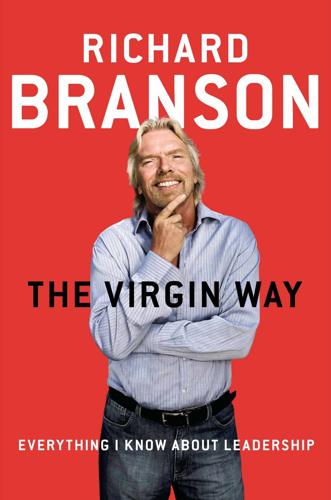
The Virgin Way: Everything I Know About Leadership
by
Richard Branson
Published 8 Sep 2014
Taking a stand on something you know to be right can lead to innovation and further business opportunities. Consider the leadership demonstrated by Safaricom and Vodafone in Kenya and Tanzania with ‘M-Pesa’. This first of its kind mobile-phone-based ‘branchless’ banking service allows users with a national ID card or passport to deposit, withdraw and transfer money easily with a mobile device. Within four years of its launch in Kenya alone, M-Pesa had attracted seventeen million subscribers, many of whom had previously had little or no access to financial institutions. The system has provided millions with new opportunities, which is driving economic growth and reducing poverty.
…
No 118 Drake, Francis 293 Drolet, Phil 289 Drucker, Peter 127, 227, 240 Duende 48, 259 Duffell, Ian 182 Durex 55 easyJet 36 Ecomagination initiative 354 see also General Electric Econet Wireless Group 360 Edwards, Jamal 280–1 Eisenhower, Dwight D. 155 Elders, The 37–38, 118, 291 Emerson, Ralph Waldo 202 Enron 102 entrepreneurs 127–31 and established businesses 285–6 female 284–5 government help for 281–3 mentoring of 282, 283, 287–91 and ‘next big thing’ 369 nurturing of, early 276–9 and Pioneers programme 280–2 and social enterprises 360–4 and Virgin StartUp 283 VMP survey of 281–2 see also Branson Centres of Entrepreneurship Ertegun, Ahmet 135 Europe in Summer Café 275 ‘Everybody Better Off’ (EBO) 188, 190 see also Virgin Money ex-prisoners 23–4 Exorcist, The 135 Facebook 131 Fadell, Tony 365, 366–7, 368–70 Fair Labor Standards Act 220 Faris, Ron 111–12, 171, 173 Fast Company 350 Financial Times 21 FirstGroup 335–40 Fiver Challenge 277–8 focus groups, informal 54 Food Basket Farm 275 Fortune 285 Founders Forum For Good 363 Fox, Nick 337 Fox, Robyn 275–6 Friedkin, William 135 Frost, David 255 G-Tech 31 Gabriel, Peter 323 Gadhia, Jayne-Anne 186, 188, 257–8, 285 Gandhi, Mohandas (Mahatma) 2 Gardner, Roy 200 Gates, Bill 195 General Dynamics 285 General Electric 353, 354 General Motors 285 Genesis 323 Giving Pledge 195 Global Entrepreneurship Week 279 Global Impact Challenge 361–3 Godfrey, Brett 72, 141, 178, 236, 243–5 GoGo 312 Goizueta, Roberto 60–1 Golden Bull Award 106 Goldman Sachs 330–1 Goodwin, Jonnie 363 Google 130–1, 137, 138, 198–9, 288, 312 April Fool stunts by 268–9 Global Impact Challenge of 361–3 and Nest 369 and Project Oxygen 214 Google Maps 310–11 Griffiths, Martin 338 Hail Merry Seasoned Nut Blend 286 Haji-Ioannou, Stelios 36–7 Happiness Advantage, The (Achor) 259–60 Harvard Business Review 322 Hastings, Reed 56, 57–8 Helen (RB’s assistant) 338 Hemingway, Ernest 86, 104 Herwald, Kurt 231 hiring: bartender who became airport manager 250–1 candidates from straitjacketed environment 210–12 and capability vs expertise 203–4 and character 202–3 cleaner who became station manager 249–50 and CV 203 and first impressions 204–5 as number-one priority 197–200 and promoting from within 205–6, 212 and retaining staff 213–14 HIV 55 HMV 181 Hoare, David 237–8 Hoberman, Brent 363 Holly Baking Company’s Chocolate Chip Cookies 286 home working 221–3 Hope, Allie 62–3 Horton, Willie 301 Howard, Anthony 90–1 HP 312 Huffington, Arianna 357, 358, 359 Huffington Post 357, 359 Hyundai 174–5 I Love Lucy 214 IBM 285 Immelt, Jeffrey 354 ‘Insights into Organization’ 97 Intel 288 iPad 149 iPhone 149, 310, 366, 371 iPod 127, 262, 366, 368, 371 Isaacson, Walter 323 iTunes 126, 169, 182, 262, 315 Jagger, Mick 97 JBL 311–12 jetBlue 222 Jobs 365 Jobs, Steve 3, 68, 126, 130, 137, 148, 191, 262, 288, 365–8, 370 and collaboration 324 on creativity 323–4 movie about 365–6 Jones, Kelly 98 Jones, Kenton ‘Keny’ 208–9 Jones, Leesa 208–9 Junior Achievement (JA) 277, 278 Just In Time (JIT) 327 Kasbah Kamadot 209 Keep it simple, stupid (KISS) 80, 98–9 Kelleher, Herb 229, 231–4, 239 Keller, Helen 180 Kennedy, John F. 32 Kerby, Chuck 350 Kia 174–5 Kiam, Victor 64 King, Lord 42, 301 KISS (Keep it simple, stupid) 80, 98–9 Kodak 124–6 Krave Turkey Jerky 286 Kreeger, Craig 76–7 Laker Airways 200, 297–300 Laker, Freddie 200, 233, 287, 289, 297–300, 305–6 Lao Tzu 117 le Carré, John 5, 30 leadership: and accessibility 47–51 akin to bringing up children 26–7 and culture 228–9; see also culture and decisions, see decisions defined and discussed 117–30 and delegation 124, 195, 198, 199–200 and entrepreneurs 127–31 Lao Tzu’s take on 117 listening as ‘bum rap’ in 31 and ‘next big thing’ 369 and oratory 31–2 and passion, see passion and simplicity 79 and today’s teenagers 276 unexpected provenance of 13 Virgin research to define 43–7, 191 and women 284–5 Leal, Raul 63–4 Leica 125, 311 Lennon, John 5 Leonardo da Vinci 178–9 Liberty Global 162 Light Brigade, Charge of 295 light bulbs, low-energy 349–53 listening: and accessibility 47–51 and anagrams 30 interrupting as opposed to 39–40 and leadership, Virgin companies’ views on 45–6 merely hearing is not 33 notable practitioners of 37–8 and note-taking 5, 30–1, 33–7 and reading between the lines 41–2 and unspoken word 40–1 Lockheed Martin 285, 311 London Marathon 322 Lone Ranger 293 M-Pesa 354 McCall, Patrick 337 McCallum, Gordon 160, 161 McCue, Mike 365 McDonald’s 147 Machel, Graça 117 McKinsey & Co. 96–7 McLaughlin, Patrick 338, 339–40 Magnuss Ltd 355 Malaysia Airlines 342–3 Manchester United FC 258 Mandela, Nelson 37–8 Markkula, Mike 288 Masiyiwa, Strive 360 Masson, Margaret 344 Mates condoms 56 Maxwell, Gavin 85 Mayer, Marissa 107, 222, 285 biography of 307 mentoring 282, 283, 287–91 Microsoft 310, 315 mission statements 101–14 B Team’s 358 brevity of 105–6 Bristol-Myers’s 106–7 Enron’s 102 and Golden Bull Award 106 Virgin Active’s 108 Yahoo!’
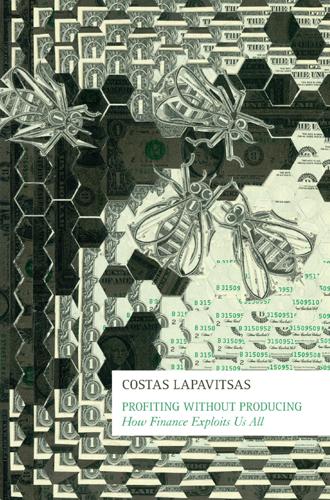
Profiting Without Producing: How Finance Exploits Us All
by
Costas Lapavitsas
Published 14 Aug 2013
For further descriptions and analysis see David Porteous, The Enabling Environment for Mobile Banking in Africa, DFID, 2006; and Gautam Ivatury and Mark Pickens, Mobile Phone Banking and Low-Income Customers, Consultative Group to Assist the Poor, 2006. More recent and broadly based work examining trust and the mechanics of the Kenyan M-PESA in particular can be found in Olga Morawcynski and Gianluca Miscione, ‘Examining Trust in Mobile Banking Transactions, in Social Dimensions of Information and Telecommunications Policy, ed. Chrisanthi Avgerou et al., New York: Springer, 2008; and William Jack and Tavneet Suri, ‘The Economics of M-PESA’, NBER Working Paper No. 16721, 2011. 63 Leading even to the far-fetched argument that electronic finance might allow developing countries to ‘leapfrog’ stages of financial development; see Stijn Claessens et al., ‘Electronic Finance: Reshaping the Financial Landscape Around the World’, Journal of Financial Research 22: 2002. 64 For a fuller analysis of the functioning and the form of world money in contemporary capitalism see Costas Lapavitsas, ‘Power and Trust as Constituents of Money and Credit’, Historical Materialism 14:1, 2006, pp. 129–54; and Costas Lapavitsas et al., Crisis in the Eurozone, London: Verso, 2012. 65 Marx, Capital, vol. 1, p. 242. 66 See, for instance, David Ricardo, Letters, in The Works and Correspondence of David Ricardo, vol. 6, ed.
…
Mori, Kahei Sinyou no Kihon Riron (The basic theory of money and credit), Tokyo: Hyouronsha, 1978. Ivatury, Gautam, and Mark Pickens, Mobile Phone Banking and Low-Income Customers: Evidence from South Africa, Consultative Group to Assist the Poor; World Bank; United Nations Foundation, 2006. Jack, William, and Tavneet Suri, ‘The Economics of M-PESA’, NBER Working Paper No. 16721, National Bureau of Economic Research, 2011. Jackson, Gregory, and Richard Deeg, ‘From Comparing Capitalisms to the Politics of Institutional Change’, Review of International Political Economy 15, 2008, pp. 680–709. Jensen, Michael C., and William H. Meckling, ‘Theory of the Firm: Managerial Behavior, Agency Costs and Ownership Structure’, Journal of Financial Economics 3:4, 1976, pp. 305–60.
…
Workshop Summary’, BIS Papers No. 65, Bank for International Settlements, 2012. Moore, Basil J., Horizontalists and Verticalists: The Macroeconomics of Credit Money, Cambridge: Cambridge University Press, 1988. Morawcynski, Olga, and Gianluca Miscione, ‘Examining Trust in Mobile Banking Transactions: The Case of M-PESA in Kenya’, in Social Dimensions of Information and Telecommunications Policy, ed. Chrisanthi Avgerou, Matthew L. Smith, and Peter van den Besselaar, New York: Springer, 2008, pp. 287–98. Morera Camacho, Carlos, and Jose Antonio Rojas Nieto, ‘The Globalisation of Financial Capital, 1997–2008’, RMF Discussion Paper 6, 2009; also published in Lapavitsas (ed.), Financialisation in Crisis, pp. 161–84.
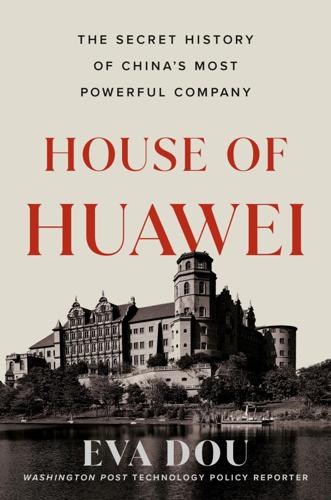
House of Huawei: The Secret History of China's Most Powerful Company
by
Eva Dou
Published 14 Jan 2025
Huawei had provided the engineering resources that Safaricom needed to build a mobile payment system called M-PESA (pesa is Swahili for “money”), which became a smash success, with people signing up for Safaricom service just to use it. This was not something Safaricom could have done without Huawei’s help. In any case, Safaricom had few options beyond making up with Huawei. Only a handful of companies in the world still made cell tower systems, and at budget price points, it was either Huawei or ZTE. A Safaricom shop in Siaya County, Kenya, advertises M-PESA, the mobile payment service developed by Huawei in 2016. When Joseph stepped down as Safaricom’s CEO in 2011, Huawei threw him a lavish party in Shenzhen, true to its tradition of remembering old friends.
…
See cellular networks Mobile World Congress, 242 Mobily, 169 Mohamad, Mahathir, 309, 352 Molko, David, 321 Mongolia, 7, 338 Monti, Mario, xxviii Motorola, 62–63, 105, 109, 123, 134, 145 Huawei and IP, 152, 196, 211–12 Mount Everest, 186–87, 191, 377 M-PESA, 162–63, 163 MRP II (manufacturing resource planning), 98 Murray, Simon, 93 “My Father and Mother” (Ren), 142, 374 Myrick, Sue, 166, 223 N Napoleon Bonaparte, 310–11 Narus, Inc., 240 National Audit Office, 133, 374 National Congress of the Communist Party, 356–57 National Science and Technology Commission, 106 National Science Conference (1978), 34–35, 369 National Security Agency (NSA) Huawei and, 105, 143, 161, 169–70, 197–98, 237–42, 245–46, 306 Operation Ivy Bells, 167 Snowden leaks, 237–42, 246, 379 National Security Information Exchange, 159–60 National Security Law, 223–24, 313 National Telecommunications and Information Administration, 347 NATO (North Atlantic Treaty Organization), 114–16 Navy, US, 167 Navy Tomahawks, US, 104 Nazarbayev, Nursultan, 244 Nazi Germany, 330, 331 Netherlands, 240 New York Police Department (NYPD), 210 New York Times, The, xli, 152, 237, 281, 301, 312–13, 379 New Zealand, 227–28 Nielsen, Kirstjen, 297 Nigeria, 112, 158, 347 Nike, xl Nikken Sekkei, 260 Nixon, Richard, 24 Noah’s Ark Lab, 243, 265–66 Nokia, 105, 134, 141, 211, 235, 250, 268, 326 Huawei and, 152, 325 submarine cable, 168 Nortel, 59, 64, 170, 211, 330 bankruptcy of, 250, 268 bribery, 83 Huawei merger talks, 161, 196–97, 341 mobile and networks, 105, 195, 196–97 North American Free Trade Agreement, 344 North Korea, 8, 24, 31, 292, 320, 343 Huawei and, 164, 166, 278, 324–25, 376 ZTE and, 257, 278 Northrop B-2 Spirit, 114 NSA.
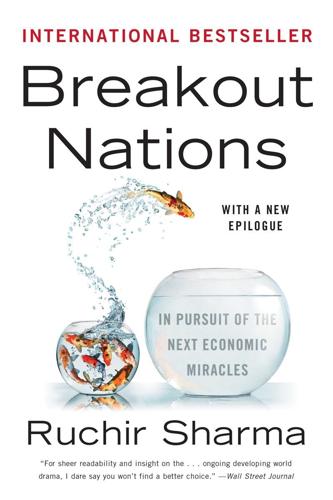
Breakout Nations: In Pursuit of the Next Economic Miracles
by
Ruchir Sharma
Published 8 Apr 2012
To cite just one example, consider the success of mobile banking, which offers a way for people on the low end of the economic scale to leap into the world of modern finance without having to build a single bank. With an M-Pesa “electronic wallet” a Kenyan can use his cell phone to pay for a ride in a taxicab, a service that is not available in the West. Since 2007 the number of Kenyans who keep money in a bank has risen from one in five to one in two, thanks in large part to M-Pesa. The increase in bank savings could serve as a new pool of money to finance the building of roads and other critical infrastructure, and its potential to grow is huge.
…
Kospi,” 153, 164 drug cartels, 74, 79–80 Dubai, 188, 214, 218–19 Dubai World, 214 Dubrovnik, 97 Dun Qat refinery, 201 DuPont, 9 “Dutch disease,” 179, 220 earnings, corporate, 3 East African Community (EAC), 208–9 East Asia, 8, 10, 46, 131–32, 146, 196–97, 208, 245 “East Asian tigers,” 8, 10, 146 “easy money,” 5–6, 11, 13–14, 38, 105, 133, 176–77, 182–83 economic transformation program (ETP), 151 economies: agrarian, 9, 17–18, 21, 22, 27 business cycles in, 2, 5–6, 11, 223 command-and-control, 29–30, 39, 156, 199–200 commodity, 133–34, 137–38, 223–39 counter-cyclical, 120–21 developing, see developing countries diversified, 165–66 emerging markets in, vii–x, 2–11, 37–38, 47, 64, 94, 185–91, 198–99, 242–49, 254–55, 259–62 forecasting on, x, 1–14, 17, 18, 31–32 global, 1–2, 4–5, 6, 7–8, 9, 12, 14, 18–19, 37, 38, 51–52, 68–71, 153–55, 158–59, 161, 167–69, 170, 176, 178, 183–91, 222–24, 228–31, 233–36, 241–42, 249–54 growth rates in, 8–11, 185–91, 244–49, 254–55 historical trends in, ix–x, 2, 9, 10–11 knowledge, 236–37 parallel, 79–80 recessions in, 5–6, 9, 11, 18, 34, 80, 101, 109, 131, 132, 144, 225, 244, 249–51 “tiger,” 8, 10, 46 volatility of, 249–51 see also specific countries Economist, 207 education, x, 5, 12, 22, 63, 65, 76, 121, 168–69, 206, 218, 220 efficiency, 63–64 “efficient corruption,” 135–37 Egypt: author’s visit to, ix corruption in, 217 economic reform in, 27, 28, 126–27, 217–18 as emerging market, 204, 235 foreign investment in, ix, 92 inflation rate in, 88 revolts in, 127, 216 stock market of, 190 Eighth Malaysian Plan, 151 Einstein, Albert, 238 El Beblawi, Hazem, 128 el dedazo (“the big finger”), 76–77 election cycles, 2 electromagnetic radiation, 17 “electronic wallet,” 208 Elle, 53 emerging markets, vii–x, 2–11, 37–38, 47, 64, 94, 185–91, 198–99, 242–49, 254–55, 259–62 energy efficiency, 226–27 energy sector, 5, 13, 51–52, 67–68, 82, 125, 170, 212–13, 215, 223, 224–29 English language, 37, 52–53, 141, 196, 203–4 entrepreneurship, 38, 43, 58, 96, 144, 166, 186, 225 entry point projects (EPPs), 151 environmental issues, 17, 135 Equatorial Guinea, 210 Erbakan, Necmettin, 114–15 Erdogan, Recep Tayyip, 111, 112, 113–14, 116–18, 123, 124–28, 210, 245 “errors and omissions,” 150 Eskom, 177 Estonia, 109 euro, 100, 105, 107, 108 Eurocentrism, 206 Europe: agriculture in, 231–32 banking system of, 12 Central and Eastern, 8, 11, 97–110, 121, 170, 203, 247 debt levels in, 57, 97, 100, 121–22, 252 economy of, 7, 12, 107–8, 230, 241, 245 foreign investment by, 2, 7, 20, 100, 104–8 foreign trade of, 145, 159 GDP in, 20, 100 government deficits in, 100 growth rate of, 6, 241, 242 manufacturing sector of, 247 political unity of, 11, 49, 53, 97–98, 208–9 recessions in, 101, 132 unemployment in, 101, 126 welfare states in, 63 see also specific countries European Community (EC), 208–9 European Union (EU), 11, 97–98, 101, 105, 106–8, 109, 115–16, 118, 121–22, 159, 253–54 Eurozone, 11, 99–100, 105, 106–8, 109, 121–22, 254 expatriate workers, 219 Facebook, 41 factories, 17–18, 22–23, 28, 43, 67, 68, 132, 230 “fairness creams,” 54 family enterprises, 125–26, 134–38, 155, 160, 161–63, 167–69, 254 “farmhouses,” vii–viii fast-food outlets, 53 Federal Palace Hotel, 212 Federal Reserve Board, 5–6, 222 feeder ships, 200 Femsa, 75 Fiat, 120 fiber-optic cables, 207–8 Fidesz Party, 104–5 Fiji, 4 film industry, 44, 47, 167, 186, 211 “financialization of commodities,” 227–28 Finland, 238, 251 First Coming, 243 fishing industry, 193 five-year plans, 20, 27, 150–51 Forbes, 47, 91 “forced listing,” 188 Ford, 75, 120 foreign investment, vii–x, 2, 7–8, 9, 18, 20, 32, 35–36, 37, 43–44, 49–50, 59, 63, 64, 66, 68–72, 86, 87, 91–94, 100, 104–8, 118, 119–20, 133–35, 137, 139, 140–41, 144, 146–50, 151, 183–84, 198–200, 201, 203–5, 206, 225 foreign trade, vii, x, 6, 7, 13, 18, 20–21, 23, 26, 28, 29, 31, 32–33, 43, 59, 61, 62, 67–68, 72, 75, 80, 83, 85, 86, 90, 117, 120, 122, 132, 133–34, 144–45, 147, 148, 157, 158–59, 162, 178, 183, 196–97, 198, 206, 220, 223, 226, 232, 233–34 Four Seasons Hotel, 111, 232, 233 Four Seasons Index, 232, 233 “$4,000 barrier,” 7–11 Fourth World, 185–91, 204–9, 220, 221 Fox, Vicente, 77 Fraga, Arminio, 72 France, 63, 100, 121, 123–24 Franklin, Benjamin, 214 Freedom House, 205 “free float,” 188 free markets, x, 8–9, 96, 104 French, Patrick, 47 French Riviera, 59–61 frontier markets, 89, 185–91, 213, 261–62 Fujian Province, 164 futures contracts, 5 Gandhi, Indira, 55 Gandhi, Rahul, 48 Gandhi, Sanjay, 55 Gandhi, Sonia, 39 Gandhi family, 39, 47–48, 55, 57 gas, natural, 13, 85, 179, 214, 215, 217, 225, 235 gasoline, 126, 215 GaveKal Dragonomics, 229 Gaziantep, 125 General Electric, 9 generators, electric, 212–13 Germany: billionaires in, 45 economy of, 103 as EU member, 107, 121 GDP of, 247 low-context society of, 40 manufacturing sector in, 157, 158–59, 247 population of, 37 public transportation in, 16 South Korea compared with, 168–69 Germany, East, 102 Gertken, Matthew, 29 Ghana, 187 Gibson, Mel, 129 Gini coefficient, 173 Girl’s Generation, 167 glass manufacturing, 221 Globo, 61 GM, 75, 163 “go-go stocks,” 3 gold, 3, 141, 176, 178, 179–80, 192, 202, 205, 224, 229–30 “Goldilocks economy,” 4, 5–6 gold shares, 179–80 gold standard, 178 Goldstone, Jack, 217 Goodhart, Charles, 11 Goodhart’s law, 11 Google, 41, 237–38 Gorbachev, Mikhail, 103 “Goulash Communism,” 101 government paper, 116 government spending, 41–42, 63, 65, 66–67, 70–71, 72, 86, 87–88, 109, 133, 181–83, 190 government transformation program (GTP), 151 graft, 43–44 see also corruption Great Britain: auto industry in, 31 empire of, 49, 118, 192 foreign investment by, 206 government of, 89 labor force of, 100 public transportation in, 16 socialism in, 150 Great Depression, 101, 109, 252–53 Great Moderation, 250–51 Great Recession (2008), 5–6, 9, 59, 66, 76, 80–81, 88, 92–93, 100, 101, 102, 103, 109, 119, 122, 131, 144, 180, 189, 225, 243, 247–49, 250, 254 Greece, 11, 27, 30, 99, 100, 107–8, 121, 181, 252 green revolution, 231–32 Greenspan, Alan, 6 gross domestic product (GDP), 1, 3–4, 6, 17, 18, 20, 26, 32, 43, 49, 57, 63, 65, 66, 67, 72, 85, 92, 100, 107, 110, 116, 117, 119, 120, 121, 131, 133, 139, 140, 141, 142, 144–45, 147, 149, 155, 157, 158, 159, 161, 165, 170, 173, 178–79, 180, 191, 206, 208, 210, 214, 215, 217, 218, 219, 228, 236, 243, 247, 252 Group of Twenty (G20), 215 growth corridors, 151 Gül, Abdullah, 118, 123–24, 127 Gulf States, 214–21, 244, 245 see also specific states Gupta, Anil K., 237 Habarana, 196 Hall, Edward, 39–40 Hallyu, 167 Hambantota, 197 Hanoi, 198, 200 Han people, 53 Harmony Gold, 180 Harvard School of Public Health, 241 Havel, Václav, 111 Hayek, Friedrich, 109 Hazare, Anna, 42–43 headscarves, 123–24 health care, 63 helicopters, 60, 64, 72 herd behavior, 8, 228–31 high-context societies, 39–40, 41, 47 high-speed trains, 15–16, 20, 21 highways, 17, 20, 21, 65, 231 Hindi language, 52–53, 56 “Hindu rate of growth,” 174 Hindustan Times, 53 Hirsch, Alan, 178 Ho Chi Minh City, 200, 201, 203 Honda, 161 Hong Kong, 9, 141, 235 “Hopeless Continent,” viii Hotel Indonesia Kempinksi, 129 hotels, 12, 31, 59–61, 65, 111, 232, 233 “hot money,” 149–50 housing prices, 5–6, 16, 18, 24–25, 28–29, 31, 32, 61, 92, 103–4 HP, 158 Huang, Yukon, 28 Huang Guangyu, 46 Hu Jintao, 29 Humala, Ollanta, 66–67 human-rights violations, 193 Hungary: banking in, 105 as breakout nation, 99–100, 101 economic growth of, 99, 104–6, 109 as emerging market, 104–6 as EU candidate, 100, 105 foreign investment in, 104, 105 GDP of, 100 growth rate of, 244 income levels of, 8 industrial production in, 101 political situation in, 104–5, 109 population of, 106 post-Communist era of, 101, 104 welfare programs of, 106 Hussein, Saddam, 195 Huxley, Aldous, x hyperinflation, 39, 42, 62, 66 “hypermarkets,” 90–91 Hyundai, 90, 156, 158, 161–63, 168 identification cards, 213 immigration, 79, 82, 85, 95 income: national levels of, 4, 8, 11, 16–21, 24–25, 31–32, 38, 58, 61, 63, 72, 75, 83, 86–87, 88, 97–98, 113, 116, 121, 138, 139–40, 141, 144, 145, 148, 153–55, 157, 173, 176–77, 182–83, 204 per capita, ix, 7–8, 11, 13, 19–21, 41, 58, 61, 63, 72, 73–75, 76, 88, 97–98, 109, 116, 127, 131–32, 138, 148, 176–77, 204, 207, 216, 244, 245–46 taxation of, 44, 51, 63, 76, 86, 106, 126–27, 182, 214, 221 India, 35–58 agriculture of, 38, 44, 54, 57 auto industry of, 54, 161, 162, 173 baby-boom generation in, 37–38 billionaires in, viii, 25, 44–47, 79, 254 Brazil compared with, 10, 39–43, 61, 70 as breakout nation, 38–39, 49 capitalism in, 38–39, 42, 46–47, 49, 50–51, 58 China compared with, 1, 10, 19, 25, 36, 37–38, 41, 45, 47, 52, 53, 56, 57, 58 consumer prices in, 38, 39, 49, 52–54, 57 corruption in, 42, 43–44, 45, 46–47, 49–51, 58 credit market in, 38, 51 debt levels in, 57–58 democracy in, 30, 48–49, 50, 55–56, 58 “demographic dividend” for, 37–38, 55–56, 58 domestic market of, 36, 43 economic reforms in, 28, 38–39, 49 economy of, 28, 35–58, 174, 204 elections in, 48–49, 50, 55 “Emergency” period of, 55–56 as emerging market, 3–4, 10, 30, 35–39, 43, 49, 106, 253 English spoken in, 37, 52–53 entrepreneurship in, 38, 43, 58 film industry of (Bollywood), 44, 47, 167, 211 forecasts about, 35–36, 37, 39–40 foreign investment in, vii–viii, 7, 35–36, 37, 43–44, 49–50, 183, 225 foreign trade of, vii, 43, 157 Gandhi family in, 39, 47–48, 55, 57 GDP of, 1, 3–4, 43, 49, 57 as global economy, 1, 37, 38, 51–52 government of, 30, 38–39, 41–43, 47–52, 55–58 government spending in, 41–42 growth rate of, 3–4, 9, 30, 35–58, 61, 64, 87, 88, 174, 241, 244 high-context society in, 39–40, 47 income levels of, 8, 19, 54, 58 independence of, 174, 175, 176 Indonesia compared with, 135, 136 inflation rate in, 39, 43–44, 248 infrastructure of, 10, 43, 51 investment levels in, 43–44, 49–50 labor market in, 38, 55 leadership of, 38–39, 41–42, 47–52, 57–58, 174 License Raj of, 38 middle class of, 42–43, 52–56 mining industry of, 44, 254 natural resources of, 51–52, 235 northern vs. southern, 49–52, 54, 58 outsourcing industry in, 141 parliament of, 43, 44, 47–49 political situation in, 30, 37, 38–39, 47–49, 50, 55–58, 174 population of, 19, 37–38, 52–56, 57, 58, 95 poverty in, 41–42, 52–53, 57–58 price levels in, 53 productivity in, 64 real estate market in, 44, 254 “rope trick” in, 35–36, 36, 37, 58 rural areas of, 38, 57 Russia compared with, 36–37, 44–45, 46, 87, 88, 95 social unrest in, 42–43, 55–56 Sri Lanka’s relations with, 196, 197 state governments of, 37, 44, 48–52 sterilization (vasectomy) program in, 55–56 stock market of, 36–37, 38, 70, 189, 243, 244 taxation in, 44, 51 technology sector of, 141, 166, 254 unemployment in, 41–42 wealth in, vii–viii, 25, 44–47, 57, 79 welfare programs of, 10, 41–42 India: A Portrait (French), 47 Indian Ocean, 197 Indonesia, 129–38 in Asian financial crisis, 131–35 banking in, 133–34, 135 billionaires in, 131–32 China compared with, 132–33, 135, 136 Chinese community in, 129 consumer prices in, 137–38, 232 corruption in, 134–35 currency of (rupiah), 131 economic reforms in, 132–38, 147 economy of, 28, 132–38, 147, 174, 254 elections in, 136–37 as emerging market, 133, 232 family enterprises in, 134, 138, 254 foreign investment in, 7, 133–35, 137 foreign trade of, 132, 133–34, 157, 159 GDP of, 131, 133 government of, 30, 132–37 growth rate of, 132–33, 136, 137, 245, 246, 254 income levels of, 8, 131–32, 138 India compared with, 135, 136 inflation rate of, 137–38, 249 labor market in, 23, 203 land development in, 135–36 national debt of, 134–35 natural resources of, 133–34, 159, 235 Philippines compared with, 132, 138, 140 political situation in, 129, 132, 133, 134, 135, 136, 137, 210 population of, 133, 136 Russia compared with, 137–38 urban decentralization in, 136–37 wealth of, 131–38 industrialization, 10, 67, 68, 101 inflation rate, x, 4, 5, 17, 22, 23, 24, 25, 31, 33, 39, 42, 43–44, 62, 66, 68–69, 88, 104, 115, 116, 118, 137–38, 176, 177, 179, 202, 226, 228, 247–49, 250, 254 Infosys, 37 infrastructure, x, 10, 15–16, 20–21, 43, 51, 61, 62, 64, 65, 69, 84–85, 88, 90–91, 116, 120–21, 199, 200–201, 239 inheritance taxes, 44 insider trading, 46, 187 Institutional Revolutionary Party (PRI), 76–78 Intel, 164, 203–4 intellectual property, 238 interbank loans, 150 interest rates, 6, 11, 62, 67, 68–70, 105, 106, 107, 115, 119, 120, 228–29, 247–49, 250 internal devaluation, 108, 109 International Finance Corporation, 214 International Monetary Fund (IMF), 101, 115, 160, 173, 208, 216–17 Internet, 2, 85, 173, 175, 177, 207–8, 220, 225, 230, 237–39 interregional exports, 206–7 investment, viii, x, 2–8, 19, 37, 90, 96, 131, 144, 146–50, 156, 160–61, 165, 190, 212–13, 220, 223–29, 231, 235, 236–38, 244 see also foreign investment Ipanema Beach, 21, 61, 65, 66 Iran, 10, 123, 189, 190 Iraq, 10, 122, 189, 195 iron, 51–52, 59, 67, 69, 180, 232 Iron Curtain, 101 Iskandar region growth agenda, 151 Islam, 111, 113–17, 119, 121, 122, 123–24, 127, 146, 162, 211, 219, 220, 246 Islamic Museum, 219 Israel, 122, 127 Istanbul, 111, 115, 122, 125, 146 Italy, 40, 99 Ivory Coast, 208 Izmir, 115, 124, 125, 146 Jaffna Peninsula, 193, 195 Jakarta, 129–31, 135, 136, 137, 232 Jalan Sudirman, 129 Japan: in Asian financial crisis, 155–56 auto industry of, 139, 144, 161 China compared with, 18, 20, 22, 24, 31, 32–33 currency of (yen), 32–33 democratic government of, 30 economic slowdown of, 22, 254 economy of, 8, 20, 22, 81, 90, 197, 230, 235, 242, 253, 254 foreign trade of, 7, 32–33, 144–45, 157, 159 GDP of, 144–45 growth rate of, 6, 32–33, 44, 235 income levels of, 20, 138, 144 inflation rate in, 31 manufacturing sector of, 157, 159, 170, 230, 235 pop culture in, 167 population of, 169 property values in, 24, 252 public transportation in, 20 real estate market in, 3 recession in, 109 research and development (R&D) in, 160–61, 237 social conformity in, 200 South Korea compared with, 153, 155–56, 157, 159, 160–61, 163, 164, 167, 168, 169, 170 stock market of, 156, 235 Taiwan’s relations with, 163–64 technology industry of, 160–61, 236–38 Thailand compared with, 139, 144–45 Java, 137 “Jeepneys,” 130, 138 Jews, 118, 149 Jharkhand, 46 Jiang Zemin, 29 Jobbik (Movement for a Better Hungary), 105 Jockey underwear, 54 Johannesburg, 181, 204 Jonathan, Goodluck, 209–11, 213 Jordan, 122 J-pop, 167 junk bonds, 228 “just-in-time” supply chains, 80 Kabila, Laurent, 205 Kagame, Paul, 206 Kano, 213 Kaohsiung, 136 Kapoor, Ekta, 41 Karachi, 190 Karnataka, 50, 51 Kashmir, 49, 50 Kasimpasa neighborhood, 125 Kayseri, 124 Kazakhstan, 30, 89, 93, 123, 212 Kazan, 85 Kennedy, John F., 129 Kenya, 191, 205, 209 Keynes, John Maynard, 109 KGB, 86 Khodorkovsky, Mikhail, 87 Kia, 161, 162–63 kidnappings, 78–79, 190–91 Kim Jong Il, 170 Kinshasa, 205 Kirchner, Cristina, 89 Kirchner, Nestor, 89 Klaus, Vaclav, 108 Koç family, 125 “Korea Discount,” 167–69 “Korean Wave,” 122, 167 KOSPI index, 70, 153, 155, 156, 164, 165 K-pop, 122, 154, 167 Kuala Lumpur, 147, 148, 151 Kumar, Nitish, 50–51 Kuwait, 187–88, 214, 216, 218, 219 Kuznets curve, 76 labor market, 7, 17, 21–23, 27, 32, 38, 47, 55, 64, 65, 76, 77, 102, 103, 104, 164, 169–70, 174–75, 179, 180–81, 199, 203–4, 246–47 Lada, 86 Lafarge, 213 Lagos, 211, 212, 213 landlines, 207 land-use laws, 25, 168 Laos, 188 laptop computers, 158, 164 large numbers, law of, 7 Last Train Home, The, 22–23 Latin America, viii, 40–41, 42, 73–75, 81, 89, 246 see also specific countries Latvia, 101 Lavoisier, Antoine, 235–36 law, rule of, x, 50–51, 89, 96, 127, 181–82 lead, 19 Leblon neighborhood, 61 Lee Kwan Yew, 118, 148, 193 Lehman Brothers, 164 Le Thanh Hai, 203 Lewis, Arthur, 21 “Lewis turning point,” 21 LG, 158, 163 “Liberation Tigers” of Tamil Eelam, 192–93, 197 Liberty, 178 Libya, 127, 216 Limpopo River, 171 Linux, 238 liquidity, 9, 228–30 liquor stores, 126 literacy rate, 52 Lithuania, 101, 109 Lixin Fan, 22–23 loans, personal, 12, 24, 116, 125, 150 long-run forecasting, 1–14 L’Oréal, 31 Louis Vuitton, 31 Lugano, 40 Lula da Silva, Inácio, 59, 61, 66, 70, 210, 226, 248 luxury goods, vii–viii, 12, 25, 31, 236 Macao, 201 macroeconomics, 7–8, 13, 66, 67, 145–46, 188 “macromania,” 7–8, 188 Made in America, Again, 246–47 “made in” label, 155, 246–47 Madhya Pradesh, 52 maglev (magnetic levitation) trains, 15–16, 231 Magnit, 90–91 Mahatma Gandhi National Rural Employment Guarantee Act (MGNREGA), 41–42 Malaysia, 146–52 in Asian financial crisis, 18, 131–32, 146–47, 149–50 banking in, 146, 149–50, 151, 252 currency of (ringgit), 131, 146–47, 149 economic planning in, 150–52, 161 economy of, 18, 118, 150–52, 161, 235 electronics industry of, 147–48 as emerging market, 10, 45, 118, 149, 161, 235 foreign investment in, 146–50, 151 foreign trade of, 6, 144, 147, 157 GDP of, 145, 147, 149 government of, 146, 148–52 growth rate of, 9, 147–48, 149, 244 income levels of, 138, 148 manufacturing sector in, 147–48, 150 political situation in, 146–49 Singapore compared with, 118 stock market of, 131, 235 Thailand compared with, 144, 145, 147 wealth of, 148 Mali, 208 Malta, 30, 106 Malthus, Thomas, 225, 231–32 Mandela, Nelson, 171, 172, 176 Manila, 130, 138, 139, 140, 141 Manuel, Trevor, 176 manufacturing sector, 17–18, 22–23, 28, 43, 54, 75, 80, 88–89, 90, 110, 124, 132, 147–48, 150, 155, 157, 158–59, 160, 161–66, 168, 170, 180, 221, 230, 235, 246–47, 265 Maoism, 37, 47 Mao Zedong, 21, 27, 29 Marcos, Ferdinand, 138, 139, 210 markets: black, 13–14, 96, 126 capital, 69, 70–71; see also capital flows commodity, 12, 13–14, 223–39 currency, 4, 9, 13, 28 domestic, 36, 43, 183 emerging, vii–x, 2–11, 37–38, 47, 64, 94, 185–91, 198–99, 242–49, 254–55, 259–62 free, x, 8–9, 96, 104 frontier, 89, 185–91, 213, 261–62 housing, 5–6, 16, 18, 24–25, 28–29, 31, 32, 61, 92, 103–4 labor, 7, 17, 21–23, 27, 32, 38, 47, 55, 64, 65, 76, 77, 102, 103, 104, 164, 169–70, 174–75, 179, 180–81, 199, 203–4, 246–47 see also stock markets Mato Grosso, 232 Mayer-Serra, Carlos Elizondo, 78 MBAs, 225 Mbeki, Thabo, 176, 206 Medellín drug cartel, 79 Medvedev, Dmitry, 95–96 Mercedes-Benz, 86, 144 Merkel, Angela, 108 Mexican peso crisis, 4, 9 Mexico, 73–82 antitrust laws in, 81–82 banking in, 81, 82 billionaires in, 45, 47, 71, 78–80 Brazil compared with, 71, 75 China compared with, 80, 82 consumer prices in, 75–76 corruption in, 76–77 currency of (peso), 4, 9, 73, 80, 131 drug cartels in, 79–80 economy of, 4, 12, 28, 73–82, 178, 183 emigration from, 79, 82 foreign exports of, 6, 75, 80, 158 GDP of, 76, 77, 81 government of, 76–78 growth rate of, 73–82, 244 income levels of, 8, 73–75, 76, 113 labor unions in, 76, 77 national debt of, 76, 80–81 nationalization in, 77–78 oil industry of, 75, 77–78, 82 oligopolies in, 73, 75, 76–82, 178 parliament of, 76–77 political situation in, 76–78, 82 population of, 73 stock market of, 73, 75, 76, 81 taxation in, 76 U.S. compared with, 75, 79, 80 Mexico City, 75 micromanagement, 151 middle class, 10, 19–20, 33, 42–43, 52–56, 182, 211, 236 Middle East, 38, 65, 68, 113, 116, 122, 123, 125, 166, 170, 189, 195, 214–21, 234, 246 middle-income barrier, 19–20, 144–45 middle-income deceleration, 20 Miller, Arthur, 223 minimum wage, 29, 63, 126, 137 mining industry, 44, 93, 154, 175, 176, 178–80 Miracle Year (2003), 3–6 misery index, 248–49 Mittal, Sunil Bharti, 204–5, 206, 209 mobile phones, 53, 86, 204–5, 207–8, 212, 237 Mohammed, Mahathir, 146–47, 148, 151 Moi, Daniel arap, 205 monetization, 225 Money Game, The (Smith), 234 Mongolia, 191 monopolies, 13, 73, 75–76, 178–79 Monroe, Marilyn, 129 Monte Carlo, 94 “morphic resonance,” 185 mortgage-backed securities, 5 mortgages, 5, 92, 105–6 Moscow, 12, 83, 84, 90, 91, 96, 136, 137, 232 mosques, 111 Mou Qizhong, 46 Mozambique, 184, 194–95, 198, 206 M-Pesa, 208 MTN, 212–13 Mubarak, Gamal, 218 Mubarak, Hosni, 92, 127, 218 Mugabe, Robert, 176, 181 Multimedia Supercorridor, 151 multinational corporations, 53, 73, 75, 81, 151, 158–59, 160, 184, 230 Mumbai, 43, 44, 79, 214, 244 Murder 2, 167 Murphy’s law, 11 Muslim Brotherhood, 127 Mutual, 178 mutual funds, 178–79 Myanmar, 30 Myspace, 41 Naipaul, V.
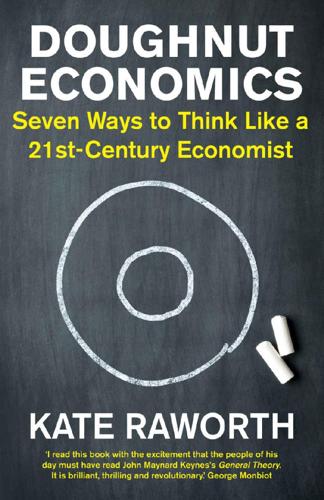
Doughnut Economics: Seven Ways to Think Like a 21st-Century Economist
by
Kate Raworth
Published 22 Mar 2017
What’s more, for the first time in history such a scheme could actually work, thanks to the rapid worldwide spread of mobile phones and the proven success of mobile banking. Kenya has been a trailblazer in mobile banking since launching its M-PESA mobile money service in 2007. Within six years, three quarters of all Kenyan adults had used the service, including 70% of those in rural areas, and – astonishingly – over 40% of Kenya’s GDP was passing through M-PESA.88 Worldwide, 5.5 billion people are expected to be using mobile phones by 2018, and mobile banking will come as part of the package.89 In essence, it will soon be feasible to create a phone book of the world’s ‘bottom billion’ and to text digital cash directly to them.
…
Page numbers in italics denote illustrations A Aalborg, Denmark, 290 Abbott, Anthony ‘Tony’, 31 ABCD group, 148 Abramovitz, Moses, 262 absolute decoupling, 260–61 Acemoglu, Daron, 86 advertising, 58, 106–7, 112, 281 Agbodjinou, Sénamé, 231 agriculture, 5, 46, 72–3, 148, 155, 178, 181, 183 Alaska, 9 Alaska Permanent Fund, 194 Alperovitz, Gar, 177 alternative enterprise designs, 190–91 altruism, 100, 104 Amazon, 192, 196, 276 Amazon rainforest, 105–6, 253 American Economic Association, 3 American Enterprise Institute, 67 American Tobacco Corporation, 107 Andes, 54 animal spirits, 110 Anthropocene epoch, 48, 253 anthropocentrism, 115 Apertuso, 230 Apple, 85, 192 Archer Daniels Midland (ADM), 148 Arendt, Hannah, 115–16 Argentina, 55, 274 Aristotle, 32, 272 Arrow, Kenneth, 134 Articles of Association and Memoranda, 233 Arusha, Tanzania, 202 Asia Wage Floor Alliance, 177 Asian financial crisis (1997), 90 Asknature.org, 232 Athens, 57 austerity, 163 Australia, 31, 103, 177, 180, 211, 224–6, 255, 260 Austria, 263, 274 availability bias, 112 AXIOM, 230 Axtell, Robert, 150 Ayres, Robert, 263 B B Corp, 241 Babylon, 13 Baker, Josephine, 157 balancing feedback loops, 138–41, 155, 271 Ballmer, Steve, 231 Bangla Pesa, 185–6, 293 Bangladesh, 10, 226 Bank for International Settlements, 256 Bank of America, 149 Bank of England, 145, 147, 256 banking, see under finance Barnes, Peter, 201 Barroso, José Manuel, 41 Bartlett, Albert Allen ‘Al’, 247 basic income, 177, 194, 199–201 basic personal values, 107–9 Basle, Switzerland, 80 Bauwens, Michel, 197 Beckerman, Wilfred, 258 Beckham, David, 171 Beech-Nut Packing Company, 107 behavioural economics, 11, 111–14 behavioural psychology, 103, 128 Beinhocker, Eric, 158 Belgium, 236, 252 Bentham, Jeremy, 98 Benyus, Janine, 116, 218, 223–4, 227, 232, 237, 241 Berger, John, 12, 281 Berlin Wall, 141 Bermuda, 277 Bernanke, Ben, 146 Bernays, Edward, 107, 112, 281–3 Bhopal gas disaster (1984), 9 Bible, 19, 114, 151 Big Bang (1986), 87 billionaires, 171, 200, 289 biodiversity, 10, 46, 48–9, 52, 85, 115, 155, 208, 210, 242, 299 as common pool resource, 201 and land conversion, 49 and inequality, 172 and reforesting, 50 biomass, 73, 118, 210, 212, 221 biomimicry, 116, 218, 227, 229 bioplastic, 224, 293 Birmingham, West Midlands, 10 Black, Fischer, 100–101 Blair, Anthony ‘Tony’, 171 Blockchain, 187, 192 blood donation, 104, 118 Body Shop, The, 232–4 Bogotá, Colombia, 119 Bolivia, 54 Boston, Massachusetts, 3 Bowen, Alex, 261 Bowles, Sam, 104 Box, George, 22 Boyce, James, 209 Brasselberg, Jacob, 187 Brazil, 124, 226, 281, 290 bread riots, 89 Brisbane, Australia, 31 Brown, Gordon, 146 Brynjolfsson, Erik, 193, 194, 258 Buddhism, 54 buen vivir, 54 Bullitt Center, Seattle, 217 Bunge, 148 Burkina Faso, 89 Burmark, Lynell, 13 business, 36, 43, 68, 88–9 automation, 191–5, 237, 258, 278 boom and bust, 246 and circular economy, 212, 215–19, 220, 224, 227–30, 232–4, 292 and complementary currencies, 184–5, 292 and core economy, 80 and creative destruction, 142 and feedback loops, 148 and finance, 183, 184 and green growth, 261, 265, 269 and households, 63, 68 living metrics, 241 and market, 68, 88 micro-businesses, 9 and neoliberalism, 67, 87 ownership, 190–91 and political funding, 91–2, 171–2 and taxation, 23, 276–7 workers’ rights, 88, 91, 269 butterfly economy, 220–42 C C–ROADS (Climate Rapid Overview and Decision Support), 153 C40 network, 280 calculating man, 98 California, United States, 213, 224, 293 Cambodia, 254 Cameron, David, 41 Canada, 196, 255, 260, 281, 282 cancer, 124, 159, 196 Capital Institute, 236 carbon emissions, 49–50, 59, 75 and decoupling, 260, 266 and forests, 50, 52 and inequality, 58 reduction of, 184, 201, 213, 216–18, 223–7, 239–41, 260, 266 stock–flow dynamics, 152–4 taxation, 201, 213 Cargill, 148 Carney, Mark, 256 Caterpillar, 228 Catholic Church, 15, 19 Cato Institute, 67 Celts, 54 central banks, 6, 87, 145, 146, 147, 183, 184, 256 Chang, Ha-Joon, 82, 86, 90 Chaplin, Charlie, 157 Chiapas, Mexico, 121–2 Chicago Board Options Exchange (CBOE), 100–101 Chicago School, 34, 99 Chile, 7, 42 China, 1, 7, 48, 154, 289–90 automation, 193 billionaires, 200, 289 greenhouse gas emissions, 153 inequality, 164 Lake Erhai doughnut analysis, 56 open-source design, 196 poverty reduction, 151, 198 renewable energy, 239 tiered pricing, 213 Chinese Development Bank, 239 chrematistics, 32, 273 Christianity, 15, 19, 114, 151 cigarettes, 107, 124 circular economy, 220–42, 257 Circular Flow diagram, 19–20, 28, 62–7, 64, 70, 78, 87, 91, 92, 93, 262 Citigroup, 149 Citizen Reaction Study, 102 civil rights movement, 77 Cleveland, Ohio, 190 climate change, 1, 3, 5, 29, 41, 45–53, 63, 74, 75–6, 91, 141, 144, 201 circular economy, 239, 241–2 dynamics of, 152–5 and G20, 31 and GDP growth, 255, 256, 260, 280 and heuristics, 114 and human rights, 10 and values, 126 climate positive cities, 239 closed systems, 74 coffee, 221 cognitive bias, 112–14 Colander, David, 137 Colombia, 119 common-pool resources, 82–3, 181, 201–2 commons, 69, 82–4, 287 collaborative, 78, 83, 191, 195, 196, 264, 292 cultural, 83 digital, 82, 83, 192, 197, 281 and distribution, 164, 180, 181–2, 205, 267 Embedded Economy, 71, 73, 77–8, 82–4, 85, 92 knowledge, 197, 201–2, 204, 229, 231, 292 commons and money creation, see complementary currencies natural, 82, 83, 180, 181–2, 201, 265 and regeneration, 229, 242, 267, 292 and state, 85, 93, 197, 237 and systems, 160 tragedy of, 28, 62, 69, 82, 181 triumph of, 83 and values, 106, 108 Commons Trusts, 201 complementary currencies, 158, 182–8, 236, 292 complex systems, 28, 129–62 complexity science, 136–7 Consumer Reaction Study, 102 consumerism, 58, 102, 121, 280–84 cooking, 45, 80, 186 Coote, Anna, 278 Copenhagen, Denmark, 124 Copernicus, Nicolaus, 14–15 copyright, 195, 197, 204 core economy, 79–80 Corporate To Do List, 215–19 Costa Rica, 172 Council of Economic Advisers, US, 6, 37 Cox, Jo, 117 cradle to cradle, 224 creative destruction, 142 Cree, 282 Crompton, Tom, 125–6 cross-border flows, 89–90 crowdsourcing, 204 cuckoos, 32, 35, 36, 38, 40, 54, 60, 159, 244, 256, 271 currencies, 182–8, 236, 274, 292 D da Vinci, Leonardo, 13, 94–5 Dallas, Texas, 120 Daly, Herman, 74, 143, 271 Danish Nudging Network, 124 Darwin, Charles, 14 Debreu, Gerard, 134 debt, 37, 146–7, 172–3, 182–5, 247, 255, 269 decoupling, 193, 210, 258–62, 273 defeat device software, 216 deforestation, 49–50, 74, 208, 210 degenerative linear economy, 211–19, 222–3, 237 degrowth, 244 DeMartino, George, 161 democracy, 77, 171–2, 258 demurrage, 274 Denmark, 180, 275, 290 deregulation, 82, 87, 269 derivatives, 100–101, 149 Devas, Charles Stanton, 97 Dey, Suchitra, 178 Diamond, Jared, 154 diarrhoea, 5 differential calculus, 131, 132 digital revolution, 191–2, 264 diversify–select–amplify, 158 double spiral, 54 Doughnut model, 10–11, 11, 23–5, 44, 51 and aspiration, 58–9, 280–84 big picture, 28, 42, 61–93 distribution, 29, 52, 57, 58, 76, 93, 158, 163–205 ecological ceiling, 10, 11, 44, 45, 46, 49, 51, 218, 254, 295, 298 goal, 25–8, 31–60 and governance, 57, 59 growth agnosticism, 29–30, 243–85 human nature, 28–9, 94–128 and population, 57–8 regeneration, 29, 158, 206–42 social foundation, 10, 11, 44, 45, 49, 51, 58, 77, 174, 200, 254, 295–6 systems, 28, 129–62 and technology, 57, 59 Douglas, Margaret, 78–9 Dreyfus, Louis, 148 ‘Dumb and Dumber in Macroeconomics’ (Solow), 135 Durban, South Africa, 214 E Earning by Learning, 120 Earth-system science, 44–53, 115, 216, 288, 298 Easter Island, 154 Easterlin, Richard, 265–6 eBay, 105, 192 eco-literacy, 115 ecological ceiling, 10, 11, 44, 45, 46, 49, 51, 218, 254, 295, 298 Ecological Performance Standards, 241 Econ 101 course, 8, 77 Economics (Lewis), 114 Economics (Samuelson), 19–20, 63–7, 70, 74, 78, 86, 91, 92, 93, 262 Economy for the Common Good, 241 ecosystem services, 7, 116, 269 Ecuador, 54 education, 9, 43, 45, 50–52, 85, 169–70, 176, 200, 249, 279 economic, 8, 11, 18, 22, 24, 36, 287–93 environmental, 115, 239–40 girls’, 57, 124, 178, 198 online, 83, 197, 264, 290 pricing, 118–19 efficient market hypothesis, 28, 62, 68, 87 Egypt, 48, 89 Eisenstein, Charles, 116 electricity, 9, 45, 236, 240 and Bangla Pesa, 186 cars, 231 Ethereum, 187–8 and MONIAC, 75, 262 pricing, 118, 213 see also renewable energy Elizabeth II, Queen of the United Kingdom, 145 Ellen MacArthur Foundation, 220 Embedded Economy, 71–93, 263 business, 88–9 commons, 82–4 Earth, 72–6 economy, 77–8 finance, 86–8 household, 78–81 market, 81–2 power, 91–92 society, 76–7 state, 84–6 trade, 89–90 employment, 36, 37, 51, 142, 176 automation, 191–5, 237, 258, 278 labour ownership, 188–91 workers’ rights, 88, 90, 269 Empty World, 74 Engels, Friedrich, 88 environment and circular economy, 220–42, 257 conservation, 121–2 and degenerative linear economy, 211–19, 222–3 degradation, 5, 9, 10, 29, 44–53, 74, 154, 172, 196, 206–42 education on, 115, 239–40 externalities, 152 fair share, 216–17 and finance, 234–7 generosity, 218–19, 223–7 green growth, 41, 210, 243–85 nudging, 123–5 taxation and quotas, 213–14, 215 zero impact, 217–18, 238, 241 Environmental Dashboard, 240–41 environmental economics, 7, 11, 114–16 Environmental Kuznets Curve, 207–11, 241 environmental space, 54 Epstein, Joshua, 150 equilibrium theory, 134–62 Ethereum, 187–8 ethics, 160–62 Ethiopia, 9, 226, 254 Etsy, 105 Euclid, 13, 15 European Central Bank, 145, 275 European Commission, 41 European Union (EU), 92, 153, 210, 222, 255, 258 Evergreen Cooperatives, 190 Evergreen Direct Investing (EDI), 273 exogenous shocks, 141 exponential growth, 39, 246–85 externalities, 143, 152, 213 Exxon Valdez oil spill (1989), 9 F Facebook, 192 fair share, 216–17 Fama, Eugene, 68, 87 fascism, 234, 277 Federal Reserve, US, 87, 145, 146, 271, 282 feedback loops, 138–41, 143, 148, 155, 250, 271 feminist economics, 11, 78–81, 160 Ferguson, Thomas, 91–2 finance animal spirits, 110 bank runs, 139 Black–Scholes model, 100–101 boom and bust, 28–9, 110, 144–7 and Circular Flow, 63–4, 87 and complex systems, 134, 138, 139, 140, 141, 145–7 cross-border flows, 89 deregulation, 87 derivatives, 100–101, 149 and distribution, 169, 170, 173, 182–4, 198–9, 201 and efficient market hypothesis, 63, 68 and Embedded Economy, 71, 86–8 and financial-instability hypothesis, 87, 146 and GDP growth, 38 and media, 7–8 mobile banking, 199–200 and money creation, 87, 182–5 and regeneration, 227, 229, 234–7 in service to life, 159, 234–7 stakeholder finance, 190 and sustainability, 216, 235–6, 239 financial crisis (2008), 1–4, 5, 40, 63, 86, 141, 144, 278, 290 and efficient market hypothesis, 87 and equilibrium theory, 134, 145 and financial-instability hypothesis, 87 and inequality, 90, 170, 172, 175 and money creation, 182 and worker’s rights, 278 financial flows, 89 Financial Times, 183, 266, 289 financial-instability hypothesis, 87, 146 First Green Bank, 236 First World War (1914–18), 166, 170 Fisher, Irving, 183 fluid values, 102, 106–9 food, 3, 43, 45, 50, 54, 58, 59, 89, 198 food banks, 165 food price crisis (2007–8), 89, 90, 180 Ford, 277–8 foreign direct investment, 89 forest conservation, 121–2 fossil fuels, 59, 73, 75, 92, 212, 260, 263 Foundations of Economic Analysis (Samuelson), 17–18 Foxconn, 193 framing, 22–3 France, 43, 165, 196, 238, 254, 256, 281, 290 Frank, Robert, 100 free market, 33, 37, 67, 68, 70, 81–2, 86, 90 free open-source hardware (FOSH), 196–7 free open-source software (FOSS), 196 free trade, 70, 90 Freeman, Ralph, 18–19 freshwater cycle, 48–9 Freud, Sigmund, 107, 281 Friedman, Benjamin, 258 Friedman, Milton, 34, 62, 66–9, 84–5, 88, 99, 183, 232 Friends of the Earth, 54 Full World, 75 Fuller, Buckminster, 4 Fullerton, John, 234–6, 273 G G20, 31, 56, 276, 279–80 G77, 55 Gal, Orit, 141 Gandhi, Mohandas, 42, 293 Gangnam Style, 145 Gardens of Democracy, The (Liu & Hanauer), 158 gender equality, 45, 51–2, 57, 78–9, 85, 88, 118–19, 124, 171, 198 generosity, 218–19, 223–9 geometry, 13, 15 George, Henry, 149, 179 Georgescu-Roegen, Nicholas, 252 geothermal energy, 221 Gerhardt, Sue, 283 Germany, 2, 41, 100, 118, 165, 189, 211, 213, 254, 256, 260, 274 Gessel, Silvio, 274 Ghent, Belgium, 236 Gift Relationship, The (Titmuss), 118–19 Gigerenzer, Gerd, 112–14 Gintis, Herb, 104 GiveDirectly, 200 Glass–Steagall Act (1933), 87 Glennon, Roger, 214 Global Alliance for Tax Justice, 277 global material footprints, 210–11 Global Village Construction Set, 196 globalisation, 89 Goerner, Sally, 175–6 Goffmann, Erving, 22 Going for Growth, 255 golden rule, 91 Goldman Sachs, 149, 170 Gómez-Baggethun, Erik, 122 Goodall, Chris, 211 Goodwin, Neva, 79 Goody, Jade, 124 Google, 192 Gore, Albert ‘Al’, 172 Gorgons, 244, 256, 257, 266 graffiti, 15, 25, 287 Great Acceleration, 46, 253–4 Great Depression (1929–39), 37, 70, 170, 173, 183, 275, 277, 278 Great Moderation, 146 Greece, Ancient, 4, 13, 32, 48, 54, 56–7, 160, 244 green growth, 41, 210, 243–85 Greenham, Tony, 185 greenhouse gas emissions, 31, 46, 50, 75–6, 141, 152–4 and decoupling, 260, 266 and Environmental Kuznets Curve, 208, 210 and forests, 50, 52 and G20, 31 and inequality, 58 reduction of, 184, 201–2, 213, 216–18, 223–7, 239–41, 256, 259–60, 266, 298 stock–flow dynamics, 152–4 and taxation, 201, 213 Greenland, 141, 154 Greenpeace, 9 Greenspan, Alan, 87 Greenwich, London, 290 Grenoble, France, 281 Griffiths, Brian, 170 gross domestic product (GDP), 25, 31–2, 35–43, 57, 60, 84, 164 as cuckoo, 32, 35, 36, 38, 40, 54, 60, 159, 244, 256, 271 and Environmental Kuznets Curve, 207–11 and exponential growth, 39, 53, 246–85 and growth agnosticism, 29–30, 240, 243–85 and inequality, 173 and Kuznets Curve, 167, 173, 188–9 gross national product (GNP), 36–40 Gross World Product, 248 Grossman, Gene, 207–8, 210 ‘grow now, clean up later’, 207 Guatemala, 196 H Haifa, Israel, 120 Haldane, Andrew, 146 Han Dynasty, 154 Hanauer, Nick, 158 Hansen, Pelle, 124 Happy Planet Index, 280 Hardin, Garrett, 69, 83, 181 Harvard University, 2, 271, 290 von Hayek, Friedrich, 7–8, 62, 66, 67, 143, 156, 158 healthcare, 43, 50, 57, 85, 123, 125, 170, 176, 200, 269, 279 Heilbroner, Robert, 53 Henry VIII, King of England and Ireland, 180 Hepburn, Cameron, 261 Herbert Simon, 111 heuristics, 113–14, 118, 123 high-income countries growth, 30, 244–5, 254–72, 282 inequality, 165, 168, 169, 171 labour, 177, 188–9, 278 overseas development assistance (ODA), 198–9 resource intensive lifestyles, 46, 210–11 trade, 90 Hippocrates, 160 History of Economic Analysis (Schumpeter), 21 HIV/AIDS, 123 Holocene epoch, 46–8, 75, 115, 253 Homo economicus, 94–103, 109, 127–8 Homo sapiens, 38, 104, 130 Hong Kong, 180 household, 78 housing, 45, 59, 176, 182–3, 269 Howe, Geoffrey, 67 Hudson, Michael, 183 Human Development Index, 9, 279 human nature, 28 human rights, 10, 25, 45, 49, 50, 95, 214, 233 humanistic economics, 42 hydropower, 118, 260, 263 I Illinois, United States, 179–80 Imago Mundi, 13 immigration, 82, 199, 236, 266 In Defense of Economic Growth (Beckerman), 258 Inclusive Wealth Index, 280 income, 51, 79–80, 82, 88, 176–8, 188–91, 194, 199–201 India, 2, 9, 10, 42, 124, 164, 178, 196, 206–7, 242, 290 Indonesia, 90, 105–6, 164, 168, 200 Indus Valley civilisation, 48 inequality, 1, 5, 25, 41, 63, 81, 88, 91, 148–52, 209 and consumerism, 111 and democracy, 171 and digital revolution, 191–5 and distribution, 163–205 and environmental degradation, 172 and GDP growth, 173 and greenhouse gas emissions, 58 and intellectual property, 195–8 and Kuznets Curve, 29, 166–70, 173–4 and labour ownership, 188–91 and land ownership, 178–82 and money creation, 182–8 and social welfare, 171 Success to the Successful, 148, 149, 151, 166 inflation, 36, 248, 256, 275 insect pollination services, 7 Institute of Economic Affairs, 67 institutional economics, 11 intellectual property rights, 195–8, 204 interest, 36, 177, 182, 184, 275–6 Intergovernmental Panel on Climate Change, 25 International Monetary Fund (IMF), 170, 172, 173, 183, 255, 258, 271 Internet, 83–4, 89, 105, 192, 202, 264 Ireland, 277 Iroquois Onondaga Nation, 116 Israel, 100, 103, 120 Italy, 165, 196, 254 J Jackson, Tim, 58 Jakubowski, Marcin, 196 Jalisco, Mexico, 217 Japan, 168, 180, 211, 222, 254, 256, 263, 275 Jevons, William Stanley, 16, 97–8, 131, 132, 137, 142 John Lewis Partnership, 190 Johnson, Lyndon Baines, 37 Johnson, Mark, 38 Johnson, Todd, 191 JPMorgan Chase, 149, 234 K Kahneman, Daniel, 111 Kamkwamba, William, 202, 204 Kasser, Tim, 125–6 Keen, Steve, 146, 147 Kelly, Marjorie, 190–91, 233 Kennedy, John Fitzgerald, 37, 250 Kennedy, Paul, 279 Kenya, 118, 123, 180, 185–6, 199–200, 226, 292 Keynes, John Maynard, 7–8, 22, 66, 69, 134, 184, 251, 277–8, 284, 288 Kick It Over movement, 3, 289 Kingston, London, 290 Knight, Frank, 66, 99 knowledge commons, 202–4, 229, 292 Kokstad, South Africa, 56 Kondratieff waves, 246 Korzybski, Alfred, 22 Krueger, Alan, 207–8, 210 Kuhn, Thomas, 22 Kumhof, Michael, 172 Kuwait, 255 Kuznets, Simon, 29, 36, 39–40, 166–70, 173, 174, 175, 204, 207 KwaZulu Natal, South Africa, 56 L labour ownership, 188–91 Lake Erhai, Yunnan, 56 Lakoff, George, 23, 38, 276 Lamelara, Indonesia, 105–6 land conversion, 49, 52, 299 land ownership, 178–82 land-value tax, 73, 149, 180 Landesa, 178 Landlord’s Game, The, 149 law of demand, 16 laws of motion, 13, 16–17, 34, 129, 131 Lehman Brothers, 141 Leopold, Aldo, 115 Lesotho, 118, 199 leverage points, 159 Lewis, Fay, 178 Lewis, Justin, 102 Lewis, William Arthur, 114, 167 Lietaer, Bernard, 175, 236 Limits to Growth, 40, 154, 258 Linux, 231 Liu, Eric, 158 living metrics, 240–42 living purpose, 233–4 Lomé, Togo, 231 London School of Economics (LSE), 2, 34, 65, 290 London Underground, 12 loss aversion, 112 low-income countries, 90, 164–5, 168, 173, 180, 199, 201, 209, 226, 254, 259 Lucas, Robert, 171 Lula da Silva, Luiz Inácio, 124 Luxembourg, 277 Lyle, John Tillman, 214 Lyons, Oren, 116 M M–PESA, 199–200 MacDonald, Tim, 273 Machiguenga, 105–6 MacKenzie, Donald, 101 macroeconomics, 36, 62–6, 76, 80, 134–5, 145, 147, 150, 244, 280 Magie, Elizabeth, 149, 153 Malala effect, 124 malaria, 5 Malawi, 118, 202, 204 Malaysia, 168 Mali, Taylor, 243 Malthus, Thomas, 252 Mamsera Rural Cooperative, 190 Manhattan, New York, 9, 41 Mani, Muthukumara, 206 Manitoba, 282 Mankiw, Gregory, 2, 34 Mannheim, Karl, 22 Maoris, 54 market, 81–2 and business, 88 circular flow, 64 and commons, 83, 93, 181, 200–201 efficiency of, 28, 62, 68, 87, 148, 181 and equilibrium theory, 131–5, 137, 143–7, 155, 156 free market, 33, 37, 67–70, 90, 208 and households, 63, 69, 78, 79 and maxi-max rule, 161 and pricing, 117–23, 131, 160 and rational economic man, 96, 100–101, 103, 104 and reciprocity, 105, 106 reflexivity of, 144–7 and society, 69–70 and state, 84–6, 200, 281 Marshall, Alfred, 17, 98, 133, 165, 253, 282 Marx, Karl, 88, 142, 165, 272 Massachusetts Institute of Technology (MIT), 17–20, 152–5 massive open online courses (MOOCs), 290 Matthew Effect, 151 Max-Neef, Manfred, 42 maxi-max rule, 161 maximum wage, 177 Maya civilisation, 48, 154 Mazzucato, Mariana, 85, 195, 238 McAfee, Andrew, 194, 258 McDonough, William, 217 Meadows, Donella, 40, 141, 159, 271, 292 Medusa, 244, 257, 266 Merkel, Angela, 41 Messerli, Elspeth, 187 Metaphors We Live By (Lakoff & Johnson), 38 Mexico, 121–2, 217 Michaels, Flora S., 6 micro-businesses, 9, 173, 178 microeconomics, 132–4 microgrids, 187–8 Micronesia, 153 Microsoft, 231 middle class, 6, 46, 58 middle-income countries, 90, 164, 168, 173, 180, 226, 254 migration, 82, 89–90, 166, 195, 199, 236, 266, 286 Milanovic, Branko, 171 Mill, John Stuart, 33–4, 73, 97, 250, 251, 283, 284, 288 Millo, Yuval, 101 minimum wage, 82, 88, 176 Minsky, Hyman, 87, 146 Mises, Ludwig von, 66 mission zero, 217 mobile banking, 199–200 mobile phones, 222 Model T revolution, 277–8 Moldova, 199 Mombasa, Kenya, 185–6 Mona Lisa (da Vinci), 94 money creation, 87, 164, 177, 182–8, 205 MONIAC (Monetary National Income Analogue Computer), 64–5, 75, 142, 262 Monoculture (Michaels), 6 Monopoly, 149 Mont Pelerin Society, 67, 93 Moral Consequences of Economic Growth, The (Friedman), 258 moral vacancy, 41 Morgan, Mary, 99 Morogoro, Tanzania, 121 Moyo, Dambisa, 258 Muirhead, Sam, 230, 231 MultiCapital Scorecard, 241 Murphy, David, 264 Murphy, Richard, 185 musical tastes, 110 Myriad Genetics, 196 N national basic income, 177 Native Americans, 115, 116, 282 natural capital, 7, 116, 269 Natural Economic Order, The (Gessel), 274 Nedbank, 216 negative externalities, 213 negative interest rates, 275–6 neoclassical economics, 134, 135 neoliberalism, 7, 62–3, 67–70, 81, 83, 84, 88, 93, 143, 170, 176 Nepal, 181, 199 Nestlé, 217 Netherlands, 211, 235, 224, 226, 238, 277 networks, 110–11, 117, 118, 123, 124–6, 174–6 neuroscience, 12–13 New Deal, 37 New Economics Foundation, 278, 283 New Year’s Day, 124 New York, United States, 9, 41, 55 Newlight Technologies, 224, 226, 293 Newton, Isaac, 13, 15–17, 32–3, 95, 97, 129, 131, 135–7, 142, 145, 162 Nicaragua, 196 Nigeria, 164 nitrogen, 49, 52, 212–13, 216, 218, 221, 226, 298 ‘no pain, no gain’, 163, 167, 173, 204, 209 Nobel Prize, 6–7, 43, 83, 101, 167 Norway, 281 nudging, 112, 113, 114, 123–6 O Obama, Barack, 41, 92 Oberlin, Ohio, 239, 240–41 Occupy movement, 40, 91 ocean acidification, 45, 46, 52, 155, 242, 298 Ohio, United States, 190, 239 Okun, Arthur, 37 onwards and upwards, 53 Open Building Institute, 196 Open Source Circular Economy (OSCE), 229–32 open systems, 74 open-source design, 158, 196–8, 265 open-source licensing, 204 Organisation for Economic Co-operation and Development (OECD), 38, 210, 255–6, 258 Origin of Species, The (Darwin), 14 Ormerod, Paul, 110, 111 Orr, David, 239 Ostrom, Elinor, 83, 84, 158, 160, 181–2 Ostry, Jonathan, 173 OSVehicle, 231 overseas development assistance (ODA), 198–200 ownership of wealth, 177–82 Oxfam, 9, 44 Oxford University, 1, 36 ozone layer, 9, 50, 115 P Pachamama, 54, 55 Pakistan, 124 Pareto, Vilfredo, 165–6, 175 Paris, France, 290 Park 20|20, Netherlands, 224, 226 Parker Brothers, 149 Patagonia, 56 patents, 195–6, 197, 204 patient capital, 235 Paypal, 192 Pearce, Joshua, 197, 203–4 peer-to-peer networks, 187, 192, 198, 203, 292 People’s QE, 184–5 Perseus, 244 Persia, 13 Peru, 2, 105–6 Phillips, Adam, 283 Phillips, William ‘Bill’, 64–6, 75, 142, 262 phosphorus, 49, 52, 212–13, 218, 298 Physiocrats, 73 Pickett, Kate, 171 pictures, 12–25 Piketty, Thomas, 169 Playfair, William, 16 Poincaré, Henri, 109, 127–8 Polanyi, Karl, 82, 272 political economy, 33–4, 42 political funding, 91–2, 171–2 political voice, 43, 45, 51–2, 77, 117 pollution, 29, 45, 52, 85, 143, 155, 206–17, 226, 238, 242, 254, 298 population, 5, 46, 57, 155, 199, 250, 252, 254 Portugal, 211 post-growth society, 250 poverty, 5, 9, 37, 41, 50, 88, 118, 148, 151 emotional, 283 and inequality, 164–5, 168–9, 178 and overseas development assistance (ODA), 198–200 and taxation, 277 power, 91–92 pre-analytic vision, 21–2 prescription medicines, 123 price-takers, 132 prices, 81, 118–23, 131, 160 Principles of Economics (Mankiw), 34 Principles of Economics (Marshall), 17, 98 Principles of Political Economy (Mill), 288 ProComposto, 226 Propaganda (Bernays), 107 public relations, 107, 281 public spending v. investment, 276 public–private patents, 195 Putnam, Robert, 76–7 Q quantitative easing (QE), 184–5 Quebec, 281 Quesnay, François, 16, 73 R Rabot, Ghent, 236 Rancière, Romain, 172 rating and review systems, 105 rational economic man, 94–103, 109, 111, 112, 126, 282 Reagan, Ronald, 67 reciprocity, 103–6, 117, 118, 123 reflexivity of markets, 144 reinforcing feedback loops, 138–41, 148, 250, 271 relative decoupling, 259 renewable energy biomass energy, 118, 221 and circular economy, 221, 224, 226, 235, 238–9, 274 and commons, 83, 85, 185, 187–8, 192, 203, 264 geothermal energy, 221 and green growth, 257, 260, 263, 264, 267 hydropower, 118, 260, 263 pricing, 118 solar energy, see solar energy wave energy, 221 wind energy, 75, 118, 196, 202–3, 221, 233, 239, 260, 263 rentier sector, 180, 183, 184 reregulation, 82, 87, 269 resource flows, 175 resource-intensive lifestyles, 46 Rethinking Economics, 289 Reynebeau, Guy, 237 Ricardo, David, 67, 68, 73, 89, 250 Richardson, Katherine, 53 Rifkin, Jeremy, 83, 264–5 Rise and Fall of the Great Powers, The (Kennedy), 279 risk, 112, 113–14 Robbins, Lionel, 34 Robinson, James, 86 Robinson, Joan, 142 robots, 191–5, 237, 258, 278 Rockefeller Foundation, 135 Rockford, Illinois, 179–80 Rockström, Johan, 48, 55 Roddick, Anita, 232–4 Rogoff, Kenneth, 271, 280 Roman Catholic Church, 15, 19 Rombo, Tanzania, 190 Rome, Ancient, 13, 48, 154 Romney, Mitt, 92 Roosevelt, Franklin Delano, 37 rooted membership, 190 Rostow, Walt, 248–50, 254, 257, 267–70, 284 Ruddick, Will, 185 rule of thumb, 113–14 Ruskin, John, 42, 223 Russia, 200 rust belt, 90, 239 S S curve, 251–6 Sainsbury’s, 56 Samuelson, Paul, 17–21, 24–5, 38, 62–7, 70, 74, 84, 91, 92, 93, 262, 290–91 Sandel, Michael, 41, 120–21 Sanergy, 226 sanitation, 5, 51, 59 Santa Fe, California, 213 Santinagar, West Bengal, 178 São Paolo, Brazil, 281 Sarkozy, Nicolas, 43 Saumweder, Philipp, 226 Scharmer, Otto, 115 Scholes, Myron, 100–101 Schumacher, Ernst Friedrich, 42, 142 Schumpeter, Joseph, 21 Schwartz, Shalom, 107–9 Schwarzenegger, Arnold, 163, 167, 204 ‘Science and Complexity’ (Weaver), 136 Scotland, 57 Seaman, David, 187 Seattle, Washington, 217 second machine age, 258 Second World War (1939–45), 18, 37, 70, 170 secular stagnation, 256 self-interest, 28, 68, 96–7, 99–100, 102–3 Selfish Society, The (Gerhardt), 283 Sen, Amartya, 43 Shakespeare, William, 61–3, 67, 93 shale gas, 264, 269 Shang Dynasty, 48 shareholders, 82, 88, 189, 191, 227, 234, 273, 292 sharing economy, 264 Sheraton Hotel, Boston, 3 Siegen, Germany, 290 Silicon Valley, 231 Simon, Julian, 70 Sinclair, Upton, 255 Sismondi, Jean, 42 slavery, 33, 77, 161 Slovenia, 177 Small Is Beautiful (Schumacher), 42 smart phones, 85 Smith, Adam, 33, 57, 67, 68, 73, 78–9, 81, 96–7, 103–4, 128, 133, 160, 181, 250 social capital, 76–7, 122, 125, 172 social contract, 120, 125 social foundation, 10, 11, 44, 45, 49, 51, 58, 77, 174, 200, 254, 295–6 social media, 83, 281 Social Progress Index, 280 social pyramid, 166 society, 76–7 solar energy, 59, 75, 111, 118, 187–8, 190 circular economy, 221, 222, 223, 224, 226–7, 239 commons, 203 zero-energy buildings, 217 zero-marginal-cost revolution, 84 Solow, Robert, 135, 150, 262–3 Soros, George, 144 South Africa, 56, 177, 214, 216 South Korea, 90, 168 South Sea Bubble (1720), 145 Soviet Union (1922–91), 37, 67, 161, 279 Spain, 211, 238, 256 Spirit Level, The (Wilkinson & Pickett), 171 Sraffa, Piero, 148 St Gallen, Switzerland, 186 Stages of Economic Growth, The (Rostow), 248–50, 254 stakeholder finance, 190 Standish, Russell, 147 state, 28, 33, 69–70, 78, 82, 160, 176, 180, 182–4, 188 and commons, 85, 93, 197, 237 and market, 84–6, 200, 281 partner state, 197, 237–9 and robots, 195 stationary state, 250 Steffen, Will, 46, 48 Sterman, John, 66, 143, 152–4 Steuart, James, 33 Stiglitz, Joseph, 43, 111, 196 stocks and flows, 138–41, 143, 144, 152 sub-prime mortgages, 141 Success to the Successful, 148, 149, 151, 166 Sugarscape, 150–51 Summers, Larry, 256 Sumner, Andy, 165 Sundrop Farms, 224–6 Sunstein, Cass, 112 supply and demand, 28, 132–6, 143, 253 supply chains, 10 Sweden, 6, 255, 275, 281 swishing, 264 Switzerland, 42, 66, 80, 131, 186–7, 275 T Tableau économique (Quesnay), 16 tabula rasa, 20, 25, 63, 291 takarangi, 54 Tanzania, 121, 190, 202 tar sands, 264, 269 taxation, 78, 111, 165, 170, 176, 177, 237–8, 276–9 annual wealth tax, 200 environment, 213–14, 215 global carbon tax, 201 global financial transactions tax, 201, 235 land-value tax, 73, 149, 180 non-renewable resources, 193, 237–8, 278–9 People’s QE, 185 tax relief v. tax justice, 23, 276–7 TED (Technology, Entertainment, Design), 202, 258 Tempest, The (Shakespeare), 61, 63, 93 Texas, United States, 120 Thailand, 90, 200 Thaler, Richard, 112 Thatcher, Margaret, 67, 69, 76 Theory of Moral Sentiments (Smith), 96 Thompson, Edward Palmer, 180 3D printing, 83–4, 192, 198, 231, 264 thriving-in-balance, 54–7, 62 tiered pricing, 213–14 Tigray, Ethiopia, 226 time banking, 186 Titmuss, Richard, 118–19 Toffler, Alvin, 12, 80 Togo, 231, 292 Torekes, 236–7 Torras, Mariano, 209 Torvalds, Linus, 231 trade, 62, 68–9, 70, 89–90 trade unions, 82, 176, 189 trademarks, 195, 204 Transatlantic Trade and Investment Partnership (TTIP), 92 transport, 59 trickle-down economics, 111, 170 Triodos, 235 Turkey, 200 Tversky, Amos, 111 Twain, Mark, 178–9 U Uganda, 118, 125 Ulanowicz, Robert, 175 Ultimatum Game, 105, 117 unemployment, 36, 37, 276, 277–9 United Kingdom Big Bang (1986), 87 blood donation, 118 carbon dioxide emissions, 260 free trade, 90 global material footprints, 211 money creation, 182 MONIAC (Monetary National Income Analogue Computer), 64–5, 75, 142, 262 New Economics Foundation, 278, 283 poverty, 165, 166 prescription medicines, 123 wages, 188 United Nations, 55, 198, 204, 255, 258, 279 G77 bloc, 55 Human Development Index, 9, 279 Sustainable Development Goals, 24, 45 United States American Economic Association meeting (2015), 3 blood donation, 118 carbon dioxide emissions, 260 Congress, 36 Council of Economic Advisers, 6, 37 Earning by Learning, 120 Econ 101 course, 8, 77 Exxon Valdez oil spill (1989), 9 Federal Reserve, 87, 145, 146, 271, 282 free trade, 90 Glass–Steagall Act (1933), 87 greenhouse gas emissions, 153 global material footprint, 211 gross national product (GNP), 36–40 inequality, 170, 171 land-value tax, 73, 149, 180 political funding, 91–2, 171 poverty, 165, 166 productivity and employment, 193 rust belt, 90, 239 Transatlantic Trade and Investment Partnership (TTIP), 92 wages, 188 universal basic income, 200 University of Berkeley, 116 University of Denver, 160 urbanisation, 58–9 utility, 35, 98, 133 V values, 6, 23, 34, 35, 42, 117, 118, 121, 123–6 altruism, 100, 104 anthropocentric, 115 extrinsic, 115 fluid, 28, 102, 106–9 and networks, 110–11, 117, 118, 123, 124–6 and nudging, 112, 113, 114, 123–6 and pricing, 81, 120–23 Veblen, Thorstein, 82, 109, 111, 142 Venice, 195 verbal framing, 23 Verhulst, Pierre, 252 Victor, Peter, 270 Viner, Jacob, 34 virtuous cycles, 138, 148 visual framing, 23 Vitruvian Man, 13–14 Volkswagen, 215–16 W Wacharia, John, 186 Wall Street, 149, 234, 273 Wallich, Henry, 282 Walras, Léon, 131, 132, 133–4, 137 Ward, Barbara, 53 Warr, Benjamin, 263 water, 5, 9, 45, 46, 51, 54, 59, 79, 213–14 wave energy, 221 Ways of Seeing (Berger), 12, 281 Wealth of Nations, The (Smith), 74, 78, 96, 104 wealth ownership, 177–82 Weaver, Warren, 135–6 weightless economy, 261–2 WEIRD (Western, educated, industrialised, rich, democratic), 103–5, 110, 112, 115, 117, 282 West Bengal, India, 124, 178 West, Darrell, 171–2 wetlands, 7 whale hunting, 106 Wiedmann, Tommy, 210 Wikipedia, 82, 223 Wilkinson, Richard, 171 win–win trade, 62, 68, 89 wind energy, 75, 118, 196, 202–3, 221, 233, 239, 260, 263 Wizard of Oz, The, 241 Woelab, 231, 293 Wolf, Martin, 183, 266 women’s rights, 33, 57, 107, 160, 201 and core economy, 69, 79–81 education, 57, 124, 178, 198 and land ownership, 178 see also gender equality workers’ rights, 88, 91, 269 World 3 model, 154–5 World Bank, 6, 41, 119, 164, 168, 171, 206, 255, 258 World No Tobacco Day, 124 World Trade Organization, 6, 89 worldview, 22, 54, 115 X xenophobia, 266, 277, 286 Xenophon, 4, 32, 56–7, 160 Y Yandle, Bruce, 208 Yang, Yuan, 1–3, 289–90 yin yang, 54 Yousafzai, Malala, 124 YouTube, 192 Yunnan, China, 56 Z Zambia, 10 Zanzibar, 9 Zara, 276 Zeitvorsoge, 186–7 zero environmental impact, 217–18, 238, 241 zero-hour contracts, 88 zero-humans-required production, 192 zero-interest loans, 183 zero-marginal-cost revolution, 84, 191, 264 zero-waste manufacturing, 227 Zinn, Howard, 77 PICTURE ACKNOWLEDGEMENTS Illustrations are reproduced by kind permission of: archive.org

User Friendly: How the Hidden Rules of Design Are Changing the Way We Live, Work & Play
by
Cliff Kuang
and
Robert Fabricant
Published 7 Nov 2019
And to solve the problem of cash serving as both a siphon for petty crime and a disincentive to try the bus altogether, they needed to get rid of cash. They called the solution they hit upon Magic Ticketing. It was simple: Using a mobile phone, anyone could buy their ticket in advance. The idea took advantage of a mental model already ubiquitous in Kenya thanks to M-Pesa, which routes half the country’s GDP and remains one of the world’s most advanced mobile money systems. Yet Magic Ticketing didn’t merely copy the pattern—it adapted it. First, you’d send an SMS to a number. That number would bring up a simple menu, allowing you to buy a ticket. The bus drivers would get their money, and also a real-time sense of where their passengers actually were and an incentive to ply their entire route.
…
Nellie Bowles, “Early Facebook and Google Employees Form Coalition to Fight What They Built,” New York Times, February 4, 2018, www.nytimes.com/2018/02/04/technology/early-facebook-google-employees-fight-tech.html. 10. PROMISE 1. Interview with Leslie Saholy Ossete, November 18, 2016. 2. This dynamic is happening all across the developing world: The mobile phone has led to innovative, design-led transportation experiments underway in Mexico City, Jakarta, and Delhi. Meanwhile, the spread of M-Pesa, the world’s most popular mobile money system, has yielded a platform for dozens of new services, such as Digifarm, a farmers’ marketplace (which was created by Safaricom, working with Dalberg Design). 3. Interview with Harry West, March 3, 2016. 4. See “How We Work Grant: IDEO.org,” Bill and Melinda Gates Foundation, www.gatesfoundation.org/How-We-Work/Quick-Links/Grants-Database/Grants/2010/10/OPP1011131; “Unlocking Mobile Money,” IDEO.org, www.ideo.org/project/gates-foundation; and “Giving Ed Tech Entrepreneurs a Window into the Classroom,” IDEO.org, www.ideo.com/case-study/giving-ed-tech-entrepreneurs-a-window-into-the-classroom. 5.
…
B., 64 Friedman, Jon, 209 Frog Design, 9, 24, 164, 175, 177, 244, 286, 288, 304, 306, 308, 309, 312, 315, 317, 318, 326, 328, 340, 345, 369n2, 370n11 Fukasawa, Naoto, 304 Fuller, Buckminster, 232 Fulton Suri, Jane, 171–73, 175–81, 190, 294, 310, 316, 334, 339; Thoughtless Acts, 179, 297 fuseproject, 107 Futures Wheel, 275 Gabler, Neal, 220 gambling, 253; slot machines, 253–56, 260 gaming, 197–98, 205–206 Gates Foundation, 182, 288 Gchat, 250 General Data Protection Regulation, 346–47 General Motors, 65, 334 German Luftwaffe, 32, 42 Germany, 61 Gillespie, Bo, 51–55, 71 Gillette, 154–55 Glaser, Erik, 113–14, 115, 125 Glaser, Milton, 94 Gmail, 163, 219, 227, 255 Goldberg, Adele, 142 Google, 148, 191, 227, 239, 240, 243, 259, 261, 269, 270, 294, 313, 342; Assistant, 122; Drive, 250; Duplex, 209–10; Fuchsia, 151–52; Gchat, 250; Glass, 304, 345–46; Gmail, 163, 219, 227, 255; Lens, 43–44; Maps, 219, 313, 369n6; YouTube, 243 Grand Tour, 307 graphical user interface, 143, 145, 146, 148 Great Depression, 65, 68–70, 86, 93 Greek philosophy, 33 Grice, Paul, 111–12 GRID Compass, 175–76, 339 Grudin, Jonathan, 370n14 hacks, 316 hairdressers, 306–307 Hal 9000, 105, 117 hand tremors, 33 Harari, Yuval Noah, 156 Haraway, Donna, 81 Harford, Tim, 35 Harmony of the Seas, 230 Harris, Tristan, 255, 274 Hauser, Ed, 20–21, 351n31 Hay, Steph, 211–12 health care, 287, 288, 303–304, 306; blood sample testing, 183–84; costs of, 34; hairdressers and, 306–307; HIV testing and medication, 305, 310, 329; infant, 324–25; medical appliances, 69 heart attacks, 139 Hegelian dialectic, 292 help button (Ripple device), 53–55, 80, 117, 204 Her, 194–96, 213, 233, 341, 345 Hertzfeld, Andy, 141–42 Herzberg, Elaine, 121 hierarchy of desires, 274 Hitachi Design Center, 325 HIV, 305, 310, 329 Holachef, 316–17 Holmes, Kat, 193–95, 199, 205, 207, 208, 312 home appliances, 63, 117, 230, 333, 370n16 home economics, 63, 68, 334 homemaking, 63–64, 285–86 Home Shopping Network, 54 Honeywell Round thermostat, 92, 93, 336, 343 Hooked (Eyal), 258–59 Hoover, Herbert, 61–62 Horn, Bruce, 140, 143–44 horseless carriage metaphor, 318 horse metaphor, 116, 117, 118, 126, 144 hotels, 323 Hult Prize, 280–81 human-centered design, 72, 182, 184, 272, 288 humaneness, 196, 240 human engineering, 81 human factors, 87, 95 human limitations, 95–96 human-to-human interactions, 195, 240 human-to-thing interactions, 95, 240 Human Use of Human Beings, The: Cybernetics and Society (Wiener), 336 IBM, 5–8, 145, 170, 236, 338 iCloud, 351n32 IDEO, 24, 136, 139, 164, 170, 171, 175–77, 180–83, 202, 283, 288, 297, 304, 339, 340, 343 If This Then That (IFTTT), 298–99 iMac, 5, 23, 149 immigrants, 63 in-box, 134 India, 192, 193; dabbawalas in, 316–17, 370n8; GP Block Pitampura in Delhi, 129–30, 132; internet and, 129–30, 132, 147; Khushi Baby in, 324–25 Indonesia, 319 industrial design, 55, 58–59, 61, 65, 71–72, 87, 89–90, 93–94; Dreyfuss and, 59, 67–68, 93; streamlined aesthetic in, 70 Industrial Design, 94 industrial revolution, 292 inevitability, 268, 299 innovation, 163–64, 168, 171, 181–82, 184–85, 200, 226–27 Instagram, 36–37, 134, 240, 255, 259, 261; Stories, 37, 346 insurance companies, 287 interfaces, 145; graphical user interface, 143, 145, 146, 148 internet, 34, 130–33, 199, 200, 208, 292; in China, 192–93; commerce on, 34–35; Google Lens and, 44; in India, 129–30, 132, 147; mental models and, 131; metaphors and, 132, 134–35 Internet of Things, 297 Internet.org, 131 Intuit, 325–26 intuition, 92, 93, 269 iPad, 5, 296 iPhone, 5, 23, 43, 127, 145–47, 149, 191, 216, 228, 259, 274, 289–90, 291, 296, 313, 327, 338, 343 iPod, 5, 23, 145, 338, 342–43, 346 iTunes, 146, 343 Ive, Jony, 23, 149, 299, 338, 342 Jakob’s law, 318 JetBlue, 309 jobs, 44–45 Jobs, Steve, 3–4, 7, 139–41, 145, 149, 157, 183, 190, 317, 340, 343 Joe and Josephine, 88–89, 92, 174, 176, 178, 185, 337 John Deere, 72 Johnson, Mark, 133, 152, 153 Johnstone, Dusty, 52–55, 352n4 Jonze, Spike, 194, 195, 341, 345 jukeboxes, 318 Jungen, Michael, 234 Kahneman, Daniel, 96, 350n25 Kant, Immanuel, 57 Kare, Susan, 144 Kay, Alan, 142 Kelley, David, 169–71, 177, 180–83 Kelly, Max, 247 Kennedy, Pagan, 183–84 Kenya, 147–48, 192, 281–85; Nairobi, 281, 283, 284, 315 Khushi Baby, 324–25 KitchenAid, 64 kitchens, 90, 117, 172–73, 353n39 Knowledge Illusion, The: Why We Never Think Alone (Sloman and Fernbach), 271 Kodak, 332–33, 336 Koklys, Audra, 211–12 Kolbert, Elizabeth, 271 Kosinski, Michal, 265–67, 276–77 Krieger, Mike, 259 Krippendorff, Klaus, 132 Kubrick, Stanley, 105 Ladies’ Home Journal, 63 Lakoff, George, 133, 152, 153, 317 Land, Edwin, 117, 336 Lang, Fritz, 334–35, 362n8 language, 122–23 Lathrop, Brian, 103–106, 110, 112, 115–18, 125, 126, 144 lawn mowers, 171–73, 178, 339 Lawrence Livermore National Laboratory, 164 leaf metaphor, 137–39, 144 Le Corbusier, 62, 334 Leonardo da Vinci, 89 “L’Esprit Nouveau,” 62, 334 Liedtka, Jeanne, 170 Life, 167 Loewy, Raymond, 70, 87, 88, 164, 200–202, 313 logic, 310; inner, exposing, 319–22 Louis XV armchair, 332 Lubs, Dietrich, 46 Lyft, 260 Mace, Ron, 202 machine-made goods, 60–61 “Machines Cannot Fight Alone” (Stevens), 78–79 Maclean, Allan, 370n14 Macy’s, 66–67, 165 Mad Men, 168 Madrigal, Alexis, 255 Magic Bus Ticketing, 283–86 “makeshift,” coining of term, 332, 352n14 Margolis, Michael, 313 marketing-led organizations, 307 markets of one, 242–43 Markoff, John, 189 Marshall Field’s, 150 Marshall Plan, 6 Maslow, Abraham, 274 mass production, 60–64, 90 Matrix, The, 125, 126, 360n31 Mayo Clinic, 182; “Jack and Jill” consultation rooms of, 362n24 McCulloch, Warren, 36 McKim, Bob, 164–70, 174, 180, 181, 190 McKinsey & Company, 170 meal delivery, 316–17, 370n8 Measure of Man, The (Dreyfuss and Tilley), 92, 337, 341 Meikle, Jeffrey L., 69 memory: short-term, 322; sketching how something works from, 321 mental models, 31, 40–41, 105, 119, 120, 180, 288, 297, 320–22, 351n32; cognitive load and, 322; digital assistants and, 124; internet and, 131; metaphors and, 133 metaphors, 84, 124, 132–35, 139, 144–45, 147, 154, 155, 158, 195, 203, 295, 297, 299, 358n22; apps and, 149–52; brain and, 152–53; coach, 136–39; in defibrillator design, 139; desktop, 139–40, 143, 144, 146–47; dominant, in product categories, 317–18; embodied, 152–54; and Facebook in Kenya, 147–48; horse, 116, 117, 118, 126, 144; horseless carriage, 318; in-box, 134; internet and, 132, 134–35; ladder of, 147, 193, 317–19; leaf, on hybrid car dashboards, 137–39, 144; Macintosh OS and, 144; mental models and, 133; news feed, 134, 318; personal assistant, 189; personification, 155–57; time as money, 133–34, 135; visual, in Apple products, 148–49, 210 Metaphors We Live By (Lakoff and Johnson), 133, 152, 153 MetroCard, 311 Metropolis, 334–35, 362n8 Metropolitan Edison, 39 Metropolitan Museum of Art, 60 Mic, 260 microdermabrasion device, 328 Microsoft, 145, 191, 193–95, 199, 202, 205–206, 208, 370n14; Cortana, 194, 208; PowerPoint, 208–209; Visual Basic, 361n22; Word, Clippy in, 112; Xbox, 197, 205–206 middle class, 63, 290 Miller, George, 322, 337 mind, 95–96 Minority Report, 233, 236 Minsky, Marvin, 189–90 misinformation, 262, 263, 289 MIT, 165–67, 189, 337; Media Lab, 154, 155 Mob, the, 39 mobile phones, 368n2; Magic Bus Ticketing and, 283–86; see also smartphones mode confusion, 144 modernism, 157, 334 Moggridge, Bill, 175–78, 180–81, 339, 361n21 mood boards, 155 Moore, Patricia, 200–202, 313, 340, 341 Morris, William, 332, 352n14 Moskovitz, Dustin, 248 Mother of All Demos, 187–90, 338 Mothersill, Philippa, 154–57 motivations, 46, 259, 344 movies, 230–31, 243, 254, 363n11 M-Pesa, 284, 368n2 Münsterberg, Hugo, 81–82 Myanmar, 263 Nadella, Satya, 202 Nairobi, 281, 283, 284, 315 Nancy, 272–73 NASA, 104, 115–16, 337 Nass, Clifford, 108–10, 112, 211, 258 National Transportation Safety Board (NTSB), 121, 122 navigability, 31 Navy, U.S., 87 Neeleman, David, 309 Nespresso, 117 Nest, 92, 336, 344–45 Netflix, 230–31, 260, 351n33 neural networks, 36, 44 neuroscience, 96 Newby, Paul, 342 news feeds, 134, 247, 248, 318 New York, 94 New York City Health and Hospitals Corporation, 303 New York City subway system, 311 New Yorker, The, 67–68 New York Times, The, 110, 183, 225, 259, 263 Nielsen, Jakob, 318 911 emergency calls, 51–53, 71; Ripple device as alternative to, 53–55, 80, 117, 204 Nokia, 308 Norman, Donald, 22–26, 45–46, 86, 95, 96, 103, 112, 124, 272, 287, 302, 318, 326, 334; at Apple, 22–23; The Design of Everyday Things, 22, 312, 339, 340; Emotional Design, 326, 340; Three Mile Island and, 24–25, 30, 38, 338–39 Nostradamus, 198 Noyes, Eliot, 8 nuclear radiation exposure, 19–20 nuclear reactors, 23, 25, 26, 29, 44, 45, 80, 113; see also Three Mile Island nuclear weapons, 100, 164, 167, 261, 291; missile warning, 121–22 Nuttall, Mike, 177 obsolescence, artificial, 69 Omondi, Wycliffe Onyango, 281–85 “On Exactitude in Science,” 91–92 operations research, 6 Oppenheimer, Robert, 247, 261 organized crime, 39 Ossete, Leslie Saholy, 279–85 OXO peeler, 202–203, 341 Padgett, John, 217, 221–22, 226, 228–32, 234, 235, 237–39, 242, 312, 323–24, 345 Page, Larry, 342 paintbrushes, 358n22 Panama-Pacific Exposition, 60 Papanek, Victor, 290 Patnaik, Dev, 307 Pattison, Mary, 63, 64 Pearl, 50 Pearlman, Leah, 247–49, 262, 292, 344 peeler, OXO, 202–203, 341 Peloton, 316 personality, 265–67 personalization, 231, 239, 245; Carnival’s Ocean Medallion and Personal Genome, 233–39, 268, 296; Disney’s MagicBand and MyMagic+, 217–29, 237, 243–44, 288, 304, 317, 345 personas, 178, 207, 261, 341 personification, 155–57 personnel research, 81 Piano, Renzo, 157 pilots: crashes of, 77, 81–85, 102–103, 104, 106, 121, 257; lost and confused, 75–78, 86, 87, 144; “pilot error” concept, 81, 83, 102–103, 121, 335 Pittman, Matthew, 260 Pitts, Walter, 36 Pixar, 211 Plunkett, Joseph, 57–58 Poland, 276 Polaroid camera, 117, 336, 342 politeness, 108–10, 112, 113, 239–40, 258; driverless cars and, 125, 126 Porter, Joshua, 329 postmodernism, 157–58 pottery making, 90 PowerPoint, 208–209 Princess Cruises, 230; see also Carnival Cruise Line Princess phone, 337, 371n21 Principles of Scientific Management, The (Taylor), 333 prototypes, 165, 180–82 psychologically natural controls, 84, 85; scrolling, 359n25 psychophysics, 84, 95 purpose, 33 radar, 32, 76–79, 83, 87 radio, 76, 77, 79, 84–85 Rams, Dieter, 46, 90, 338, 343, 370n17 Rand, Paul, 8 Raskin, Jef, 140, 141 Ratzlaff, Cordell, 317 razors, disposable, 154–55, 157 Read, Max, 262 Reddit, 249 Reeves, Byron, 110 Regal Princess, 229–30, 236 Renuka, 130–33, 147, 315 rewards, variable, 254, 255, 259 Ripple help button, 53–55, 80, 117, 204 RKO theater, 55–56, 92, 173–74, 335 robots, 115, 117; see also artificial intelligence (AI) Rogers, Richard, 157 Rohingya, 263 Rolls, Charles, 332 Rosenstein, Justin, 247–51, 262, 274, 291–92, 344 Russia, 201, 250, 313 Saarinen, Eero, 5, 8 Saproo, Sameer, 125–27 Sarajevo, 49–50, 54 savings accounts, 319 Scheiber, Noam, 259 Scheimann, Fred, 15–18 Schiller, Phil, 342 Schmidt, Eric, 191 Schon, Donald, 358n22 Schüll, Natasha, 255 Schulze-Mittendorff, Walter, 334–35 Schwartz, Barry, 231 science, 45 scientific management, 63, 333 Scott, Walter Dill, 81 scrolling direction, 359n25 Sears, 66, 69, 335 self-driving cars, see cars, self-driving Selfridge, Harry Gordon, 150, 333 self-service checkouts, 303 semiconductors, 168, 175 senses, 84 sewing machine, 72 sexual assault, 51–55, 204, 352n4 Sheehan, Kim, 260 Sholes, Christopher Latham, 332 Shum, Albert, 202 Silicon Valley, 3, 168, 175, 177, 180, 182, 221, 229, 257–59, 270, 291–92, 340 Simpsons, The, 161–62, 164, 180 Singapore, 24 Siri, 122, 151, 190–91, 193, 195, 208, 312 Sittig, Aaron, 344 skeuomorphism, 148, 202, 210 Skinner, B.
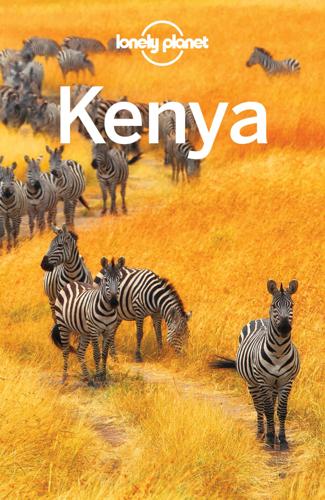
Lonely Planet Kenya
by
Lonely Planet
Exchange Rates Australia A$1 KSh84 Canada C$1 KSh86 Europe €1 KSh125 Japan ¥100 KSh94 New Zealand NZ$1 KSh76 UK UK£1 KSh142 US US$1 KSh105 For current exchange rates, see www.xe.com. Moneychangers The best places to change money are foreign exchange or ‘forex’ bureaus, which can be found everywhere and usually don’t charge commission. The rates for the main bureaus in Nairobi are published in the Daily Nation newspaper. International Transfers M-Pesa Kenyans swear by M-Pesa, a quick and easy way of transferring money via mobile networks. Western Union (%Australia 1800-173833, New Zealand 0800-005253, UK 0808-2349168, USA 1800-3256000; www.westernunion.com) Western Union Postbank, a branch of the Kenyan Post Office, is the regional agent for Western Union, the global money-transfer company.
…
Guides, Cooks & Porters The cost of guides varies depending on the qualifications of the guide, whatever the last party paid and your own negotiating skills. You should expect to pay a minimum of US$30/25/20 per day for a guide/cook/porter. Park Fees Park fees for non-residents are adult/child US$52/26 per day. There is no discount on fees for staying longer. Note that KWS parks no longer accept cash, so you will have to pay at the gate with M-Pesa or a credit card. If you only have cash, you can get a bank deposit slip from any Kenya Commercial Bank or Standard Chartered Bank. Tips In addition to the actual cost of hiring guides, cooks and porters, tips are expected but these should only be paid for good service. For a good guide who has completed the full trek with you, plan on a tip of about US$50 per group.
…
Marine Parks Kisite Marine National Park (Wasini Island) Kiunga Marine National Reserve (Kiwayu Island) Malindi Marine National Park (near Malindia) Mombasa Marine National Park & Reserve (Bamburi Beach) Watamu Marine National Park (Watamu) Park & Reserve Entry All KWS entry fees must now be paid by credit card or via the M-Pesa phone app. The rationale behind the move to prohibit the use of cash to pay park entry fees was to eliminate corruption by KWS staff. Entry Fees The KWS has a number of categories for parks and reserves. Rates for Kenyan citizens and residents are available from the KWS website. Further costs in the land-based parks and reserves include KSh300 for vehicles with fewer than six seats and KSh1030 for vehicles seating six to 12.
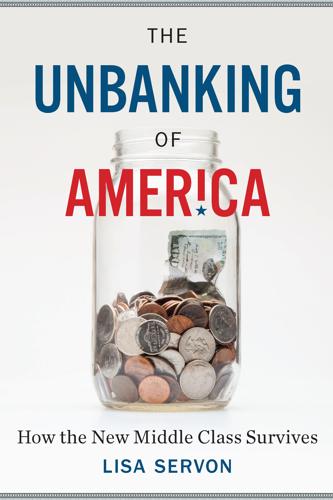
The Unbanking of America: How the New Middle Class Survives
by
Lisa Servon
Published 10 Jan 2017
Dave Birch, a director at Consult Hyperion, a firm that specializes in electronic transactions, predicts that “in fifty or one hundred years . . . people will see the mobile phone as the critical inflection point in the history of payments.” Mobile phones have already revolutionized financial services in Kenya, where nineteen million (90 percent of adults) of the country’s forty-four million inhabitants manage their money through a system called M-PESA (M for “mobile”; pesa means “money” in Swahili). Others are rethinking the “plumbing” of the financial-services system. There is no reason why it should take several days for the check you deposit to appear as cash in your bank account. It shouldn’t cost so much to send money to relatives overseas.
…
Creative destruction, a term: Joseph Alois Schumpeter, The Theory of Economic Development: An Inquiry into Profits, Capital, Credit, Interest, and the Business Cycle (London: Transaction Publishers, 1934). 144 Dave Birch, a director at: King, Breaking Banks, p. 42. Mobile phones have already: “The Future of Money,” 60 Minutes, CBS News, November 22, 2015. http://www.cbsnews.com/news/future-of-money-kenya-m-pesa-60-minutes/ 146 Smartphone use grew: Personal correspondence with Mike Mondelli, April 8, 2016. 163 interest rate of 36 percent: There’s a broader movement supporting the 36 percent rate. It references the 36 percent exception to the usury rate that Russell Sage advocated for in the 1920s and that led to the Uniform Small Loan Law.
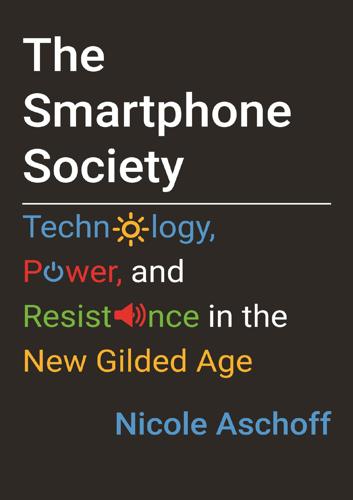
The Smartphone Society
by
Nicole Aschoff
Hardware, touch screens, radios, processors, antennas—much of the technology essential to our smartphones predates the advent of the actual smartphone. Steve Jobs’s team at Apple figured out how to refine and combine these technologies into one device, creating the iPhone.21 Many software concepts also predate the smartphone. For example, mobile payment systems spread widely in poor countries through cell phones. Kenyans developed the popular M-pesa mobile money transfer system, which lets users lacking bank accounts send cash to friends and family; in early versions senders deposited cash at an agent’s shop, then used a text message to send the funds. American adults may remember the buzz around former president Barack Obama and his Blackberry.
…
“Abrams, Jenna,” 109 ACLU (American Civil Liberties Union), 21, 22, 96, 148–49, 153, 176n28 Acxiom, 72, 77 addiction to social media, 65–69 Admiral, 78, 79 Adolfsson, Martin, 84 AdSense, 52 Advanced Research Projects Agency Network (ARPANET), 80 advertising: data collection and, 76–77, 83–84; on Facebook, 47–48; on Google, 52; political, 149 AdWords, 52 Afghanistan, politics in, 95–96 age discrimination, 149 AI Now, 129, 157 Airbnb, 42, 119, 120, 148 al-Abed, Bana, 90 al-Abed, Fatemah, 90 Aldridge, Rasheen, 91 algorithm(s): for consumer categories, 77; in dystopian future, 129–30, 131; in politics, 109–10; recommender, 67; search, 51–52, 53 algorithmic accountability, 151, 157–59 “algorithmic management,” 32–34 Alibaba, 4, 42 Allard, LaDonna Brave Bull, 104 aloneness, 7 Alphabet, 41, 55, 76, 122, 150 Alpha Go Zero program, 122 alter-globalization activists, 91 Amazon: acquisitions by, 41; and CIA, 81; in Europe, 150; marketplace model of, 150; as monopoly, 53–54; and new capitalism, 118–19; as new titan, 38–41, 44, 45; power of, 54–55; Rekognition software of, 149; tax evasion by, 49; warehouse workers at, 31–32, 33, 34; working conditions at, 46 Amazon Shopping, 30 Amazon Web Services (AWS), 41 American Academy of Pediatrics, 9 American Association of People with Disabilities, 55 American Civil Liberties Union (ACLU), 21, 22, 96, 148–49, 153, 176n28 American Dream, 120–21 American Library Association, 55 amplification, 91 analog networks, in cognitive mapping, 143 Android operating system, 39, 41, 53, 69, 70–71, 72 “angel investor,” 120 Ant Financial, 42 antidiscrimination laws, 149 antitrust laws and practices, 43–44, 52–53, 55, 150 AOL, data collection from, 81 app(s): top ten, 38 “app dashboard,” 69 app jobs, 30–34, 35, 137 Apple: data collection from, 81; in Europe, 150; low-paid workers at, 147; as new titan, 42; refusal of “right to repair” by, 155; supply chain of, 28–29; tax evasion by, 49–50; working conditions at, 46 appropriation, frontiers of, 73–76 appwashing, 34, 35, 146 “Arab Spring,” 97 Ardern, Jacinda, 93 ARPANET (Advanced Research Projects Agency Network), 80 artificial intelligence, 121–22, 123, 130 aspirational story, 120 assembly workers, 28–29 Athena, 42 AT&T, 29, 42, 43, 71 attention, 7 Audible, 41 Australia, justice in, 21 automation, 128, 131 automobiles, analogy between smartphones and, 2–3, 161, 162 autonomy, 117, 124 AWS (Amazon Web Services), 41 bad behavior, 138–39 Baidu, 42 Bannon, Steve, 105 Barlow, John Perry, 124 Bellini, Eevie, 24 Berners-Lee, Tim, 40 Beyoncé, 61, 107 Bezos, Jeff, 38, 44, 49, 54, 118–19 Bharatiya Janata Party (India), 93 big data, 76, 83–84, 145 Binh, Huang Duc, 95 black(s): police violence against, 17–23, 35, 169n6, 169n13 Blackberry, 6 “black-box algorithms,” 151 Black Lives Matter (BLM), 89–90, 100–102, 104, 107, 111 Blades, Joan, 91 blockchains, 124 body cameras worn by police, 22 book publishers, 172n40 boredom, 11 bots, 109 Boyd, Wes, 91 boyfriend, invisible, 24 Boyle, Susan, 63 Brazil, politics in, 97 Brin, Sergei, 38, 41, 54, 119, 148 Brown, Michael, Jr., 22, 89–90, 91, 101–2 Buffett, Warren, 41 Bumble, 23, 91 Bumblehive, 81 Burke, Tarana, 108 Bush, George W., 99 Calico, 41 California Consumer Privacy Act, 150 “CamperForce,” 31–32 Canales, Christian, 21 cancer, 7 candidates, social media use by, 103–5 Capital G, 41 capitalism: chameleonesque quality of, 116–17; crony, 105; and frontiers, 72–79; maps of, 143–44; neoliberal, 69, 102, 112–13, 117–18, 144–45; smartphones as embodiment of, 161–62; spirit of, 115–18; surveillance, 8 capitalist frontiers, government and, 80–81 carbon footprint, 82, 175n77 Carnegie, Andrew, 37, 54, 57 Castile, Philando, 20, 35 CatchLA, 62 caveats, 14–15 celebrities, in digital movements, 91 celebrity culture, 64–65 censorship, 95 Center for American Progress, 55 Center for Responsive Politics, 56 Central Intelligence Agency (CIA), 81, 95, 96, 138, 175n74 centrism, 112 Chadaga, Smitha, 89 change agent, 12 Chan, Priscilla, 56 Chan Zuckerberg Initiative (CZI), 56 Charles, Ashley “Dotty,” 109 Charlottesville, Virginia, 106–7, 111 Chesky, Brian, 120 children, 8, 9, 11–12, 84 China, 4, 42, 94–95 Chronicle, 41 CIA (Central Intelligence Agency), 81, 95, 96, 138, 175n74 Cienfuegos, Joaquin, 20–21 City of the Future, 124 Clinton, Bill, 43, 91, 99 Clinton, Hillary, 50, 107 Clooney, George, 91 “the cloud,” 82 cloud storage facility, 81 coercive relationships, 137–38, 152–54 cognitive maps and mapping, 143–59; algorithmic accountability in, 151; antidiscrimination laws in, 149; coercive and unjust relationships in, 152–54; defined, 143; digital and analog networks in, 143; digital commons in, 156–59; ecological externalities in, 145; economic implications in, 151–52; internet access for poor and rural communities in, 149–50; lacunae in, 145; low-paying jobs in, 146–49, 153–54; monopoly in, 150; political advertising in, 149; power in, 145; and principles of smartphone use, 152–59; privacy in, 150–51; selfish or immoral behavior in, 154–56; sociotechnical layers of, 145 collateral damage, 96 collective action, 155–56 Comcast, 29, 71 comic books, 11 commodification of private sphere, 144 Communications and Decency Act, 51 communities, on-line, 64 community broadband initiative, 149–50 Community Legal Services, 171–72n32 Compass Transportation, 147 Computer and Communications Industry Association, 55 “connected presence,” 6 connection, 44, 63–64, 143, 162 connectivity, 122 Connolly, Mike, 94 consumer(s): vs. producers, 28–29 consumer categories, 77 consumer scores, 77–78 consumption, 83, 138–39 content algorithms, 51–52 content creation, 74–79 contingent workers, 30 convenience, 29–30, 35 Cooperation Jackson, 155 cop-watch groups, 20–21 “The Counted,” 19, 169n6 “creative monopoly,” 44 creativity, 117 credit scores, 78–79 creepin”, 65 critiques, 7–8 crony capitalism, 105 CrushTime, 24 Cruz, Ted, 92 “Cuban Twitter,” 95 Cucalon, Celia, 48 Cullors, Patrisse, 100–102 cultural capital, 62 “custom breathers,” 69 “customer lifetime value score,” 78 “cyberspace,” 82 CZI (Chan Zuckerberg Initiative), 56 Dakota Access Pipeline Protests, 103–4, 110 dashboard apps, 132 data brokers, 72, 77 data centers, energy use by, 82 data collection, 70–72, 83–84, 137, 150–51, 156–59 data mining, 76–79 data ownership, 135–36 “data smog,” 72 Data & Society, 151, 179n20 data vendors, 76 datification, 156–57, 161 dating apps, 23–27, 35 decentralization, 101–2, 120 decommodification, 156–57 DeepMind, 41, 79, 122, 157 Deliveroo, 32–33, 153 Department of Homeland Security, 149 Desai, Bhairavi, 146 Descartes, René, 67 Diallo, Amadou, 19 Diapers.com, 41 dick pics, 25 Dick’s Sporting Goods, 91 digital-analog political model, 104, 110–12, 145, 162 digital commons, 139–41, 156–59 digital divide, 28–29, 35 “digital exclusion,” 29 digital frontier, limits of, 82 digital justice, 17–23, 152, 157, 169n6, 169n13 digital networks, 143 digital platforms, 44 “digital redlining,” 29 “digital well-being,” 69 disconnection, 132–33 discrimination in housing, 47–48 divides, 17–36; built-in, 28–34, 35; related to justice, 17–23, 169n6, 169n13; related to sexuality, 23–27, 35 division of labor, 74–75 Dobbs, Tammy, 129 documentation, 62 domestic violence, 25 DoorDash, 33–34, 146–47 dopamine driven feedback loops, 67 double standard, 25–27, 35 drone warfare, 95 “dual economy,” 12–13 dumbness, 7, 9 “dumb phone,” 1, 8, 132, 167n15 dystopian future, 125–26, 128–30, 131 eBay, 147, 148 Echo Look device, 84 ecological externalities, 145 ecological limit of digital frontier, 82–83, 175n77 economic crisis (2008), 98–100, 117–18 economic divide, 13–14 economic implications, in cognitive mapping, 151–52 economic nationalism, 105 “ecosystems,” 40 Eddystone, 78 education, 13 Edwards, Jordan, 18 Egypt, 92, 97 elderly Americans, 63–64, 84 Electronic Frontier Foundation, 55, 124 Elliot, Umaara, 90 Ellison, Keith, 45 emails: vs. phone calls, 6; scanning of, 70–71 Emerson, Ralph Waldo, 133 employment relationships, 137 encryption, 81, 175n74 energy consumption, 151–52, 154–55; by physical elements of digital life, 82, 175n77 entrepreneurship, 120–21 environmental justice, 154–55 Epsilon, 72 Equal Credit Opportunity Act, 78 Estrada, Joseph, 90–91 Europe, American tech titans in, 150 European Union (EU), 49, 52–53, 150–51 experience economy, 62, 83 exploitation of labor, 75 externalization of work and workers, 31 Facebook: acquisitions by, 41; addiction to, 66–67, 69; and antidiscrimination laws, 149; credit ratings by, 79; data collection by, 71–72, 76, 81, 84; demographics of, 84; discrimination in advertising by, 47–48; employees organizing at, 148; in Europe, 150; Free Basics by, 41–42, 50; low-paid workers at, 147; managing impressions on, 63; as monopoly, 53–54, 172n46; and new capitalism, 124, 136; as news source, 50–51; as new titan, 38–39, 40, 41–42, 44–45; power and influence of, 56; tax evasion by, 49; time spent on, 60 Facebook Live, 84 Facebook Pixel, 72 “Facebook Revolution,” 97 facial recognition software, 129, 149 Fair Housing Act, 48 fake news, 50–51, 56 Federal Bureau of Investigation (FBI), 149 feedback loop, 66–67 “Feminist Five,” 108 feminist movement, 107–8 Ferguson, Missouri, 89–90, 101–2 Fields, James Alex, Jr., 106 filter bubbles, 53, 109–10 financial crisis (2008), 98–100, 117–18 fintech companies, 78–79 flexibility, 117 FlexiSpy, 25 FOIA (Freedom of Information Act) requests, 149 food delivery apps, 32–33 food pictures, 62 forced arbitration, 148 Ford, Henry, 37, 124 Fordlandia, 124 Ford Motor Company, 37, 38, 44 Fowler, Susan, 126–27 FoxConn, 28 framing of analysis of cell phones, 12–14 Free Basics, 41–42, 50 Freedom of Information Act (FOIA) requests, 149 “free market” competition, 98 free speech, 138 Friedman, Patri, 124 frontier of social media, 59–86; addiction to, and fears about, 65–69; and big data, 82–86; characteristics of, 59–65; and government, 80–81; and privacy, 69–72; and profit, 72–79 Fuller, Margaret, 133 Galston, Bill, 45 gamification, 23–24, 146 Garza, Alicia, 100–102 Gassama, Mamoudou, 115 Gates, Bill, 56, 130 General Data Protection Regulation (GDPR), 150–51, 156 Geofeedia, 96 geopolitics, 95–96, 144 Germany, 3 Ghostbot, 24 gig economy, 137 Gilded Age, 1–2, 11, 54 global divides, 28–29 globalization, 98 Global Positioning System (GPS), 5 Gmail, 38, 71 Goodman, Amy, 104 Google: addiction to, 69; advertising on, 76; companies owned by, 41; data collection by, 70–71, 76, 81, 150; employees organizing at, 147–48; in Europe, 150; immoral projects at, 154; and intelligence agencies, 81; lobbying by, 55; low-paid workers at, 147; molding of public opinion by, 55; as monopoly, 52–54; and new capitalism, 119–20, 123, 136; as new titan, 38, 39, 40, 41, 43–45, 56; for online search, 52; power and influence of, 55–56; research funding by, 55; “summer camp” of, 55; tax evasion by, 49, 50; use by children, 84; working conditions at, 47 Google Calendar, 71 Google Chrome browser, 53 Google Drive, 71 Google Earth, 123 Google Fiber, 41 Google Images, 131 Google News, 50 Google Play, 72 Google Search, 38, 41, 53 Google Shopping Case, 52–53 Google Translate, 10 government: and capitalist frontiers, 80–81; and Silicon Valley, 124; surveillance by, 137–38, 144, 148–49 government tracking, 94–95 GPS (Global Positioning System), 5 Grant, Oscar, III, 18 Gray, Freddie, 22, 96 Great Pessimism, 118, 119 Great Recession, 118 Greece, 97 greenhouse emissions, 82 Green New Deal, 103, 151–52, 154, 179n22 Greenpeace, 157 Grindr, 23 gun violence, 90, 91, 110, 111 GV, 41 habitus, 62 Happn, 23, 24 Harari, Yuval Noah, 129–30, 132 Hearst, William Randolph, 50 Herndon, Chris, 56 Heyer, Heather, 106 Hirschman, Albert, 133 household expenses, 13 housing, discrimination in, 47–48 human, fear of becoming less, 67–68 iBeacon, 78 IBM, 149 ICE (Immigration and Customs Enforcement), 21, 148 ICT (information and communication technologies) sector, energy used by, 82 ideals, 120 “identity resolution services,” 77 ILSR (Institute for Local Self-Reliance), 149–50, 153 Immigration and Customs Enforcement (ICE), 21, 148 immoral behavior, 138–39, 154–56 impressions, management of, 62–63 income discrepancy, 12–13 independent contractors, 33–34, 137, 153 India, 4, 42, 60, 93 individualism, 117, 118 information and communication technologies (ICT) sector, energy used by, 82 injustice, 17–23, 169n6, 169n13 In-Q-Tel, 96 insta-bae principles, 61–62 Instacart, 30, 146 Instagram: addiction to, 69; content on, 60, 61, 62; creepin’ on, 65; data collection from, 72; demographics of, 61; microcelebrities on, 60; as new titan, 38, 41; time spent on, 60; value of, 74 Institute for Local Self-Reliance (ILSR), 149–50, 153 insurance companies, data mining by, 79 intelligence agencies, and capitalist frontiers, 81 internet: access for poor and rural communities to, 149–50; access to high-speed, 5, 29; creation of, 80; early days of, 40; government shutdown of, 94; smartphone connection to, 10 Internet Association, 45 Internet Broken Brain, 66 Internet.org, 41 Internet Research Agency, 109 internet service providers, and privacy, 71–72 inventions, new, 11 investors, 120–21 invisible boyfriend, 24 iPhone, 6, 42 Iron Eyes, Tokata, 104 Jacob’s letter, 127 Jacobs, Ric, 127 Jaffe, Sarah, 91 James, LeBron, 92 Jenner, Kris, 59 Jigsaw, 41 Jobs, Steve, 2, 6, 42 Joint Special Operations Command, 95 Jones, Alex, 111 Jones, Keaton, 109 justice, 17–23, 152, 157, 169n6, 169n13 Kalanick, Travis, 126, 127 Kardashian, Kim, 59 Kardashian, Kylie, 59 Kasky, Cameron, 90 Kattan, Huda, 60 Kellaway, Lucy, 1 Kennedy, John F., 88 Kerry, John, 56 Keynes, John Maynard, 117 Khosla, Sadhavi, 93 King, Martin Luther, Jr., 97 King, Rodney, 19 Klein, Naomi, 104 Knight First Amendment Institute, 93, 175n14 Knoll, Jessica, 108 Kreditech, 78–79 Kristol, Bill, 45 Kurzweil, Ray, 123 Lanier, Jaron, 67, 70, 135 Lantern, 95 law enforcement, surveillance by, 96–97, 137–38, 176n28 “leaners,” 29 Lean In (Sandberg), 107 Lehman Brothers, 98 Levandowski, Anthony, 123 LGBTQ community, 10, 64 “lifestyle politics,” 133 “like” button, 66 Lind, William, 105 “listening tour,” 56 Liu Hu, 94 live chats, 5 livestreaming of police violence, 20–21 lobbying, 55, 56 location data, 71 logistics workers, 31 Loon, 41 Loop Transportation, 147 Losse, Katherine, 124 love, 23–27, 35 low-income households, access to high-speed internet by, 29 low-paying jobs, 146–49, 153–54 Luxy, 23 Lyft 30, 31, 33, 146, 153 Lynd, Helen, 2, 3 Lynd, Robert, 2, 3 Lynn, Barry, 56 machine learning, 76, 121–22, 174n52 “machine zone,” 8 Macron, Emmanuel, 93 mainstream media, bypassing of, 91 Ma, Jack, 42 Makani, 41 mamasphere, 64 March for Our Lives, 104 March of the Margaridas, 108 Marjorie Stoneman Douglas (MSD) High School, 90 marketification, 161 Markey, Ed, 152, 179n22 marriage, expectations and norms about, 24–25 Marshall, James, 17–19 Marshall, Tanya, 17–19 Martin, Trayvon, 22, 100 Marx, Karl, 67 mass shootings, 90, 91, 110, 111 Match.com, 23, 24 Match Group, 24 Matsuhisa, Nobu, 62 Maven, 147–48 McDonald, Laquan, 18 McInnes, Gavin, 106, 107, 111 McSpadden, Lezley, 101 meaning, sense of, 64–65, 162 Medbase200, 77 men’s work, 75 mental health of children, 8 meritocracy, 121 Messenger: data collection from, 72 Messenger Kids, 84 metadata, 72 #MeToo movement, 108 microcelebrities, 60 microchoices, 69 Microsoft: and City of the Future, 124; data collection from, 81; employees organizing at, 148; in Europe, 150; immoral projects at, 154; as new titan, 42, 43, 55, 56 Middleton, Daniel, 60 “Middletown,” 2–3 Middletown: A Study in Contemporary American Culture (Lynd and Lynd), 2–3 military, 80–81, 95 mind-body divide, 67–68 miners, 28 Minutiae, 84 misogyny, 25 Mobile Devices Branch of CIA, 81, 95 Mobile Justice MI app, 21, 169n13 Modi, Narendra, 93 Mondragon, Elena, 22–23 monetization, 59, 79 money accounts, mobile, 10 monopolies, 43–46, 52–53, 150 Morgan, J. P., 37, 39, 41, 44, 54 Mori, 61–62 MoveOn.org, 91 M-pesa mobile money transfer system, 6 MSD (Marjorie Stoneman Douglas) High School, 90 mSpy, 25 Mubarak, Hosni, 92, 94, 97 Muflahi, Abdullah, 20 multitier subcontracting, 31 Munro, Alice, 62–63 Musk, Elon, 126 Myanmar, 42, 50, 94 National Highway Traffic Safety Administration, 157 National Hispanic Media Coalition, 55 National Justice Project (Australia), 21 National Labor Relations Board, 153 National Policy Institute, 105–6 National Security Agency (NSA), 80, 81, 95 NationBuilder, 93–94 neoliberalism: and capitalism, 69, 102, 112–13, 117–18, 144–45; and economic crisis, 99–100, 176n30; and feminism, 107; and new titans, 54 Nepal, 94 network(s), 61, 143 “network effects,” 44 “network society,” 121 #NeverAgain movement, 90, 110 New America, 56 New Center, 45–46 “New Economy,” 121 news: fake, 50–51, 56 news cycle, 89 newspapers, 50–52 news sources, 50–52 New York Taxi Workers Alliance, 146, 153, 178–79n5 Nichols, Synead, 89–90 Nigeria, politics in, 97 Nixon, Richard, 88 Noah, Trevor, 110 Noble, Dylan, 19–20 Nobu Malibu, 62 #NotOkay, 108 NSA (National Security Agency), 80, 81, 95 Obama, Barack, 6, 44, 55, 92, 106 obsolescence, built-in, 82 Ocasio-Cortez, Alexandria, 104, 112, 152, 179n22 Occupy movement, 102–3, 104 Oculus, 41 OKCupid, 23, 24 O’Neill, Caitlin, 56 online dating, 23–27, 35 online search, 52 Open Markets Institute, 150 Open Sesame, 10 Operation Haymaker, 95–96 O’Reilly, Holly Figueroa, 93 O’Rourke, Beto, 92 outrage politics, 109 outsourcing, 146 ownership of our own data, 135–36, 156 Oxford, Kelly, 60, 108 Pacific Railroad Act (1862), 80 Page, Larry, 38, 39, 41, 54, 119–20, 124 PageRank, 52 Palantir, 81 para-social interactions with celebrities, 65 parental limitation, 8 Parkland, Florida, 90 Patriot Act, 81 payment systems, mobile, 4, 5, 6, 10 PayPal, 44 peer-to-peer networks, 120 Pelosi, Nancy, 56 performance: politics as, 109, 111; social media as, 63, 64, 68 permatemps, 46, 47 personal information: ownership of, 135–36, 156; sharing on social media of, 60–61 personalization, 53 personal narratives, 115–16 philanthropy, 56–57 Philippines, 90–91 “phone boss,” 69 Physician Women for Democratic Principles, 89 “pickers,” 33, 46 Pickersgill, Eric, 7 Pinterest, 60, 64, 69 PlentyOfFish, 24 polarization, in politics, 111 police: surveillance by, 96–97, 137–38, 176n28; violence against blacks by, 17–23, 35, 89–90, 100–102, 111, 169n6, 169n13 political advertising, 149 political movements, 97, 102, 111–12 political organizing, 91 political parties, 93–94 politics, 87–113; algorithms and filter bubbles in, 109–10; Black Lives Matter in, 89–90, 100–102, 111; bots in, 109; censorship in, 95; Dakota Access Pipeline Protests in, 103–4, 110; decentralization in, 101–2; digital-analog model in, 104, 110–12, 162; economic crisis in, 98–100; feminist movement in, 107–8; finding our voice in, 108–13; geo-, 95–96, 144; government tracking in, 94–95; gun violence in, 90, 91, 110, 111; modern-day revolt in, 100–108; neoliberal, 99–100, 112–13; Occupy movement in, 102–3; outrage, 109; outside of US, 93–94; as performance, 109, 111; as personal, 88–100; polarization in, 111; political movements in, 97, 102; political parties in, 93–94; protests in, 89–90, 92, 95, 100–104; slacktivism in, 111; social media use by candidates in, 103–5; social media use by people in power in, 87–88, 92–93; Sunrise Movement in, 103–4; surveillance by law enforcement in, 96–97, 176n28; Syrian War in, 90; virality in, 81; voter outreach in, 89; white supremacy in, 35, 105–7 poor communities, internet access for, 149–50 Posner, Eric A., 135 poverty, 12–13 power, in cognitive mapping, 145 power inequalities, 137–38 predictive modeling, 77 print magazines, 172n40 PRISM program, 81 privacy, 69–72, 137–38, 150–51, 156 “privacy tools,” 71 private sphere, commodification of, 144 producers vs. consumers, 28–29 profit, frontiers of, 72–79, 85–86 proponents, 9–12 ProPublica, 48, 106, 149, 153 protests, 89–90, 92, 95, 100–104 Proud Boys movement, 106 public opinion, molding of, 55 Pulitzer, Joseph, 50 “push” notifications, 84 racism, 17–23, 35, 169n6, 169n13 RAM (Rise Above Movement), 106–7 rare metals, 82, 83 Reagan, Ronald, 43 real estate market, effect of high-tech company location in, 48–49 “real life,” digital life vs., 68 recommender algorithm, 67 Reddit, 24 redlining, digital, 29 regulation of monopolies, 43–46 reinforcement learning, 157 Rekognition software, 149 relationships, expectations and norms about, 24–25 religious beliefs, tech-based, 123 remote medicine, 10 rents, 48 research funding, 55 retreat from technology, 132–35 Reynolds, Diamond “Lavish,” 20, 35 Rice, Tamir, 18 “right to repair,” 155 right-wing movements, 105–7 Rise Above Movement (RAM), 106–7 rituals, on social media, 61 Robbin, Jonathan, 77 robots, 128, 131 Rockefeller, Jay, 77 Rockefeller, John D., 37, 54, 57 Rongwen, Zhuang, 94 Roosevelt, Franklin Delano, 88 Rousseff, Dilma, 97 Rudder, Christian, 23 rural areas: internet access for, 29, 149–50 Salesforce: employees organizing at, 148; immoral projects at, 154 Sandberg, Sheryl, 107 Sanders, Bernie, 103–5, 110 Santana, Feidin, 19, 20 Santelli, Rick, 105 Saudi Arabia, censorship in, 95 Scavino, Dan, 88 Schifter, Doug, 127 Schillinger, Klemens, 8 Schneier, Bruce, 135 Schrems, Max, 151 science fiction, 126 Scott, Walter, 19, 20 scraping, 71 Seamless, 30 search algorithms, 51–52, 53 Seasteading Institute, 124 Seinfeld, Jerry, 110 self-esteem, 65 selfies, 59–60 selfish behavior, 138–39, 154–56 self-monitoring tools, 69 service jobs, 33–34 Seth, Jodi, 56 sexism, 23–27, 35 sexting, 25–27, 35 sexual division of labor, 74–75 sexual harassment, 25, 27, 126–27 sexuality, 23–27, 35 sexual violence, 25 shareholder value society, 98 sharing on social media, 60–61, 84 Sharpton, Al, 102 shopping, mobile, 31–32 short message service (SMS), 6 Sidewalk Labs, 41 Sierra Club, 157 signals intelligence, 95–96 “silent spring,” 7 Silicon Valley, 115–41; distrust of, 125–31; and government control, 124; and spirit of capitalism, 115–25; taking back control from, 131–41 Silicon Valley Rising (SVR), 147 Sina Weibo (China), 94 Singh, Jagmeet, 93–94 the Singularity, 123 skeptics, 7–8 Skype, 81 slacktivism, 111 Slager, Michael, 19 Slutwalks, 108 smartness, 9 smartphone(s): demographics of, 3, 4; vs.
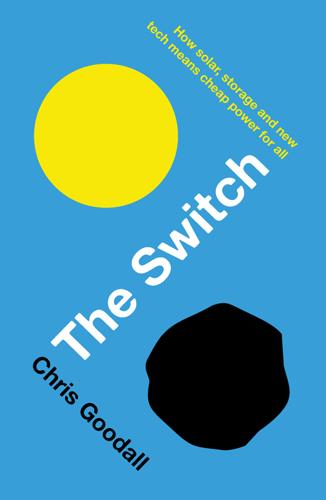
The Switch: How Solar, Storage and New Tech Means Cheap Power for All
by
Chris Goodall
Published 6 Jul 2016
But it might be if it uses hundreds of entrepreneurs to build local networks serving a few tens or hundreds of houses and businesses. Critically, those entrepreneurs will rely on using a mobile phone payment system, bypassing the need for billing and cash collection. Kenya was, after all, the first country in the world to bring a mobile payments system into large scale use via the hugely successful M-Pesa technology and users will be able to ‘top up’ their electricity credit in the same way that they buy data for their phones. As with mobile, the country leapfrogged Western payment systems, such as credit cards, with a next generation alternative much more suited to its own needs. It will probably do so with microgrids as well.
…
Index A Abramovitz, Yosef 64 absorption chilling 146 acetogens 242–3 Actinomyces 215 Africa food production 134 solar power 60–4 see also individual countries AGL 7 agriculture pumping operations 56–7 UK 226–7 Ainsworth, David 197–8, 199 air, carbon capture 249–54 air travel 224–5 algae 244–5 Algenol 245–6 alkanes 223 aluminium 108 American Physical Society 252 amine absorption 250 ammonia 229–30 anaerobic digestion (AD) 5, 131, 132, 135–41 Andasol 117 Andhra Pradesh 54 Apple 66, 67, 108 Arcelor Mittal 155, 243 archaea 234–5 Argonne National Laboratory 194 Arriba 154 artificial photosynthesis 246–9 asphalt 153 Atacama desert 59 Audi 232 Austin, Texas 53 Australia domestic electricity consumption 260 tracking 96 B bacteria 247–9 Bangladesh 16–17 banks funding solar 105, 106–7 interest rates 98–100 solar power predictions 50–1 batteries 5–6, 173, 240 car batteries 190–2 cost declines 44, 173, 176–9, 256 and demand charges 192–3 domestic 57, 171, 181–5 drones 185–7 flow batteries 174, 201–3, 206 grid storage 44, 187–90, 206–7, 219–20 lithium air 198–9 lithium ion 173–96, 199–201, 210 lithium sulphur 197–8 long term targets 194–5 PV plus battery 199–201 and time-of-use-pricing 162 24M 179–80 zinc-air batteries 201, 203–4 Becquerel, Edmond 74 behind the meter schemes 107, 108 Belgium demand response 152 liquid hydrocarbons 243 Bickl, Thomas 85, 86–90 biochar 225 biofuels see liquid fuels biogas Electrochaea 233–6 Tropical Power 134–41 see also carbon dioxide; methane biological methanation 233–8 biomass 13, 14, 15, 131–4, 142–6, 256 power to gas 233–8, 240 storing liquid hydrocarbons 220, 221–7 Tropical Power 135–42 Bishop, Pete 185–9 Bissell, David 200 Bloch, Mathias 181–2 Bloomberg 35, 42, 53, 60, 178 blue-green algae 244–5 Boardman, Brenda 164–5 Boston Consulting Group (BCG) 18, 19, 20, 176, 177, 178–9 BP 12–13 Bradford, Travis 22, 48–50 Brandao, Rafael 60 Brazil biofuels 223 pylon lines 120 solar electricity prices 3, 60 Breakthrough Energy Coalition 214, 244 Britwind 130–1 Bruce, Peter 198–9 Buffett, Warren 177 Burundi 64 Butler, Nick 41–2, 44 BYD 176–7 C Calgary 253 California demand response 156–8 domestic electricity storage 184 grid storage 201 power to gas 233 renewable energy 35 solar power cost 3 time-of-use-pricing 162, 163 CAM (Crassulacean Acid Metabolism) plants 135–41, 142–5 Cambridge Architectural Research 166 Canada air capture of CO2 253 demand response 154 grid batteries 202 time-of-use-pricing 159 carbon dioxide (CO2) air capture 213, 249–54 artificial photosynthesis 248 cement plants 238–40 diesel generators 149 and microbes 213, 215 plants 133, 135, 137 power to gas 232, 233 using to make liquid hydrocarbons 241, 243, 244–5, 246, 256 Carbon Engineering 253 carbon monoxide 241–2, 243 carbon tax 239, 253 cars component manufacturers 127–8 energy usage 11 hydrogen 228 PV film 89–90 see also electric cars Case, Chris 68–71, 73–4, 79–83 cement factories 238–40, 245 Chiang, Yet-Ming 179–80 Chile concentrating solar power 119 pylon lines 120 solar electricity prices 3 solar power 59–60 China coal-fired power stations 35 energy demand 11, 12 liquid hydrocarbons 243 solar power 24, 53–4, 66 and Zimbabwe 64 Chu, Steven 230 CIGS (copper indium gallium selenide) 90 Citibank 51 Climeworks 250–3 Clinton, Hillary 54 Clostridium Autoethanogenum 242–3 coal 40 Germany 46 Nigeria 60–1 coal-fired power stations Chile 59 China 11, 35 cost 122 demand 36–7 in developing world 58 India 55, 56, 58 move away from 7 Coal India Limited 58 Combined Cycle Gas Turbine (CCGT) plants 34–5, 37, 39, 40, 236 Committee on Climate Change (CCC) 47–8 compound growth 30–1 compressed air storage 207–8 concentrating solar power (CSP) 116, 117–21, 256 Connolly, Steve 154 conversion efficiency 73, 76–7, 78–9, 80 Cook, Tim 67 Cool Planet 225–6, 241 Cornwall 104–5, 206 cows 139–40 Crabtree, George 194, 195 Crescent Dunes 118 cyanobacteria 244–5 D demand charges 192–3 demand response 149–55, 166, 232, 237–8 and energy efficiency 163 in the home 156–8 what happens next 158–63 Denmark power to gas 233–4, 235 solar electricity costs 45 wind power 116, 124, 234 Deutsche Bank 51, 59, 176 diesel generators 57, 60, 121, 185, 199 demand response 148–9, 151 Hawaii 161, 199 Dinorwig 205 dispatchable power 199–200 Drax power station 131, 132 drones 185–7 Dubai 52 E Easter Island 133 Easton, Roger L 2 Einstein, Albert 75 Eisenberger, Peter 3, 19–20 electric cars 12, 156, 158, 224–5 batteries 173–8, 195 as grid backup 190–2 electricity 255 cutting power demand in the home 156–8 demand and supply 4, 5, 37–9, 147, 150–1, 215, 216–20 demand charges 192–3 demand response 149–55, 158–63, 166, 232, 237–8 distribution costs 55 domestic consumption 259–60 lighting 164–6 microgrids 62–3 power to gas 231–40 prices 37–8, 107, 257 storage 4–6, 43, 44, 173–254 time-of-use-pricing 158–63 transmission networks 58, 59, 61 see also solar power Electrochaea 233–40 electrolysis 220, 227–30, 231–40, 252–3 electrons 74–6, 78–9, 201 Enbala 154 Energiesprong 167–71 energy demand for 9–13, 144 and power 259–60 energy efficiency and demand response 163 insulation 167–72 lighting 165–6 Engie 7 Enterococcus 215 Entrade 145–6 Eos 203–4 EPR 15 ethanol 223, 243–5 Euphorbia Tirucalli 135, 137 experience curve 18–19, 33 batteries 175, 176–9, 187, 210 inverters 97 photovoltaics 22, 26, 30–1, 33 transistors 31–2 wind power 123 Exxon 3, 19–20 F Facebook 185–7 Farmer, Doyne 33 Fischer-Tropsch process 223, 252 Florida 245–6 flow batteries 174, 201–3, 206 food 132–4 Food and Agricultural Organisation (FAO) 142–3 fossil fuels 27–9, 33–40 see also coal; gas; oil France demand response 152, 155 gas grid 231–2 nuclear power 23 Fraunhofer Institute 3–4, 46–7, 104 Fritts, Charles 74 fullerene 72 G gas 7, 40 grid 231–2 power to gas 6, 213–15, 231–40 see also biogas; methane; syngas gas-fired power stations 150–1 ammonia 229 cost 4, 122 financing 34–5, 36–7, 39, 40, 99 power to gas 236, 238 US 35 gasification 132, 145–6 Gates, Bill 1, 6, 208, 214–15, 244, 255 Gebald, Christoph 252, 253 gene sequencing 18–19 geothermal 59, 108 Germany domestic electricity storage 181–5 electricity demand and supply 215, 217, 218–20, 229–30, 237 electricity price 101, 260 electricity production 260 gas grid 228–9, 231–2 hydrogen 228–9 oil storage 230 power to gas 232 solar power cost 3–4, 46–7 solar power funding 104, 106, 107 wind power 124 Ghent 243 gigawatt hours 260 gigawatts 259, 260 GM 176–7, 198 Google 66, 225 governments 6, 189 solar power tenders 51–3, 54–5, 59, 60 subsidies 50, 107–8, 126 GranBio 223 graphene 187 Greencoat Capital 109 grid integration costs 55–6 grid storage flow and zinc-air batteries 201–4 pumped hydro 205–7 PV plus battery 199–201 South Korea 204 GTM Research 96–7, 193, 201 H Haber Bosch process 229 Hafenbradl, Doris 238–9 Handelsbanken 105 Hawaii 161–2, 184, 199–201 heat pumps 12, 167 heating 12, 167 Heliatek 84–90 Helio100 120–1 heliostats 117–18 Henderson, Bruce 18, 20 Highview Power 208–10 Hinwil 250–1 Hinkley Point 15 Hofstetter, Dominic 233–6 hospitals 148, 149 houses batteries 57, 181–5 heating 12, 167 insulation 167–72 lighting 12, 164–6, 169 Solar House 57–8 see also residential PV installations Hutcheson, Dan 32 hydro-electric power 14, 15, 141–2, 159 pumped hydro 204–7 hydrogen 5, 213–15 conversion to methane 221, 231–40, 256 using electrolysis to generate 212, 220, 227–31, 252–3, 256 Hydrogenics 235 Hymind floating turbines 125–6 I Ibbenbeuren 229 Iceland 108 IKEA 19, 66, 166 Imergy 202 India coal-fired power stations 55–6, 58 solar electricity prices 3 Solar Houses 57–8 solar power 24, 53–8 insulation 167–72 Intel 20 interest rates 98–100, 101–2 International Energy Agency (IEA) 42–3, 45–6 inverters 91–5, 96, 97 investment 4, 100–14, 115, 214 corporate 66–7, 108 Investment and Pensions Europe 102 ITM Power 228–9 J Jelley, Nick 25 Joule Unlimited 244–5 K Kaua’i 199–200 Keith, David 253 Kennedy, Danny 42 Kenya 62–4, 145 Tropical Power 134–42 kilowatt hours 259 kilowatts 259–60 Kisii 62–3 Kiwi Power 149 Klein, Nina 71–3, 74, 85–6 Kohn, Rick 213, 215, 246 KPMG 54–7 L Lafond, Francois 33 Laikipia 135–41 Lancashire County Council 102, 103 Lanzatech 241–4 Lawrence Berkeley Laboratory (LBL) 46, 65 lead 83 learning curve 19, 23 LEDs 165–6, 169 Leggett, Jeremy 50 Lemnacae 139 levelised cost 98–101 LeVine, Steve 180 Liebreich, Michael 178 lighting 12, 164–6, 169 Lightsail 207–8 lignite 46 liquid air storage 208–10 liquid fuels 5, 6, 213–15 from biomass 220, 221–7 using microbes 221, 240–6, 256–7 lithium air batteries 198–9 lithium ion batteries 173–6, 192–5, 210 car batteries 190–2 cost declines 176–9 domestic 181–5 energy density 195 large-scale 185–90, 199–201 lithium supply 195–6 recycling 195, 196 24M 179–80 lithium sulphur batteries 197–8 Louisiana 226 M M-Pesa 63 MacKay, David 259 Madhya Pradesh 54 Manchester 39, 209 Mason, Mike 137–42, 143, 144 megawatts 259 Mermans, Pieter-Jan 38, 149–53, 155 Meteo 91 methane 131, 135, 137, 213–16 power to gas 221, 231–40, 256 methyl ammonium lead halides 80 microbes 212–15 artificial photosynthesis 247–9 making liquid hydrocarbons 221, 240–6, 256 power to gas 233–40 microgrids 62–3 mobile phones 61–2, 63–4, 185 Modi, Narendra 53 Monbiot, George 226 Moody’s 173, 193 Moore, Gordon 20 Moore’s Law 20–1, 32 Morocco 116, 119–20 Moylan, Andy 111–13 multi-junction cells 76–7 Musk, Elon 175 N Naam, Ramez 49–50 Nelson, Jenny 75 Netherlands home improvements 169, 170–1 storage in car batteries 191 Nevada 53, 118 New Mexico 244–5 NexWafe 78, 79 Nigeria 60–2 Nissan 176 Nissan LEAF 156 Nourse, Richard 109, 122 nuclear power stations 6, 15 costs 22–3, 48, 122 O Oahu 161–2 O’Dea, Christopher 103 offshore wind turbines 15, 124–6 Ohl, Russell 75 OhmConnect 156–8 oil, storage 230, 240–1 oil companies 6, 7–8 oligomer cells 84–90 onshore wind turbines 22, 122–5 Ontario 159, 202 Open Energi 153 Opuntia ficus-indica 135, 136, 138 Oregon 7, 223–4, 225 organic molecules 71–3, 74 organic photovoltaics 84–90 Osinbajo, Yemi 60–1 Ouarzazate 119 oversizing 91–5 Oxford Photovoltaics 68, 79–84 Oxis 197–8, 240 oxygen 234 P Palmer, Jason 166 Panasonic 175, 187–9 paper mills 152 passivation 78–9 Peabody Energy 40 peak shaving 193 see also time-of-use-pricing Pencil Cactus 135, 137 pension funds 4, 101–4, 106–7, 109–11, 112 pentacene 71 perovskites 68, 79–84 Peterhead 125–6 petrol 240 photons 74–5 photosynthesis artificial 246–9 CAM plants 135–7 photovoltaics, electricity prices 3, 45, 46, 51–3, 59, 60 photovoltaics (PV) 5–6, 8, 42–3, 74–6, 116, 255–8 and alternative sources of energy 33–40 availability 34, 55–6, 94–5, 211–12 Brazil 60 Burundi 64 capital and levelised costs 98–101 Chile 59–60 corporate investment 65–7 cost declines 1, 2–4, 21–33, 42, 45, 46–51, 123–4, 254 daily curve 90–6, 147, 260–1 experience curve 22, 26, 30–33 films 84–90 financing 4, 98–114 Germany 217, 218–20 grid integration costs 56 India 53–8 Kenya 62–4 Nigeria 60–2 oversizing 91–5 and pension funds 101–4 predictions 41–51 PV plus battery 199–201 S curve 25–6 system costs 96–7 and time-of-use-pricing 160–3 UK 215, 216–17 USA 65 Vanguard 1 2 Zimbabwe 64 see also solar cells; solar farms; solar panels PJM 155, 200–1 plants see biomass potassium hydroxide 253 power 259–60 power purchase agreements (PPAs) 51–3, 65, 101 power to gas (P2G) 231–40, 256 Powerhive East Africa Ltd 62–3 PowerOasis 185–90 Preqin 111–13 Prickly Pear 135, 136, 138 Primus Power 199 private electricity generators 148–9 pumped hydro 204–7 Punjab 54 pyrolysis 225–6 Q quantum dots 73 Quarry Battery 205–7 R Raizen 223 Red Rock Biofuels 223–4, 225, 241 renewable energy 13–15 see also geothermal; hydro-electric power; solar power; wind power residential PV installations investment 66, 100–1, 107, 110–11 PV film 89 storage 181–5 system costs 96–7 REstore 38–9, 149–55, 158 Robertson, Andrew 103, 112 Rombouts, Jan-Willem 151, 152 Roulstone, Tony 23 Rudd, Amber 40 Russia 226 S S curve 25–6 Sabatier reaction 231 Sainsbury’s 66 Schellnhuber, John 41 Schmickler, Arno 168, 170, 171 Schneider Electric 157–8 Scotland carbon-neutral housing 171 drones 186–7 wind power 122 seawater 245–6 second glass problem 43 second half of the chessboard problem 30–1 semiconductors 18 Sermol, Peter 110–11 sewage farms 154 Shao, Vic 193 Shell 7–8, 41, 43, 223 Siemens 235, 243 silicon 68, 73, 75, 76, 84, 87–8, 195 efficiency 78–9 manufacturing techniques 77–9 tandem cells 81–4 Silicor 108 smart meters 157, 159 Smil, Vaclav 255, 257 Snaith, Henry 80, 81 SoCalGas 233 solar cells 69–70 efficiency 74–7, 78–9 from organic molecules 71–3 history 74–6 multi-junction 76–7 oligomers 84–90 passivation 78–9 perovskite 79–84 silicon 76 solar energy 9–10 solar farms Brazil 60 China 66 costs 48–51, 97 electricity prices 3, 45, 46, 51–3, 54, 55, 59, 60 financing 4, 66, 98–114 and hydro-electric dams 141–2 India 54, 55, 57 land needed for 15–18 oversizing 91–5 shading 141 tracking 95–6 US 3 Zimbabwe 64 solar fuels 213–15 Solar Houses 57–8 solar panels Chris Case 68–71, 73–4 cost declines 4, 21–2, 23–4, 49, 73–4, 77–9 daily curve 260–1 efficiency 76–7 history 74–6 lifetime of 114–15 manufacturing volumes 24 organic molecules 71–3 oversizing 91–5 perovskites 68, 79–84 technology improvements 68–97 tracking 91, 95–6 see also solar cells solar power 1–8, 13–14 concentrating solar power 117–21 see also photovoltaics SolarCity 66, 199 SolarReserve 119 Solexel 78, 79 Sonnen 181–5 Sony 179 South Africa blackouts 183 concentrating solar power 119–21 Fischer-Tropsch refineries 223 tracking 96 South Korea 204 Spain 117, 120 Spinetic 127–30 Sporomusa Ovata 247–8 Statoil 125–6 steelworks 242, 243–4, 245 Stellenbosch University 120 storage 4–6, 13, 43, 44, 94, 104, 116, 173, 210 air capture of CO2 249–54 artificial photosynthesis 246–9 compressed and liquid air storage 207–10 concentrating solar power 117–19, 121 as gas or liquids 220–54, 256–7 methane 135 need for long-term storage 216–20 pumped hydro 204–7 and time-of-use-pricing 162 see also batteries subsidies 50, 107–8, 126 SunEdison 54 SunShot 65 Swanson’s Law 21–2, 23–4 Switzerland 250–1 syngas 145, 223–4, 225, 252 system costs 96–7 T Taiwan 243 tandem cells 81–4 Tarmac 153 Telangana 54 terawatt hours 259, 260 terawatts 259 Tesla 127, 175 batteries 5, 176, 177, 178 Gigafactory 175–6, 177, 180 Powerall 162, 175, 181 Texas 123 Thiel, Peter 8, 208 time-of-use-pricing 158–63 tracking 91, 95–6 transistors 20–1, 31–2 trees see biomass Trina Solar 79, 115 Tropical Power 134–42, 145 24M 179–80 U UK biogas 236 biomass 145–6 daily solar power curve 260–1 demand response 152, 153, 154 electricity demand and supply 148, 164–5, 215, 216–18, 237 electricity price 4, 37–8, 101, 260 Energiesprong 170, 171 energy use 11–12 fossil fuel generation demand 36–7 funding 102–7, 108–10 gas-fired power stations 39 government bonds 101–2 insulation 167 land use 16, 17, 226–7 liquid air storage 208–10 nuclear power stations 23 oil storage 230, 240–1 pension funds 102–4, 106–7, 108–10 pumped hydro 205–7 seasonal deficit 211–12 solar costs 45, 47–8, 52 solar power 24, 36 subsidies 50, 108 time-of-use-pricing 159–60, 162 utility companies 7 willow coppicing 136 wind power 4, 15, 122–3, 124, 125–6, 130 Unilever 66, 108 United States (US) batteries 194, 240 biomass refining 223–4, 225–6 blackouts 183 demand charges 193 demand response 155, 156–8 domestic electricity consumption 260 domestic electricity storage 184 electricity price 3, 52–3 energy demand 11 gas-fired power stations 35, 40 government bonds 101–2 land use 17–18 large-scale grid storage 199–201 power to gas 232–3 solar power 24, 33, 54, 65 system costs 97 time-of-use-pricing 161–2 tracking 96 utility companies 7 wind power 33, 122, 123 United States Geological Service (USGS) 196 University of California, Berkeley 247–8 University of Dresden 84 University of New South Wales 79 utility companies 6, 7, 34–6 Utrecht 191 V van Beurden, Ben 41, 43, 258 vanadium 202–3 Vanguard 1 2 vertical wind turbines 127–30 W Wadebridge 160–1 Wales 226–7 Walmart 66, 67, 108 waste water treatment plants demand response 154 power to gas 233, 234–5 wave power 13, 14 weather forecasting 91, 141, 183 Weil, Bill 105–9 Werlte 232 West Country Renewables 104–5 Westmill Solar 102, 103 Williams, Gage 104–5, 106 Willis, Kathy 142 willow coppicing 136 wind power 5, 13, 14–15, 53, 116, 122–6, 256 Chile 59 cost declines 22 Denmark 116, 124, 234 Germany 124, 217, 218–20 UK 215, 216–17, 237 US 33 wind turbines 4, 123–5 Britwind 130–1 Hymind floating turbine 125–6 Spinetic 126–31 vertical turbines 127–30 wood 131, 132 see also biomass Wright, T.P. 19 Y Yang, Peidong 248–9 Z Zimbabwe, solar power 64 zinc-air batteries 201, 203–4 Zurich Federal Institute of Technology 250 ALSO AVAILABLE FROM PROFILE BOOKS Where Do Camels Belong?
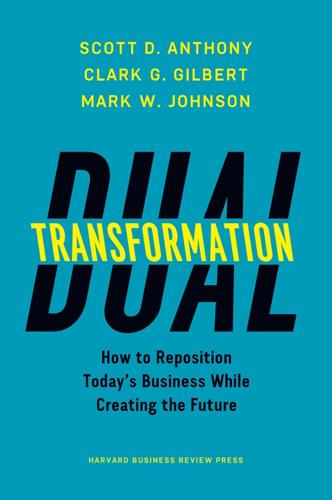
Dual Transformation: How to Reposition Today's Business While Creating the Future
by
Scott D. Anthony
and
Mark W. Johnson
Published 27 Mar 2017
Over the next decade Globe quietly built a base of more than a million users and increasingly expanded from cash transfers to e-commerce payments, a vital service in a country where fewer than 10 percent of the people own a credit card. As of the writing of this book, almost ten thousand local merchants in the Philippines accept GCash, with Globe increasingly looking set to join the phenomenal success story of Safaricom’s M-PESA offering in Kenya. In China, e-commerce giant Alibaba launched its online payment platform, Alipay, alongside its e-commerce marketplace, Taobao, in 2003. Like Globe, Alibaba took advantage of the fact that at the time there were only three million credit cards in circulation. Although consumers with bank accounts could pay via bank transfer, many were worried that sellers would not hold up their end of the deal after receiving payments.
…
See also transformation B creating goals/boundaries for, 121–123 creating separate new engine for, 12 disruption as opportunity for, 47–50 fitness landscape and, 7–8 gap in, determining, 118–121, 213–214 portfolio management systems and, 80–82 rapid, as warning sign, 108–109 slowing revenue, as warning sign, 107 strategic opportunity areas and, 123–127 Guaranteach, 69 Gupta, Piyush, 151 Hait, William N., 17, 18, 19 Hall, Taddy, 38 The Haloid Photographic Company, 13 Hancock, Jake, 84 Hardless, Edgar, 143 Harvard Business School MBA program, 103, 110–113, 176 Hastings, Reed, 23, 32–36 decision making by, 93–95 education and, 69–70 HBO, 5, 35 HBX, 113 health care industry acquisitions in, 22–23 Aetna, 23, 87, 99–102 constrained market in, 59–61 illusory nonconsumption in, 62–63 Johnson and Johnson, 16–22 medical devices, 203–204 Medtronic, 72–73 Netflix and IBM in, 70 retailization of, 101 Healthy Family, 127 Healthy Heart for All, 73, 74 Hill, Andy, 131 Hill, Linda, 146 Hinckley, Gordon B., 41 Hoffman, Reid, 49 HOPE acronym, 65 Horowitz, Ben, 206 House of Cards, 35 House of Payne, 98 Houston, Drew, 151 the how, changing in transformation A, 36–45 Huffington, Arianna, 27 Huffington Post, 27, 28 Humana, 183 Hundred Flowers Campaign, 117 Hurley, Chad, 97 HyperText Markup Language (HTML), 3 IBM, 8, 54, 132 Watson, 70, 204 ibrutinib, 19 Icahn, Carl, 15 ideas, sharing, 149 identity crises, 168–173, 193–197 IDEO, 61 Imbruvica, 19 industry entrant activity, 104–105, 112 Innosight, 61, 77, 93 Innov8, 143–144 innovation business model, 40–42 in business models, 20 catalysts in, 104–105 creating safe spaces for, 143–145 in established companies, 71–72 for improving today and creating tomorrow, 55 incumbents’ failure in, 14–15 pace of disruptions and, 4–5 physical environment and, 148 predictability and, 137–139 sharing ideas and, 149 simplifying experiments and, 148–149 Innovation: The Attacker’s Advantage (Foster), 71 The Innovator’s Dilemma (Christensen), 14–15, 36, 71 The Innovator’s Extinction (Ulmer), 71–72 The Innovator’s Guide to Growth (Anthony, Johnson, Sinfield, and Altman), 62 Instagram, 48 Institute for Health Sciences, 204 Intel, 78–79 InterActive Corp, 49–50 interface management, 75, 80–87 arbitration in, 86–87 exchange teams in, 82–83 transfer pricing in, 85 internet browsers, 2–3, 47 media transformations from, 2–3 Intuit, 132–133 inverse mentors, 150–151 investment curiosity and funding of, 141 at Deseret, 30 estimating potential of existing, 119 at SingPost, 52–53 by venture capitalists, 103–104 iPhone, 4, 92–93, 104 iPod, 92–93 Israel, Simon, 53, 142 iTunes, 92–93 Janssen, Paul, 16 Janssen Pharmaceuticals, 16–22 business model innovation at, 42 postdisruption job to be done at, 39 Jarden Consumer Solutions (JCS), 130–131 Jasper, 143 Jassy, Andy, 53–54 Jensen, Michael, 177 job loss, 7 at Deseret, 30 at Media General, 157 Jobs, Steve, 4, 8 destruction by, 132 focus of, 116 influenced by Xerox, 13 Motorola and, 92–93 transformation journey of, 181–182 job to be done, 21 determining defensible postdisruption, 36–39 Johnson, Lyndon, 116 Johnson, Mark, 36, 53, 62, 109–110 Johnson & Johnson, 16–22, 177–178 Joyce, Jim, 64 Karim, Jawed, 97 Kay, Alan, 154 Kennedy, John F., 24, 115–116, 117, 132 Kickbox, 148–149 Kickstart Ventures, 143–144 Knewton, 56, 67 Knight, Wayne, 95 Knight Ridder, 97 Kodak, 1–2, 4, 11 Kodak Moments, 1–2 Koonin, Steve, 95 KPO, 51 KSL, 8, 9, 29, 68 Kuhn, Thomas, 68 Lafley, A.G., 124, 137 Lasseter, John, 4 Lazarus, Mark, 95 Lead and Disrupt (O’Reilly and Tushman), 53, 54 leaders and leadership commitment to transformation A implementation by, 43–45 conflict arbitration by, 86–87 conviction to persevere and, 24, 155–179 courage in decision making and, 91–113 on crises of commitment, 186–189 on crises of conflict, 189–193 curiosity in, 24, 135–154 discussion questions for, 210 in dual transformation, 23–24 exchange teams and, 83–84 exposing to new thinking, 145–147 focus and, 24, 115–133 greatest challenge facing current, 5, 11 hands-on involvement by, 44 in maintaining transformations, 162–163 mindsets for success in, 23–24 opportunity of disruption and, 11–12 overestimation of alignment by, 119 profiles of transformation, 182–186 purpose and, 176–178 understanding customer problems and the job to be done, 38–39 The Lean Startup (Ries), 65, 153 LeBlanc, Paul, 58 le Carré, John, 153 Lee, Christopher M., 67–68, 86–87 Lee Hsien Yang, 136 Lee Kuan Yew, 136 LegalZoom, 207 Lenovo, 92 Levitt, Ted, 37, 175 Lew, Allen, 144–145 Lim Ho Kee, 53 Linford, Jon, 84 LinkedIn, 49 Lin Media, 156 local maximums, 6 lunar module frame, 131–132 Lyft, 205 Lynch, Kevin, 32 Major League Baseball, 98–99 Manila Water, 117–128, 184–185 determining goals and boundaries at, 121–123 focus at, 142 growth gap determination at, 118–121 outcomes for, 127–128 strategic opportunity areas of, 123–127 Mao Zedong, 116–117 Marcial, Sharon, 127 margins, 122 “Marketing Myopia” (Levitt), 175 markets identifying constrained, 59–63 opened by disruptions, 5 Marriott, 8 Martin, George R.R., 5 Martin, Roger, 124, 140, 177 McClatchy, 97 McGrath, Rita, 65, 146 Meckling, William, 177 media companies founded after disruption in, 47–50 streaming, 33–36, 93–95 transformations in, 2–3 Media General, 155–157 Medicity, 183 Medtronic, 72–73, 74 Merck, 22 metrics, 42–43 microlenders, 73 Microsoft, 4, 49, 54 Mint, 132 mission statements, 177, 178 mobile phones, 3–5, 91–93 banking and, 151–152 shipping industry and, 202–203 Monte Carlo techniques, 98–99 moonshot, 24, 115–116, 131–132 Morton, Marshall, 155–156 motivation, 175–176 leaders on, 194 Motorola, 4–5, 92 M-PESA, 201 Mulally, Alan, 153–154 Mulcahy, Anne, 14, 86 multisystem operators (MSOs), 96, 98–99 Murdoch, Rupert, 97, 109 Myspace, 48, 97, 109 Narayen, Shantanu, 31–33 National Basketball Association, 98–99 National Science Foundation, 56 Navarrete, Minette, 143–144 Nestlé, 204 Netflix, 23, 97, 104 Amazon Web Services and, 54 business model innovation at, 40, 42, 146 business model of, 106 content creation at, 34–35 decision making at, 93–95, 102 early warning signs at, 108 metrics at, 43 postdisruption job to be done at, 39 transformation A at, 32–36 transformation B at, 69–70 transformation journey at, 181 net present value (NPV), 110 net promoter scores, 78 Netscape, 2–3, 47 News Corp, 48, 97 Newspaper Association of America, 3 newspapers.
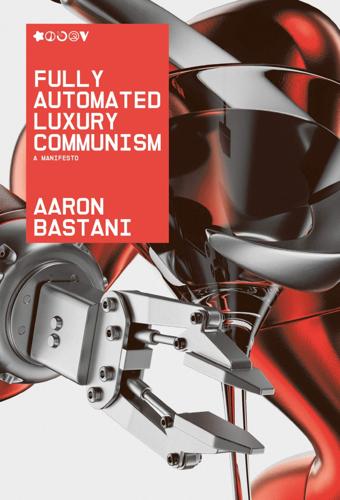
Fully Automated Luxury Communism
by
Aaron Bastani
Published 10 Jun 2019
The company’s model is straightforward and, perhaps rather predictably, resembles the kind of contract associated with mobile phones. Customers pay a deposit of KES 3,500 (approximately $35) to take the system home and then a further KES 50 ($0.50) a day for a year before owning the system outright. Daily payments are made through M-Pesa, a mobile phone–based money system. Consumer renewable energy paid for by cashless, digital payments – the reality of African energy in the early twenty-first century. Offering their products through a network of licensed dealers across Kenya, Tanzania and Uganda, the company’s latest ‘M-Kopa 4’ package offers an eight-watt solar panel that charges appliances through USB ports, as well as two LED bulbs with light switches, a rechargeable LED torch and a radio.
…
See also resources MinION sequencer, 148 M-Kopa, 109 mode of production, 195 modern welfare state, 213 molecular assembly, 180 Monetary Policy Committee, 229 Moon Express, 124, 125–6, 127, 130 Moore, Gordon, 42–4, 46 Moore’s Law, 41, 44–5, 81, 143, 145 Moravec’s Paradox, 81, 82 Mosa Meats, 172 M-Pesa, 109 municipal protectionism, 207, 212, 213, 216 music industry, 234–5 Musk, Elon, 119–21, 135 MX1, 125 MX9, 125 Myconius, Friedrich, 240 Napster, 154 NASA, 120, 122, 124, 126, 128, 131, 137 National Energy Investment Banks (NEIBs), 219, 221 National Health Service (NHS), 210, 213 nationalisation, 213 near-Earth asteroids (NEAs), 38–9, 130–1 NEAs (near-Earth asteroids), 38–9, 130–1 NEIBs (National Energy Investment Banks), 219, 221 neoliberalism, 26–7, 228 neoliberalism, break with Carillion, 201–3 decarbonisation, 217–23 East Coast Main Line, 203–4 Grenfell Tower, 206–8 Haringey Development Vehicle (HDV), 205 Preston Model, 208–11 Universal Basic Services (UBS), 213–17 worker-owned businesses and banks, 211–12 New Labour, 207 Newcomen, Thomas, 33 Newton, Isaac, 32 NHS (National Health Service), 210, 213 nickel, 118 Nigeria, 107–8 Obama, Barack, 2, 9, 21, 128 Off-Grid, 109–10 One Planet Tax, 222 Orwell, George, 19 Osborne, Michael, 87 OSIRIS-REx study, 131 ouroboros, 205 Outer Space Treaty (1967), 127, 136 outsourcing, 202–4, 207, 217 ‘Oxi’ vote, 28 Passivhaus, 114 ‘peak copper’, 118 peak horse, 72–4 peak human, 74–8 PECO engine, 125 Perfect Day Foods, 178 Peter, 5–6 PETMAN, 82–3 petrol vehicles, 105 phenylketonuria (PKU), 147, 147n Philips, 77–8 phosphorus, 118 photography, 402 photosynthesis, 168 photovoltaic (PV) cells, 47, 102–15 PKU (phenylketonuria), 147, 147n Planetary Resources, 129, 130, 132, 135, 136–7 Podemos party, 27–8, 30 political transformation, vehicles for, 194 politics of anti-austerity, 201 of energy transition, 218 green, 188–92 red, 188–92 relationship between technology and, 237 population, 139–40 The Population Bomb (Ehrlich), 166 populism, 187–8.
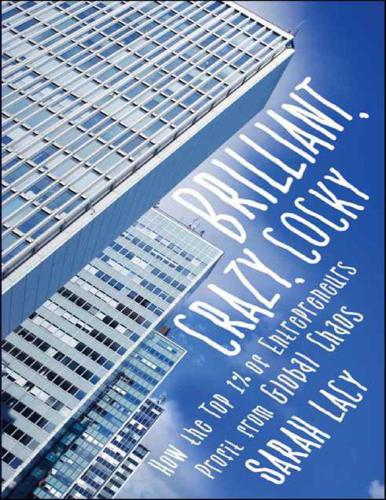
Brilliant, Crazy, Cocky: How the Top 1% of Entrepreneurs Profit From Global Chaos
by
Sarah Lacy
Published 6 Jan 2011
Foreign investors are paying attention: The flow of money into the continent has increased from $9 bil ion to $62 bil ion from 2000 to 2008. Modern agriculture and mobile services may be the two most transformative opportunities: 60 percent of the world’s total uncultivated, arable land is in Africa, and the continent added 316 mil ion new mobile phone subscribers from 2000 to 2008.8 One of the biggest mobile successes is M-Pesa in Kenya, a mobile banking product that reached nearly 40 percent of the adult population within two years of its launch and is the envy of much of the developing and developed world. In Kenya, you can pay for a cab by text message. The chal enge of Africa is the extreme fragmentation and diversity in language, quality of life, political systems, safety, corruption, and economic sophistication.
…
See Silva, Luiz Inácio Lula da Ma, Jack Ma Huateng Mail.ru Group Mamuaya, Rama Mani, VSS Mao Zedong Margalit, Erel McDonald’s, in Brazil Mehrotra, Rajiv Meiloo Mendes, Nivea mercadoLibre MetaCafe Microsoft: as competitor as innovator in Israel Miranda, Marcelo MIT Mitra, Sugata MixIt Mobile World Congress Monster.com Montgomery Securities Moore‘s Law M-Pesa Murambi Genocide Memorial Murangira, Emmanuel Murthy, Narayana Musk, Elon Muslims: in India in Indonesia in Pakistan MyHeritage MySQL Napster NASDAQ: Infosys IPO Israeli participation Latin America listing 1990s boom Silicon Val ey and volatility of Naspers National Venture Capital Association Nayak, Sanjay Negri, Heraldo Negroponte, Nicholas Nehru, Jawaharlal Nelson, Wil ie New Yorker, The New York Stock Exchange New York Times Magazine Nexus Ventures NIT Noff, Ayelet Nokia Nova, Dan Obama, Barack Olympics (2016) Omidyar, Pierre O’Neil , Jim One Laptop Per Child Oracle Oriental Fashion Driving School Ourivio, Eduardo Outsourcing: to China to India in Israel in U.S.
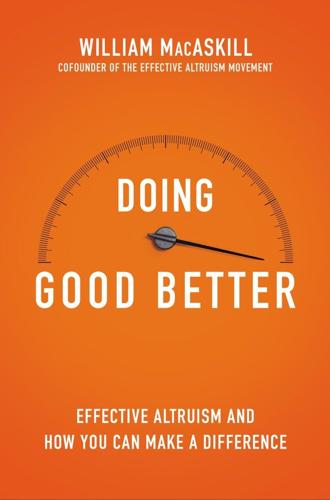
Doing Good Better: How Effective Altruism Can Help You Make a Difference
by
William MacAskill
Published 27 Jul 2015
DMI currently operates in Burkina Faso, and has plans to run similar programs in the Democratic Republic of the Congo, Mozambique, Cameroon, and the Ivory Coast. The third organization is GiveDirectly. Its program is simple: it transfers money from donors directly to some of the poorest people in Kenya and Uganda who are then free to use that money however they wish. Using what is called the M-Pesa system, cell phones are used as makeshift bank accounts, thereby enabling an easy transfer of money from foreign bank accounts to the poor. GiveDirectly uses satellite images to find households with thatched roofs (a strong indicator of poverty, compared to iron roofs) and then contacts those households to discuss the program.
…
A., 67–68 Hong Kong, 131 Humane League, 143, 190 Humane Society of the United States Farm Animal Protection Campaign, 190 Hurford, Peter, 147, 154–55, 157, 160–61 Idealist, 55 immigration, 187–89 immunization programs, 46–47 impact of causes, measurement of, 34 implementation of charities, 109, 117–18 improving lives as measure of impact, 34 income and food purchases, 20 global average of, 49 global income distribution, 48–49, 49 income inequality, 15–25, 16, 18, 50 pledging ten percent of, 199 richest 10 percent of world, 23 and well-being, 21, 21–23 India, 20, 123, 130 Indigenous, 132 Industrial Revolution, 131 inefficiencies of aid, 45–46 Innovations for Poverty Action Lab, 9, 105, 115 insulation and carbon footprint, 136 Intergovernmental Panel on Climate Change, 95, 98, 179 International Christian Support (now called Investing in Children and Their Societies; ICS), 6–7 international labor mobility, 187–89, 194 intestinal worms, 8–9, 183 Iodine Global Network (IGN), 126–27, 127 Islam, Habiba, 167 Ivory Coast, 104, 123 Japan earthquakes and tsunamis in, 58–59 and Fukushima disaster, 79–80, 83–84 homicide rate in, 185 Japanese Red Cross Society, 59 Jay-Z, 3 Jenner, Edward, 69 Jobs, Steve, 149, 152 juvenile crime, 70–74 Kahneman, Daniel, 173 Kaposi’s sarcoma, 52, 52–53 Karnofsky, Holden, 12 Kendrick, Pearl, 171 Kenya, 105, 122, 123, 170–71 Kerry, John, 179 Kilian, Bernard, 134 Kremer, Michael, 5–9, 11, 108 Kristof, Nicholas D., 130 Krugman, Paul, 131 Kuyichi, 132 Laos, 130 law of diminishing returns, 58–61, 62–66 Lean Startup movement, 159 legal profession as career choice, 164 Levitt, Steven, 84–86 Lewis, Greg and earning to give, 74–78 on impact of medicine, 62–66, 74–75, 76 medical ambitions of, 55, 56 life expectancies, 19, 45 Lipeyah, Paul, 6–7 literacy, 103–4 lives saved by doctors, 63–66, 75 Living Goods, 125–26, 127 lower-bound reasoning, 91 low-probablity events, 83–84 malaria and bed nets, 52, 53, 112, 113–14, 117 deaths from, 46–47, 60 and expected values, 81–82 funding dedicated to, 61–62 and program implementation, 117 See also Against Malaria Foundation marginal utility, 57–58 marketing careers, 165, 167 Massachusetts, 87 Mather, Rob, 157, 177 Matthews, Dylan, 174 measles, 121 meat and meat consumption, 136, 141–43 media coverage of disasters and causes, 59–60 medicine as career choice, 164 mega-charities, 120 Mercy for Animals, 143, 175, 190 Mexico, 133, 137 microcredit/microloans, 114–15 micromorts, 82–83 migrants, 187–89 Miliband, Ed, 90 missions of charities, 109, 110 Monbiot, George, 137–38, 140 Montagnier, Luc, 171 Montenegro, Claudio, 188 monthly donations, 197 moral licensing, 144–46 motivation, altruistic, 166–67 Moyo, Dambisa, 43, 44, 45, 46, 50 Mozambique, 3, 104, 123 M-Pesa system, 105 Mulder, Frederick, 177 National Area Health Education Center Organization, 63 National Mobilization Against Sweatshops, 129 natural disasters, 80 natural gas, 136 neglectedness of problems/causes, 181, 183 neglected tropical diseases, 183 Net Impact, 55 New Hampshire, 86 Niehaus, Paul, 169 Niemi, Niina, 134 Nigeria, 188 Nike, 129 Noda, Yoshihiko, 80 nongovernmental organizations (NGOs), 77 Nordhaus, William, 170 normal distributions in statistics, 47–48, 48 Norwood, Bailey, 141–42 No Sweat Apparel, 129 Nothing But Nets, 113–14 Nuclear Threat Initiative, 194 Obama, Barack, 179 objections to charitable giving, 40–41 Occupy Wall Street, 15 offsetting greenhouse gases emissions, 137–40 One Foundation, 3 100x Multiplier, 15–25, 62, 66 “the 1 percent,” 15–18 One Water, 3 Orbinski, James, 29–34 Ord, Toby, 12 outsourcing of jobs, 165 overhead costs of charities, 106 Oxfam, 120 Parliament (MP), value of career in, 90–94 passion and career choices, 149–53, 154 Penna, Robert M., 40 People Tree, 132 personal fit with problems/causes, 41–43, 148–55, 181 Peru, 191 Pew Charitable Trusts, 187 pigs and pork, 141–42, 143 Piketty, Thomas, 15 plastic bags, 136 PlayPumps, 1–5, 9–10, 47 PlayPumps International, 2–3, 11 polio, 121 political careers, 89–94, 174 political causes, 182 political rally participation, 88 poor countries and career choices, 76–78 cost effectiveness of programs in, 62, 121 and fair-trade products, 133 and law of diminishing returns, 61 lives saved by doctors in, 66 and sweatshop laborers, 131–32 presidential election of 2008, 85 preventable diseases, deaths from, 46–47, 60 Pritchett, Lant, 188 programming skills, 161, 164 Public Broadcasting System (PBS), 5 quality-adjusted life years (QALYs) concept of, 34–39 and cost-effectiveness evaluations, 112 and evidence behind claims of programs, 116–17 graphs illustrating, 35, 36 and lives saved by doctors, 63, 65 Quirk, Lincoln, 170 Quoidbach, Jordi, 150–51 Rath, Pim Srey, 130 regression to the mean, 73–74 Reid, Harry, 179 research, funding spent on, 110 research careers, 171–73 rich countries cost effectiveness for programs in, 62 and easily preventable diseases, 62 lives saved by doctors in, 66 Ries, Eric, 159 Round-about Water Solutions, 5 Rumsfeld, Donald, 44 Rwandan genocide, 29–32 Sachs, Jeffrey, 131 sacrifices in altruism, 12 sales careers, 165, 167 Salvation Army, 32–33 scale of problems/causes, 181 Scared Straight program, 70–74, 114 Schindler’s List (1993), 196–97 Schistosomiasis Control Initiative founder of, 157 GiveWell’s endorsement of, 124–25, 127, 197 and neglected tropical diseases, 183 scientific research careers, 171–73 Shapiro, Arnold, 70–71 Silver, Nate, 85 Singapore, 131 SKAT, 11 Skoll Global Threats Fund, 99 slavery, 94–95 smallpox, eradication of, 45–46, 47, 67–69, 121 social cost of greenhouse gas emissions, 97–98 software engineering, 164 Solar Radiation Management Governance Initiative, 193 Somalia, 68 South Africa, 2, 3 South Korea, 131 Soviet Union, 68–69 Spain, 136 Stern Review, 190–91 Stocker, Thomas F., 179 strokes, 35 Stuiver, Ronnie, 1 sub-Saharan Africa health education in, 104 life expectancy in, 45 and Against Malaria Foundation, 125 and Schistosomiasis Control Initiative, 124 supply and demand, law of, 87–88 Swaziland, 3 SweatFree Communities, 129 sweatshops, 128–32 alternatives to, 132 conditions in, 129, 130 desirability of jobs in, 130–31 economic pressures of, 130 and extreme poverty, 130, 132 Swiss Resource Centre and Consultancies for Development (SKAT), 3–4 Taiwan, 131 Taleb, Nassim, 98 Teach for America, 55 Tea Party rallies, 89 technology oriented careers, 163, 164 tenure, 153 testing effectiveness of programs, 74 textbooks, 7, 103–4, 108–9 Thailand, 130 Theroux, Louis, 78 thinking at the margin, 57 Time magazine, 3 tractability of problems/causes, 181, 182–83 trade professions, 165 travel, carbon foot print from, 136, 137–38 Trigg, Jason, 166 tsunamis, 58, 79 tuberculosis, 60 Tversky, Amos, 173 Uganda and fair-trade products, 134 and GiveDirectly, 105, 122 and Living Goods, 125 Under the Knife (2007), 78 UNICEF, 3–4, 11, 120, 132 United Kingdom affluence of, 17 homicide rate in, 185 medical students in, 55 political careers in, 174 and social cost of greenhouse gas emissions, 97 value of political careers in, 90–94 United Nations Climate Change Conference in Copenhagen, 191 United States benefits from medicine in, 63, 65 career choices in, 164 and climate change, 191 cost effectiveness for programs in, 62 and factory farms, 190 and fair-trade products, 134 greenhouse gases of, 135 homicide rate in, 185 income and income inequality in, 15–16, 17, 22 and Industrial Revolution, 131 infrastructure costs in, 46 lives saved by doctors in, 75 medical students in, 55 poverty in, 18, 184 and presidential election of 2008, 85 and quality of goods, 20 and social cost of greenhouse gas emissions, 97 social security spending of, 44 and sweatshop laborers, 131–32 and value of charitable giving, 22 voting in, 84–87 United Students Against Sweatshops, 129 United Way, 33–34 University of Chicago Crime Lab, 187 University of Oxford Geoengineering Programme, 193 US Department of Labor, 132 US Department of Transportation, 46 US Environmental Protection Agency, 46 US Food and Drug Administration, 46 vaccination programs, 118 Valkila, Joni, 134 vegetarianism, 87–88, 141–43, 175 Virginia, 86 volunteering, 175–76 voting, expected value of, 84–87 Washington State Institute for Public Policy, 72 water, 1–5, 56–57 Watts, Alan, 149–50 Wave, 170–71 well-being, subjective assessments of, 21, 21–23, 39–40 Well-Being-Adjusted Life Years (WALYs), 39–40 What If Money Was No Object (YouTube video), 149 The White Man’s Burden (Easterly), 43 Whittlestone, Jess, 168 Wikipedia, 175 Wilson, Timothy, 150–51 Winfrey, Oprah, 55 World Bank, 60, 134 World Bank Development Marketplace Award, 2 World Health Organization (WHO), 60, 69 WorldVision, 120 World War II, 98 Wozniak, Steve, 152 Yunus, Muhammad, 114 Zambia, 3 Zhdanov, Viktor, 68–69 Zimbabwe Bush Pump, 4 Looking for more?
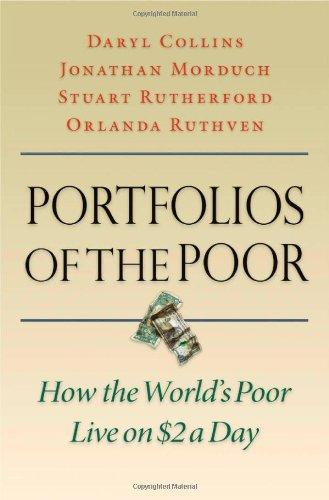
Portfolios of the poor: how the world's poor live on $2 a day
by
Daryl Collins
,
Jonathan Morduch
and
Stuart Rutherford
Published 15 Jan 2009
Equity Bank has had success with “mobile banking,” using four-wheel drive vehicles to reach remote villages on a weekly basis to offer a range of lowcost savings and loan products. This allowed Equity to quickly build a big clientele among poor and middle-income Kenyans. Examples of providers exploiting the potential of wireless devices can also be found in Africa: M-Pesa of Kenya was one of the first to roll out services featuring money transfers over mobile phones, though it was beaten to it by providers in the Philippines. The potential of these advances is now well recognized by the wider financial services industry. Not everything that is new will meet its promise, but microfinance has now entered a period of fast evolution in which, sooner or later, suppliers are likely to figure out 183 CHAPTER SEVEN how best to serve the real financial needs of poor households eager for good-quality financial services.
…
See also loans money-sharing arrangements, 51–52 Mongake, Abel, 261n.6 Montgomery, Heather, 257n.4 moral hazard, 88–89 Morduch, Jonathan, 187, 248n.7, 248n.12, 249n.13, 249n.18, 250n.1, 250n.3, 251– 52n.5, 251n.3, 251n.13, 253n.22, 255n.10, 255n.15, 256–57nn.1–4, 258n.15, 260n.7, 263n.15 Mosley, Paul, 261n.3 M-Pesa (Kenya), 183 Mullainathan, Sendhil, 255n.11 Muravha, Tshifhiwa, 261n.6 Mutesasira, Leonard, 260n.6 Mzansi account, 24 negative net worth, rarity of, 10 Nepal, 254n.7 net present value (NPV), 136, 138 Nicaragua, 249n.17 nongovernmental organizations (NGOs), microfinance by, 155–56 NPV. See net present value “obligatory” lending and borrowing, 50–51 O’Donahue, Ted, 255n.13 Pakistan, 120 Participatory Wealth Ranking (PWR) manual, 262n.10 Patole, Meenal, 252nn.6–7, 257n.7, 261n.5 Pauly, Mark, 253n.22 Peru, 249n.17 Philippines, the, 120, 123, 183, 249n.17, 256n.22 poor, the: assumptions that can mislead regarding, 12–13, 17; commonalties across households, 15–17, 31, 46–47, 49, 100–1; definition of, 1, 5, 7, 190, 195–97; festivals, spending on, 254n.7; financial and nonfinancial challenges facing, 174–75, 184; as a market, 62; number of, 1; opportunities that could assist, 177–80 portfolios: complexity of, reasons for, 19–20; diversification of, prices and, 151–53; examples of, 34, 211–41; extant knowledge of, 14; of funeral coverage in South Africa, example of, 81; informal transactions as dominant in, 53 (see also informal financial sector); large cash flows as common feature of, 31 (see also short-term cash-flow management); methodology for study of the functioning of (see methodology); opportunities for improvement of, 177–80; partial solutions from different sources, perspective on, 67; prices understood through, 21–23 (see also prices); savings as common feature of, 46–47 (see also savings); of transactions and relationships, 49–52.
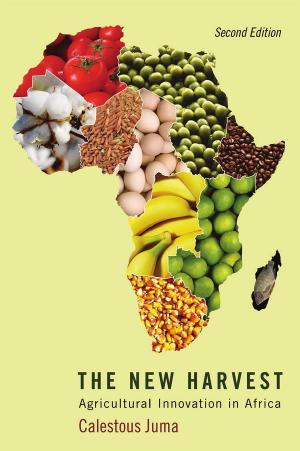
The New Harvest: Agricultural Innovation in Africa
by
Calestous Juma
Published 27 May 2017
By 2011, the four undersea cables operating in Africa had resulted in a quadrupling of data transfer speeds and a 90% price reduction. Access to broadband is challenging Africa’s youth to demonstrate their creativity and African leaders to provide a vision of the role of infrastructure in economic transformation. The emergence of Safaricom’s M-PESA service—a revolutionary 52 THE NEW HARVEST way to transmit money by mobile phones—is an indicator of great prospects for using new technologies for economic improvement.26 In fact, these technologies are creating radically new industries, such as branchless banks, that are revolutionizing the service sector.27 Geographic Information Systems (GIS) The diffusion of geographic information systems is creating new opportunities for development in general and Africa in particular, with regard to agriculture.28 Several countries in Africa have invested in the development of space-based technologies through satellite programs in order to monitor land use and natural resources.
…
Waage, Science and Innovation for Development (London: UK Collaborative on Development Sciences, 2010), 37. 25. International Telocommunication Union, The World in 2014 ICT Facts and Figures, Geneva: International Telecommunication Union, 2014, http://www.itu.int/en/ITU-D/Statistics/ Documents/facts/ICTFactsFigures2014-e.pdf. 26. W. Jack and T. Suri, Mobile Money: The Economics of M-PESA (Cambridge, MA: Sloan School, Massachusetts Institute of Technology, 2009). 27. I. Mas, “The Economics of Branchless Banking,” Journal of Monetary Economics 4, no. 2 (2009): 57–76. 28. M. L. Rilwani and I. A. Ikhuoria, “Precision Farming with Geoinformatics: A New Paradigm for Agricultural Production in a Developing Country,” Transactions in GIS 10, no. 2 (2006): 177–197. 29.
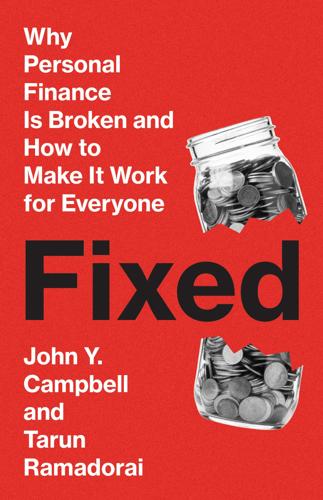
Fixed: Why Personal Finance is Broken and How to Make it Work for Everyone
by
John Y. Campbell
and
Tarun Ramadorai
Published 25 Jul 2025
One area of finance that falls outside the scope of this book, but where technological innovation is perhaps fastest of all, is the payments system. Some examples of payments systems that have been newly established or radically transformed in recent years include banks’ internal accounts; interbank payments systems, including ACH transfer, wire transfer, and SWIFT; mobile banking platforms such as M-PESA; personal transactions services such as Zelle and Venmo; the QR-code-based payments systems in China such as Alipay and Tencent; high-tech electronic payments in India backed by the Unified Payments Interface (UPI); and, of course, cryptocurrencies. Interestingly, payments technology is being deployed more quickly and effectively in emerging economies, which are unencumbered by legacy systems, than in more advanced economies.
…
See also global middle class miners, cryptocurrency, 194 minimal financial resources, families with, 81, 82, 280n9 Mitchell, Olivia, 22 mobile phone penetration, 180, 181 money: keeping “under the mattress,” 69–70; psychological pain of losing, 130; taboo against talking about, 46–47 Money and Pensions Service (UK), 282n24 Moneybox, 86–87 moneylenders, 72–74, 88–89 money market investments, 4, 9, 88, 126, 131, 166–168, 237–239, 247 Monty Python’s Flying Circus, 275n13 Moody’s Investors Service, on stablecoins, 282n23 moral hazard, 142 Morduch, Jonathan, 80 Morningstar mutual fund rankings, 138 mortgage markets: lack of innovation in products, 60; simplifying decision making in, 229 mortgage rates, Indian method of quoting, 224–225 mortgages: adjusting outstanding balance to housing prices, 249–250; assumability and portability, 248, 315n20; borrowers predicting future trajectory of long-term rates, 118; choosing, 117–118; comparison shopping for, 115–116; cost of, 113–114, 116, 120, 229, 247; defaulting on, 123; forbearance for payment during COVID-19 pandemic, 287n27; forms of, 15; income-contingent, 114; interest-only, 122–123, 249; interest rates, 115–118; lock-in and, 121–122, 248; managing, 118–121; obtaining, 115–118; paying off, 122–123; qualified, 217, 310n44; reform in Israel, 207–208, 224, 289n36, 311n57; reverse, 173–175, 260–261, 298n12, 300n35; in starter kit, 246–250; teaser rates, 118–119; use of marginal cost of fund-based lending rate in, 288n31. See also adjustable rate mortgages (ARMs); fixed rate mortgages (FRMs); housing; refinancing mortgages moving, lock-in problem and, 121–122 M-PESA, 184 multiple-choice tests, gender and, 270n5 Musk, Elon, 197 mutual funds, 8; enabling diversification, 132; lack of adoption of, 26; management fees, 137–138, 250–251. See also target date funds name and shame, as tool to document abuses, 216–217 national differences in personal financial systems, 233–234 National Financial Capability Study (NFCS), 33–36, 34–35, 270n2 National Retirement Risk Index (NRRI), 162–163, 165 National Standards for Personal Financial Education, 306n10 natural disasters, insuring against, 252–253 necessities, luxuries vs., 85, 125, 290n1 Nerd Wallet, 183 net worth, as measure of wealth, 17 not-for-profit financial institutions, government and, 220, 311n52 Nudge (Thaler and Sunstein), 211–212 “nudge,” 30, 180, 200, 270n37; insufficiency of, 211–215; studies of, 308n31 Occupy Wall Street, 5 Oedipus, 297n1 Office of Evaluation Sciences, 212 Office of the Comptroller of the Currency (OCC), 215 online calculators to determine college costs, 208–209 on-time graduation, return on investment in higher education and, 104–105 outcomes, uncertainty about future, 40–43 overconfidence: in financial understanding, 33–36; Kahneman on, 271n8 overdraft fees, 92–93, 207 overdraft protection, 214 owner-occupied housing, 113; in retirement, 172–175 ownership registries, 202, 203 Paisabazaar, 242–243 partial insurance, 141–142 passive investing, 136 patent protection, retail finance and limited, 59–60, 276n19 pay-as-you-go public pensions, 153 payday lenders, 89, 275n15 payment protection insurance (PPI), 4, 63, 148 payments system, 7–8; fintech and, 184; government role in, 202 payouts, insurance and caps on, 141–142 payroll advance schemes, 243 peer effects, 46 Pell Grants, 101, 285n6 Pension Fund Regulatory and Development Authority (PFRDA), 309n39 Pension Protection Act (2006), 299n22, 310n44 pension scams, 68, 277n33 Pepys, Samuel, 70, 191, 278n37 performance chasing, fintech and, 185 personal bankruptcy, 96 personal finance system: characterized as “fixed,” 6; government action to support, 179–180; national differences in, 233–234; need to rebuild, 6–7; problems of, 10–15.
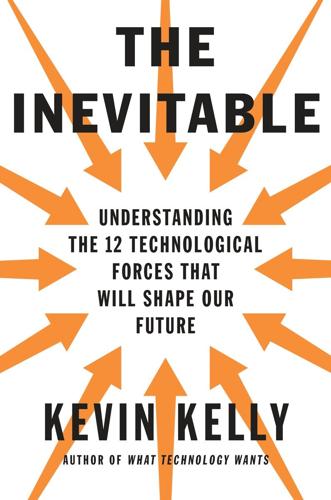
The Inevitable: Understanding the 12 Technological Forces That Will Shape Our Future
by
Kevin Kelly
Published 6 Jun 2016
PayPal and other peer-to-peer electronic systems are able to bridge the vast geographical spans on a global economy, but each of its peer-to-peer payments must go through a central database to be sure a dollar is not spent twice or is not fraudulent. Mobile phone and internet companies devised very useful payment schemes for impoverished areas based on a phone app, such as M-Pesa. But until recently even the most advanced e-money system needed a central bank to keep the money honest. Six years ago some shady characters who wanted to sell drugs online with the anonymity of cash were looking for a currency without a government hand. And some admirable characters championing human rights were looking for a money system that would work outside of corrupt or repressive governments, or in places of no governance at all.
…
Uber for laundry: Jessica Pressler, “‘Let’s, Like, Demolish Laundry,’” New York, May 21, 2014. Uber for doctor house calls: Jennifer Jolly, “An Uber for Doctor House Calls,” New York Times, May 5, 2015. sizable bag rental business: Emily Hamlin Smith, “Where to Rent Designer Handbags, Clothes, Accessories and More,” Cleveland Plain Dealer, September 12, 2012. phone app, such as M-Pesa: Murithi Mutiga, “Kenya’s Banking Revolution Lights a Fire,” New York Times, January 20, 2014. has $3 billion in circulation: “Bitcoin Network,” Bitcoin Charts, accessed June 24, 2015. 100,000 vendors accepting the coins: Wouter Vonk, “Bitcoin and BitPay in 2014,” BitPay blog, February 4, 2015.
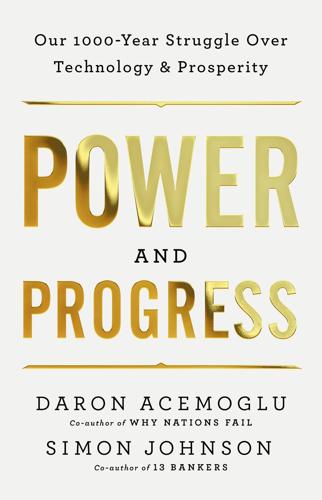
Power and Progress: Our Thousand-Year Struggle Over Technology and Prosperity
by
Daron Acemoglu
and
Simon Johnson
Published 15 May 2023
The basic economics of this story is clear: communication technology enabled the creation of a unified fish market, and a careful study of this episode documents that both fishermen and consumers benefited significantly. Opportunities for new connections and market creation are potentially greater with digital technologies, and some platforms have already made use of them. An inspiring example is the mobile currency and money-transfer system M-Pesa, which was introduced in Kenya in 2007 and provides cheap and fast banking services using mobile phones. This system spread to 65 percent of the Kenyan population two years after its introduction and has since been adopted by several other developing countries. It is estimated to have generated broad-based benefits to these economies.
…
Gains from personalized, adaptive teaching are discussed in Bloom (1984), Banerjee, Cole, Duflo, and Linden (2007), and Muralidharan, Singh, and Ganimian (2019). See also the discussion and additional references in Acemoglu (2021). For more details on the origins of the World Wide Web, see Isaacson (2014). The discussion of the consequences of cell phones in the fishing industry in Kerala is based on Jensen (2006). On M-Pesa, see Jack and Suri (2011). Other examples of the use of digital technologies to build new platforms are provided in Acemoglu, Jordan, and Weyl (2021). Estimates of AI spending are for 2016, from McKinsey Global Institute (2017). Mother of All Inappropriate Technologies. On Frances Stewart’s ideas, see Stewart (1977).
…
New York Times, May 13. www.nytimes.com/2016/05/15/upshot/what-was-the-greatest-era-for-american-inno vation-a-brief-guided-tour.html. Isaacson, Walter. 2014. The Innovators: How a Group of Hackers, Geniuses, and Geeks Created the Digital Revolution. New York: Simon & Schuster. Jack, William, and Tavneet Suri. 2011. “Mobile Money: The Economics of M-PESA.” NBER Working Paper no. 16721. DOI:10.3386/w16721. Jäger, Simon, Benjamin Schoefer, and Jörg Heining. 2021. “Labor in the Boardroom.” Quarterly Journal of Economics 136, no. 2: 669‒725. James, John A., and Jonathan S. Skinner. 1985. “The Resolution of the Labor-Scarcity Paradox.” Journal of Economic History 45:513‒540.
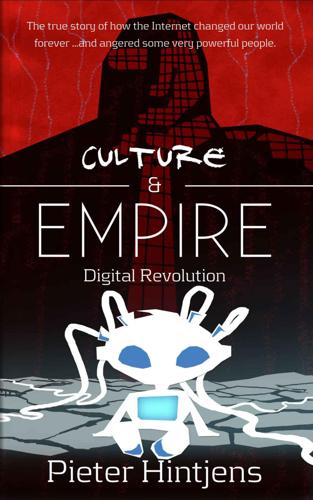
Culture & Empire: Digital Revolution
by
Pieter Hintjens
Published 11 Mar 2013
There are a few businesses that use so-called "paywalls" successfully. Typically, these are existing publishers whose subscribers already expect to pay. The focus however is on subscriptions, not micropayments. In 2002, the M-Pesa system formalized mobile phone micropayments in Kenya. Before that, users sent each other phone credit. Phone credit makes an extraordinarily good digital currency, as it is safe, portable, and has minimal transaction costs. Systems like M-Pesa succeeded in Africa mainly because there was no existing financial industry to lobby against it. Good luck trying to get a Visa card if you live in Lagos, Nigeria. Digital Currencies: From E-Gold to BitCoin The first digital currency was e-gold, founded in 1996.
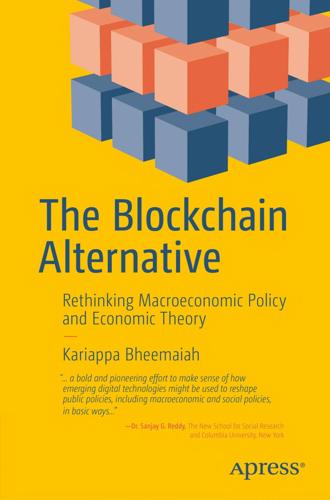
The Blockchain Alternative: Rethinking Macroeconomic Policy and Economic Theory
by
Kariappa Bheemaiah
Published 26 Feb 2017
These individuals are hence obliged to use private remittances networks (e.g., Western Union) in order to send and receive payments from abroad, which can be extremely expensive. For example: When sending money to some countries, remittance fees can go up to 30% of the sum being sent. Astute solutions offered by M-Pesa and Transferwise are removing these barriers by offering very low fees, less forex risk, a high amount of transparency and ease of use, as users can send and receive money with a mobile app. This is adversely affecting the business models of the incumbents. We will come back to payments and remittances when discussing Blockchain.
…
As there are many separate players involved, the information about the sender needs to be verified by each participant, which results in repetitive business processes, accumulated costs, delays, errors, and multiple operations. However, as we have seen in Sidebars 2-2 and 2-3, this system is currently in a state of flux. Companies like M-Pesa are allowing the unbanked to send and receive payments without depending on the traditional players, and companies like Transferwise 22 are reducing the FOREX risk that is involved in cross-border transactions. If the Blockchain were to be inculcated in this value exchange process, it would further streamline the entire transaction.
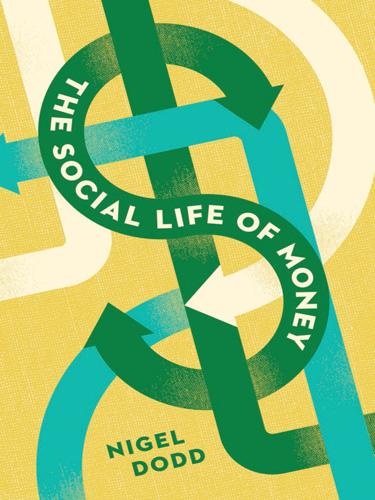
The Social Life of Money
by
Nigel Dodd
Published 14 May 2014
Google Wallet and Wave and Pay are forms of “mobile money” that have been developing alongside the growth of alternative monies. Mobile monies appeal to users because they remove from the act of payment the inconveniences and impositions associated with traditional banking. Some forms of mobile money do this explicitly. Take the M-Pesa system, which mainly operates in Kenya, Tanzania, Afghanistan, South Africa, and India. M-Pesa48 uses mobile phones to transfer money, advertising itself as a cheap and easy way to move money without needing banks (or, in many cases, not visiting bank branches). Other forms of mobile money, such as Square Wallet, still use banks but eliminate most of the aggravation that usually come with banks.49 With Square, once a merchant and a customer have both registered for the service, the merchant needs only the customer’s name; the customer’s photograph appears on the merchant’s terminal while the system manages the details, sending the customer a text message to confirm.
…
Seigniorage was classically seen as a tax—economists called it an inflation tax—because it was usually the state (via its central bank) that produced the notes and coins in question. Today, however, the “tax” on the everyday use of money is paid not to the state but to the providers of the payment networks. These are the very providers—PayPal, Square, Google, and M-Pesa—whose primary attraction lies in the fact that they are not government. This phenomenon is the new, private, seigniorage.50 The expansion of mobile money has proceeded hand in hand with the development of increasingly sophisticated ways for private corporations to “mine value in the act of payment” (Maurer 2011: 10).
…
See also complementary currency; cool money; counterfeit money; credit money; debt-free money; digital money; ecological money; endogenous money; floating money; helicopter money; high-powered money; LETS; local currency; perfect money; postnational money; private money; sacred money; savage money; state fiat money; stateless money; territorial money money of account, 8, 51, 54, 104, 109–10, 219n, 292, 297; in the Eurozone, 258–59 money manager capitalism, 120 money supply, 121, 122n, 211, 318, 319–20, 349n Monnerot, Jules, 172n monopoly, 59, 60 monopoly capitalism, 191, 197, 209 Montandon, George, 283 Moore, Basil, 106n19 Moore, Demi, 203 Moore, Heidi, 386 Moore, John H, 92n M-Pesa, 377–78 More, Thomas, 14, 313, 339 Morgan Stanley, 114, 221 Morrill, Calvin, 292 Morris, William, 327n Mosaic law, 26 Moses, 332–33 Mt. Gox, 366, 367, 369 multitude, and money, 77, 268; and finance, 248; in Hardt and Negri, 238, 239, 246, 247–49, 351; versus society, 293; in Spinoza, 77 Mundell, Robert, 253 Munn, Nancy, 215 mutualism, 353, 354, 357, 360, 363, 372, 382 mutuality, 101 myth, 16–17, 47 Nakamoto, Satoshi, 364, 381, 382 Namecoin, 370n40 Nantes, 165 narrow banking, 133 nationalism, 240 nation-state, 8 natural money, 361 nature, 155, 185, 188, 189, 232, 311, 328; in Bashō, 331; in Bataille, 196; in Baudrillard, 196; in Benjamin, 331; versus civilization, 283; in Fromm, 334–35, 337; in Goethe, 331; immortality of, 141; irrationality of, 77n; in Marx, 58; in Nietzsche, 141, 154; in Polanyi, 280, 311; in Proudhon, 354; and sacrifice, 168; state of, 223; in Tennyson, 331 negative equity, 132 Negri, Antonio, 13, 77, 237–51, 293; on bare life, 249–50; on biopower, 239–40; on the commons, 249, 380; Commonwealth, 237, 245, 250; on desire, 241; Empire, 237, 250; on empire, 238–41, 260, 263; on finance, 249–50; on globalization, 237–38; on imperialism, 237–38; on money, 241–42, 244, 245–46, 250–1; on money and community, 250; Multitude, 237; on the multitude, 238, 239, 246, 247–49, 351; on reterritorialization, 241; on the society of control, 239–40; on sovereignty, 238, 239, 244, 245, 247; Time for Revolution, 266; on time, 251 neochartalism, 103, 106–11, 1, 12n, 254, 359.
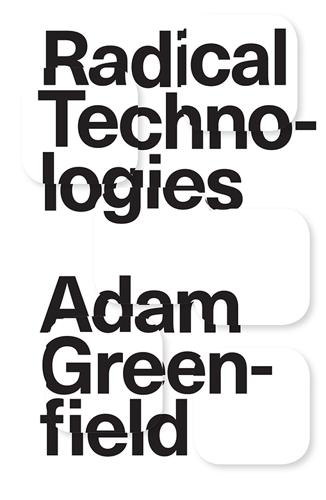
Radical Technologies: The Design of Everyday Life
by
Adam Greenfield
Published 29 May 2017
Before 2008, of course, there had been plenty of attempts at developing new forms of digital currency. All the pieces necessary to achieve this ambition seemed to be in place. Just about every adult on Earth carried on their person at all times a computational device eminently suitable for use as a transaction platform. The pioneering Kenyan M-Pesa service had demonstrated the size of the market for mobile payments using a standard handset with texting capabilities, proving that meaningful transfers of value could take place at scale, entirely outside the traditional banking system. A technical standard for “near-field communication,” or NFC, had been widely adopted in the mobile-phone industry, allowing anyone with a phone so equipped to make payments with a simple tap.
…
P., 269 Machii, Isao, 266–7 machine learning, 8, 16, 60, 185, 192, 194, 209–57, 308 maker spaces, 93 MakerBot, 85, 88, 101, 104–5, 107 mapping, 22–5, 275, 278 Mann, Steve, 77–8 Marx, Karl, 70, 305 MasterCard, 120 Mason, Paul, 88 Mauthausen, 61 McDonald’s restaurant chain, 194–5 McDonough, William, 96 McNamara, Robert, 57 Merkle roots, 123 Metropolitan Police Service, London, 231 Microsoft, 38–9, 262, 275 minimal techno (music genre), 221 Minority Report (movie), 227, 230 MIT Technology Review (journal), 243 Mitte, Berlin neighborhood, 71–2 Monobloc chair, 106 Monroe, Rodney, 230 Moore’s Law, 88, 93 Morris, David, 256–7 Mountain View, California, 284 M–Pesa digital currency, 117 Music Genome Project, 220 Musk, Elon, 222 National Institute of Justice, 233 National Public Radio, 41, 192 National September 11th Memorial, 65 National Technical University of Athens, 173 NAVSTAR Global Positioning System, 21 NBC Universal, 220 neural networks, 214–16, 219, 264, 266 Nevada, 192 New York City, 51, 56–8, 136, 238 New York Times (newspaper), 177 Next Rembrandt project, 262–3, 265 near-field communication standard (NFC), 17, 117 Niantic Labs, 65 Niemeyer, Oscar, 261 Nieuwenhuys, Constant, 190 Niigata, Japan, 301–2 niqab, 295 Nixon Administration, 204 nonvolatile memory, 15 North Dakota, 192 Norwegian black metal (music genre), 221 Nuit Debout protests, 3 Occupy movement, 167, 169 Oculus Rift virtual reality headset, 82 O’Neil, Cathy, 249 open source hardware, 102 OpenTable, 39–40, 46 Osborne, Michael A., 195 Ostrom, Elinor, 171 output neuron, 215 overtransparency, 240–1, 243 Pai, Sidhant, 98 Pandora music service, 220 Panmunjom Truce Village, 65 Pareto optimality, 55, 59 Paris, 1–6, 292 Pasquale, Frank, 244, 253 path dependence, 232, 299 PayPal, 120, 136, 220 PCWorld, 45 People Analytics, 198, 226, 232 perceptron, 214 Père Lachaise cemetery, 2, 5, 26 persoonskaart, Dutch identity card, 60 Pew Research Center, 41, 193 Pinellas County, Florida, 256 Placemeter, 51 polylactic acid plastic filament (PLA), 94, 98, 101 Pokémon Go, 63–5, 76, 79 Polari, 311 policy network, 264 Pollock, Jackson, 261 Pony Express, 256 porosity, 28, 173 POSIWID, 155, 302 Postcapitalism (Paul Mason), 88 power/knowledge, 62 predictive policing, 227, 230, 232, 235 PredPol, 229, 231, 236, 244, 254 proof-of-work, 128–30, 140–1, 143, 290 prosopagnosia.
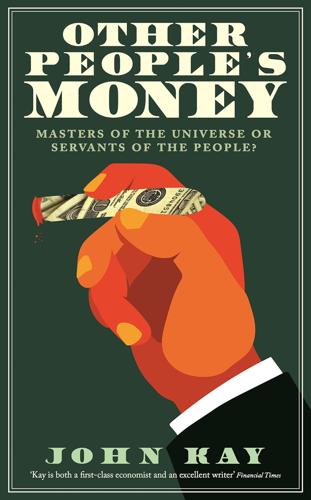
Other People's Money: Masters of the Universe or Servants of the People?
by
John Kay
Published 2 Sep 2015
We don’t need to use paper any more, whether in the form of banknotes, cheques or bank statements. The use of transport smartcards has speeded the adoption of contactless payment, and you can readily see the resulting savings in time and staffing and reduced congestion. Transfers via mobile phones have been particularly important in some poor countries (famously Kenya’s M-Pesa) where the mobile phone network is the most – perhaps the only – efficient component of the national infrastructure. PayPal, the largest internet payment system, is owned by the online auction house eBay. It is not hard to visualise a world in which notes and coins have disappeared. You would wave a pre-loaded card to make a small payment, while larger payments would take place by direct electronic transfer between accounts.
…
C. 282 Levy, Gus 118 Lewis, Ken 300 Lewis, Michael 33 Liar’s Poker 110 LIBOR scandal 35, 272, 295 Library of Congress, Washington DC 115 life insurance companies 197, 199, 201, 282 life-expectancy 77, 257 Liikanen Committee 194, 287 limited liability companies 31, 32, 234 liquidity 29, 40, 41, 43, 79, 87–95, 163, 205, 210, 212, 289 definition 89 end-users 93, 94 and the global financial crisis 188, 278, 286 government intervention 91–2 high-frequency traders 94 illusion of 92, 95, 188 milk analogy 87–8, 89, 91–2 panic buying 89 pursuit of 226 solvency issue 91 speculation 93 and the supply chain 92 supplying or reducing 244 ticket touts 94–5 Litton Industries 45 Lloyd, Edward 61, 62 Lloyds Bank 24, 38, 138, 139, 268 Lloyd’s coffee house, London 61, 62, 71, 87, 258 Lloyd’s of London and Equitas 107 Lloyd’s building 62 Lutine Bell 62 ‘names’ 62, 63, 100 ‘the Room’ 62 LMX spiral 62–3, 64 loan guarantees 138 loan-to-value ratios 262 logistics 80, 81 London attractive to oligarchs and corrupt foreign politicians 269 underground network 159 London Metal Exchange 17 London Stock Exchange 26–7, 28, 29, 31, 212 London Transport 263 Long-Term Capital Management (LTCM) 69, 90, 98, 110, 111, 131, 134 ‘long-term greedy’ slogan 118 Longfellow, H.W.: Hyperion 220 Loomis, Carol 108 lotteries 65, 66, 68, 72 Lucas, Robert 40 Lynch, Dennios 108 Lynch, Peter 108, 109 M M-Pesa 186 Maastricht Treaty (1993) 243, 250 McCardie, Sir Henry 83, 84, 282, 284 McGowan, Harry 45 Machiavelli, Niccolò 224 McKinley, William 44 McKinsey 115, 126 Macy’s department store 46 Madoff, Bernard 29, 118, 131, 132, 177, 232, 293 Madoff Securities 177 Magnus, King of Sweden 196 Manhattan Island, New York: and Native American sellers 59, 63 Manne, Henry 46 manufacturing companies, rise of 45 Marconi 48 marine insurance 62, 63 mark-to-market accounting 126, 128–9, 320n22 mark-to-model approach 128–9, 320n21 Market Abuse Directive (MAD) 226 market economy 4, 281, 302, 308 ‘market for corporate control, the’ 46 market risk 97, 98, 177, 192 market-makers 25, 28, 30, 31 market-making 49, 109, 118, 136 Markets in Financial Instruments Directive (MIFID) 226 Markkula, Mike 162, 166, 167 Markopolos, Harry 232 Markowitz, Harry 69 Markowitz model of portfolio allocation 68–9 Martin, Felix 323n5 martingale 130, 131, 136, 139, 190 Marx, Groucho 252 Marx, Karl 144, 145 Capital 143 Mary Poppins (film) 11, 12 MasterCard 186 Masters, Brooke 120 maturity transformation 88, 92 Maxwell, Robert 197, 201 Mayan civilisation 277 Meade, James 263 Means, Gardiner 51 Meeker, Mary 40, 167 Melamed, Leo 19 Mercedes 170 merchant banks 25, 30, 33 Meriwether, John 110, 134 Merkel, Angela 231 Merrill Lynch 135, 199, 293, 300 Merton, Robert 110 Metronet 159 Meyer, André 205 MGM 33 Microsoft 29, 167 middleman, role of the 80–87 agency and trading 82–3 analysts 86 bad intermediaries 81–2 from agency to trading 84–5 identifying goods and services required 80, 81 logistics 80, 81 services from financial intermediaries 80–81 supply chain 80, 81 transparency 84 ‘wisdom of crowds’ 86–7 Midland Bank 24 Milken, Michael 46, 292 ‘millennium bug’ 40 Miller, Bill 108, 109 Minuit, Peter 59, 63 Mises, Ludwig von 225 Mittelstand (medium-size business sector) 52, 168, 169, 170, 171, 172 mobile banking apps 181 mobile phone payment transfers 186–7 Modigliani-Miller theorem 318n9 monetarism 241 monetary economics 5 monetary policy 241, 243, 245, 246 money creation 88 money market fund 120–21 Moneyball phenomenon 165 monopolies 45 Monte Carlo casino 123 Monte dei Paschi Bank of Siena 24 Montgomery Securities 167 Moody’s rating agency 21, 248, 249, 313n6 moral hazard 74, 75, 76, 92, 95, 256, 258 Morgan, J.P. 44, 166, 291 Morgan Stanley 25, 40, 130, 135, 167, 268 Morgenthau, District Attorney Robert 232–3 mortality tables 256 mortgage banks 27 mortgage market fluctuation in mortgage costs 148 mechanised assessment 84–5 mortgage-backed securities 20, 21, 40, 85, 90, 100, 128, 130, 150, 151, 152, 168, 176–7, 284 synthetic 152 Mozilo, Angelo 150, 152, 154, 293 MSCI World Bank Index 135 muckraking 44, 54–5, 79 ‘mugus’ 118, 260 multinational companies, and diversification 96–7 Munger, Charlie 127 Munich, Germany 62 Munich Re 62 Musk, Elon 168 mutual funds 27, 108, 202, 206 mutual societies 30 mutualisation 79 mutuality 124, 213 ‘My Way’ (song) 72 N Napoleon Bonaparte 26 Napster 185 NASA 276 NASDAQ 29, 108, 161 National Economic Council (US) 5, 58 National Employment Savings Trust (NEST) 255 National Institutes of Health 167 National Insurance Fund (UK) 254 National Provincial Bank 24 National Science Foundation 167 National Westminster Bank 24, 34 Nationwide 151 Native Americans 59, 63 Nazis 219, 221 neo-liberal economic policies 39, 301 Netjets 107 Netscape 40 Neue Markt 170 New Deal 225 ‘new economy’ bubble (1999) 23, 34, 40, 42, 98, 132, 167, 199, 232, 280 new issue market 112–13 New Orleans, Louisiana: Hurricane Katrina disaster (2005) 79 New Testament 76 New York Stock Exchange 26–7, 28, 29, 31, 49, 292 New York Times 283 News of the World 292, 295 Newton, Isaac 35, 132, 313n18 Niederhoffer, Victor 109 NINJAs (no income, no job, no assets) 222 Nixon, Richard 36 ‘no arbitrage’ condition 69 non-price competition 112, 219 Norman, Montagu 253 Northern Rock 89, 90–91, 92, 150, 152 Norwegian sovereign wealth fund 161, 253 Nostradamus 274 O Obama, Barack 5, 58, 77, 194, 271, 301 ‘Obamacare’ 77 Occidental Petroleum 63 Occupy movement 52, 54, 312n2 ‘Occupy Wall Street’ slogan 305 off-balance-sheet financing 153, 158, 160, 210, 250 Office of Thrift Supervision 152–3 oil shock (1973–4) 14, 36–7, 89 Old Testament 75–6 oligarchy 269, 302–3, 305 oligopoly 118, 188 Olney, Richard 233, 237, 270 open market operations 244 options 19, 22 Organisation for Economic Co-operation and Development (OECD) 263 Osborne, George 328n19 ‘out of the money option’ 102, 103 Overend, Gurney & Co. 31 overseas assets and liabilities 179–80, 179 owner-managed businesses 30 ox parable xi-xii Oxford University 12 P Pacific Gas and Electric 246 Pan Am 238 Paris financial centre 26 Parliamentary Commission on Banking Standards 295 partnerships 30, 49, 50, 234 limited liability 313n14 Partnoy, Frank 268 passive funds 99, 212 passive management 207, 209, 212 Patek Philippe 195, 196 Paulson, Hank 300 Paulson, John 64, 109, 115, 152, 191, 284 ‘payment in kind’ securities 131 payment protection policies 198 payments system 6, 7, 25, 180, 181–8, 247, 259–60, 281, 297, 306 PayPal 167, 168, 187 Pecora, Ferdinand 25 Pecora hearings (1932–34) 218 peer-to-peer lending 81 pension funds 29, 98, 175, 177, 197, 199, 200, 201, 208, 213, 254, 282, 284 pension provision 78, 253–6 pension rights 53, 178 Perkins, Charles 233 perpetual inventory method 321n4 Perrow, Charles 278, 279 personal financial management 6, 7 personal liability 296 ‘petrodollars’ 14, 37 Pfizer 96 Pierpoint Morgan, J. 165 Piper Alpha oil rig disaster (1987) 63 Ponzi, Charles 131, 132 Ponzi schemes 131, 132, 136, 201 pooled investment funds 197 portfolio insurance 38 Potts, Robin, QC 61, 63, 72, 119, 193 PPI, mis-selling of 296 Prebble, Lucy: ENRON 126 price competition 112, 219 price discovery 226 price mechanism 92 Prince, Chuck 34 private equity 27, 98, 166, 210 managers 210, 289 private insurance 76, 77 private sector 78 privatisation 39, 78, 157, 158, 258, 307 probabilistic thinking 67, 71, 79 Procter & Gamble 69, 108 product innovation 13 property and infrastructure 154–60 protectionism 13 Prudential 200 public companies, conversion to 18, 31–2, 49 public debt 252 public sector 78 Q Quandt, Herbert 170 Quandt Foundation 170 quantitative easing 245, 251 quantitative style 110–11 quants 22, 107, 110 Quattrone, Frank 167, 292–3 queuing 92 Quinn, Sean 156 R railroad regulation 237 railway mania (1840s) 35 Raines, Franklin 152 Rajan, Raghuram 56, 58, 79, 102 Rakoff, Judge Jed 233, 294, 295 Ramsey, Frank 67, 68 Rand, Ayn 79, 240 ‘random walk’ 69 Ranieri, Lew 20, 22, 106–7, 134, 152 rating agencies 21, 41, 84–5, 97, 151, 152, 153, 159, 249–50 rationality 66–7, 68 RBS see Royal Bank of Scotland re-insurance 62–3 Reagan, Ronald 18, 23, 54, 59, 240 real economy 7, 18, 57, 143, 172, 190, 213, 226, 239, 271, 280, 288, 292, 298 redundancy 73, 279 Reed, John 33–4, 48, 49, 50, 51, 242, 293, 314n40 reform 270–96 other people’s money 282–5 personal responsibility 292–6 principles of 270–75 the reform of structure 285–92 robust systems and complex structures 276–81 regulation 215, 217–39 the Basel agreements 220–25 and competition 113 the origins of financial regulation 217–19 ‘principle-based’ 224 the regulation industry 229–33 ‘rule-based’ 224 securities regulation 225–9 what went wrong 233–9 ‘Regulation Q’ (US) 13, 14, 20, 28, 120, 121 regulatory agencies 229, 230, 231, 235, 238, 274, 295, 305 regulatory arbitrage 119–24, 164, 223, 250 regulatory capture 237, 248, 262 Reich, Robert 265, 266 Reinhart, C.M. 251 relationship breakdown 74, 79 Rembrandts, genuine/fake 103, 127 Renaissance Technologies 110, 111, 191 ‘repo 105’ arbitrage 122 repo agreement 121–2 repo market 121 Reserve Bank of India 58 Reserve Primary Fund 121 Resolution Trust Corporation 150 retirement pension 78 return on equity (RoE) 136–7, 191 Revelstoke, first Lord 31 risk 6, 7, 55, 56–79 adverse selection and moral hazard 72–9 analysis by ‘ketchup economists’ 64 chasing the dream 65–72 Geithner on 57–8 investment 256 Jackson Hole symposium 56–7 Kohn on 56 laying bets on the interpretation of incomplete information 61 and Lloyd’s 62–3 the LMX spiral 62–3, 64 longevity 256 market 97, 98 mitigation 297 randomness 76 socialisation of individual risks 61 specific 97–8 risk management 67–8, 72, 79, 137, 191, 229, 233, 234, 256 risk premium 208 risk thermostat 74–5 risk weighting 222, 224 risk-pooling 258 RJR Nabisco 46, 204 ‘robber barons’ 44, 45, 51–2 Robertson, Julian 98, 109, 132 Robertson Stephens 167 Rockefeller, John D. 44, 52, 196 Rocket Internet 170 Rogers, Richard 62 Rogoff, K.S. 251 rogue traders 130, 300 Rohatyn, Felix 205 Rolls-Royce 90 Roman empire 277, 278 Rome, Treaty of (1964) 170 Rooney, Wayne 268 Roosevelt, Franklin D. v, 25, 235 Roosevelt, Theodore 43–4, 235, 323n1 Rothschild family 217 Royal Bank of Scotland 11, 12, 14, 24, 26, 34, 78, 91, 103, 124, 129, 135, 138, 139, 211, 231, 293 Rubin, Robert 57 In an Uncertain World 67 Ruskin, John 60, 63 Unto this Last 56 Russia defaults on debts 39 oligarchies 303 Russian Revolution (1917) 3 S Saes 168 St Paul’s Churchyard, City of London 305 Salomon Bros. 20, 22, 27, 34, 110, 133–4 ‘Salomon North’ 110 Salz Review: An Independent Review of Barclays’ Business Practices 217 Samuelson, Paul 208 Samwer, Oliver 170 Sarkozy, Nicolas 248, 249 Savage, L.J. 67 Scholes, Myron 19, 69, 110 Schrödinger’s cat 129 Scottish Parliament 158 Scottish Widows 26, 27, 30 Scottish Widows Fund 26, 197, 201, 212, 256 search 195, 209, 213 defined 144 and the investment bank 197 Second World War 36, 221 secondary markets 85, 170, 210 Securities and Exchange Commission (SEC) 20, 64, 126, 152, 197, 225, 226, 228, 230, 232, 247, 292, 293, 294, 313n6 securities regulation 225–9 securitisation 20–21, 54, 100, 151, 153, 164, 169, 171, 222–3 securitisation boom (1980s) 200 securitised loans 98 See’s Candies 107 Segarra, Carmen 232 self-financing companies 45, 179, 195–6 sell-side analysts 199 Sequoia Capital 166 Shad, John S.R. 225, 228–9 shareholder value 4, 45, 46, 50, 211 Sharpe, William 69, 70 Shell 96 Sherman Act (1891) 44 Shiller, Robert 85 Siemens 196 Siemens, Werner von 196 Silicon Valley, California 166, 167, 168, 171, 172 Simon, Hermann 168 Simons, Jim 23, 27, 110, 111–12, 124 Sinatra, Frank 72 Sinclair, Upton 54, 79, 104, 132–3 The Jungle 44 Sing Sing maximum-security gaol, New York 292 Skilling, Jeff 126, 127, 128, 149, 197, 259 Slim, Carlos 52 Sloan, Alfred 45, 49 Sloan Foundation 49 small and medium-size enterprises (SMEs), financing 165–72, 291 Smith, Adam 31, 51, 60 The Wealth of Nations v, 56, 106 Smith, Greg 283 Smith Barney 34 social security 52, 79, 255 Social Security Trust Fund (US) 254, 255 socialism 4, 225, 301 Société Générale 130 ‘soft commission’ 29 ‘soft’ commodities 17 Soros, George 23, 27, 98, 109, 111–12, 124, 132 South Sea Bubble (18th century) 35, 132, 292 sovereign wealth funds 161, 253 Soviet empire 36 Soviet Union 225 collapse of 23 lack of confidence in supplies 89–90 Spain: property bubble 42 Sparks, D.L. 114, 283, 284 specific risk 97–8 speculation 93 Spitzer, Eliot 232, 292 spread 28, 94 Spread Networks 2 Square 187 Stamp Duty 274 Standard & Poor’s rating agency 21, 99, 248, 249, 313n6 Standard Life 26, 27, 30 standard of living 77 Standard Oil 44, 196, 323n1 Standard Oil of New Jersey (later Exxon) 323n1 Stanford University 167 Stanhope 158 State Street 200, 207 sterling devaluation (1967) 18 stewardship 144, 163, 195–203, 203, 208, 209, 210, 211, 213 Stewart, Jimmy 12 Stigler, George 237 stock exchanges 17 see also individual stock exchanges stock markets change in organisation of 28 as a means of taking money out of companies 162 rise of 38 stock-picking 108 stockbrokers 16, 25, 30, 197, 198 Stoll, Clifford 227–8 stone fei (in Micronesia) 323n5 Stone, Richard 263 Stora Enso 196 strict liability 295–6 Strine, Chancellor Leo 117 structured investment vehicles (SIVs) 158, 223 sub-prime lending 34–5, 75 sub-prime mortgages 63, 75, 109, 149, 150, 169, 244 Summers, Larry 22, 55, 73, 119, 154, 299 criticism of Rajan’s views 57 ‘ketchup economics’ 5, 57, 69 support for financialisation 57 on transformation of investment banking 15 Sunday Times 143 ‘Rich List’ 156 supermarkets: financial services 27 supply chain 80, 81, 83, 89, 92 Surowiecki, James: The Wisdom of Crowds xi swap markets 21 SWIFT clearing system 184 Swiss Re 62 syndication 62 Syriza 306 T Taibbi, Matt 55 tailgating 102, 103, 104, 128, 129, 130, 136, 138, 140, 152, 155, 190–91, 200 Tainter, Joseph 277 Taleb, Nassim Nicholas 125, 183 Fooled by Randomness 133 Tarbell, Ida 44, 54 TARGET2 system 184, 244 TARP programme 138 tax havens 123 Taylor, Martin 185 Taylor Bean and Whitaker 293 Tea Party 306 technological innovation 13, 185, 187 Tel Aviv, Israel 171 telecommunications network 181, 182 Tesla Motors 168 Tetra 168 TfL 159 Thai exchange rate, collapse of (1997) 39 Thain, John 300 Thatcher, Margaret 18, 23, 54, 59, 148, 151, 157 Thiel, Peter 167 Third World debt problem 37, 131 thrifts 25, 149, 150, 151, 154, 174, 290, 292 ticket touts 94–5 Tobin, James 273 Tobin tax 273–4 Tolstoy, Count Leo 97 Tonnies, Ferdinand 17 ‘too big to fail’ 75, 140, 276, 277 Tourre, Fabrice ‘Fabulous Fab’ 63–4, 115, 118, 232, 293, 294 trader model 82, 83 trader, rise of the 16–24 elements of the new trading culture 21–2 factors contributing to the change 17–18 foreign exchange 18–19 from personal relationships to anonymous markets 17 hedge fund managers 23 independent traders 22–3 information technology 19–20 regulation 20 securitisation 20–21 shift from agency to trading 16 trading as a principal source of revenue and remuneration 17 trader model 82, 83 ‘trading book’ 320n20 transparency 29, 84, 205, 210, 212, 226, 260 Travelers Group 33, 34, 48 ‘treasure islands’ 122–3 Treasuries 75 Treasury (UK) 135, 158 troubled assets relief program 135 Truman, Harry S. 230, 325n13 trust 83–4, 85, 182, 213, 218, 260–61 Tuckett, David 43, 71, 79 tulip mania (1630s) 35 Turner, Adair 303 TWA 238 Twain, Mark: Pudd’nhead Wilson’s Calendar 95–6 Twitter 185 U UBS 33, 134 UK Independence Party 306 unemployment 73, 74, 79 unit trusts 202 United States global dominance of the finance industry 218 house prices 41, 43, 149, 174 stock bubble (1929) 201 universal banks 26–7, 33 University of Chicago 19, 69 ‘unknown unknowns’ 67 UPS delivery system 279–80 US Defense Department 167 US Steel 44 US Supreme Court 228, 229, 304 US Treasury 36, 38, 135 utility networks 181–2 V value discovery 226–7 value horizon 109 Van Agtmael, Antoine 39 Vanderbilt, Cornelius 44 Vanguard 200, 207, 213 venture capital 166 firms 27, 168 venture capitalists 171, 172 Vickers Commission 194 Viniar, David 204–5, 233, 282, 283, 284 VISA 186 volatility 85, 93, 98, 103, 131, 255 Volcker, Paul 150, 181 Volcker Rule 194 voluntary agencies 258 W wagers and credit default swaps 119 defined 61 at Lloyd’s coffee house 71–2 lottery tickets 65 Wall Street, New York 1, 16, 312n2 careers in 15 rivalry with London 13 staffing of 217 Wall Street Crash (1929) 20, 25, 27, 36, 127, 201 Wall Street Journal 294 Wallenberg family 108 Walmart 81, 83 Warburg 134 Warren, Elizabeth 237 Washington consensus 39 Washington Mutual 135, 149 Wasserstein, Bruce 204, 205 Watergate affair 240 ‘We are the 99 per cent’ slogan 52, 305 ‘We are Wall Street’ 16, 55, 267–8, 271, 300, 301 Weber, Max 17 Weill, Sandy 33–4, 35, 48–51, 55, 91, 149, 293, 314n40 Weinstock, Arnold 48 Welch, Jack 45–6, 48, 50, 52, 126, 314n40 WestLB 169 Westminster Bank 24 Whitney, Richard 292 Wilson, Harold 18 windfall payments 14, 32, 127, 153, 290 winner’s curse 103, 104, 156, 318n11 Winslow Jones, Alfred 23 Winton Capital 111 Wolfe, Humbert 7 The Uncelestial City 1 Wolfe, Tom 268 The Bonfire of the Vanities 16, 22 women traders 22 Woodford, Neil 108 Woodward, Bob: Maestro 240 World Bank 14, 220 World.Com bonds 197 Wozniak, Steve 162 Wriston, Walter 37 Y Yellen, Janet 230–31 Yom Kippur War (1973) 36 YouTube 185 Z Zurich, Switzerland 62
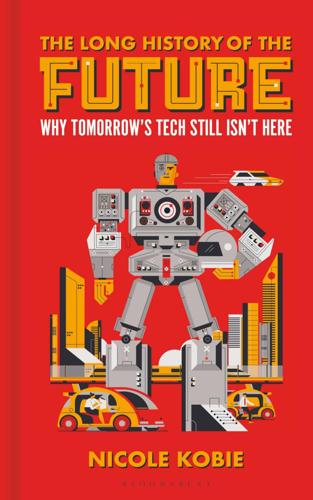
The Long History of the Future: Why Tomorrow's Technology Still Isn't Here
by
Nicole Kobie
Published 3 Jul 2024
I’m not saying to leave those dudes out – please do include them. But perhaps we can all have a say in how the future is built. And people who live differently from us might have entirely different issues which need more urgent solutions than the problems prioritised in the West. For example, Kenya had mobile banking via the M-PESA text messaging system back in 2005, a clever tech solution to help the millions of unbanked people in the region – that was actually inspired by their own kludge of using mobile airtime credits to stand in for cash. At the time, it still took a UK bank three days to transfer money between accounts.
…
WIRED, September 6, 2019. https://biturl.top/nueuQ3 Index 1X Technologies - EVE and NEO here 510 Systems here A* algorithm here Abovitz, Rony here Ackland, Nigel here activism here, here ADALINE and MADALINE neural networks here Advanced Micro Devices (AMD) here Advanced Research Projects Agency Network (ARPANET) here, here Al Jaber, Sultan here Aldebaran Robotics here Alderson, Samuel W. here Alef Aeronautics here Allende, Salvador here Alphabet here, here, here Sidewalk Labs here, here see also Google Alphago algorithm, DeepMind here Altman, Sam here Amazon here, here, here American Institute Fair (1867) here American Research and Development Corporation (ARDC) here American Society of Automotive Engineers (SAE) here Anderson, Sterling here Anthony’s Robots here Antonov, Michael here Apple here, here, here, here, here, here, here, here, here augmented reality headsets here, here APT-E (Advanced Passenger Train) project, British Rail here Arcadio (aka Stelarc), Stelios here Argo AI here ARPA see DARPA (Defense Advanced Research Projects Agency) ARPANET (Advanced Research Projects Agency Network) here, here artificial intelligence (AI) here, here, here, here, here, here, here Alan Turing here Alphabet/Google here, here, here, here, here, here, here, here ‘Blocks World’ here chess challenges here, here, here, here computer vision here concerns and misuse here, here, here, here, here, here, here, here data resources and ImageNet here deep and machine learning here, here, here, here, here ‘expert systems’ and rules based models here, here, here ‘general’ intelligence here, here, here, here, here graphics processing units (GPUs) here John McCarthy here, here, here, here, here, here, here large language models (LLM) here Lighthill report (1973) and opposition here, here narrow AI here, here, here natural language processing (NLP) here, here neural networks here, here, here, here convolutional here OpenAI and ChatGPT here, here, here, here, here, here, here Perceptron model here pre-1970s here, here SRI Shakey robot here, here strong vs weak here, here symbolic here, here Timnit Gebru et al AI paper controversy here, here Asimo robot, Honda here ASKA here Asseily, Alex here Atari here, here augmented reality (AR) and virtual reality (VR) here, here Apple here, here, here Atari here, here computer graphics quality here, here development costs here Eric Howlett and the LEEP system here, here Facebook and Meta here, here, here, here Google Glass smart spectacles here, here, here Ivan Sutherland VR headsets here, here Jaron Lanier here, here, here Jonathan Waldern here metaverse the here Microsoft HoloLens here motion sickness here, here, here, here, here, here, here NASA here, here, here, here Nintendo and Virtual Boy here Palmer Luckey and Oculus Rift headsets here, here, here, here PTSD treatment here Rony Abovitz and Magic Leap here Samsung Gear VR here, here Sebastian Thrun here Sega VR here, here Snap and Vergence Labs here Sony PlayStation VR here Virtual Visual Environment Display (VIVED) here VPL DataGlove and EyePhone here, here, here, here Aurora here, here Aviauto roadable aircraft here Babbage, Charles here Bagnell, Drew here Baidu here Bakken, Earl here, here Balsillie, Jim here Banavar, Guru here banking industry here, here Barcelona, Spain here Bard LLM, Google here, here BASIC (Beginners’ All-purpose Symbolic Instruction Code) here battery technology here, here, here Beach, Alfred here, here Becker, Allen here Behringer, Reinhold here, here, here, here, here, here, here Bel Geddes, Norman here, here, here, here Bell Helicopter here Labs here, here Nexus here, here Bender, Emily here Bengio, Yoshua here Benz, Carl here Berlichingen, Götz von here Berners-Lee, Tim here Bertin, Jean here Bezos, Jeff here bionic technology here Blackrock Neurotech here ‘Blocks World’ AI development here Blomfield, Tom here ‘Blue Cruise’ automation system, Ford here Boeing here, here, here Bombe and Colossus decrypting machines here, here Boring Company here, here Boston Dynamics here, here, here, here, here, here, here, here Atlas robot here, here, here BigDog robot here, here RHex here Sandflea here Spot here, here, here, here Stretch here, here Bostrom, Nick here BrainGate/Utah Array implants here, here Branson, Richard here Bria, Francesca here Brin, Sergey here British army 2222 British Medical Journal here British Rail here, here Brooks, Harry here Brooks, Rodney here Brunel, Isambard Kingdom here Bryan, Leland here Buchanan, Bruce here Buolamwini, Joy here, here, here Burdett, Ricky here Canella, Judge John here carbon emissions here, here, here, here Cardboard, Google here Carmack, John here Carnegie Mellon University (CMU) here, here, here, here, here, here Carson, Johnny here Catalyst Research Corporation here Catanzaro, Bryan here CAVForth project, Forth Bridge here Cavoukian, Ann here CeBIT (2010) trade show here Central Intelligence Agency (CIA) here Cereproc here Chambless, Edgar here Chan Wolf, Helen here, here ChatGPT here, here, here, here Cisco here, here Claydon, Tony here Clegg, Samuel here, here climate crisis here, here Clinton Foundation here Clynes, Manfred here cochlear implants here Commodore here Convair (Consolidated Vultee Aircraft) here, here convolutional neural networks here Cook, Tim here Cornelius, Nancy here COVID-19 global pandemic here, here, here, here Cray 1 supercomputer here Crevier, Daniel here, here, here Crow, Steven here Croydon Times here Cruise, GM here, here, here, here, here Cubitt, Sir William here Cummings, Bob here Curtiss, Glenn here Cyberjaya, Malaysia here cybernetics here cyborgs and brain computer interfaces (BCIs) here BCIs here Blackrock Neurotech here Elon Musk and Neuralink here, here, here, here, here g.tec intendiX interface here, here Kevin Warwick here Mark Zuckerberg and Facebook here, here, here, here medical applications here, here, here, here, here, here, here, here Neil Harbisson and colourblindness here origins of the term ‘cyborg’ here pacemakers here Peter Scott-Morgan and ALS treatment here prosthetics and bionic technology here RFID chips here, here, here Utah Array/BrainGate implant here, here William House and cochlear implants here Cyc AGI here da Vinci, Leonardo here, here Daimler-Benz/Mercedes-Benz here, here Dally, Bill here DARPA (Defense Advanced Research Projects Agency) here, here, here, here, here, here, here, here, here, here, here, here, here Grand Challenge here, here DataGloves, VPL Research here, here Davis, Ruth here Dean, Jeffrey here DEC here Deep Blue AI here, here DeepMind, Google here, here, here DeGray, Dennis here Dendral algorithm here Desforges, Abbé here Devol, George here Dickmanns, Ernst here, here, here, here, here Dietrich, Carl here Difference Engine here Digital Equipment Corporation (DEC) here Dirks, Susanne here diversity, lack of tech industry here Djourno, Dr André here DNNresearch here, here Doctoroff, Dan here, here, here Dolgov, Dmitri here Dreyfuss, Henry here driverless cars/technology here, here, here, here 4D system here Anthony Levandowski here, here, here Anthony’s Robots pizza delivery here Argo AI here artificial intelligence (AI) here, here, here autonomy spectrum here, here current motivation for innovation here DARPA and DARPA Grand Challenge here, here Ernst Dickmanns and VaMoRs here, here, here fatalities here, here, here, here General Motors and Cruise (RCA) here, here, here, here global cost of development here Google/Alphabet and Waymo here, here, here, here, here, here, here, here, here, here motorways here, here, here, here, here NavLab 5 System and RALPH here ‘no hands across America’ trip here Norman Bel Geddes here Prometheus project here public transport here, here, here, here Road Research Laboratory (RRL), UK here Tesla here, here, here, here TRL GATEway pods here Tsukuba Mechanical Engineering Lab here Uber here, here, here US Congress here VaMP and VITA-2 here World’s Fair, New York (1939) here Dugan, Regina here Electronic Age magazine here Electronic Numerical Integrator and Computer (ENIAC) here, here Eliot, George here ELIZA here Elmqvist, Rune here Em, David here EMIEW, Hitachi here Engelberger, Joe here, here Engineer magazine here Enigma cypher here Entscheidungsproblem here ERCO Ercoupe here Ermisse, Daniel here Evans, Dave here Exhibition of the Society of Model Engineers (1928) here Eyriès, Dr Charles here Facebook here, here, here, here, here see also Meta Fairchild Semiconductor here, here Federal Aviation Administration (FAA), US here, here, here, here, here Fei-Fei Li here, here Feigenbaum, Edward here Fenton, Robert here, here Ferrer, Josep-Ramon here Fifth Generation Computer Project, Japan here Firefly driverless car here, here, here Fisher, Scott here, here Flood, Joe here Flow, Sidewalk Labs here flying cars here, here, here, here air-traffic control here Alef Aeronautics Model A here battery technology here business model operation here Carl Dietrich – Terrafugia Transition here EHang 184 (AAV) here Glenn Curtiss – Autoplane (1917) here Hafner Rotabuggy here Henry Ford – Flivver here, here Henry Smolinski Cessna/Ford here Jaunt Air Mobility Journey here Juan de la Cierva – autogyro (1923) here Ken Wernicke – AirCar here landing space and vertiports here Lilium Jets here, here, here, here, here, here, here Luigi Pellarini – Aeronova here Moulton Taylor – Aerocar here, here Opener BlackFly (later Pivotal Helix) here Paul Moller inventions here post-WWII small aircraft sales here potential practical applications here regulatory authorities here, here, here, here, here René Tampier – Avion-automobile (1921) here ‘roadable aircraft’ here, here Robert Edison Fulton – Airphibian here Sebastian Thrun – Kitty Hawk here Steven Crow – Starcar 4 here Theodore Hall and the ConvAirCar here, here Trajan Vuia – aeroplane-automobile (1902) here Vladimir Tatrinov – Aeromobile (1909) here Volocity – Volocopter here VTOLs and eVTOLs here, here, here Waldo Waterman inventions here Forbes Nash Jr, John here Ford, Henry here, here, here Ford Motor Company here, here, here Forest City, Malaysia here Forrester, Jay here Fortnite here Fortran here Foster + Partners here, here, here Foster, Quintin here, here Fox Dunn, Angela here Fujitsu here Fulton, Robert Edison here ‘Futurama’ exhibition, World’s Fair (1939) here Gaffney, Christopher here gaming industry here, here, here, here, here, here see also augmented reality (AR) and virtual reality (VR) Garrett AiResearch here Gasson, Mark here Gates, Bill here Gebru, Timnit here, here, here General Motors (GM) here, here, here, here, here, here, here General Problem Solver here generative adversarial network (GAN) here Gerhardt, Marcus here Glass smart spectacles, Google here, here Goddard, Robert here Goodfellow, Ian here Google here, here, here artificial intelligence (AI) here, here, here, here, here, here, here augmented reality and Glass smart spectacles here, here, here driverless cars here, here, here, here, here, here, here, here robots/robotics here, here, here X Labs here, here Gow, David here Graphics Processing Units (GPUs) here, here, here Greatbatch, Wilson here Greenfield, Adam here Gregory, Richard here Grumman TACRV (Tracked Air Cushion Research Vehicle) here g.tec here, here the Guardian here, here Guger, Dr Christoph here Günel, Gökçe here, here Hall, Dave and Bruce here, here, here Hall, Theodore here, here Harbisson, Neil here Hart, Peter here, here, here, here, here Harvard University here, here Hashme, Shariq here Hassabis, Demis here Hebb, Donald here Heilig, Morton here Heim, Michael here Henn na Hotel, Japan here Herzberg, Elaine here, here Heseltine, Michael here Hilbert, David here Hinton, Geoffrey here, here, here, here Hitachi here Hoff, Marcian here Hommet, Christophe here, 2241 Honda here, here, here Hopps, John here House, William here Howlett, Eric here HTC Vive VR headset here Hyman, Albert here hyperloops here, here, here 20th century pneumatic trains here Beach Pneumatic Transit Company here cable systems here Dalkey Atmospheric Railway (DAR) here Elon Musk here, here, here, here Eric Laithwaite and Tracked Hovercraft here, here European Hyperloop Week (EHW) (2023) here, here George Medhurst and Victorian pneumatic transport here, here, here, here Hyperloop TT here Isambard Kingdom Brunel here Jean Bertin and Aérotrain here John Vallance’s air-propelled carriage, Brighton (1826) here maglev technology here pneumatic postal shuttles here, here Rammel and Latimer Clark here, here Rohr Industries here, here Samuda brothers and Samuel Clegg here Shinkansen here, here, here Tracked Air Cushion Vehicles (TACV) programme here TransPod here Victorian atmospheric and pneumatic transport here, here, here Virgin Hyperloop One here IBM here, here, here, here ImageNet here Industry on Parade TV programme here the Information website here Ingels, Bjarke here Intel here, here International Conference on Robotics and Automation (2023), IEEE here, here internet here Iribe, Brendan here iRobot here Ishiguro, Hiroshi here, here Jaguar i-Pace here Joby Aviation here, here Kalinske, Tom here Kasparov, Garry here Kates, Josef here Kawasaki Heavy Industries here Kay, Alan here, here Keeling, Mary here Kese, Peter here Kim, John here Kitano, Hiroaki here Kitty Hawk here Kline, Nathan here Kobrinski, Alexander here Koppen, Otto here Krizhevsky, Alex here Krueger, Myron here Kuala Lumpur, Malaysia here Kuiken, Dr Todd here La Cierva, Juan here Laithwaite, Eric here, here languages, early computer here Lanier, Jaron here, here Larsson, Arne here Latimer Clark, Josiah here, here Laurel, Brenda here Laverde, Alberto Vejarano here Le Corbusier here LeCun, Yann here Leg Lab here Legg, Shane here Lenat, Doug here Levandowski, Anthony here, here, here, here, here, here Lidwill, Mark here Life magazine here, here Lighthill, James here, here Lilium here, here, here, here, here, here, here Linden Lab here the Line, Saudi Arabia here linear cities here linear induction motor (LIM) here, here, here Linear Induction Motor Research Vehicle (LIMRV) here Link, Sidewalk Labs here lithium batteries here, here Llama, Facebook here Lobban, Joan here Lockheed Missiles here London Pneumatic Despatch Railway (LPDR) here longtermism here Los Angeles Community Analysis Bureau (CAB) here Lovelace, Ada here LS3, Boston Dynamics’ here Luckey, Palmer here, here, here, here Lyft here Lyons here M-PESA here MacWilliam, John Alexander here Macy’s here Magic Leap here maglev technology here Mahan, Steve here Maisonnier, Bruno here Malapert, Etienne here Manchester Mark here Markoff, John here Marsh, Burton here Masdar City, UAE here Maslow, Abraham here Mattel here Mattern, Shannon here, here Mauchly, John here McCarthy, John here, here, here, here, here, here, here McClelland, James L. here McCulloch, Warren here, here McGreevy, Michael here McMillan-Major, Angelina here McShane, Clay here Mechanical Turk, Amazon here Mechanics Magazine here Medhurst, George here, here Medtronic here, here Meta here, here metaverse here Michie, Donald here, here Microsoft here artificial intelligence (AI) here, here, here HoloLens here Windows here military, US here, here, here, here, here, here, here, here, here, here, here, here, here, here, here, here, here, here Minadoi, Giovanni Tommaso here Minsky, Marvin here, here, here, here, here, here MIT (Massachusetts Institute of Technology) here, here, here, here, here Mitchell, Claudia here Mitchell, Margaret here, here Mitchell, Nate here Mitsubishi here Moller, Paul here Montandon, Adam here Montemerlo, Mike here Monzo here Moore and Moore’s Law, Gordon here Morgan, Garret here Musk, Elon here, here, here, here, here, here, here, here, here, here, here, here, here, here, here Mustang Mach-E, Ford here MYCIN here, here Nagle, Matt here Naimark, Michael here, here NASA (National Aeronautics and Space Administration) here, here, here, here, here National Transport Safety Board (NTSB), US here Nature here NerveGear headset here NetJets here neural networks here, here, here, here convolutional here Neuralink here, here, here New Scientist here New York City fires, 1970s here New York Times here, here, here, here, here, here, here, here, here Newell, Allen here, here Ng, Andrew here Nilsson, Nils here Nintendo here Virtual Boy here Normann, Richard here, here Nvidia here Ocado Technologies here Oculus Rift AR smart glasses here Oculus Rift VR headsets here, here O’Hagan, John here, here O’Kane, Josh here, here Okhitovich, Mikhail here Olson, Karl here, here Open Bionics here OpenAI here, here, here, here, here, here Opener BlackFly/Pivotal Helix here Optimize3D here Optimus robot, Tesla here Osborne 1 here Otto here Ottobock here pacemakers here Paes, Eduardo here Page, Larry here, here, here, here, here, here Papert, Seymour here Paré, Ambroise here PDP-8 and PDP-10 ‘microcomputers’ here Pellarini, Luigi here Penoyre, Slade here perceptrons, AI here Permobil F5 Corpus here Petman, Boston Dynamics’ here Pichai, Sundar here, here Pinkus, Henry here Pitcairn, Harold here Pittau, Rev.
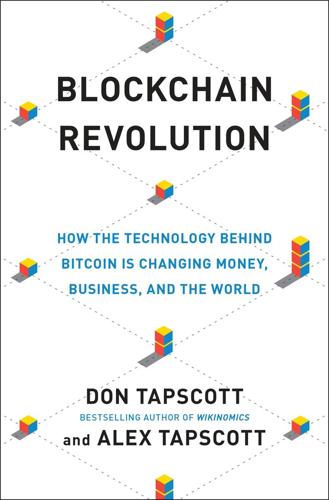
Blockchain Revolution: How the Technology Behind Bitcoin Is Changing Money, Business, and the World
by
Don Tapscott
and
Alex Tapscott
Published 9 May 2016
He said, “A lot of African countries leapfrogged the infrastructure of landline telecoms with cellular. They skipped that step. Blockchain will have the greatest impact in areas where the payment networks don’t exist or are very poor.”20 Blockchain will push many nascent initiatives, such as mobile-money service providers like M-Pesa in Kenya, owned by Safaricom, and microcredit outfits globally, into high gear by making them open, global, and lightning fast. A bank is the most common financial institution, and so we will use it as an example here. How do you open a bank account? If you live in the developing world today, you will likely have to visit the branch in person.
…
See First era of the Internet Internet Engineering Task Force (IETF), 271, 281, 299, 305 Internet Governance Forum (IGF), 300 Internet of Things (IoT), 3, 38, 146, 147–48, 152–55 economic payoffs, 161–64 future developments, 164–67 hacking your future, 168–69 public sector use of, 206–7 twelve disruptions, 156–61 Internet Society, 281, 300 Intrade, 84 Investing, in financial services, 62–63, 64 IPOs (initial public offerings), 82–84, 127, 180, 181 Iran, 13 Ito, Joichi, 246–49, 286, 289, 301 Jaques, Elliot, 106 Jennings, Eric, 147–48, 157, 162–63, 260 Jensen, Michael, 100, 108 Jive, 139 Jobanputra, Jalak, 287 Job killer, 270–71 JPMorgan Chase, 8, 43, 63 Jumpstart Our Business Startups Act, 82–83 Jurisdiction issues, 264 Justice system, 220–21, 223 Kahn, Bob, 281 Kahneman, Daniel, 279 Kaminska, Izabella, 78, 257–58, 266 Karpeles, Mark, 247 Kaye, David, 244 Kaye, Max, 216 Keating, Zoë, 21, 235–36, 237 Kessler, Sarah, 135 Keyless signature infrastructure (KSI), 199 Kidder, Tracy, 150 Kim, Joyce, 170–72, 177, 287 Kirby, Peter, 194 Knowledge networks, 300–301 Kulin, Haluk, 43, 46, 48, 178 Kurzweil, Ray, 336n Labor markets, 270–71 Land title registration, 8, 19–20, 51, 188–89, 193–95, 198 Larsen, Chris, 59, 67 Law enforcement, 286–87 Law profession, 102–3 Lawsky, Benjamin, 8, 287, 289–92 Leadership, 24, 281–309 framework for governance, 298–307 new agenda for next digital age, 307–9 the players, 283–89 regulation and, 289–93, 296–97 Lederman, Leon, 4–5 Ledger of Everything, 152 Ledger of Things, 145–69 economic payoffs, 161–64 evolution of computing, 150–52 future developments, 164–67 hacking your future, 168–69 Internet of Things, 152–55 power to the people, 146–50 twelve disruptions, 156–61 Legal disputes, 100, 105, 193, 219, 221 Legal frameworks, 264 Legal recourse, lack of, 258 Lending value, in financial services, 62, 64 Libertarianism, 199–200, 201, 327n Library of Congress, 133 Licensed exchanges, 291 Lightfoot, Gordon, 29 Lighthouse, 94 Lih, Andrew, 131 Lincoln, Abraham, 199 LinkedIn, 99 Linux, 12, 88, 129–30, 141, 282 Linux Foundation, 69, 285 Lipset, Seymour Martin, 201 Liquid democracy, 218–19 Liquidity, 256, 295 Litecoin, 257 Litecoin Association, 267 Literacy, 172, 195, 249 Live Nation, 229 Living standards, 172 Locally generated power, 148, 149–50 London School of Economics, 74 LO3 Energy, 148, 149 Lubin, Joseph, 15–16, 88–91, 112–13, 141, 177–78 Ludwin, Adam, 68 Lundkvist, Christian, 76 Lyft, 134, 164 MaidSafe, 95 Mainframes, 150 Malaysia Airlines Flight MH370, 213 Managers (management) ConsenSys, 89–91 public sector, 206–7 smart devices and IoT, 157, 159–60, 161 Manifesto for the Digital Age, 308–9 Manila, remittances, 182–83, 186 Manufacturing, 160, 174 Marketing, search costs, 97 Massive open online courses (MOOCs), 248–49 Masters, Blythe, 8, 63, 65, 66, 68, 73, 287, 289 McAdam, Cindy, 287 McKinsey, 156, 163–64, 169, 194 McLuhan, Marshall, 14 McWaters, Jesse, 66, 306 Meckling, William, 100 Medical records, 158 Medici, 83 Member ownership, 89–91 Members of a social network, 262 Mesh networks, 123, 146–47 Metaverse, 38 Metering economy, 135–36, 180, 233 MHITs, 50–51 Microblogging, 246 Microfinance, 56, 170–72, 191–92 current issues with, 191–92 inclusion design principle, 49–51 Nicaragua example, 170–72, 176 prosperity passport, 177, 178 Microgrids, 148–50 Micromonetizing, 180–81, 233 Microsoft, 4, 150, 270, 310 Microsoft Yammer, 139–40 Millennials, 174 Mi.Mu, 228 Miners, 30–32, 240–41, 260, 267, 268–69 Mining, 240–41, 259–60, 268–69 Mining rate, 38 MintPal, 266 MIT Bitcoin Project, 247 MIT Digital Currency Initiative, 247, 282, 284, 286, 301, 303, 305 MIT Media Lab, 27, 246–47, 286, 305 M-of-N signature, 104 Monegraph, 133 Monetary policy, 37–38, 56, 294–95, 309 Money laundering, 176, 275–76 Monks, Robert, 78 Monopolies, 57, 93–95 Moore’s law, 4, 51, 307–8 Moreira, Carlos, 11, 14, 15, 154, 204 Morgan, Pamela, 219, 287 Mornini, Tom, 73–74, 77 Morris, Gilbert, 173 Motion detectors, 254 Moving value, in financial services, 61, 64 M-Pesa, 176 Mt. Gox, 9, 247 Mugabe, Robert, 216–17 Muller, Ralf, 237–38 Mulligan, Mark, 230 Multisignature (multisig), 103–5 Multistakeholders, 282, 297, 298–99 Murdoch, Rupert, 310 Music, 21, 226–39 A&R, 238–39 basic copyright registration, 236, 237–38 business complexity, 228–31 digital content management system, 238 emergence of new business model, 231–35 ownership rights, 45–49, 132–33 self-launched artists, 235–37 smart contracts, 47, 231 Music copyright, 45–49, 132–33, 228–31, 234, 236, 237–38 Music Key, 236 Musk, Elon, 274 MyBarackObama.com, 224 Nadex, 84 Napster, 21, 263 NASDAQ, 83–84 NASDAQ Linq, 65 Nathan, Oz, 27–28 National Institute of Standards and Technology, 40 National Rifle Association, 200–201, 276 National Security Agency, 42, 274 Natural disaster relief, 20–21, 188–89, 190–91 “Nature of the Firm, The” (Coase), 92–93 Nest, 275 Networked institutions, 306 Networked integrity, 10, 30–33 Networked intelligence, 164 Network effects, 51, 67, 175 Network protocol, 271–72 Neutral Voting Bloc (NVB), 216 New business formation, rate of, 173–74 New business models, 115–44, 168 autonomous agents, 122–25 bAirbnb vs.
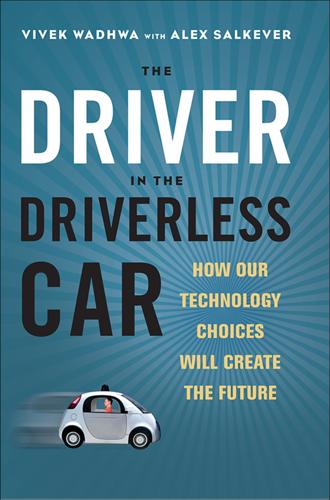
The Driver in the Driverless Car: How Our Technology Choices Will Create the Future
by
Vivek Wadhwa
and
Alex Salkever
Published 2 Apr 2017
This has introduced rich sources of information into their lives. Aside from calling distant relatives as they could on their earlier cell phones, they can now receive medical advice from distant doctors, check prices in neighboring villages before choosing a market, and send money to a friend. In Kenya, the M-Pesa network, using mobile phones, has effectively leapfrogged legacy banking systems and created a nearly frictionless transaction-and-payment system for millions of people formerly unable to participate in the economy except through barter.8 The prices of smartphones, following the curve of Moore’s Law downward, have fallen so much that they are nearly ubiquitous in vibrant but still impoverished African capitals such as Lagos.
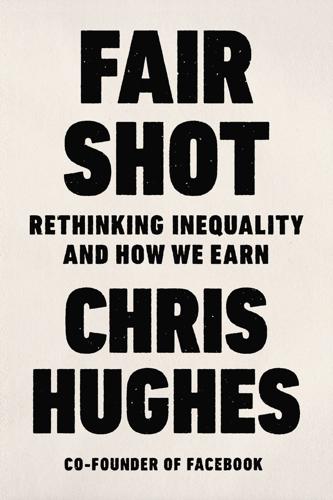
Fair Shot: Rethinking Inequality and How We Earn
by
Chris Hughes
Published 20 Feb 2018
She set out, and the rest of us fell in line behind her. After a 20-minute walk through the bush, brambles nipping at our legs, we finally arrived at a set of red-earth huts. All of the people who lived in this tiny village had received cash transfers over the past year—two payments of roughly $500, made via M-Pesa, a mobile service that enables easy money transfers. The digital money can be converted to traditional paper currency at any time. The villages that GiveDirectly serves are not directly connected to paved roads, and most do not have basic infrastructure like electricity or running water. Most of the villagers are engaged in subsistence farming and fishing.
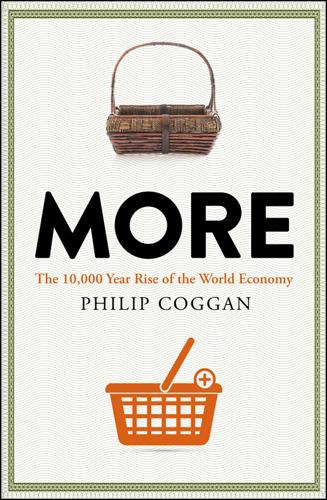
More: The 10,000-Year Rise of the World Economy
by
Philip Coggan
Published 6 Feb 2020
As economies grow, their financial sectors tend to get more sophisticated, and get used by more people. For all the faults of the modern financial sector (and there are many), it is worth reflecting on those economies where finance is underdeveloped; where citizens cannot get access to buy their own homes or start a small business. Better finance can help. In Kenya, for example, the rise of M-Pesa, a financing system that operates through mobile phones, has improved the lives of millions of people, making it easier for small businesses to operate. It seems to be in the nature of financial sectors that they are subject to boom and bust. People need confidence to lend, and when they get nervous, the resulting squeeze on credit can cause economic havoc.
…
Independence from the European colonial powers did not bring democracy but rather one-party rule, whether in the form of a kleptocrat like Mobutu of Zaire (now the Democratic Republic of Congo) or a socialist state like Tanzania. In the latter, President Julius Nyerere nationalised industry, seized foreign-owned businesses, and forced peasants to sell grain to the government for as little as a fifth of its value.55 The 21st century has seen an improvement in Africa’s fortunes. Technology has helped. In Kenya, the M-Pesa service has brought banking services to millions who had previously been denied them. One study found that a doubling in mobile-data usage increased annual growth in GDP per person by half a percentage point.56 In the ten years to 2012, real income per head in Africa grew more than 30%. In the previous two decades, it had fallen by almost 10%.
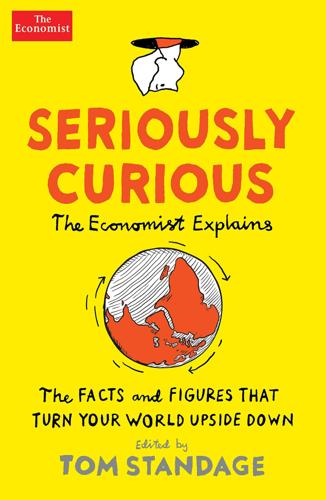
Seriously Curious: The Facts and Figures That Turn Our World Upside Down
by
Tom Standage
Published 27 Nov 2018
A current problem Sources: IEA; GSMA Mobile phones have transformed the lives of hundreds of millions for whom they were the first, and often the only, way to connect with the outside world. They have made it possible for poor countries to leapfrog much more than landline telephony. Mobile-money services, which enable people to send cash straight from their phones, have in effect created personal bank accounts that people can carry in their pockets. By one estimate, the M-Pesa mobile-money system alone lifted about 2% of Kenyan households out of poverty between 2008 and 2014. Technology cannot solve all of Africa’s problems, but it can help with some of them. Why self-driving cars will mostly be shared, not owned When will you be able to buy a driverless car that will work anywhere?
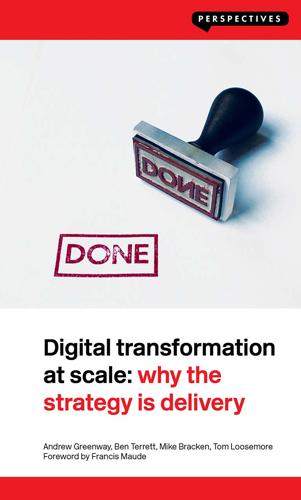
Digital Transformation at Scale: Why the Strategy Is Delivery
by
Andrew Greenway,Ben Terrett,Mike Bracken,Tom Loosemore
Published 18 Jun 2018
In many developing nations, where public institutions are immature or not present, digital companies are stepping in, invited or not. In the Philippines, a country where 44% of the population are active internet users, 94% of those users are signed up to Facebook.14 Thanks in large part to companies like M-Pesa providing financial services through mobile phones, more than 80% of Kenyan adults have a bank account. The global average is 62%. Communications has long been a piece of national infrastructure, the traditional domain of the state and its officials. This is no longer a given. It is perhaps too early to say whether the giant snail is coming for better-established public institutions.
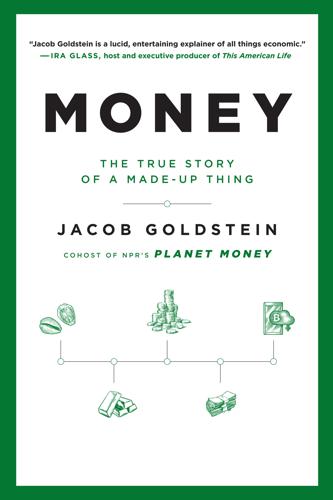
Money: The True Story of a Made-Up Thing
by
Jacob Goldstein
Published 14 Aug 2020
Visa’s transaction capacity comes from Visa’s website. Figures on Chinese miners come from the Reuters story “China’s Bitcoin Miners Scoop Up Greater Production Power.” The Gavin Andresen quote is from my interview with Andresen. Bitcoin exchange rates are from coindesk.com. Conclusion The Kenyan mobile-money-by-text system was M-Pesa. The figure for Alipay was cited by the Reuters story “China’s Ant aims for $200 bln price tag in private share sales,” by Julie Zhu, Kane Wu, and Zhang Yan. Figures for the amount of cash in circulation, and the denominations, come from the Federal Reserve. Ken Rogoff argued for getting rid of big bills in his book The Curse of Cash.
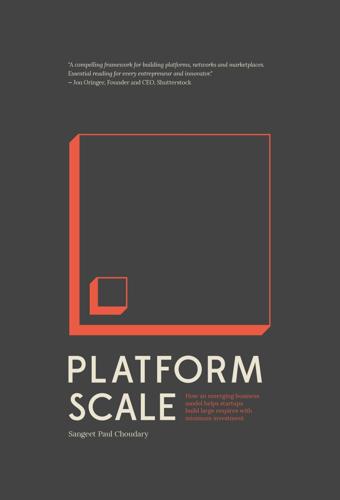
Platform Scale: How an Emerging Business Model Helps Startups Build Large Empires With Minimum Investment
by
Sangeet Paul Choudary
Published 14 Sep 2015
However, to sustainably encourage high-risk interactions, these platforms must invest in curation, and must signal high-quality supply to the demand side. Solving the chicken-and-egg problem on such platforms requires solving quality control issues rather than gunning for a critical mass of users. 4.6 THE CURIOUS CASE OF NEW PAYMENT MECHANISMS Why M-Pesa Works Finding adoption for a new payment mechanism has always involved solving a chicken-and-egg problem. Ranging from the introduction of new forms of currency in medieval to early modern times, and the adoption of credit cards to the rise of PayPal (as alluded to in many of the strategy discussions in this section) and the recent rage around Bitcoin, new payment systems have regularly offered some of the most complex chicken-and-egg challenges.
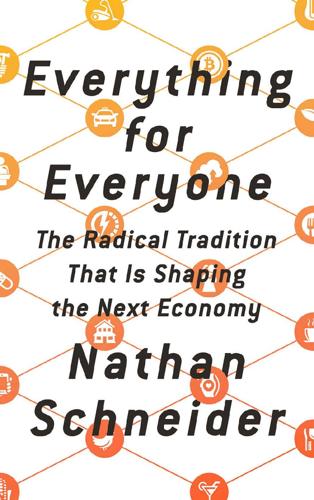
Everything for Everyone: The Radical Tradition That Is Shaping the Next Economy
by
Nathan Schneider
Published 10 Sep 2018
Along the side of the road, buildings came and went among the palm trees and power lines. There were stores, stray hotels, and office buildings that offered no indication of the work done inside. Fashion models watched me go by from billboards, towering over hand-painted mural ads for Safaricom, the telecom company that runs a celebrated text-message payment system called M-Pesa. And then I started seeing storefronts for the Co-operative Bank.33 As the Nairobi skyline came into view, I saw that name also atop one of the taller buildings. I hadn’t come to Kenya because of its cooperatives, nor did I know that I should; I’d come to visit family members who were living at a research station near Mount Kenya.
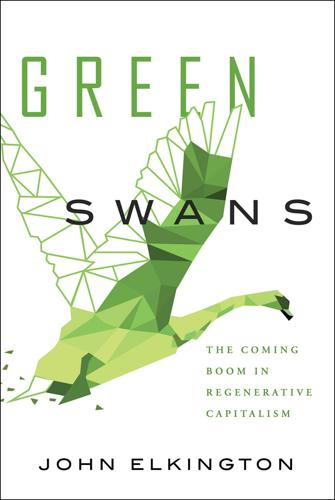
Green Swans: The Coming Boom in Regenerative Capitalism
by
John Elkington
Published 6 Apr 2020
“Through the history of international development,” LIGTT noted in a study of fifty high-potential technologies, “a small number of breakthrough technologies have had transformative impact: the polio vaccine; the new seed varieties which launched the Asian Green Revolution; anti-retroviral drugs which appear to have rendered HIV/AIDS a chronic and manageable disease; and more recently, the M-PESA mobile payments platform.”21 But it cautioned, “Such major breakthroughs are rare. The truth is that far too much of the effort is focused on incremental technologies which—despite compelling narratives, significant funding, and considerable media hype—fail to reach any reasonable scale or impact.”
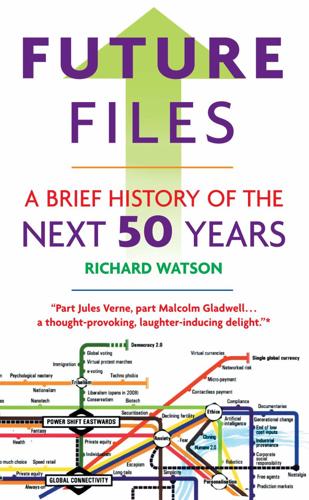
Future Files: A Brief History of the Next 50 Years
by
Richard Watson
Published 1 Jan 2008
A 311 Index ‘O’ Garage 170 3D printers 56 accelerated education 57 accidents 159, 161–6, 173, 246 ACNielsen 126 adaptive cruise control 165 Adeg Aktiv 50+ 208 advertising 115–16, 117, 119 Africa 70, 89, 129, 174, 221, 245, 270, 275, 290, 301 ageing 1, 10, 54, 69, 93, 139, 147–8, 164, 188, 202, 208, 221, 228–9, 237, 239, 251, 261, 292, 295, 297–8 airborne networks 56 airlines 272 allergies 196–7, 234, 236 Alliance Against Urban 4x4s 171 alternative energy 173 alternative futures viii alternative medicine 244–5 alternative technology 151 amateur production 111–12 Amazon 32, 113–14, 121 American Apparel 207 American Express 127–8 androids 55 Angola 77 anti-ageing drugs 231, 237 anti-ageing foods 188 anti-ageing surgery 2, 237 antibiotics 251 anxiety 10, 16, 30, 32, 36, 37, 128, 149, 179, 184, 197, 199, 225, 228, 243, 251, 252, 256, 263, 283–4, 295–6, 300, 301, 305 Apple 61, 115, 121, 130, 137–8, 157 Appleyard, Bryan 79 Argentina 210 Armamark Corporation 193 artificial intelliegence 22, 40, 44, 82 131, 275, 285–6, 297, 300 Asda 136, 137 Asia 11, 70, 78, 89, 129, 150, 174, 221, 280, 290, 292 Asimov, Isaac 44 Asos.com 216 asthma 235 auditory display software 29 Australia 20–21, 72–3, 76, 92, 121, 145, 196, 242, 246, 250, 270, 282 Austria 208 authenticity 32, 37, 179, 194, 203–11 authoritarianism 94 automated publishing machine (APM) 114 automation 292 automotive industry 154–77 B&Q 279 baby boomers 41, 208 bacterial factories 56 Bahney, Anna 145 Bahrain 2 baking 27, 179, 195, 199 Bangladesh 2 bank accounts, body double 132 banknotes 29, 128 banks 22, 123, 135–8, 150, 151 virtual 134 Barnes and Noble 114 bartering 151 BBC 25, 119 Become 207 Belgium 238 313 314 benriya 28 Berlusconi, Silvio 92 Best Buy 223 biofuel 64 biomechatronics 56 biometric identification 28, 35, 52, 68, 88, 132 bionic body parts 55 Biosphere Expeditions 259 biotechnology 40, 300 blended families 20 blogs 103, 107, 109, 120 Blurb 113 BMW 289 board games 225 body double bank accounts 132 body parts bionic 55 replacement 2, 188, 228 Bolivia 73 Bollywood 111 books 29, 105, 111–25 boomerang kids 145 brain transplants 231 brain-enhancing foods 188 Brazil 2, 84, 89, 173, 247, 254, 270, 290 Burger King 184 business 13, 275–92 Bust-Up 189 busyness 27, 195, 277 Calvin, Bill 45 Canada 63, 78, 240 cancer 251 car sharing 160, 169, 176 carbon credits 173 carbon footprints 255 carbon taxes 76, 172 cars classic 168–9 driverless 154–5 flying 156, 165 hydrogen-powered 12, 31, 157, 173 pay-as-you-go 167–8 self-driving 165 cascading failure 28 cash 126–7, 205 cellphone payments 129, 213 cellphones 3, 25, 35, 51, 53, 120, 121, FUTURE FILES 129, 156, 161, 251 chicken, Christian 192 childcare robots 57 childhood 27, 33–4, 82–3 children’s database 86 CHIME nations (China, India, Middle East) 2, 10, 81 China 2, 10, 11, 69–72, 75–81, 88, 92–3, 125, 137, 139–40, 142, 151, 163, 174–5, 176, 200, 222, 228, 247, 260, 270–71, 275, 279, 295, 302 choice 186–7 Christian chicken 192 Christianity, muscular 16, 73 Chrysler 176 cinema 110–11, 120 Citibank 29, 128 citizen journalism 103–4, 108 City Car Club 168 Clarke, Arthur C. 58–9 Clarke’s 187 classic cars 168–9 climate change 4, 11, 37, 43, 59, 64, 68, 74, 77–9, 93, 150, 155, 254, 257, 264, 298–9 climate-controlled buildings 254, 264 cloning 38 human 23, 249 CNN 119 coal 176 Coca-Cola 78, 222–3 co-creation 111–12, 119 coins 29, 128, 129 collective intelligence 45–6 Collins, Jim 288 comfort eating 200 Comme des Garçons 216 community 36 compassion 120 competition in financial services 124–5 low-cost 292 computers disposable 56 intelligent 23, 43 organic 56 wearable 56, 302 computing 3, 33, 43, 48, 82 connectivity 3, 10, 11, 15, 91, 120, Index 233, 261, 275–6, 281, 292, 297, 299 conscientious objection taxation 86 contactless payments 123, 150 continuous partial attention 53 control 36, 151, 225 convenience 123, 178–9, 184, 189, 212, 223, 224 Coren, Stanley 246 corporate social responsibility 276, 282, 298 cosmetic neurology 250 Costa Rica 247 Craig’s List 102 creativity 11, 286; see also innovation credit cards 141–3, 150 crime 86–9 forecasting 86–7 gene 57, 86 Croatia 200 Crowdstorm 207 Cuba 75 cultural holidays 259, 273 culture 11, 17–37 currency, global 127, 151 customization 56, 169, 221–2, 260 cyberterrorism 65, 88–9 Cyc 45 cynicism 37 DayJet 262 death 237–9 debt 123–4, 140–44, 150 defense 63, 86 deflation 139 democracy 94 democratization of media 104, 108, 113 demographics 1, 10, 21, 69, 82, 93, 202, 276, 279–81, 292, 297–8 Denmark 245 department stores 214 deregulation 11, 3 Destiny Health 149 detox 200 Detroit Project 171 diagnosis 232 remote 228 digital downloads 121 evaporation 25 315 immortality 24–5 instant gratification syndrome 202 Maoism 47 money 12, 29, 123, 126–7, 129, 132, 138, 150, 191 nomads 20, 283 plasters 241 privacy 25, 97, 108 readers 121 digitalization 37, 292 Dinner by Design 185 dirt holidays 236 discount retailers 224 Discovery Health 149 diseases 2, 228 disintegrators 57 Disney 118–19 disposable computers 56 divorce 33, 85 DNA 56–7, 182 database 86 testing, compulsory 86 do-it-yourself dinner shops 185–6 dolls 24 doorbells 32 downshifters 20 Dream Dinners 185 dream fulfillment 148 dressmaking 225 drink 178–200 driverless cars 154–5 drugs anti-ageing 231, 237 performance-improving 284–5 Dubai 264, 267, 273 dynamic pricing 260 E Ink 115 e-action 65 Earthwatch 259 Eastern Europe 290 eBay 207 e-books 29, 37, 60, 114, 115, 302 eco-luxe resorts 272 economic collapse 2, 4, 36, 72, 221, 295 economic protectionism 10, 15, 72, 298 economy travel 272 316 Ecuador 73 education 15, 18, 82–5, 297 accelerated 57 lifelong learning 290 Egypt 2 electricity shortages 301 electronic camouflage 56 electronic surveillance 35 Elephant 244 email 18–19, 25, 53–4, 108 embedded intelligence 53, 154 EMF radiation 251 emotional capacity of robots 40, 60 enclosed resorts 273 energy 72, 75, 93 alternative 173 nuclear 74 solar 74 wind 74 enhancement surgery 249 entertainment 34, 121 environment 4, 10, 11, 14, 64, 75–6, 83, 93, 155, 171, 173, 183, 199, 219–20, 252, 256–7, 271, 292, 301 epigenetics 57 escapism 16, 32–3, 121 Estonia 85, 89 e-tagging 129–30 e-therapy 242 ethical bankruptcy 35 ethical investing 281 ethical tourism 259 ethics 22, 24, 41, 53, 78, 86, 132, 152, 194, 203, 213, 232, 238, 249–50, 258, 276, 281–2, 298–9 eugenics 252 Europe 11, 70, 72, 81, 91, 141, 150, 174–5, 182, 190, 192, 209 European Union 15, 139 euthanasia 238, 251 Everquest 33 e-voting 65 experience 224 extended financial families 144 extinction timeline 9 Facebook 37, 97, 107 face-recognition doors 57 fakes 32 family 36, 37 FUTURE FILES family loans 145 fantasy-related industries 32 farmaceuticals 179, 182 fast food 178, 183–4 fat taxes 190 fear 10, 34, 36, 38, 68, 150, 151, 305 female-only spaces 210–11, 257 feminization 84 financial crisis 38, 150–51, 223, 226, 301 financial services 123–53, 252 trends 123–5 fish farming 181 fixed-price eating 200 flashpacking 273 flat-tax system 85–6 Florida, Richard 36, 286, 292 flying cars 165 food 69–70, 72, 78–9, 162, 178–201 food anti-ageing 188 brain-enhancing 188 fast 178, 183–4 functional 179 growing your own 179, 192, 195 history 190–92 passports 200 slow 178, 193 tourism 273 trends 178–80 FoodExpert ID 182 food-miles 178, 193, 220 Ford 169, 176, 213, 279–80 forecasting 49 crime 86–7 war 49 Forrester Research 132 fractional ownership 168, 175, 176, 225 France 103, 147, 170, 189, 198, 267 Friedman, Thomas 278–9, 292 FriendFinder 32 Friends Reunited 22 frugality 224 functional food 179 Furedi, Frank 68 gaming 32–3, 70, 97, 111–12, 117, 130, 166, 262 Gap 217 Index gardening 27, 148 gas 176 GE Money 138, 145 gendered medicine 244–5 gene silencing 231 gene, crime 86 General Motors 157, 165 Generation X 41, 281 Generation Y 37, 41, 97, 106, 138, 141–2, 144, 202, 208, 276, 281, 292 generational power shifts 292 Genes Reunited 35 genetic enhancement 40, 48 history 35 modification 31, 182 testing 221 genetics 3, 10, 45, 251–2 genomic medicine 231 Germany 73, 147, 160, 170, 204–5, 216–17, 261, 267, 279, 291 Gimzewski, James 232 glamping 273 global currency 127 global warming 4, 47, 77, 93, 193, 234 globalization 3, 10, 15–16, 36–7, 63–7, 72–3, 75, 81–2, 88, 100, 125, 139, 143, 146, 170, 183, 189, 193–5, 221, 224, 226, 233–4, 247–8, 263, 275, 278–80, 292, 296, 299 GM 176 Google 22, 61, 121, 137, 293 gout 235 government 14, 18, 36, 63–95, 151 GPS 3, 15, 26, 50, 88, 138, 148, 209, 237, 262, 283 Grameen Bank 135 gravity tubes 57 green taxes 76 Greenpeace 172 GRIN technologies (genetics, robotics, internet, nanotechnology) 3, 10, 11 growing your own food 178, 192, 195 Gucci 221 Gulf States 125, 260, 268 H&M 217 habitual shopping 212 Handy, Charles 278 317 Happily 210 happiness 63–4, 71–2, 146, 260 health 15, 82, 178–9, 199 health monitoring 232, 236, 241 healthcare 2, 136, 144, 147–8, 154, 178–9, 183–4, 189–91, 228–53, 298; see also medicine trends 214–1534–7 Heinberg, Richard 74 Helm, Dieter 77 Heritage Foods 195 hikikomori 18 hive mind 45 holidays 31, 119; see also tourism holidays at home 255 cultural 259 dirt 236 Hollywood 33, 111–12 holographic displays 56 Home Equity Share 145 home baking 225 home-based microgeneration 64 home brewing 225 honesty 152 Hong Kong 267 hospitals 228, 241–3, 266 at home 228, 238, 240–42 hotels 19, 267 sleep 266 human cloning 23, 249 Hungary 247 hybrid humans 22 hydrogen power 64 hydrogen-powered cars 12, 31, 157, 173 Hyperactive Technologies 184 Hyundai 170 IBM 293 identities, multiple 35, 52 identity 64, 71 identity theft 88, 132 identity verification, two-way 132 immigration 151–2, 302 India 2, 10, 11, 70–72, 76, 78–9, 81, 92, 111, 125, 135, 139, 163, 174–5, 176, 247, 249–50, 254, 260, 270, 275, 279, 302 indirect taxation 86 318 individualism 36 Indonesia 2, 174 industrial robots 42 infinite content 96–7 inflation 151 information overlead 97, 120, 159, 285; see also too much information innovation 64, 81–2, 100, 175, 222, 238, 269, 277, 286–8, 291, 297, 299 innovation timeline 8 instant gratification 213 insurance 123, 138, 147–50, 154, 167, 191, 236, 250 pay-as-you-go 167 weather 264 intelligence 11 embedded 53, 154 implants 229 intelligent computers 23, 43 intelligent night vision 162–3 interaction, physical 22, 25, 97, 110, 118, 133–4, 215, 228, 243, 276, 304 interactive media 97, 105 intergenerational mortgages 140, 144–5 intermediaries 123, 135 internet 3, 10, 11, 17–18, 25, 68, 103, 108, 115–17, 124, 156, 240–41, 261, 270, 283, 289, 305 failure 301 impact on politics 93–4 sensory 56 interruption science 53 iPills 240 Iran 2, 69 Ishiguro, Hiroshi 55 Islamic fanaticism 16 Italy 92, 170, 198–9 iTunes 115, 130; see also Apple Japan 1, 18, 26, 28–9, 54–5, 63, 80–81, 114, 121, 128–9, 132, 140, 144–5, 147, 174, 186, 189, 192, 196, 198, 200, 209–10, 223, 240, 260, 264, 271, 279, 291 jetpacks 60 job security 292 journalism 96, 118 journalism, citizen 103–4, 107 joy-makers 57 FUTURE FILES Kaboodle 207 Kapor, Mitchell 45 Kenya 128 keys 28–9 Kindle 60, 121 Kramer, Peter 284 Kuhn, Thomas 281 Kurzweil, Ray 45 Kuwait 2 labor migration 290–91 labor shortages 3, 80–81, 289–90 Lanier, Jaron 47 laser shopping 212 leisure sickness 238 Let’s Dish 185 Lexus 157 libraries 121 Libya 73 life-caching 24, 107–8 lighting 158, 160 Like.com 216 limb farms 249 limited editions 216–17 live events 98, 110, 304 localization 10, 15–16, 116, 128, 170, 178, 189, 193, 195, 215, 220, 222–3, 224, 226, 255, 270, 297 location tagging 88 location-based marketing 116 longevity 188–9, 202 Longman, Philip 71 low cost 202, 219–22 luxury 202, 221, 225, 256, 260, 262, 265–6, 272 machinamas 112 machine-to-machine communication 56 marketing 115–16 location-based 116 now 116 prediction 116 Marks & Spencer 210 Maslow, Abraham 305–6 masstigue 223 materialism 37 Mayo Clinic 243 McDonald’s 130, 168, 180, 184 McKinsey 287 Index meaning, search for 16, 259, 282, 290, 305–6 MECU 132 media 96–122 democratization of 104, 108, 115 trends 96–8 medical outsourcing 247–8 medical tourism 2, 229, 247 medicine 188, 228–53; see also healthcare alternative 243–4 gendered 244–5 genomic 231 memory 229, 232, 239–40 memory loss 47 memory pills 231, 240 memory recovery 2, 228–9, 239 memory removal 29–30, 29, 240 Menicon 240 mental health 199 Meow Mix 216 Merriman, Jon 126 metabolomics 56 meta-materials 56 Metro 204–5 Mexico 2 micromedia 101 micro-payments 130, 150 Microsoft 137, 147, 293 Middle East 10, 11, 70, 81, 89, 119, 125, 129, 139, 174–5, 268, 301 migration 3, 11, 69–70, 78, 82, 234, 275, 290–91 boomerang 20 labor 290–91 Migros 215 military recruitment 69 military vehicles 158–9 mind-control toys 38 mindwipes 57 Mitsubishi 198, 279 mobile payments 123, 150 Modafinil 232 molecular biology 231 monetization 118 money 123–52 digital 12, 29, 123, 126–7, 129, 132, 138, 150, 191 monitoring, remote 154, 168, 228, 242 monolines 135, 137 319 mood sensitivity 41, 49, 154, 158, 164, 187–8 Morgan Stanley 127 mortality bonds 148 Mozilla Corp. 289 M-PESA 129 MTV 103 multigenerational families 20 multiple identities 35, 52 Murdoch, Rupert 109 muscular Christianity 16, 73 music industry 121 My-Food-Phone 242 MySpace 22, 25, 37, 46, 97, 107, 113 N11 nations (Bangladesh, Egypt, Indonesia, Iran, South Korea, Mexico, Nigeria, Pakistan, Philippines, Turkey, Vietnam) 2 nanoelectronics 56 nanomedicine 32 nanotechnology 3, 10, 23, 40, 44–5, 50, 157, 183, 232, 243, 286, 298 napcaps 56 narrowcasting 109 NASA 25, 53 nationalism 16, 70, 72–3, 139, 183, 298, 302 natural disasters 301 natural resources 2, 4, 11, 64, 298–9 Nearbynow 223 Nestlé 195 Netherlands 238 NetIntelligence 283 networkcar.com 154 networks 28, 166, 288 airborne 56 neural nets 49 neuronic whips 57 neuroscience 33, 48 Neville, Richard 58–9 New Economics Foundation 171 New Zealand 265, 269 newspapers 29, 102–9, 117, 119, 120 Nigeria 2, 73 Nike 23 nimbyism 63 no-frills 224 Nokia 61, 105 Norelift 189 320 Northern Rock 139–40 Norwich Union 167 nostalgia 16, 31–2, 51, 169–70, 179, 183, 199, 203, 225, 303 now marketing 116 nuclear annihilation 10, 91 nuclear energy 74 nutraceuticals 179, 182 Obama, Barack 92–3 obesity 75, 190–92, 199, 250–51 oceanic thermal converters 57 oil 69, 72–3, 93, 151, 174, 176, 272, 273, 301 Oman 2, 270 online relationships 38 organic computers 56 organic food 200, 226 osteoporosis 235 outsourcing 224, 292 Pakistan 2 pandemics 4, 10, 16, 59, 72, 128, 232, 234, 272, 295–7, 301 paper 37 parasite singles 145 passwords 52 pictorial 52 pathogens 233 patient simulators 247 patina 31 patriotism 63, 67, 299 pay-as-you-go cars 167–8 pay-as-you-go insurance 167 payments cellphone 129, 213 contactless 123, 150 micro- 130, 150 mobile 123, 150 pre- 123, 150 PayPal 124, 137 Pearson, Ian 44 performance-improving drugs 284–5 personal restraint 36 personal robots 42 personalization 19, 26, 56, 96–8, 100, 102–3, 106, 108–9, 120, 138, 149, 183, 205–6, 223, 244–5, 262, 267, 269 Peru 73 FUTURE FILES Peters, Tom 280 Pharmaca 244 pharmaceuticals 2, 33, 228, 237 Philippines 2, 212, 290 Philips 114 Philips, Michael 232–3 photographs 108 physical interaction 22, 25, 97, 110, 118, 133–4, 215, 228, 243, 276, 304 physicalization 96–7, 101–2, 106, 110, 120 pictorial passwords 52 piggy banks 151 Pink, Daniel 285 plagiarism 83 polarization 15–16, 285 politics 37, 63–95, 151–2 regional 63 trends 63–5 pop-up retail 216, 224 pornography 31 portability 178, 183–4 power shift eastwards 2, 10–11, 81, 252 Prada 205–6, 216 precision agriculture 181–2 precision healthcare 234–7 prediction marketing 116 predictions 37, 301–2 premiumization 223 pre-payments 123, 150 privacy 3, 15, 41, 50, 88, 154, 165–7, 205, 236, 249, 285, 295 digital 25, 97, 108 Procter & Gamble 105, 280 product sourcing 224 Prosper 124, 135 protectionism 67, 139, 156, 220, 226, 301 economic 10, 15, 72, 299 provenance 178, 193, 226 proximity indicators 32 PruHealth 149 psychological neoteny 52 public ownership 92 public transport 171 purposeful shopping 212 Qatar 2 quality 96–7, 98, 101, 109 Index quantum mechanics 56 quantum wires 56 quiet materials 56 radiation, EMF 251 radio 117 randominoes 57 ranking 34, 83, 109, 116, 134, 207 Ranking Ranqueen 186 reality mining 51 Really Cool Foods 185 rebalancing 37 recession 139–40, 202, 222 recognition 36, 304 refrigerators 197–8 refuge 121 regeneration 233 regional food 200 regional politics 63 regionality 178, 192–3 regulation 124, 137, 143 REI 207 Reid, Morris 90 relationships, online 38 religion 16, 58 remote diagnosis 228 remote monitoring 154, 168, 228, 242 renting 225 reputation 34–5 resistance to technology 51 resorts, enclosed 273 resource shortages 11, 15, 146, 155, 178, 194, 254, 300 resources, natural 2, 4, 11, 64, 73–4, 143, 298–9 respect 36, 304 restaurants 186–8 retail 20–21, 202–27, 298 pop-up 216, 224 stealth 215 theater 214 trends 202–3 Revkin, Andy 77 RFID 3, 24, 50, 121, 126, 149, 182, 185, 192, 196, 205 rickets 232 risk 15, 124, 134, 138, 141, 149–50, 162, 167, 172, 191, 265, 299–300, 303 Ritalin 232 321 road pricing 166 Robertson, Peter 49 robogoats 55 robot department store 209 Robot Rules 44 robotic assistants 54, 206 concierges 268 financial advisers 131–2 lobsters 55 pest control 57 soldiers 41, 55, 60 surgery 35, 41, 249 robotics 3, 10, 41, 44–5, 60, 238, 275, 285–6, 292, 297 robots 41, 54–5, 131, 237, 249 childcare 57 emotional capacity of 40, 60 industrial 42 personal 42 security 209 therapeutic 41, 54 Russia 2, 69, 72, 75, 80, 89, 92–3, 125, 174, 232, 254, 270, 295, 302 safety 32, 36, 151, 158–9, 172–3, 182, 192, 196 Sainsbury’s 215 Salt 187 sanctuary tourism 273 satellite tracking 166–7 Saudi Arabia 2, 69 Schwartz, Barry 186 science 13, 16, 40–62, 300 interruption 53 trends 40–42 scramble suits 57 scrapbooking 25, 108, 225 Sears Roebuck 137 seasonality 178, 193–4 second-hand goods 224 Second Life 133, 207–8 securitization 124, 140 security 16, 31, 151 security robots 209 self-driving cars 165 self-medication 242 self-publishing 103, 113–14 self-reliance 35, 75 self-repairing roads 57 322 self-replicating machines 23, 44 Selfridges 214 sensor motes 15, 50, 196 sensory internet 56 Sharia-based investment 125 Shop24 209 shopping 202–27 habitual 212 laser 212 malls 211–5 purposeful 212 slow 213 social 207 Shopping 2.0 224 short-wave scalpels 57 silicon photonics 56 simplicity 169–70, 179, 186, 202, 218, 224, 226, 272 Singapore 241 single-person households 19–20, 202–3, 208–9, 221, 244, 298, 304 skills shortage 293, 302 sky shields 57 sleep 159–60, 188, 228, 231, 246–7, 265 sleep debt 96, 266 sleep hotels 266 sleep surrogates 57 slow food 178, 193 slow shopping 213 slow travel 273 smart devices 26–7, 28, 32, 35, 44, 50, 56, 57, 164, 206, 207 smart dust 3, 15, 50, 196 smartisans 20 Smartmart 209 snakebots 55 social networks 97, 107, 110, 120, 133, 217, 261 social shopping 207 society 13, 15–16, 17–37 trends 15–16 Sodexho 193 solar energy 74 Sony 114, 121 South Africa 84, 149, 242 South America 82, 270 South Korea 2, 103, 128–9 space ladders 56 space mirrors 47 space tourism 271, 273 FUTURE FILES space tugs 57 speed 164, 202, 209, 245, 296–7 spirituality 16, 22, 282, 298, 306 spot knowledge 47 spray-on surgical gloves 57 St James’s Ethics Centre 282 stagflation 139 starch-based plastics 64 stealth retail 215 stealth taxation 86 Sterling, Bruce 55 storytelling 203 Strayer, David 161 street signs 162–3 stress 32, 96, 235, 243, 245–6, 258–9, 265, 257–9, 275, 277, 283–5 stress-control clothing 57 stupidity 151, 302 Stylehive 207 Sudan 73 suicide tourism 236 Super Suppers 185 supermarkets 135–6, 184–6, 188, 191–2, 194, 202–3, 212, 215, 218–19, 224, 229 surgery 2, 31 anti-ageing 2, 237 enhancement 249 Surowiecki, James 45 surveillance 35, 41 sustainability 4, 37, 74, 181, 193–5, 203, 281, 288, 298–9 Sweden 84 swine flu 38, 251, 272 Switzerland 168, 210, 215 synthetic biology 56 Taco Bell 184 Tactical Numerical Deterministic Model 49 tagging, location 86, 88 Taiwan 81 talent, war for 275, 279, 293; see also labor shortages Target 216 Tasmania 267 Tata Motors 174, 176 taxation 85–6, 92, 93 carbon 76, 172 conscientious objection 86 Index fat 190 flat 85–6 green 76 indirect 86 stealth 86 Tchibo 217 technology 3, 14–16, 18, 22, 26, 28, 32, 37, 40–62, 74–5, 82–3, 96, 119, 132, 147–8, 154, 157, 160, 162, 165–7, 178, 182, 195–8, 208, 221, 229, 237, 242–3, 249, 256, 261, 265–6, 268, 275–6, 280, 283–4, 292, 296–7, 300 refuseniks 30, 51, 97 trends 40–42 telemedicine 228, 238, 242 telepathy 29 teleportation 56 television 21, 96, 108, 117, 119 terrorism 67, 91, 108, 150, 262–3, 267, 272, 295–6, 301 Tesco 105, 135–6, 185, 206, 215, 219, 223 Thailand 247, 290 therapeutic robots 41, 54 thermal imaging 232 things that won’t change 10, 303–6 third spaces 224 ThisNext 207 thrift 224 Tik Tok Easy Shop 209 time scarcity 30, 96, 102, 178, 184–6, 218, 255 time shifting 96, 110, 116 time stamps 50 timeline, extinction 9 timeline, innovation 8 timelines 7 tired all the time 246 tobacco industry 251 tolerance 120 too much choice (TMC) 29, 202, 218–19 too much information (TMI) 29, 51, 53, 202, 229; see also information overload tourism 254–74 cultural 273 ethical 259 food 273 323 local 273 medical 2, 229, 247 sanctuary 273 space 271, 273 suicide 238 tribal 262 Tourism Concern 259 tourist quotas 254, 271 Toyota 48–9, 157 toys, mind-control 38 traceability 195 trading down 224 transparency 3, 15, 143, 152, 276, 282, 299 transport 15, 154–77, 298 public 155, 161 trends 154–6 transumerism 223 travel 2, 3, 11, 148, 254–74 economy 272 luxury 272 slow 273 trends 254–6 trend maps 6–7 trends 1, 5–7, 10, 13 financial services 123–5 food 178–80 healthcare 228–9 media 96–8 politics 63–5 retail 202–3 science and technology 40–42 society 15–16 transport 154–6 travel 254–6 work 275–7 tribal tourism 262 tribalism 15–16, 63, 127–8, 183, 192, 220, 260 trust 82, 133, 137, 139, 143, 192, 203, 276, 282–3 tunnels 171 Turing test 45 Turing, Alan 44 Turkey 2, 200, 247 Twitter 60, 120 two-way identity verification 132 UAE 2 UFOs 58 324 UK 19–20, 72, 76, 84, 86, 90–91, 100, 102–3, 105, 128–9, 132, 137, 139–42, 147–9, 150, 163, 167–8, 170–71, 175, 185, 195–6, 199, 200, 206, 210, 214–16, 238, 259, 267–8, 278–9, 284, 288 uncertainty 16, 30, 34, 52, 172, 199, 246, 263, 300, 303 unemployment 151 Unilever 195 University of Chicago 245–6 urban rental companies 176 urbanization 11, 18–19, 78, 84, 155, 233 Uruguay 200 US 1, 11, 19–21, 23, 55–6, 63, 67, 69, 72, 75, 77, 80–83, 86, 88–90, 92, 104–5, 106, 121, 129–33, 135, 139–42, 144, 147, 149, 150, 151, 162, 167, 169–71, 174, 185, 190–3, 195, 205–6, 209, 211, 213, 216, 218, 220, 222–3, 237–8, 240–8, 250, 260, 262, 267–8, 275, 279–80, 282–4, 287, 291 user-generated content (UGC) 46, 97, 104, 289 utility 224 values 36, 152 vending machines 209 Venezuela 69, 73 verbal signatures 132 VeriChip 126 video on demand 96 Vietnam 2, 290 Vino 100 113 Virgin Atlantic 261 virtual adultery 33 banks 134 economy 130–31 protests 65 reality 70 sex 32 stores 206–8 vacations 32, 261 worlds 157, 213, 255, 261, 270, 305 Vocation Vacations 259–60 Vodafone 137 voice recognition 41 voice-based internet search 56 voicelifts 2, 237 FUTURE FILES Volkswagen 175 voluntourism 259 Volvo 164 voting 3, 68, 90–91 Walgreens 244 Wal-Mart 105, 136–7, 215, 219–20, 223, 244, 282 war 68–9, 72 war for talent 275, 279; see also labor shortages war forecasting 49 water 69–70, 74, 77–9, 199 wearable computers 55 weather 64 weather insurance 264 Web 2.0 93, 224 Weinberg, Peter 125 wellbeing 2, 183, 188, 199 white flight 20 Wikipedia 46, 60, 104 wild swimming 273 Wilson, Edward O. 74 wind energy 74 wine producers 200 wisdom of idiots 47 Wizard 145 work 275–94 trends 275–94 work/life balance 64, 71, 260, 277, 289, 293 worldphone 19 xenophobia 16, 63 YouTube 46, 103, 107, 112 Zara 216–17 Zipcar 167 Zopa 124, 134
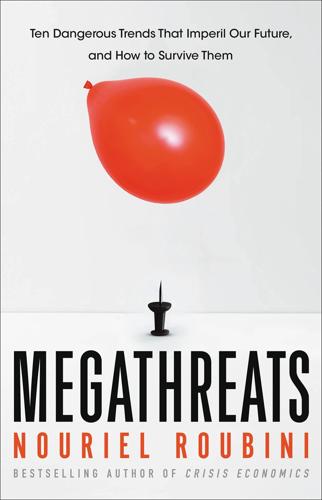
MegaThreats: Ten Dangerous Trends That Imperil Our Future, and How to Survive Them
by
Nouriel Roubini
Published 17 Oct 2022
Hundreds of firms worldwide have entered the fray with payment systems that handle billions of daily consumer and business-to-business transactions. Companies in the United States and China dominate the industry, but markets have sprouted in other advanced and developing economies. Mobile applications transfer funds and pay bills via Alipay, WeChatPay, M-Pesa, Venmo, PayPal, Square, and other digital providers. Paystack, a Nigerian fintech start-up, sold in December 2020 for $200 million to a US fintech firm.31 Working within the boundaries of a widely accepted monetary system, these nimble companies modernize credit allocation, insurance, capital markets services, and even wealth management.
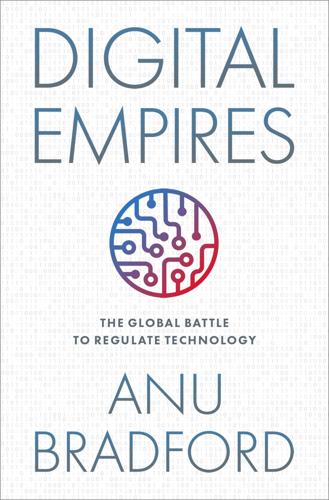
Digital Empires: The Global Battle to Regulate Technology
by
Anu Bradford
Published 25 Sep 2023
Huawei is not trying to hide the power of its surveillance equipment, boasting on its website how “Big Brother monitors their goings-on from miles away” in Nairobi.32 The local authorities in Kenya reinforce this message, with the superintendent of the Nairobi police force noting that “anybody who does anything is being watched.”33 In addition to this extensive surveillance system, Huawei provides the platform for Kenya’s mobile payment systems, M-PESA, further entrenching the presence of Chinese technology in a country where over half of the population uses mobile payment systems to transfer money.34 Zimbabwe is another African country that has embraced Chinese surveillance technologies. In 2018, its government announced a partnership with Hikvision, which entails using the company’s surveillance technology for border security.35 Hikvision has also provided smart city technologies in the country’s fourth largest city, Mutare.
…
American, 388 content moderation. see content moderation “Declaration for the Future of the Internet” (White House), 390 net nationalism, 170–71 regulation of, 36–37, 44–45 sovereign RuNet, 308–9 splinternet, 16, 179–80, 181, 388 as tool for promotion of democracy, 40–42 as tool for state control and propaganda, 308–13 as tool for surveillance, 4–5 Internet Bill of Rights (proposed), 54–55 Internet City (Dubai), 263 internet companies, 70–71. see also tech companies; specific companies Internet Corporation for Assigned Names and Numbers (ICANN), 181, 269, 288–89, 304, 307–8 Internet Engineering Task Force (IETF), 304, 306–7 internet freedom European initiatives, 272–73 Global Internet Freedom Task Force (GIFT) (US), 271 NetFreedom Task Force (US), 272 US initiatives, 27, 257, 265–79, 284–87, 288–89 US principles, 265 Internet Freedom Grants (US), 273–74 internet governance, 303–4 Internet of Things, 295–96 Internet Protection Act (US), 44–45 Internet Regulatory Freedom Act (US), 44–45 internet sovereignty, 288–89 iOS (Apple), 39–40, 382–83 IP (intellectual property), 185, 197, 218 IP (internet protocol) standards, 306–7 iPad (Apple), 153 iPhone (Apple), 39–40, 59, 61–62, 133–34, 153, 215–16, 261, 382–83 iPhone 13 (Apple), 153 IPOs (initial public offerings), 14–15, 94, 176 Iran, 180–81, 272–73, 274, 308, 389–90 Iraq War, 271 Ireland Data Protection Commission (DPC), 139, 230, 377 digital service tax (DST), 127–28, 142–43, 236–37, 243–44, 245 Isle of Man, 333–34 ISO (International Organization for Standardization), 305–6, 307–8 Israel, 333–34, 345, 352, 389 Israeli tech companies, 316 ITA (Information Technology Agreement) (WTO), 268–69 Italy antitrust regulation, 243, 345 digital services tax (DST), 126–27, 239, 242 G7 relations, 321–22 protections for platform workers, 128–29 restrictions on Chinese tech companies, 193–94 smart cities, 296–97 WhatsApp users, 260 ITU (International Telecommunications Union), 305–6, 307–8 January 6, 2021 insurrection (US Capitol), 7–8, 66, 100, 141, 251, 286, 363–64, 367–68 Japan, 337 Act on Improvement of Transparency and Fairness in Trading on Specified Digital Platforms (TFDPA), 346–47 Act on the Protection of Personal Information, 333–34 antitrust regulation, 344–47 Apple’s revenue, 261 Clean Network, 321 data protection law, 333–34 G7 relations, 321–22 Ministry of Economy, Trade and Industry (METI), 346–47 National Diet, 346–47 nonregulation principle, 266–67 relations with China, 197–98 relations with US, 58–59 restrictions on Chinese tech companies, 193–94 Social Principles of Human-Centric AI (Social Principles), 349–50 support for semiconductors, 211 tech diplomacy, 302 techno-democracy, 389–90 US-Japan Digital Trade Agreement, 322 Japan Business Council in Europe, 357 Japan Fair Trade Commission, 346–47 Japanese tech companies, 316 JD.com, 70–71, 73, 108 American funding, 93, 153–54 Chinese state support, 391–92 VIE structure, 174–75 Jersey, 333–34 Jinri Toutiao, 89 Jobs, Steve, 374–75 Joint Technical Commission of the ISO and IEC, 305 Jordan, 266–67, 299–300 Jordan Free Trade Agreement (US-Jordan), 267–68 Juncker, Jean-Claude, 125 Juniper Networks, 275–76 Kanter, Jonathan, 53–54 Kayak, 358 Kazakhstan, 303 Kenya, 273, 298, 300 Khan, Lina, 53–54 Khanna, Ro, 54–55 Kindle, 155, 159–60 King, Gary, 83 Klein, Adam, 233 Klonick, Kate, 259–60 Kokusai Electric, 204–5 KPMG, 175 Kuaishou, 165 Kyrgyzstan, 303 La Quadrature du Net (LQDN), 227–28 Lagos, Nigeria, 263 Lahore Safe City project, 300 Lam Research, 218 Laos, 270–71 Latin America, 301, 335–36 Latvia, 142 Le Maire, Bruno, 126–27, 241 Le Monde, 18–19 leadership, 197 Lebanon, 299–300 Lee, Kai-Fu, 35 Lenaerts, Koen, 111 Leonard, Mark, 16 Lessig, Lawrence, 37 LG electronics, 261–62 Li An, 89 Li Yang, 82–83 libertarianism, techno-, 34–35, 38–39, 257–89 Libya, 299–300 licensing agreements, 123 Lighthizer, Robert, 239 linguistic bias, 283–84 LinkedIn (Microsoft), 261–62 Russian blockade, 308–9, 330–31 withdrawal from China, 154, 160–61, 205, 330–31 Liu Pengyu, 198–99 lobbying, 55–56, 356–58 Logica, 263 London Bridge Terror Attack (June 2017), 281–82 LQDN (La Quadrature du Net), 227–28 Lukashenko, Alexander, 285–86 Luxembourg, 142–43 Luxshare Precision Industry, 153 Lyft, 165 Lynch, Loretta, 228 M-PESA, 298 Ma, Jack, 73–74, 93, 137 Ma, Pony, 73–74 Mac (Apple), 153 Macron, Emmanuel, 249 Made in China 2025 program, 74–75, 214 Magaziner, Ira, 40–41, 48, 266, 286 Malawi, 285–86 Malaysia, 195, 322 Malcomson, Scott, 214–15 Mallaby, Sebastian, 92–93 Malofeev, Konstantin, 309–10 Malta, 142–43 market-driven regulations alternatives, 287–89 American model, 6–10, 16–20, 21–22, 23–24, 28–29, 33–68, 91–94, 106–7, 131–36, 221–54, 279–89, 361–64, 366–69 criticism of, 63–68 dwindling influence, 287–89 global consequences of, 16–20 vs. government regulation, 36–40 vs. rights-driven regulations, 221–54 shift away from, 279–89 US rethinking of, 52–57 markets coordinated, 106–7 Digital Markets Act (DMA) (EU), 107, 126, 130, 137, 138–39, 140 digital single market (DSM) (EU), 129–30, 371–72 free-market ethos, 42–52 Markey, Edward, 54–55 Marseille, France, 296–97 Maryland, 239–40 Massachusetts, 336 Massachusetts Institute of Technology (MIT), 59, 196 Al Matoum, Mohammed bin Rashid, 263 McAfee, Andrew, 137 McCain, John, 44–45 McKinsey Global Institute, 207–8, 371–73 McNealy, Scott, 38 Measures for the Security Review of Foreign Investments (FISR Measures) (China), 203 media Chinese state-controlled, 84 free and pluralistic, 121–23, 144 news industry, 122–23, 351–52, 383 social. see social media Meeting the China Challenge Act (US), 190–91 Megvii, 85, 87, 102, 189–90 Mehrotra, Sanjay, 218 Meituan, 70–71, 94, 98–99, 347–48 Melnikova, Olga, 310–11 Menendez, Robert, 99–100 Meng Wanzhou, 193, 201 mercantilism, 213 Merkel, Angela, 280–81 Meta, 33–34, 38, 108, 138–39. see also Facebook; Instagram acquisitions, 2, 50–51, 330–31 annual revenue, 2 anticompetitive practices, 56 antitrust investigations, 50–51, 53–54, 224, 242–43, 244, 249, 345, 348, 363 Cambridge Analytica scandal, 368–69 compliance with EU laws and regulations, 324–25 compliance with Turkish demands, 338 content moderation, 3–4, 120, 338, 339, 340–41 criticism of China, 100, 159 data collection, 61, 330–31 data privacy policy, 324, 330–31, 382–83 data transfer battles, 231–32 Disinformation Code, 120, 341 employee walkout, 384–85 EU market, 328 EU services, 19 FTC fines, 139–40 global influence, 260, 282, 339 harmful practices, 384–85 Irish corporate structure, 330–31 lobbying activity, 55–56, 356–57 market capitalization, 2 monopolistic behavior, 53–54 relations with Apple, 358 relations with TikTok, 170 role in Australian news industry regulation, 351–52 role in Brexit, 17–18 role in discrimination against Rohingya, 17–18 role in genocide, 280 role in information wars, 384 role in terrorist attacks, 281–82 Russian blockade, 309–10, 312–13 tax payments, 126–27, 240–41 US legal structure, 330–31 withdrawal from China, 8–9 #MeToo movement, 41, 362–63 Micron, 218 Microsoft, 108 acquisitions, 2 annual revenue, 2 antitrust investigations, 50–51, 243–44, 247, 249, 343, 358 Bing search engine, 154, 160–61 cloud service operations, 154–55, 261–62 Code of Conduct on Countering Illegal Hate Speech Online (Hate Speech Code) (EU), 116–17 compliance with Chinese laws and regulations, 154–55, 160–61, 330–31 compliance with EU laws and regulations, 163, 324–25 content moderation, 341 data centers, 154 data privacy policy, 324, 330 data transfer battles, 222–23 Disinformation Code, 120 European headquarters, 142–43 global influence, 133–34, 259–60, 261–62 global revenue, 154, 261–62 government battles, 13–14, 222 government collaborations, 62 Internet City presence, 263 LinkedIn professional networking site, 154, 160–61, 205, 261–62, 308–9, 330–31 lobbying activity, 356–57 market capitalization, 2 MSN Spaces, 160–61 Office 365 applications suite, 154, 261–62 relations with Apple, 358 relations with Google, 247, 358, 383 relations with TikTok, 171–72 Safe Harbor agreement, 229–30 SolarWinds hack, 60 support for Digital Divide projects, 268 support for regulatory action, 276, 383, 385 Threat Intelligence Center, 62 Windows OS, 154 Microsoft Research, 298–99 Microsoft Teams, 154, 261–62 Middle East, 162–63, 274. see also specific countries Arab Spring, 272, 285–86 Minnesota, 336 misinformation, 65, 341–42. see also disinformation MIT Media Lab, 298–99 Mnangagwa, Emmerson, 298 Mnuchin, Steven, 238, 240–41 mobile gaming, 215–16 mobile payments, 96, 298 mobile phones, 243, 261 morality, public, 335–36 Morocco, 299–300 Moscow, Russia, 312 MSI Computer, 261–62 MSN Spaces, 160–61 Mubarak, Hosni, 275–76 Mueller, Milton, 306–7 Museveni, Yoweri, 282–83 Musk, Elon, 105, 374–75 Muslims. see also Uyghurs hate speech against, 281, 283 oppression of, 87, 99–100, 101, 102, 156–57, 185, 188–89, 219, 316 rights of, 156–57 Mutare, Zimbabwe, 298 Mutsvangwa, Christopher, 298 Myanmar, 17–18, 280, 283 Nairobi, Kenya, 263, 298 Narus, 275–76 National Committee on US–China Relations, 93–94 National Democratic Institute, 272 National Development and Reform Commission (NDRC) (China), 203 National Endowment for Democracy, 272 National Foundation for American Policy, 374–75 National People’s Congress (NPC) (China), 73–74, 94–95, 201–2 National Resistance Movement party (Uganda), 282–83 National Science Foundation (US), 59, 375 national security, 164–78 National Security Agency (NSA) (US) clipper chip, 47–48 surveillance operations, 4–5, 7–8, 61–62, 101, 198–99, 226–27, 229–30, 284–85, 287–88, 318–19 National Security Commission on Artificial Intelligence (US), 99–100, 208, 209 National Security Council (NSC) (US), 245–46 National Security Law (China), 79–80 “National Strategy to Secure Cyberspace” (US), 48–49 nationalism, 70 net, 170–71 techno-nationalism, 75–76, 184–85, 211, 212–15, 224, 249 NATO (North Atlantic Treaty Organization), 197–98 Navalny, Aleksei, 13–14, 163 NBC Universal, 357 NDRC (National Development and Reform Commission) (China), 203 NEC, 316 Negative List (China), 203–4 Neihan Duanzi, 89 net nationalism, 170–71 Netflix, 142–43, 163, 372 NetFreedom Task Force (US), 272 Netherlands, the, 113–14 antitrust investigations, 345 digital policy, 142 internet freedom initiatives, 272–73 nonregulation principle, 266–67 protections for platform workers, 128–29 smart cities, 296–97 tax regime, 142–43 NetzDG law (Germany), 140–41 neuralMatch, 39–40 New Age of Autarky, 214–15 New Delhi, India, 314 New IP (proposed), 306–7 New Jersey, 336 New York, 239–40, 336 New York Stock Exchange (NYSE), 14–15, 94, 173–78 New York Supreme Court, 43 New Zealand, 333–34 Christchurch terrorist attack (2019), 281–82 relations with China, 197–98 Singapore-New Zealand-Chile Digital Economy Partnership Agreement, 322 Newman, Abraham, 232 news industry freedom of the press, 144 regulation of, 122–23, 351–52, 383 Next Generation of Artificial Intelligence Development Plan (China), 75 Nicaragua, 319–20 Nigeria, 295, 297–98, 335–36 NIO, 174–75 Nokia, 194 nongovernmental organizations (NGOs), 357 nonregulation principle, 265–70 North Africa, 272. see also specific countries North America, 260–61. see also specific countries North Atlantic Treaty Organization (NATO), 197–98 North Carolina, 46–47 North Korea, 134, 180–81, 197–98, 270–71, 274–75, 308 NPC (National People’s Congress) (China), 73–74 NSA. see National Security Agency NSO Group, 316 Nvidia, 161–62, 312 NXP, 204–5 Obama, Barack, 51, 54–55, 60, 245, 272, 285–86 Office 365 (Microsoft), 154, 261–62 Ogun, Nigeria, 263 online advertising. see advertising online content moderation. see content moderation Online Copyright Directive (EU), 122–23, 129–30, 351–52 Online Freedom and Viewpoint Diversity Act (US), 277 online platforms, 65–66. see also specific platforms by name Online Safety Bill (OSB) (UK), 342 Open Technology Fund (US), 276–77 Oracle, 161–62, 167, 171–72 Clean Company, 321 Internet City presence, 263 relations with Google, 358 Organization for Economic Cooperation and Development (OECD), 127, 142–43, 240–42, 374 OSB (Online Safety Bill) (UK), 342 Oxera, 137 Oxford Internet Institute, 282–83 Packingham v.
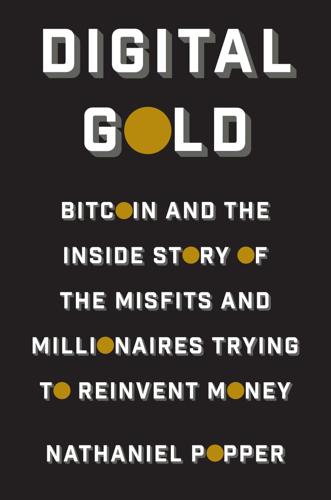
Digital Gold: Bitcoin and the Inside Story of the Misfits and Millionaires Trying to Reinvent Money
by
Nathaniel Popper
Published 18 May 2015
And Bitcoin services could easily be set up so that users were not anonymous. He then spoke directly to the work that Gates was doing, and noted that the foundation had been pushing people in poor countries into expensive digital services that came with lots of fees each time they were used. The famous M-Pesa system allowed Kenyans to hold and spend money on their cell phones, but charged a fee each time. “You are spending billions to make poor people poorer,” Wences said. Gates didn’t just roll over. He vigorously defended the work his foundation had already done, but Gates was less hostile than he had been a few moments earlier, and seemed to evince a certain respect for Wences’s chutzpah.
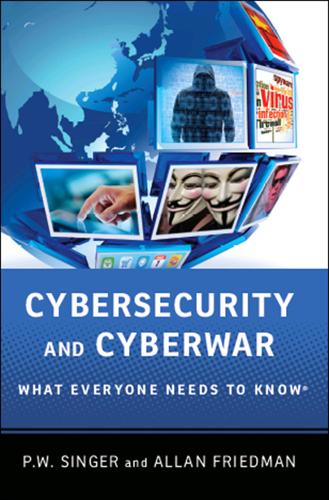
Cybersecurity: What Everyone Needs to Know
by
P. W. Singer
and
Allan Friedman
Published 3 Jan 2014
Whereas the mobile phone started as an expensive device that only those rich drug dealers on Miami Vice could afford, now it spreads computing power across the income spectrum, with immense consequences. In East Africa, mobile technology has revolutionized banking and commerce; anyone with a mobile phone can pay anyone else with a phone using M-Pesa, which doesn’t require access to a bank or credit system. This growing role in the developing world economy, however, means that security becomes even more important, and unfortunately it becomes most pressing in places least able to afford high-end security solutions. This demographic shift in the makeup of those who consider cyberspace home points to a fourth important trend when considering the future of cybersecurity.
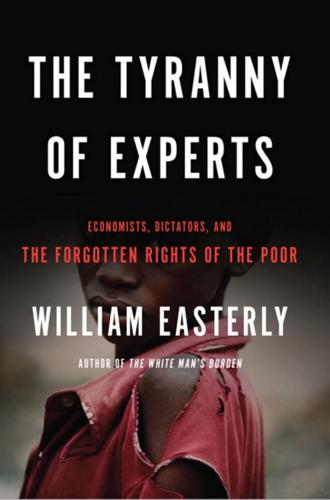
The Tyranny of Experts: Economists, Dictators, and the Forgotten Rights of the Poor
by
William Easterly
Published 4 Mar 2014
This is the source for much of this section. 39. Ibid., 168. 40. Wanda James, Driving from Japan: Japanese Cars in America (Jefferson, NC: Mc-Farland and Company, 2007), 37–38. 41. Data from World Bank World Development Indicators. 42. Ignacio Mas and Daniel Radcliffe, “Mobile Payments Go Viral: M-PESA in Kenya,” in Yes Africa Can: Success Stories from a Dynamic Continent, eds. P. Chuhan-Pole and M. Angwafo, World Bank, August 2011; http://web.worldbank.org/WBSITE/EXTERNAL/COUNTRIES/AFRICAEXT/0,,contentMDK:22551641~pagePK:146736~piPK:146830~theSitePK:258644,00.html, accessed September 12, 2013. 43.
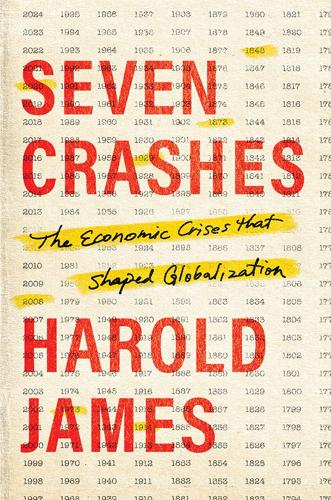
Seven Crashes: The Economic Crises That Shaped Globalization
by
Harold James
Published 15 Jan 2023
As Steve Jobs put it at the unveiling of the iPhone, it was “a leapfrog product that is way smarter than any mobile device has ever been and super-easy to use.”95 At the beginning, the most attention was given to the culture or the fun—the accessibility of music and entertainment—but the device was a commercial one, and it produced a revolution in financial access. That was evident even in much less sophisticated mobile phones, which could be repurposed. M-Pesa (pesa is Swahili for money), the mobile phone–based money transfer and payments service, was launched in 2007 by Vodafone Group PLC and Safaricom, the largest mobile network operator in Kenya. So the world’s globalization shifted from trade and finance to data and communications; but that revolution would in turn affect how trade and financial services could be supplied.
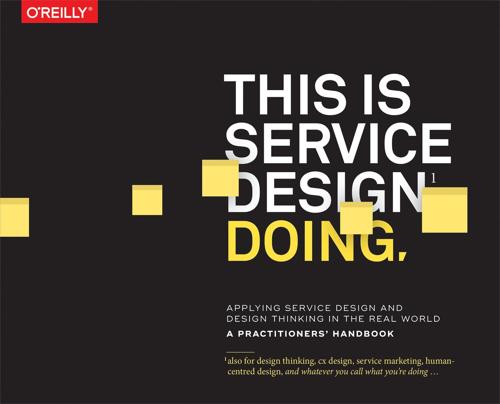
This Is Service Design Doing: Applying Service Design Thinking in the Real World: A Practitioners' Handbook
by
Marc Stickdorn
,
Markus Edgar Hormess
,
Adam Lawrence
and
Jakob Schneider
Published 12 Jan 2018
We used these insights to evolve our core offer: large PV systems coming in three different sizes, complete with battery, cabling, lights, etc. The offer also includes a three-year credit agreement and free maintenance throughout the repayment period. A second prototype of the PV system was developed, now fully functional (but still very ugly): we could remotely turn the PV system off and on based on incoming mobile money payments (M-Pesa), and gather performance and usage data in real time to foresee maintenance activities. A hardware prototype made from DIY components helped to overcome cultural barriers and get honest feedback from our pilot customers. During our trip, we had found a small, like-minded Tanzanian organization, with whom we started a field test soon after.
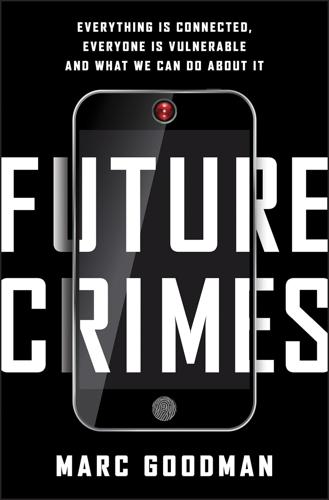
Future Crimes: Everything Is Connected, Everyone Is Vulnerable and What We Can Do About It
by
Marc Goodman
Published 24 Feb 2015
The future of money is mobile and virtual, and a bevy of new sensors and apps are on track to replace your wallet and the cash in your pocket. In fact, some mobile phone providers, such as Safaricom in Africa, dominate the overall payment space. In Kenya, for example, 25 percent of the nation’s GNP is actually transacted on Safaricom’s M-PESA payment system. Mobile money payment systems, which did not even exist at the turn of the last century, are now available in over seventy countries and are used to move billions of dollars every month. In particular, they have been incredibly useful in getting previously “unbanked” populations in the developing world access to the global world of commerce with significant positive impact for local economies.